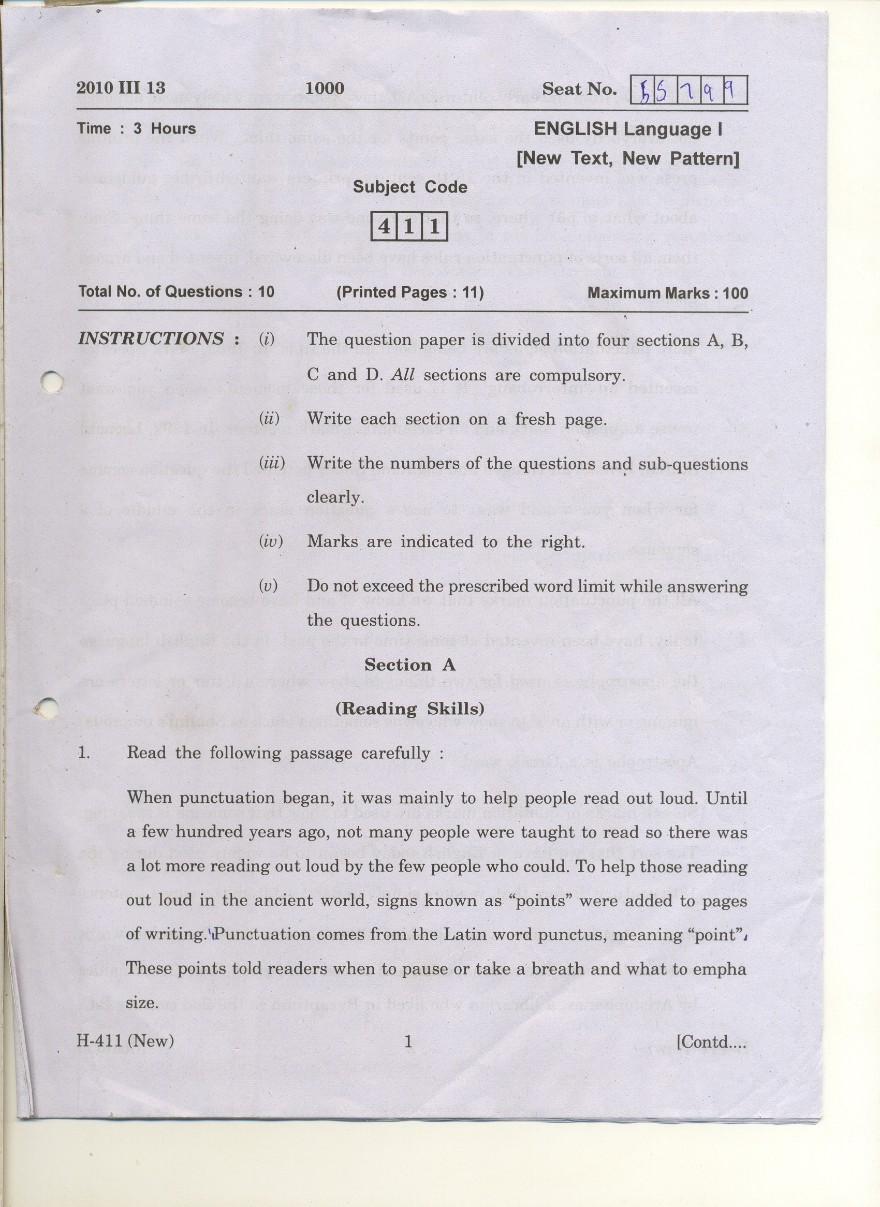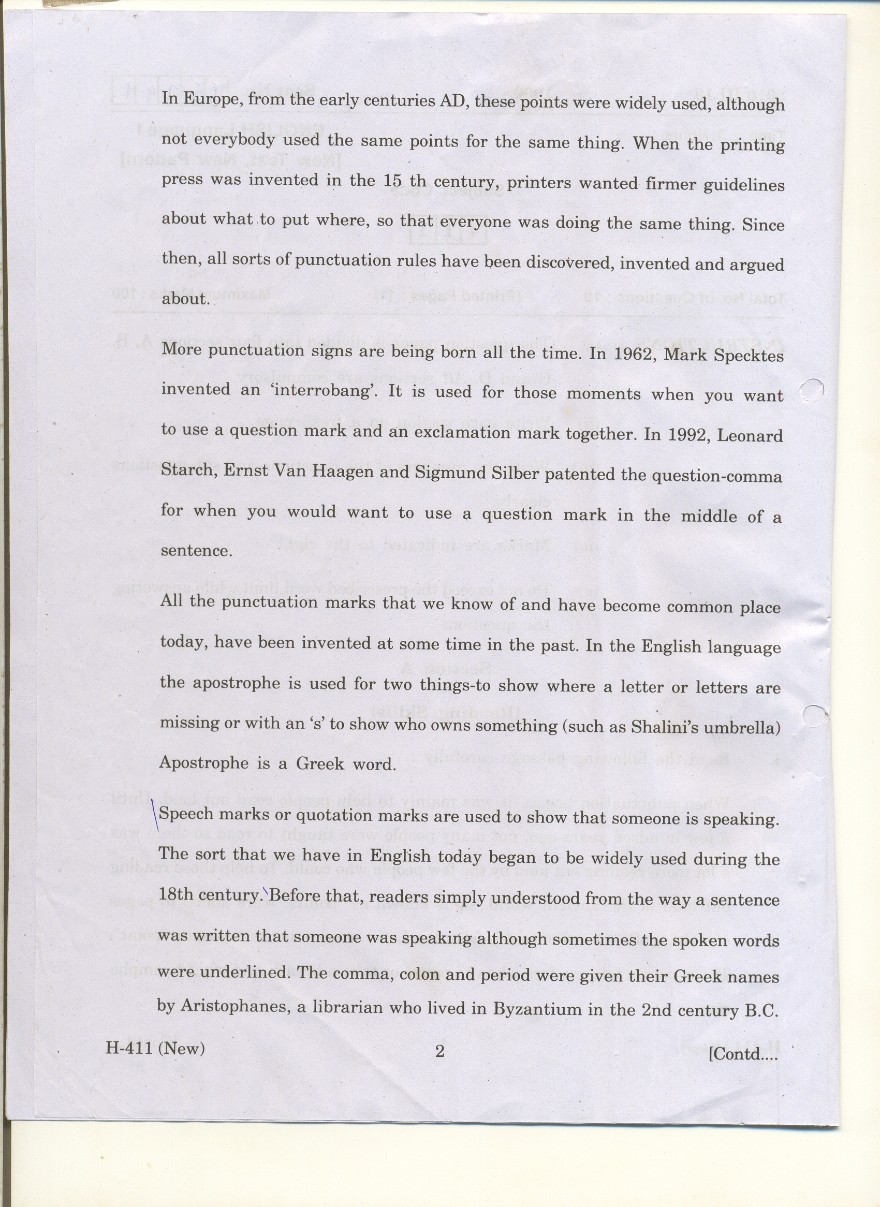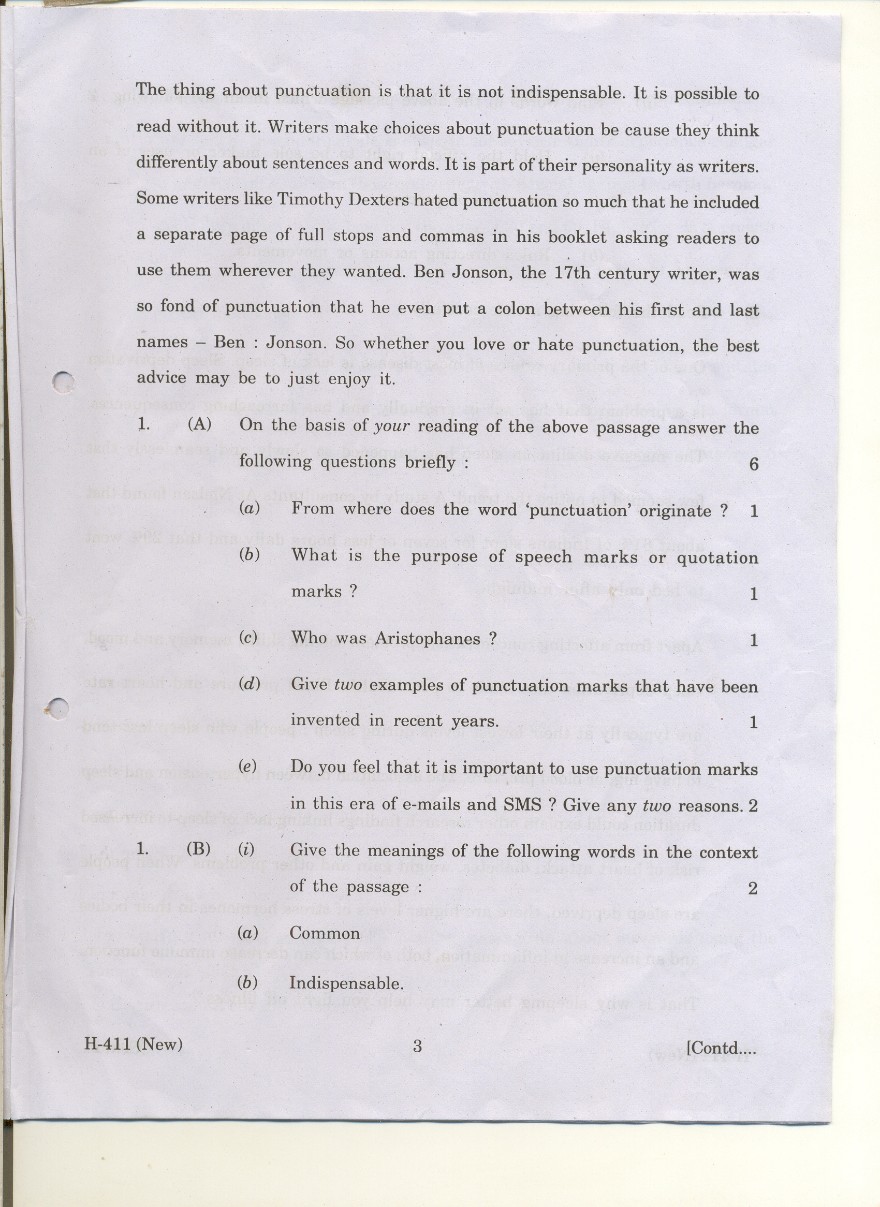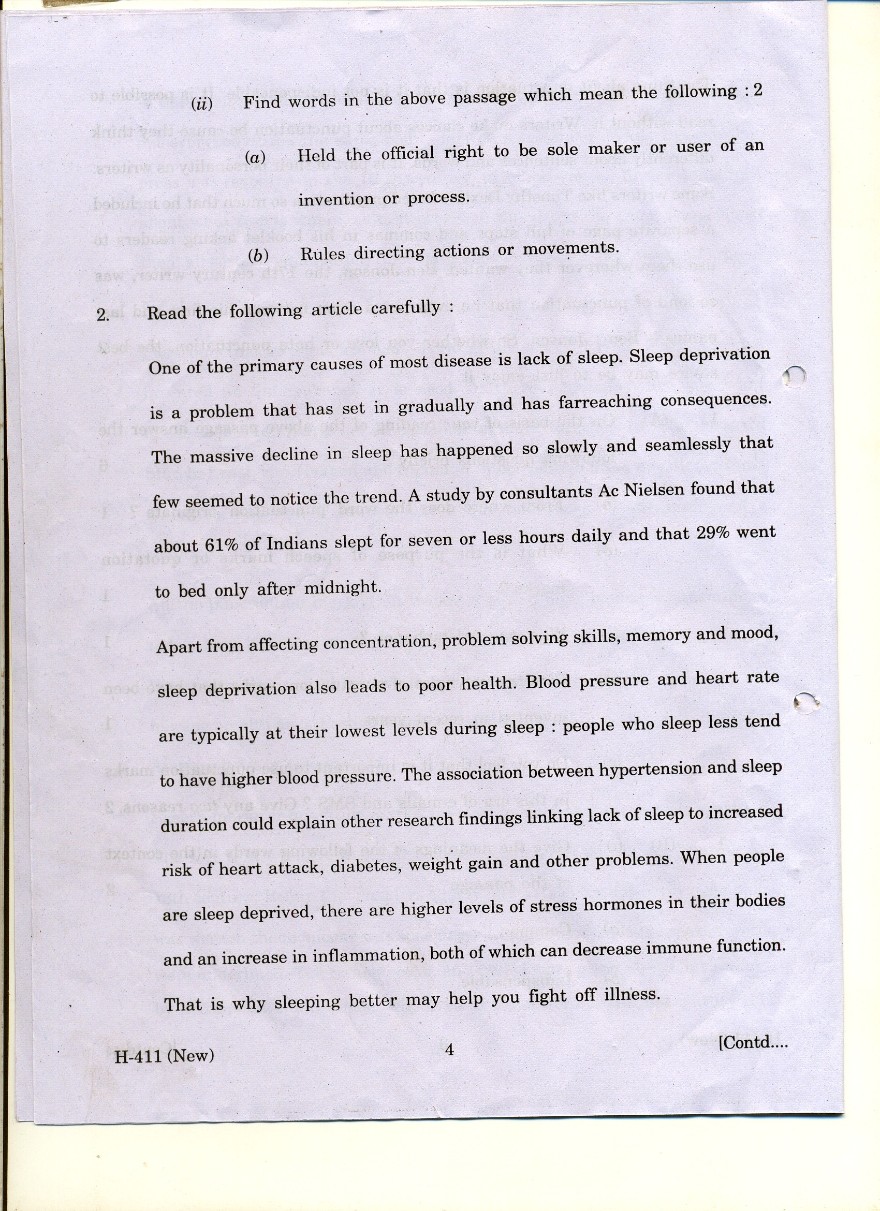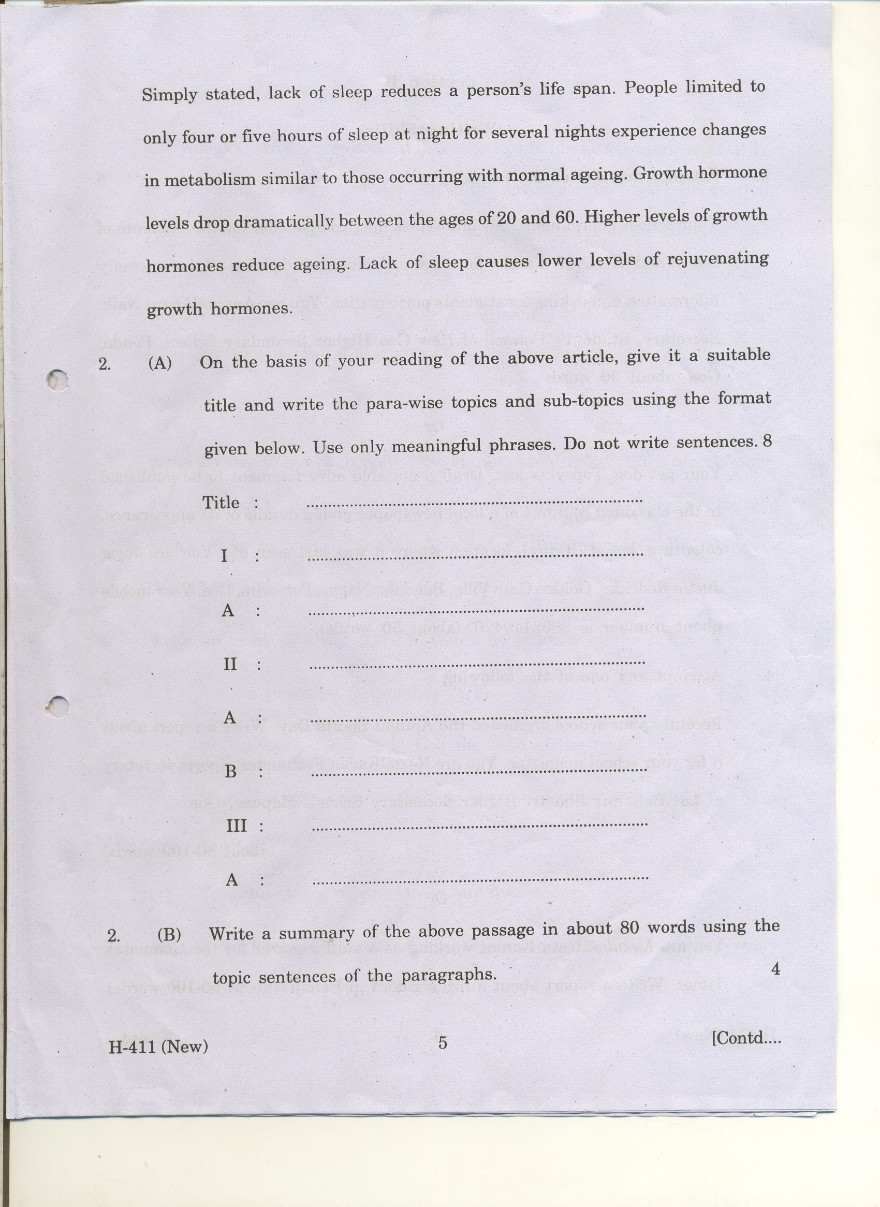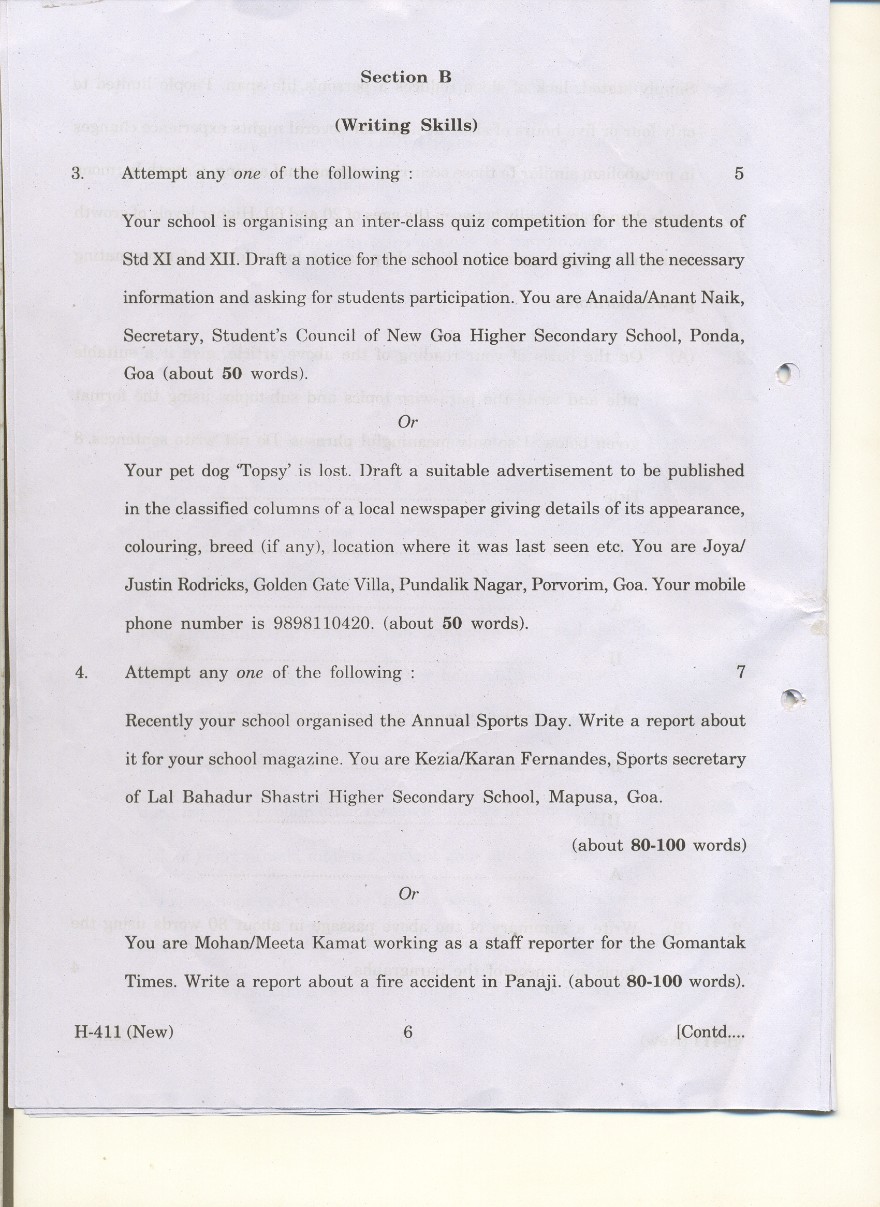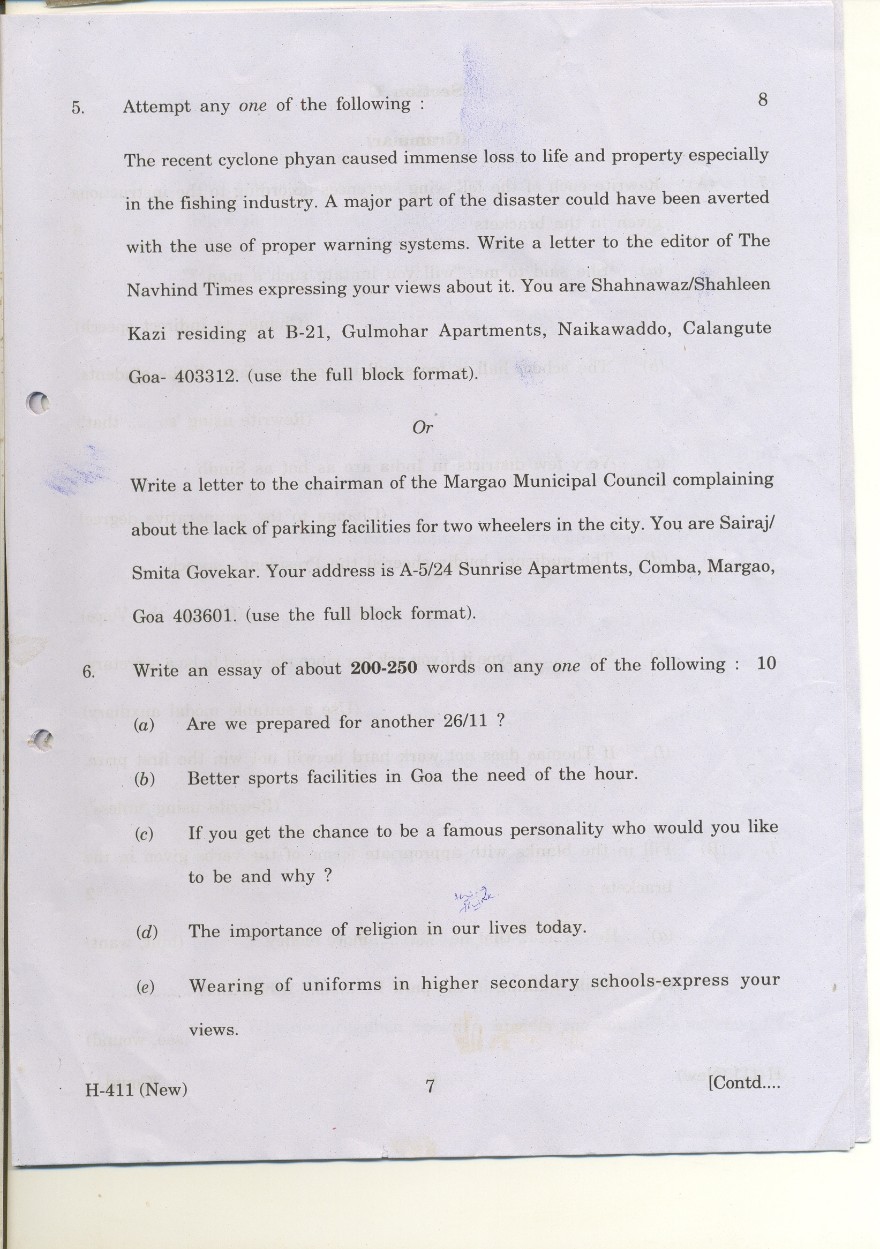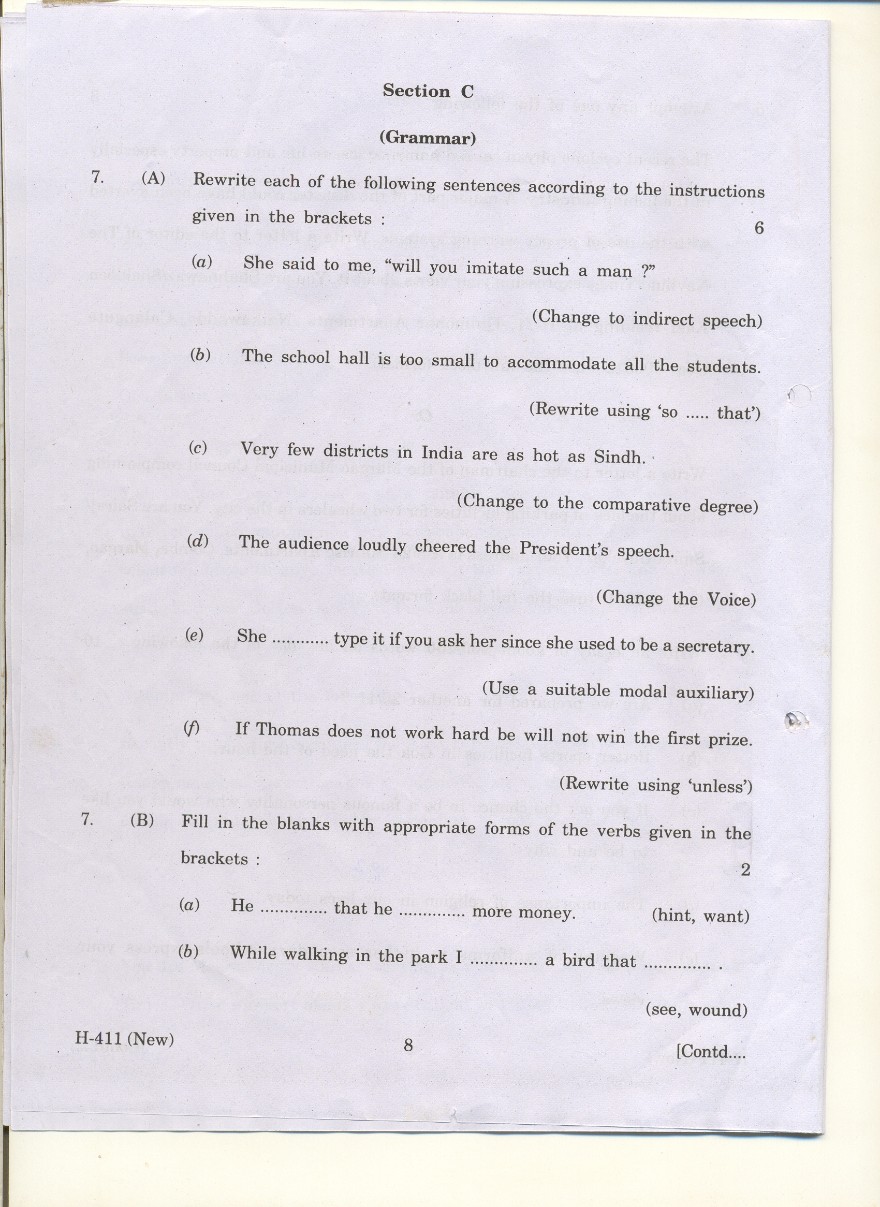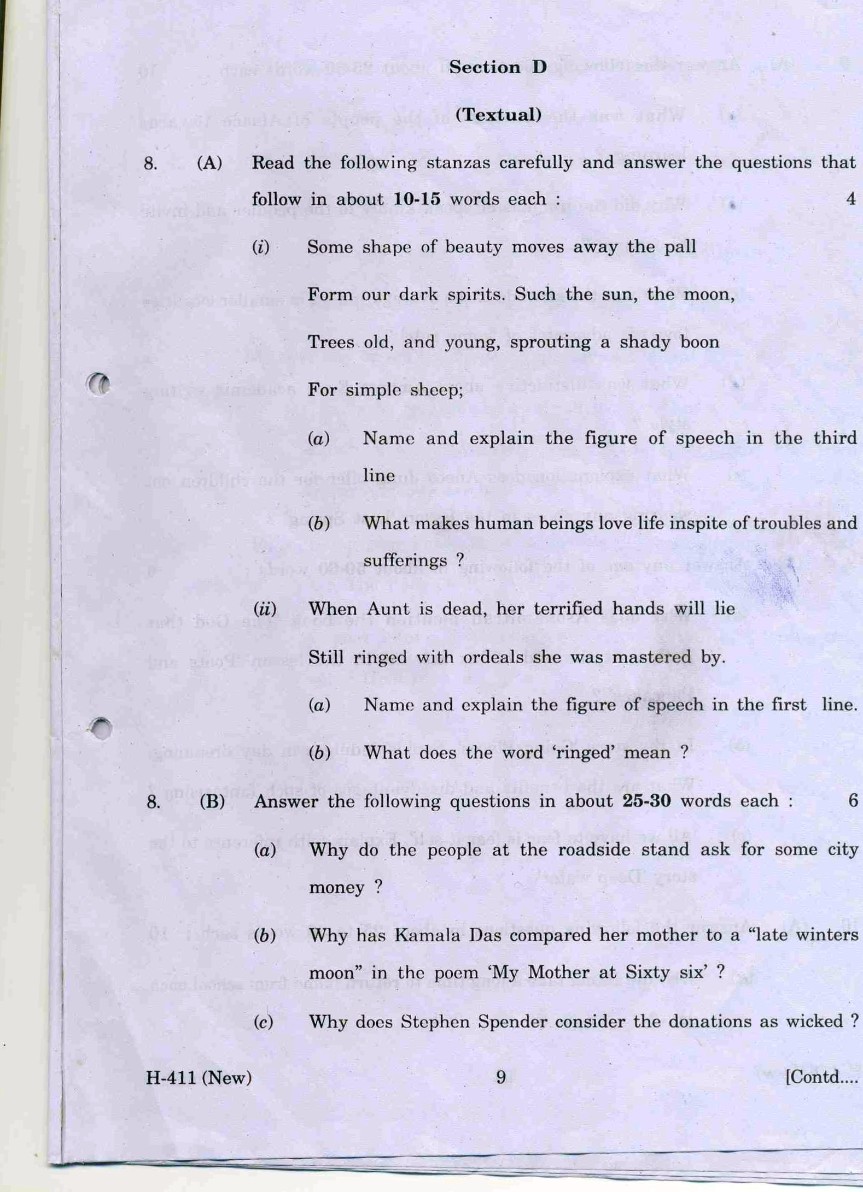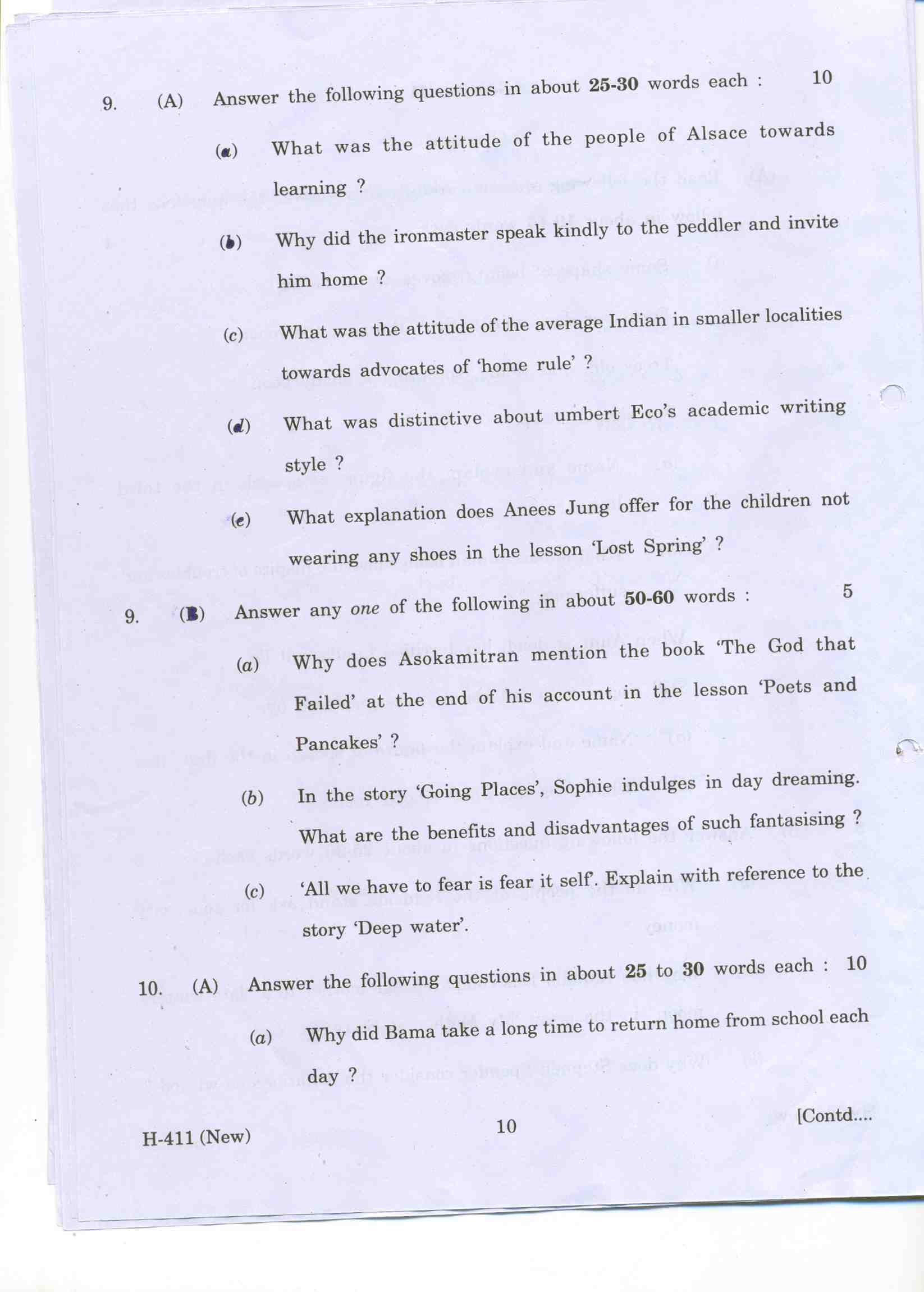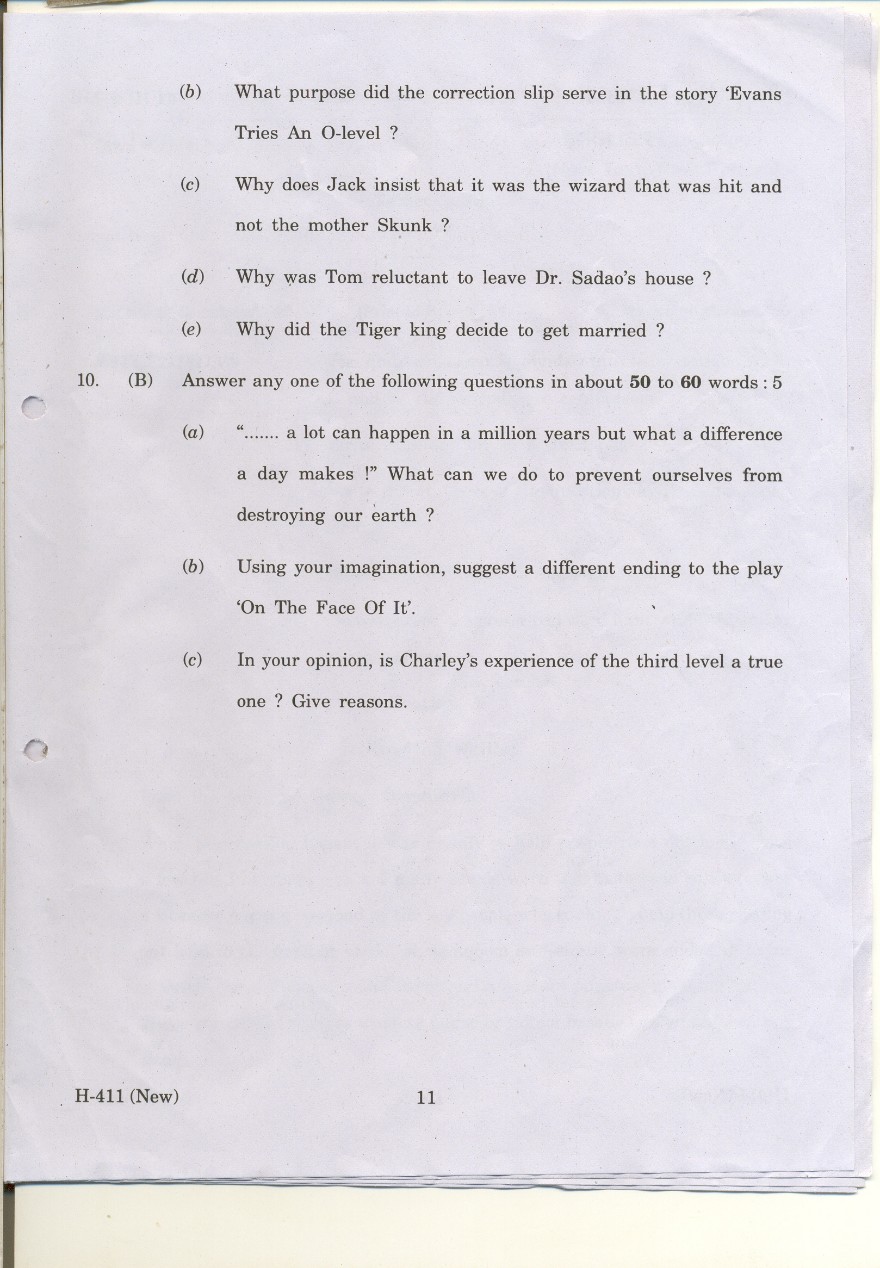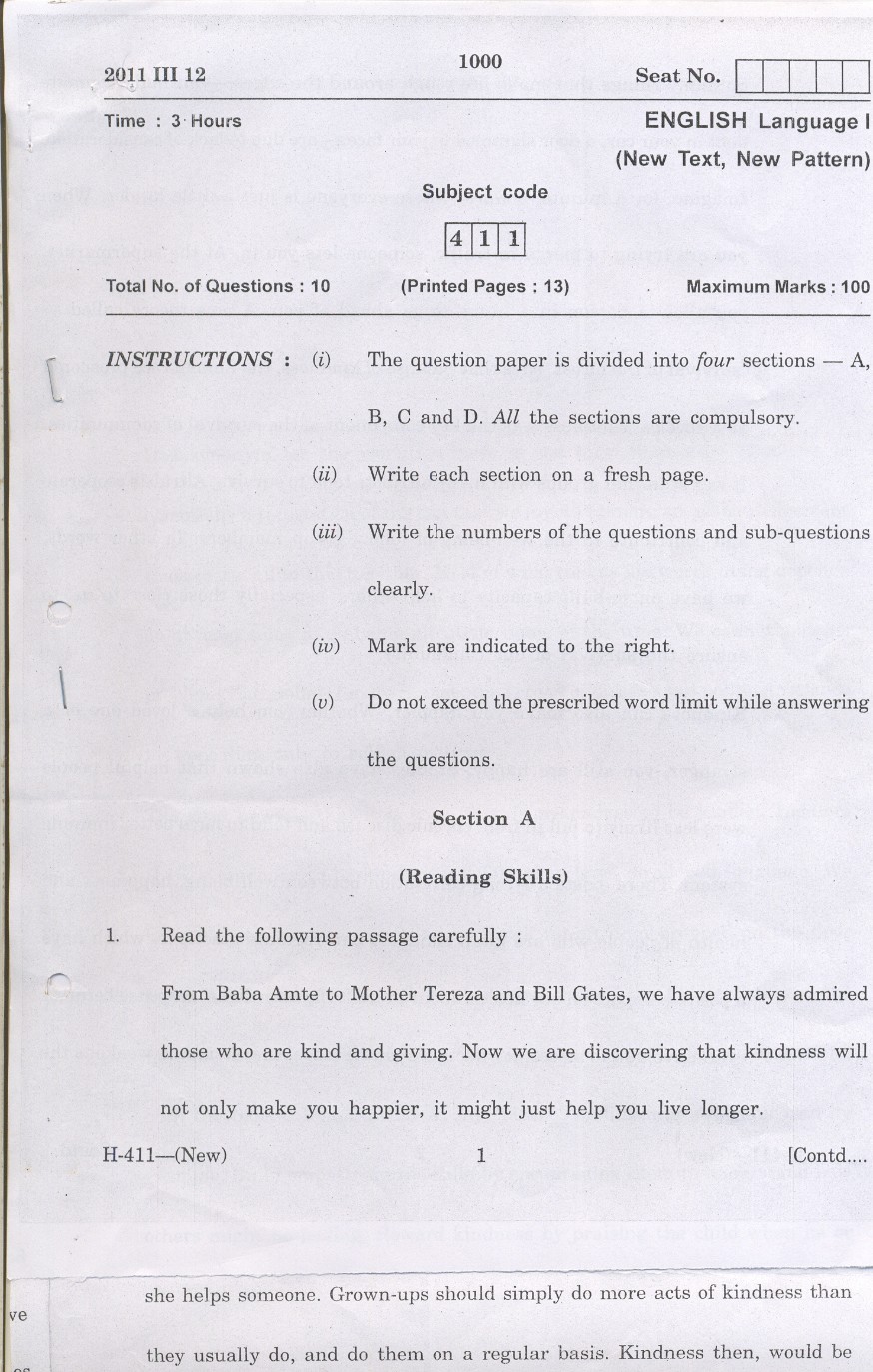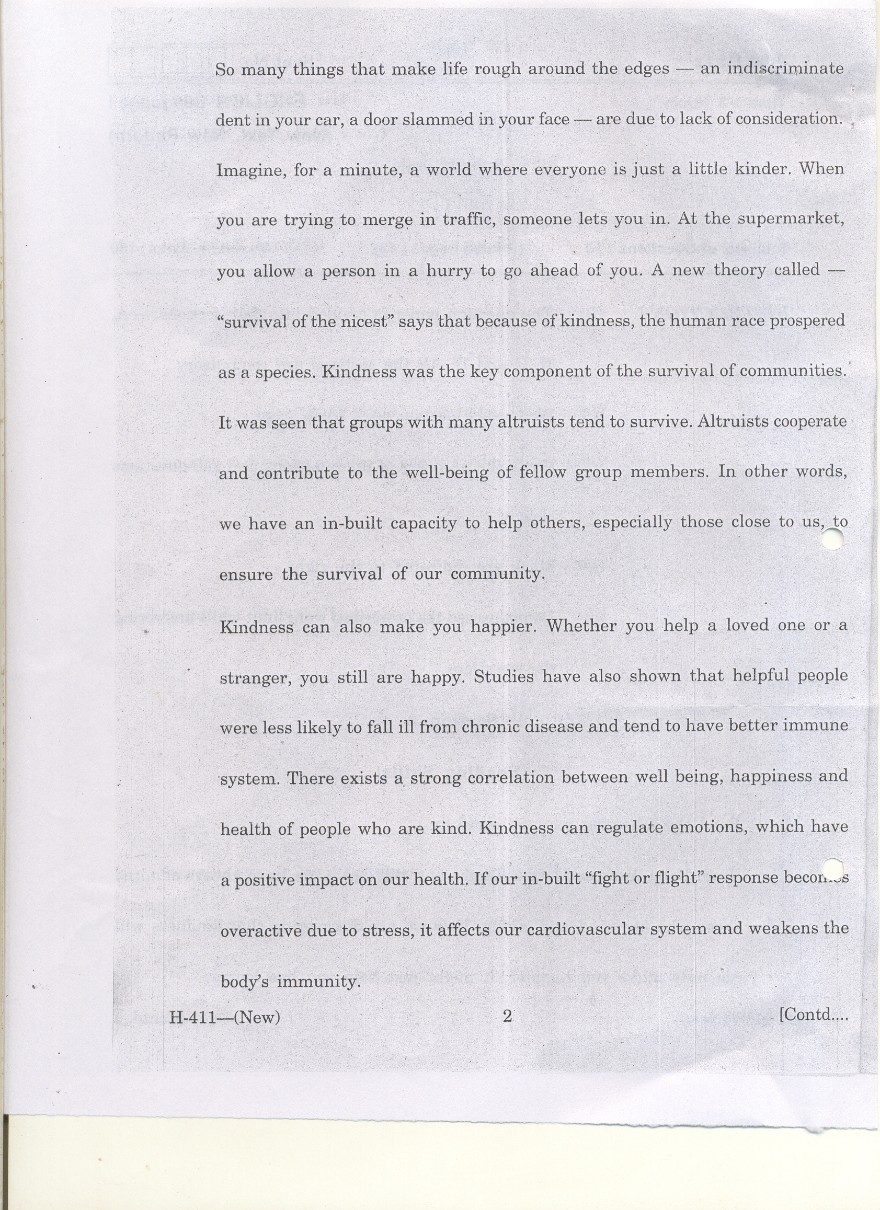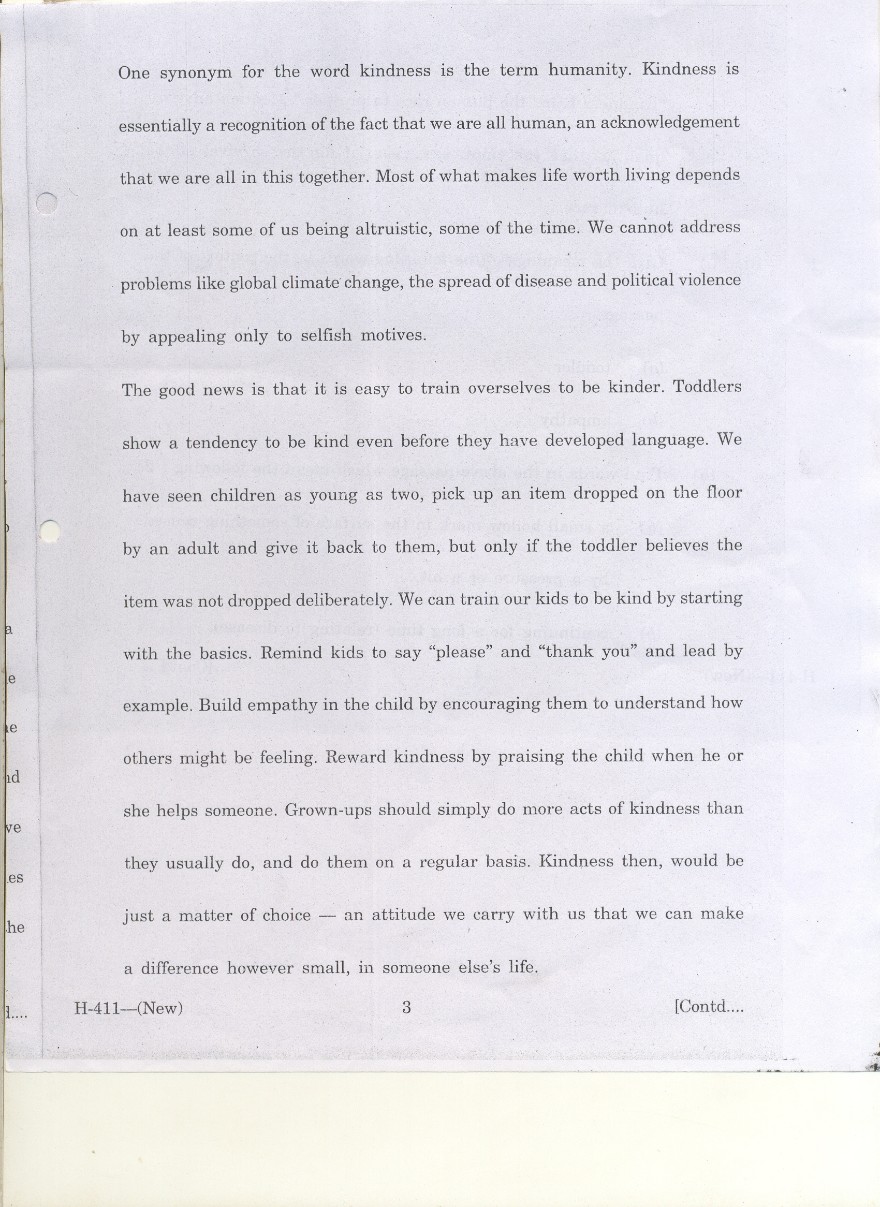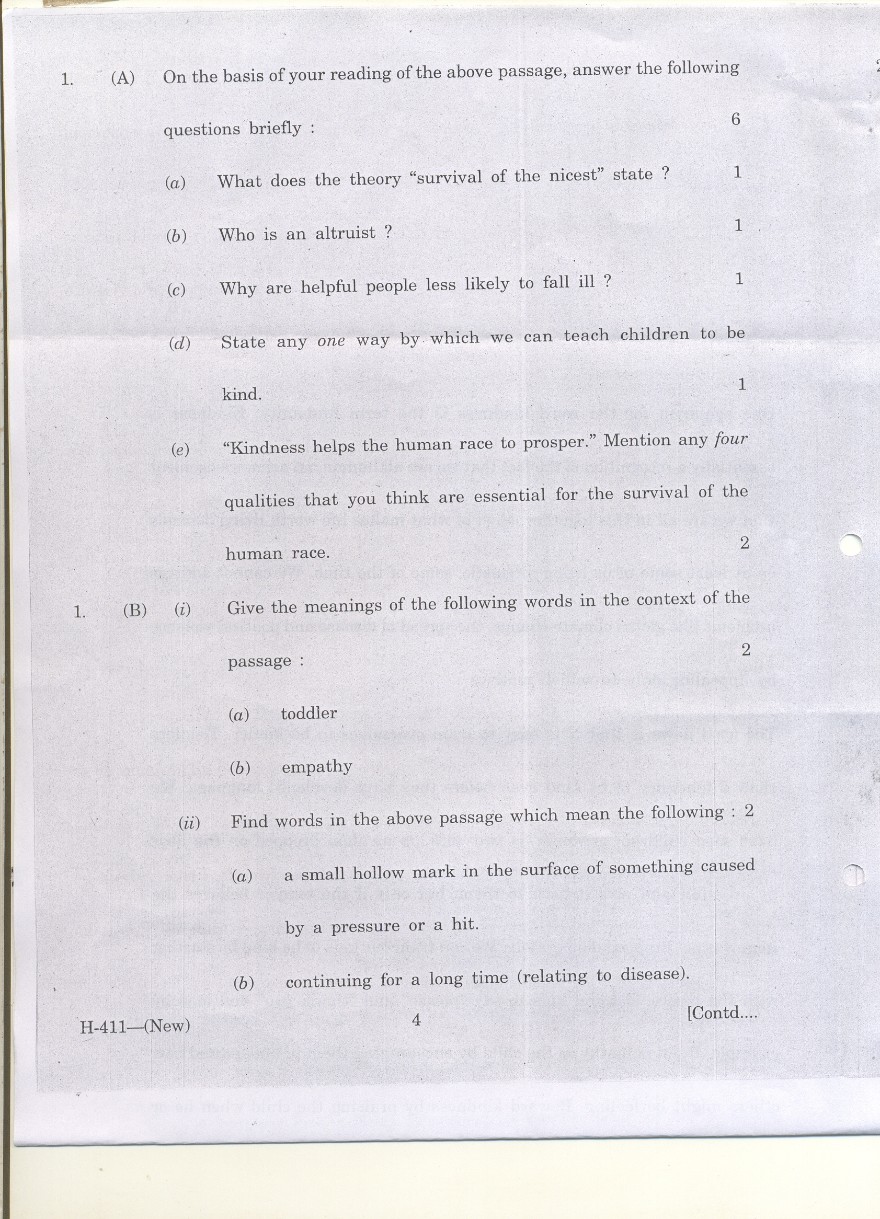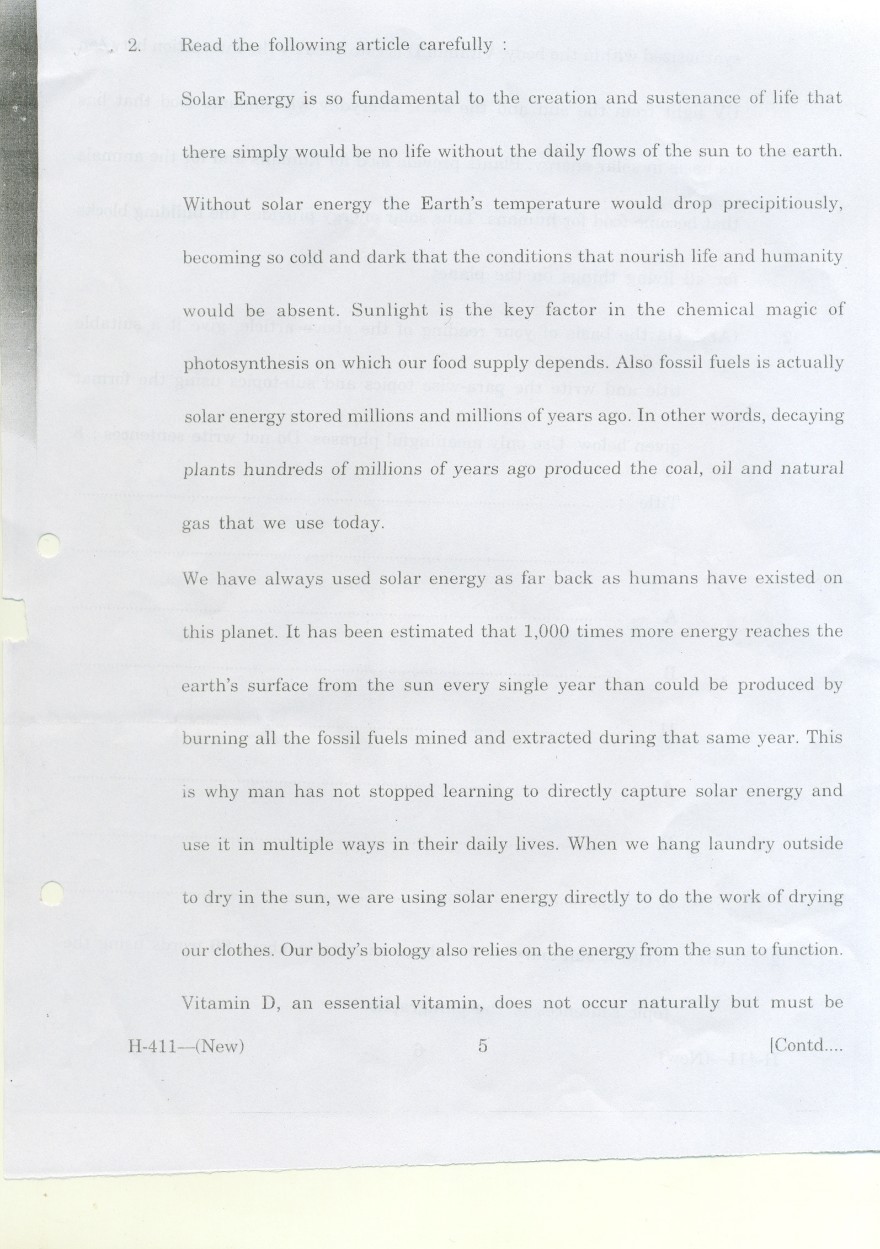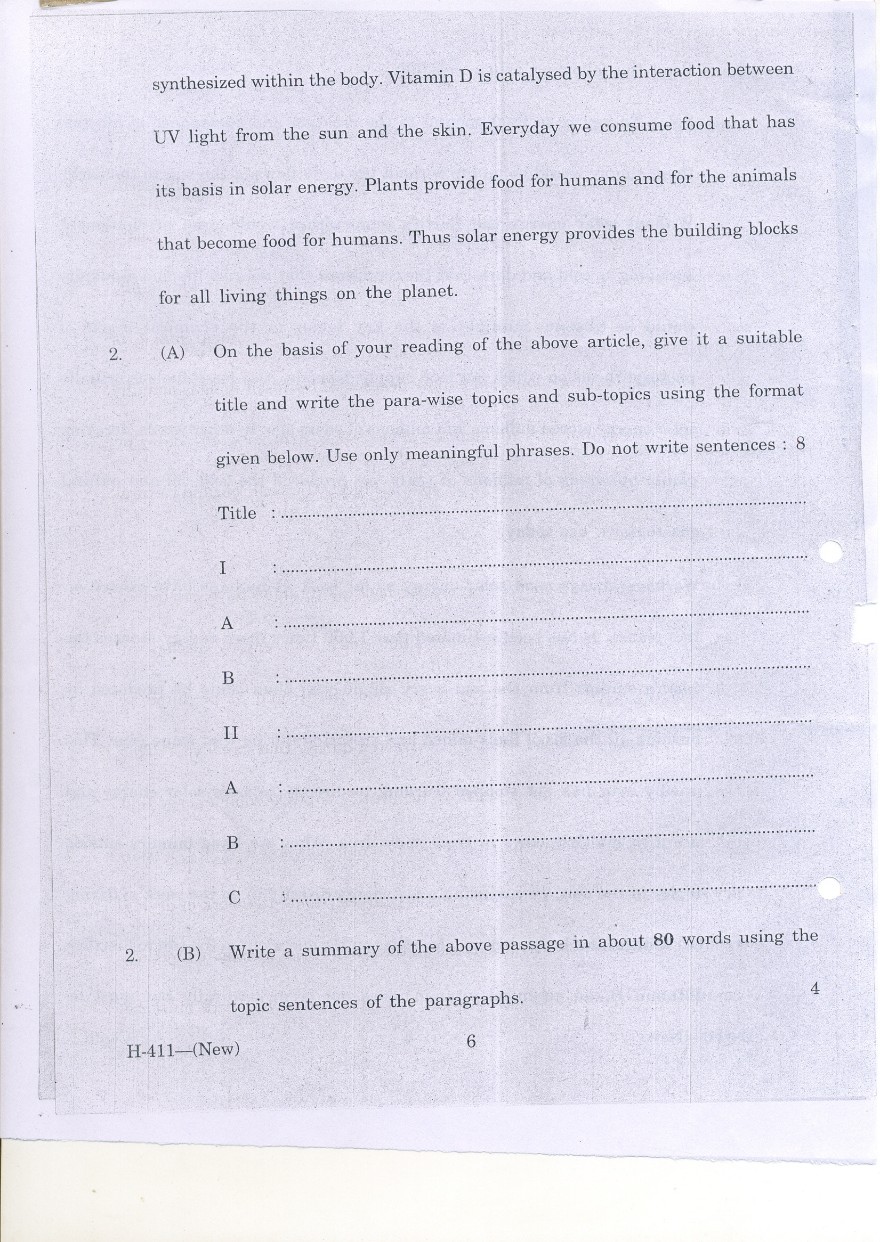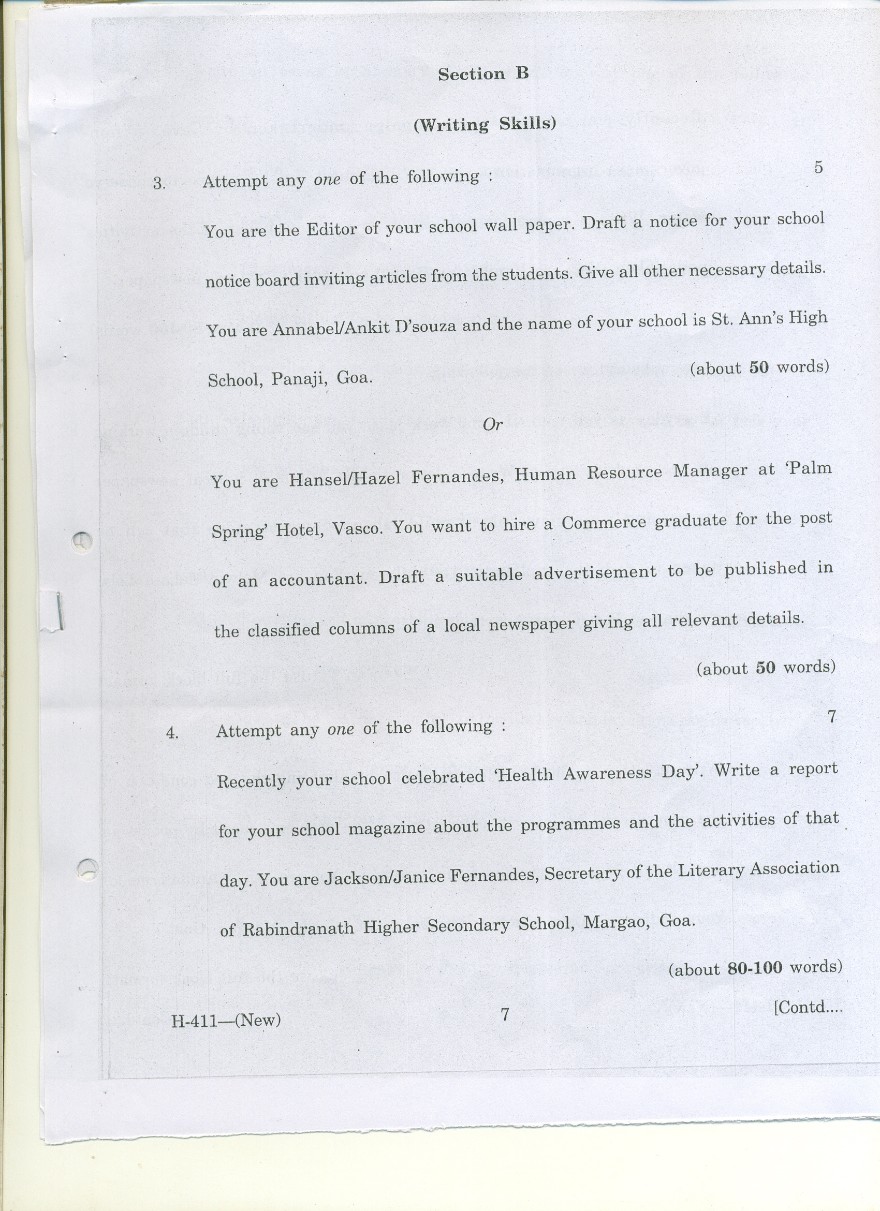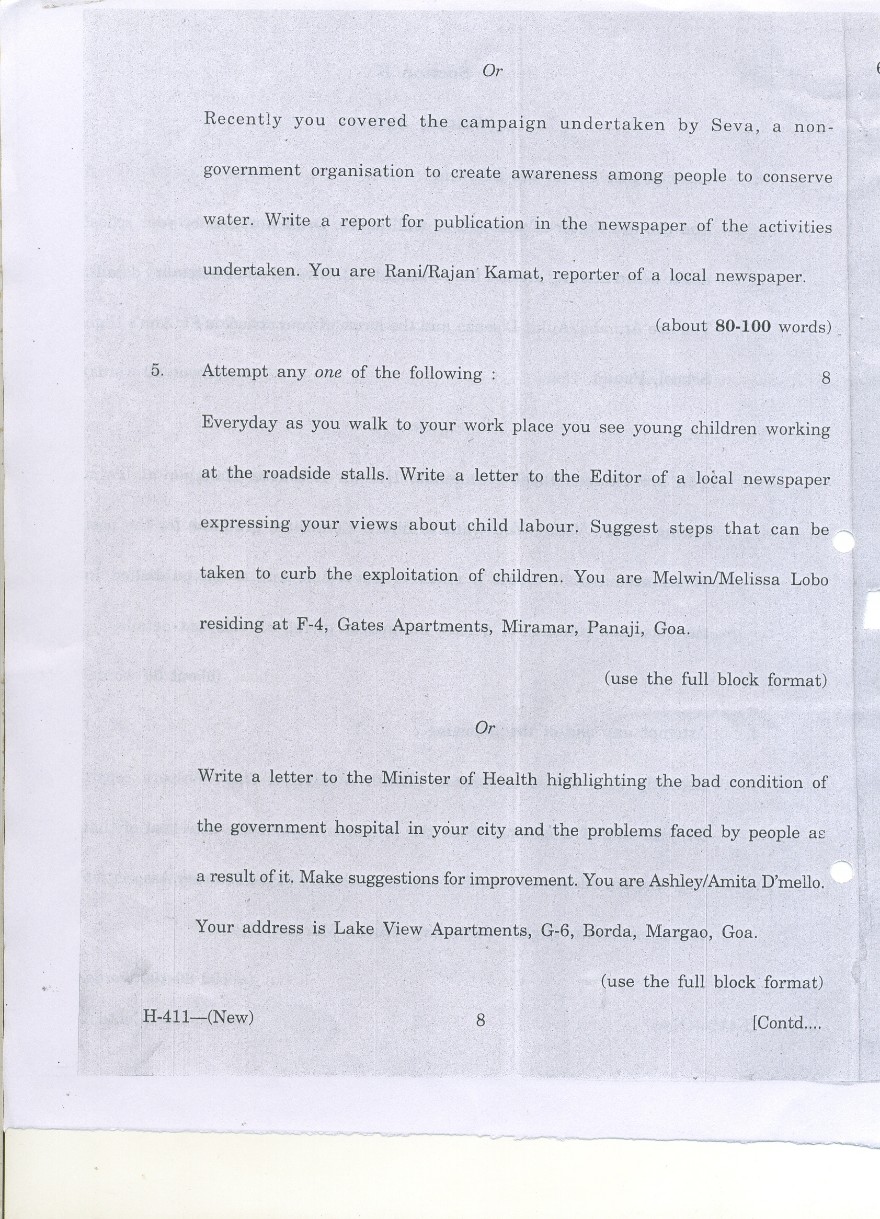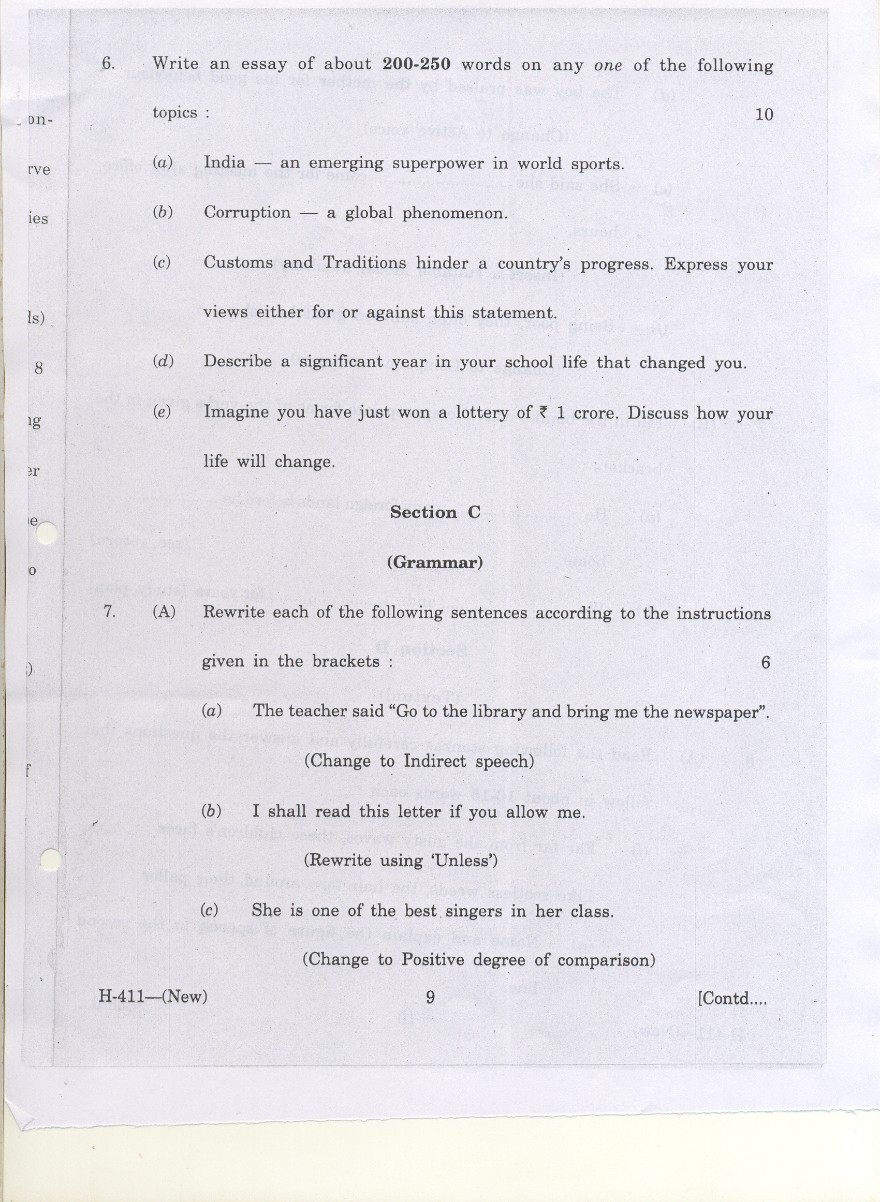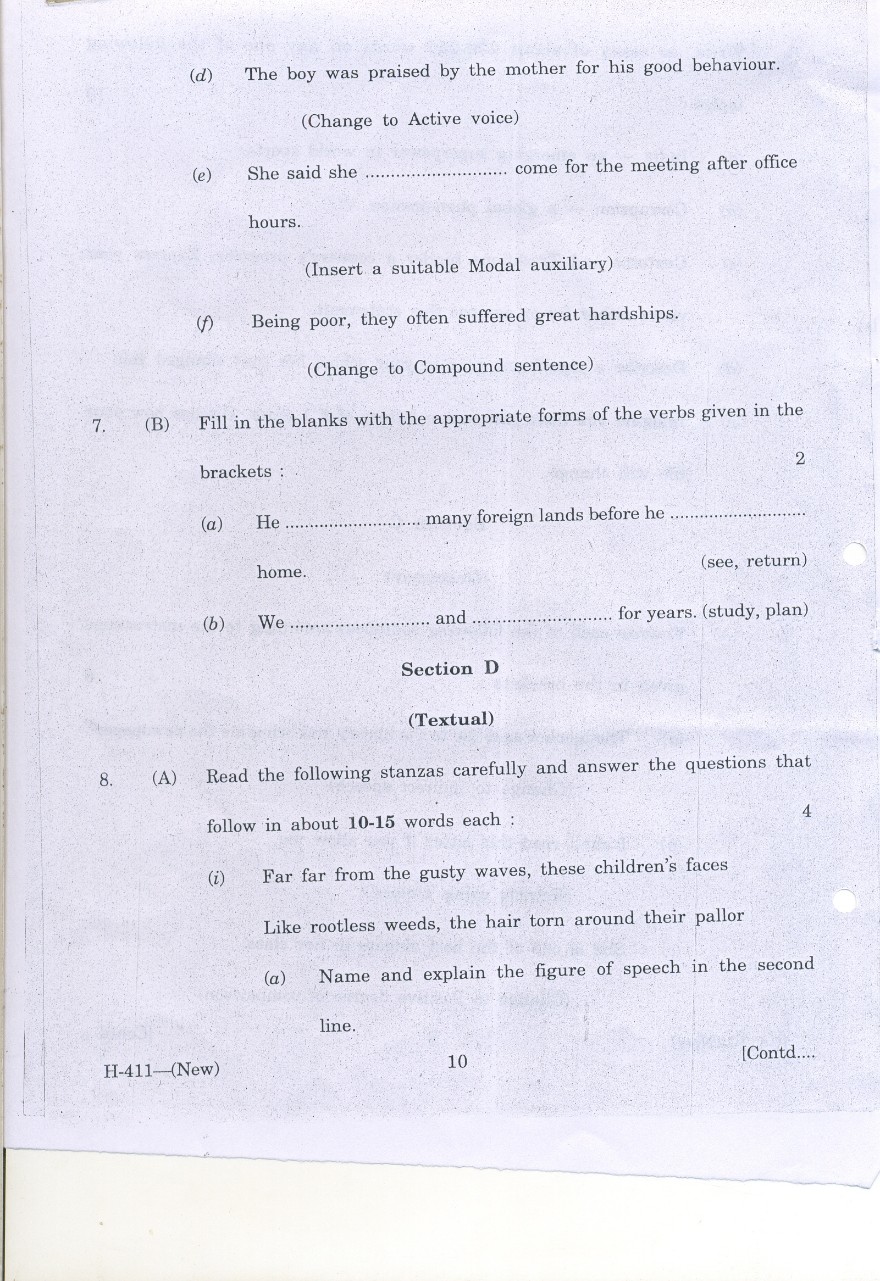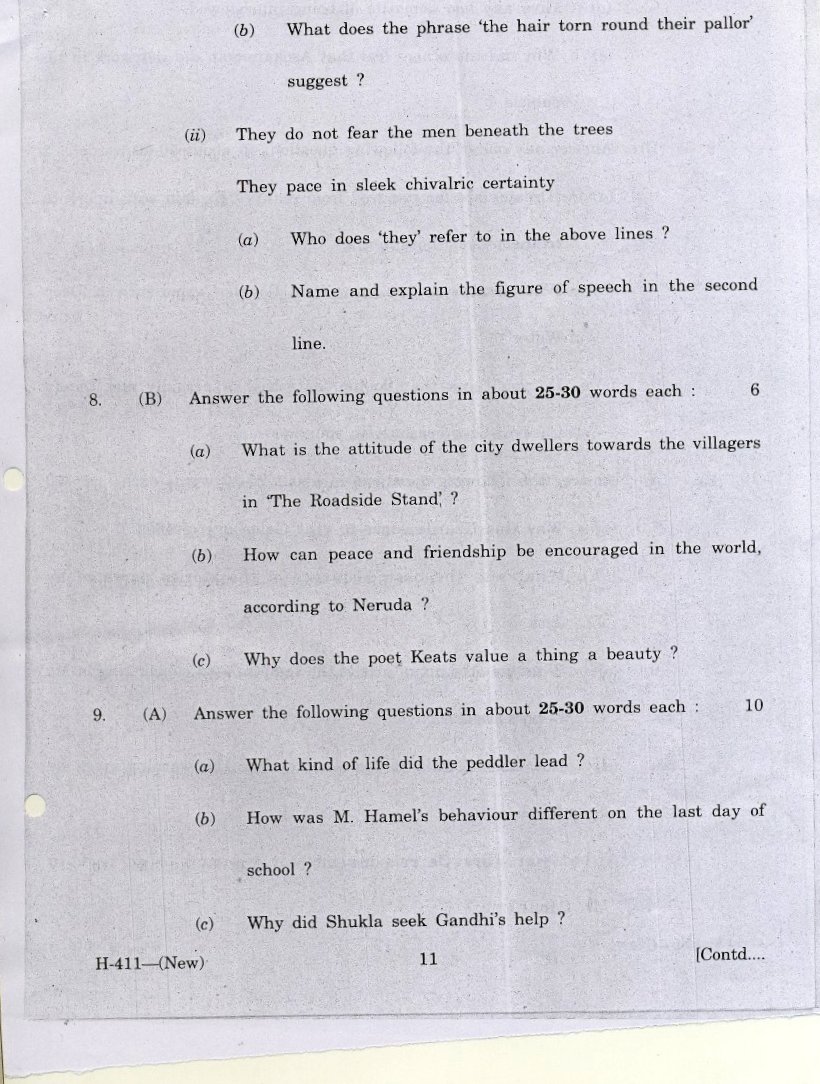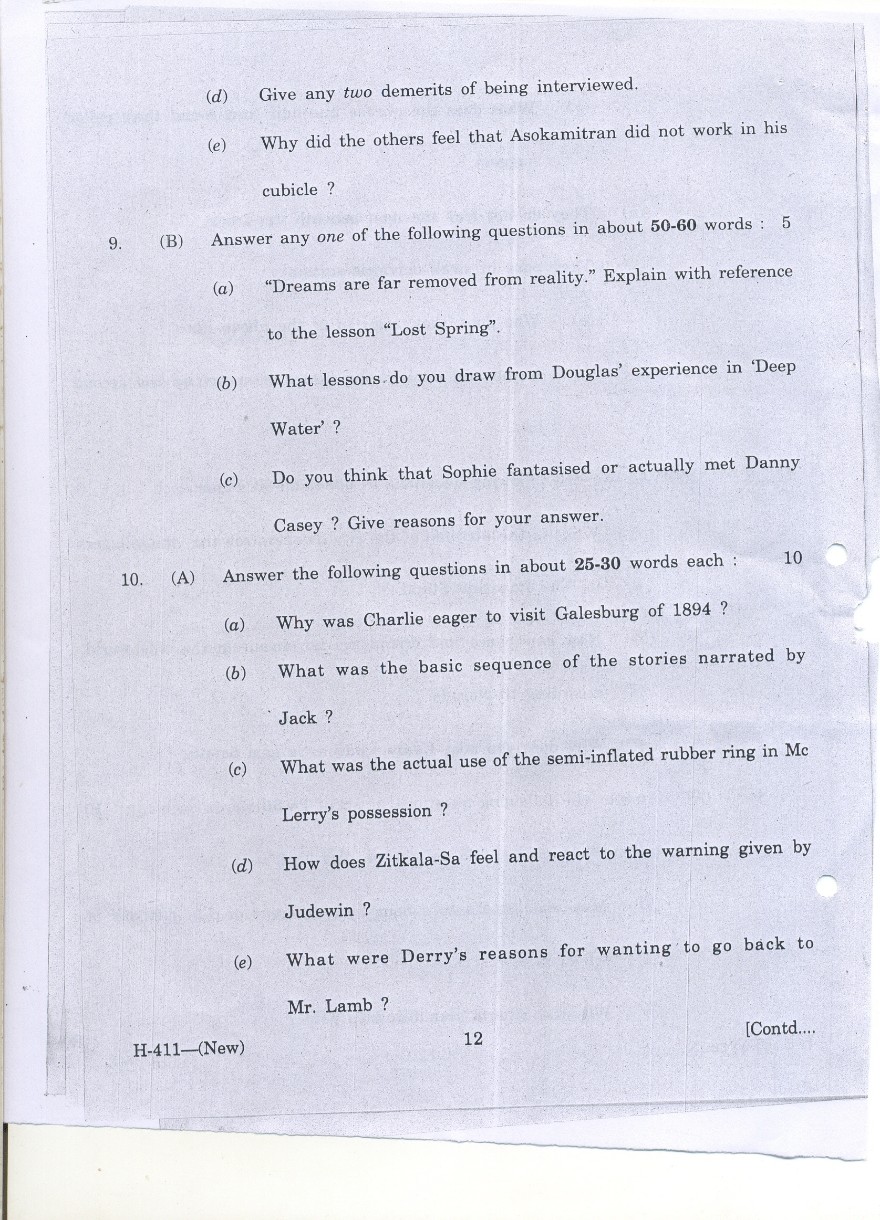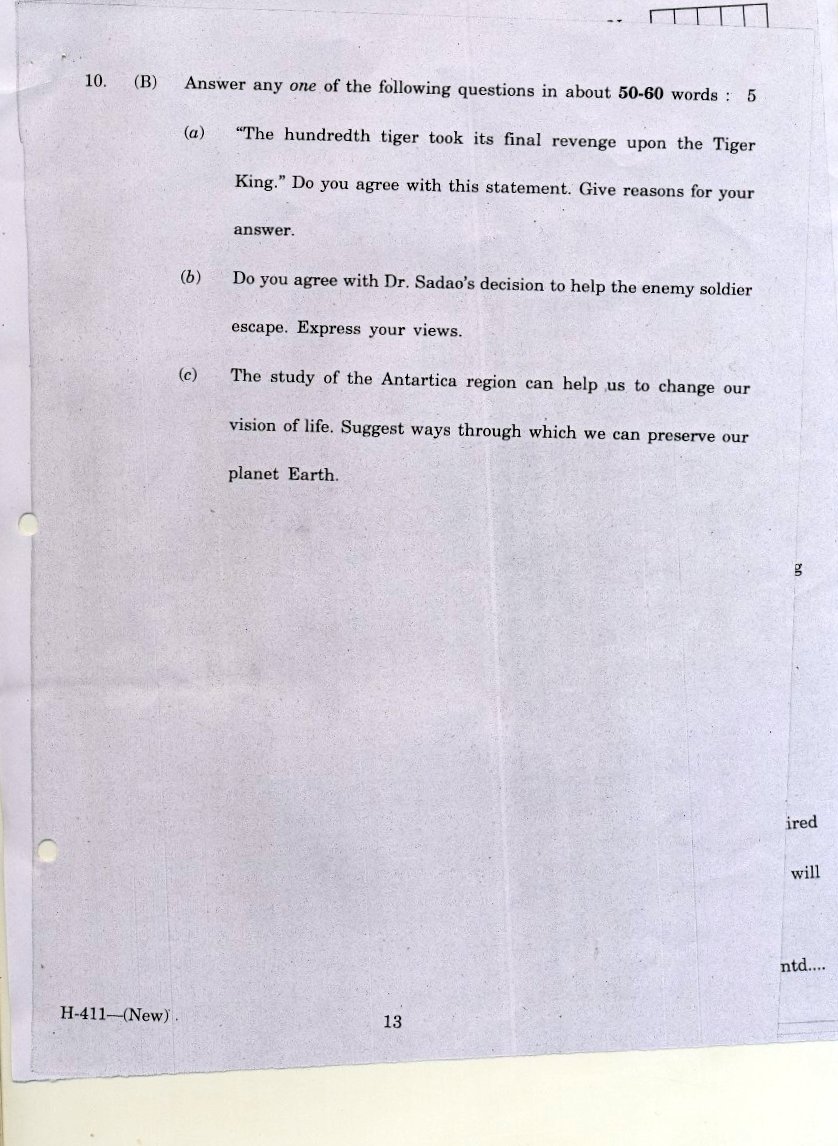Notes
THE LAST LESSON
Alphonse Daudet
HISTORIAL BACKGROUNG
Describe the background in which 'The Last Lesson' of Alphonse Daudet has been set.
What is the essential background for setting up ‘The last lesson’ by Alphonse Daudet?
CROUD AT THE TOWN HALL – (front of the bulletin-board)
What did Franz see when he passed in front of the town hall on the way to school?
Why was there a crowd in front of the bulletin-board at the town hall?
What had been put on the bulletin board?
ORDER FROM BERLIN
Describe the effect on life at school produced by the passing of Alsace and Lorraine to Prussian hands?
What changes did the order from Berlin cause in school that day?
What was the order from Berlin? How did that order affect the people of Alsace, particularly M. Hamel and his students?
1. What changes did the narrator find in the school when the order from Berlin came?
FRANZ
1. Who was Franz?
2. Write the character sketch of Franz, the little boy.
FRANZ IS LATE FOR SCHOOL
1. Instead of going to the school, why did Franz think of running away and spending the day outdoors?
2. What things tempted Franz to keep away from school?
3. What was the temptation and how did Franz resist it?
4. For Franz what was much more tempting than going to school and why?
5. When little Franz started late for school in the morning, what type of fears were making home in his mind?
6. Why didn't M. Hamel get angry with Franz for being late?
FRANZ ENTERS THE ROOM (Unusual calm at school)
1. Why were the old men of the village sitting there in the back of the classroom?
2. How was the scene in the school in the morning of the last lesson different from that on other days?
3. What did Franz notice that was so unusual about the school that morning?
4. Specify the relevant facts from the lesson that made Franz feel something strange and solemn about his school in the morning?
5. ‘I had counted on the commotion to get to my desk without being seen; ...', said Franz. How did he enter and what was the reaction of the teacher?
THE SHOCKING NEWS
1. How did M. Hamel give the shocking news to the students and the villagers and with what effect?
2. What was the troubling news that shocked all who were present in the school?
M. HAMEL DOES HIS USUAL JOB
1. How did M. Hamel teach his lesson in the class?
2. Describe M. Hamel’s dedicated service to the school in Alsace
M. HAMEL’S LAST LESSON (changes in M. Hamel)
1. Describe at least two changes that could be seen in M. Hamel after he came to know of that order from Berlin.
2. What did Franz see through the window when he reached his school?
3. What was the thing that surprised the narrator most? Why was everybody sad?
4. Why had M. Hamel put on his fine Sunday clothes?
5. What did M. Hamel the teacher teach in the last lesson?
6. How did the last lesson come to an end?
FRANZ FAILS TO TELL THE RULE FOR PARTICIPLE
1. What was Franz expected to be prepared with for school that day? Why was he in great dread of scolding?
2. How did Franz perform when his turn came to recite? How did M. Hamel react?
3. Why was Franz afraid when he was going to school that day?
FRANZ IS LOST IS THOUGHT
1. What did Franz feel when his teacher taught the last lesson on grammar?
2. What was Franz’s regret when he knew that Mr. Hamel was living the school forever?
3. What was the impact of the last lesson in grammar On Franz? How did he feel?
HAMEL PRAISES THE FRENCH LANGUAGE
1. Why did M. Hamel ask his students and the villagers to guard French among them?
2. "The people in the story realise suddenly how precious their language is to them." How do they realise it and who makes them realise it?
3. "We've all a great deal to reproach ourselves with." Why did M. Hamel blame the parents and himself too for not showing due attention and care to the learning of French?
4. What did M. Hamel tell the people in the class about French language? What did he ask them to do and why?
5. What is Linguistic Chauvinism? How do you classify M. Hamel's love and the villagers' concern for French?
6. Franz thinks: ‘‘Will they make them sing in German, even the pigeons?’’ What could this mean?
7. ‘When a people are enslaved, as long as they hold a fast to their language it is as if they had the key to their prison.’’ Explain.
FRANZ’S FEELINGS ABOUT M. HAMEL AND SCHOOL CHANGE
1. What did Franz think about M. Hamel? Did he change his views about M. Hamel?
2. Illustrate at least two changes that came in Franz towards his teacher, his school and French.
3. Franz attitude toward school as well as towards M. Hamel changes when he comes to know about the takeover of his village by the Prussian. Why?
4. How did Franz’s feeling about Mr. Hamel and school changed?
M. HAMEL’S LAST DAY AT SCHOOL.
1. How was M. Hamel a different teacher while giving his last lesson?
2. Give a brief note on the feelings, emotions and behaviour of M. Hamel on his last day in school.
3. How did M. Hamel say farewell to his students and the village elders?
4. During the last writing how did M. Hamel conduct himself?
5. What additional matters did M. Hamel touch on his last day?
M. HAMEL’S
1. Write a character sketch of M. Hamel.
2. Describe M. Hamel's service to the school in Alsace.
THE CHURCH-CLOCK STRUCK TWELVE
1. What was the parting message of M. Hamel to his students and the village elders who had gathered in the classroom?
2. How did Mr. Hamel conduct when the church bell struck twelve?
“THE LAST LESSON”
1. What idea do you form about the title of the lesson ‘The last lesson’?
2. Justify the title of 'The Last Lesson.'
3. When a people are enslaved what in the opinion of M. Hamel is the key to their prison
4. What message does the writer want to convey to the readers through 'The Last Lesson'?
Education Journal April 2011 - The Last Lesson
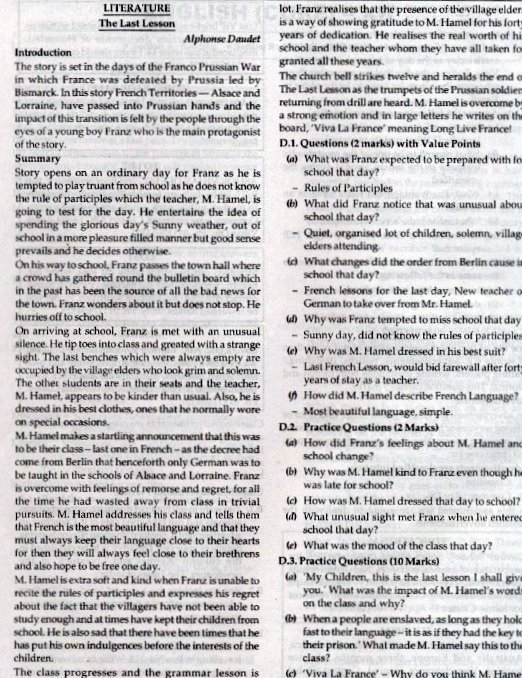
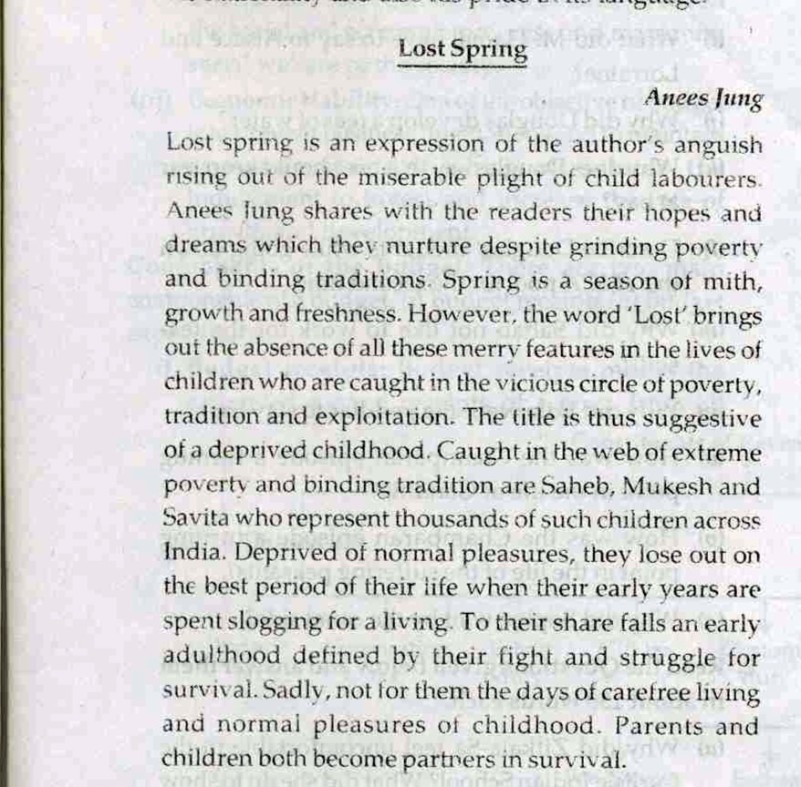
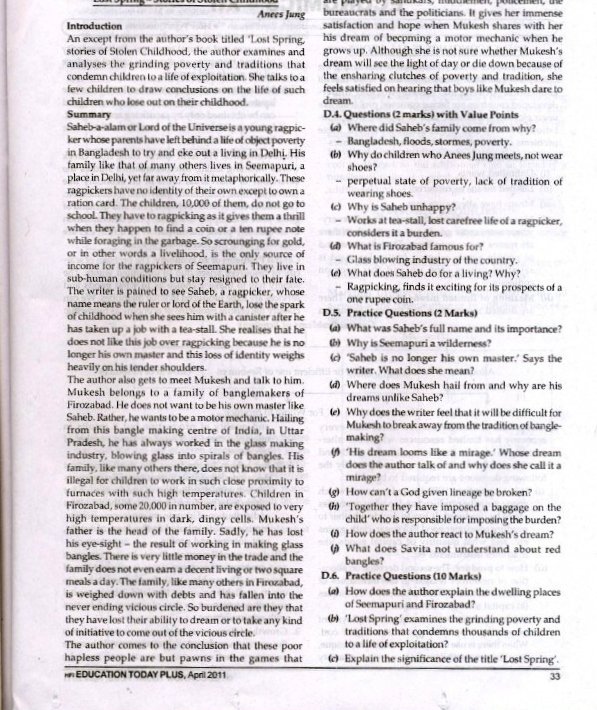
LOST SPRING
Anees Jung
ABOUT THE AUTHOR AND THE BOOK
1. What is the central theme in the writing: ‘Lost spring - stories of stolen childhood’?
2. Justify the title of the lesson, 'Lost Spring' by the author Anees Jung.
3. What message does Anees Jung attempt to give in her story 'Lost Spring’?
4. What is the unusual morning scene in the streets of the authoress Anees Jung?
5. How does the writer come to recognize each of the rag-pickers in her neighbourhood?
REASONS FOR MIGRATION
1. Mention some of the possible reasons for the migration of the people from the villages to the cities?
2. What did Saheb's mother say about leaving their home in Dhaka and coming to Seemapuri?
SEEMAPURI (A home for rag pickers from Bangladesh)
1. Seemapuri is 'a place on the periphery of Delhi yet miles away from it, metaphorically'. Justify this statement describing the colony or settlement of rag pickers.
2. 'Survival in Seemapuri means rag-picking'. Elucidate.
3. Describe the life and living conditions of the rag pickers of Seemapuri, including those of barefoot young scroungers.
4. Explain “survival in Seemapuri means rag-picking.”
5. Specify how rag-picking has acquired the ‘‘proposition of fine art’’ in Seemapuri.
6. What is the present state of Seemapuri?
7. Mention some of the problems faced by the squatters in the area of Seemapuri?
AUTHOR COMES ACROSS SAHEB-E-ALAM
1. Who is Saheb and where does he hail from?
2. What is Saheb looking for in the garbage dumps?
3. What do you gather about Saheb’s life and living conditions from the lesson?
4. Where does the narrator Anees Jung encounter Saheb every morning?
5. Saheb's full name is "Saheb-e-Alam". Why is it ironical?
6. Describe the contrast that Anees Jung brings out between Saheb and the son of the priest.
7. Describe Saheb's life and the life of the barefoot army of ragpickers in Seemapuri.
8. Write the character sketch of Saheb-e-Alam of Seemapuri.
SAHEB GETS A SMALL JOB
1. How does Saheb lose his freedom?
2. Why has Saheb lost his carefree look after getting a job in a tea stall?
3. Explain ‘‘Saheb is no longer his own master.’’
4. Describe Saheb's life-story from a ragpicker to a servant in a tea-stall? Why couldn't his new job make him happy?
5. How does Saheb feel working in a tea stall? Is he happier there?
SEARCHING FOR GOLD IN THE GARBAGE
1. “Garbage to them is gold.” Why does the author say so about the rag pickers?
2. Through the years rag-picking has acquired the 'proportions of a fine art' in Seemapuri. Justify the statement.
3. Garbage rag-picking means something for parents and the other, quite different, for their children. Explain.
4. How is the garbage heap wrapped in wonder for the children?
RAGPICKER BOYS
1. Give an account of the background of Saheb and the army of barefoot boys 'scrounging for gold' in the garbage dumps. Why did they migrate to Seemapuri?
2. What does Saheb look for in the garbage dumps? What are the hopes of other 10,000 ragpickers like Saheb?
3. Elucidate the statement: ‘‘Food is more important for survival than an identity.’’
4. 'Food is more important for survival than an identity for the ragpickers', says the author. Do you agree? Why?
5. How do their children become partners in their survival?
SAHEB GETS A PAIR OF TENNIS SHOES
1. Saheb and other rag pickers of his age don't wear shoes or 'chappals'. Why?
2. Why do these children remain barefoot?
3. What different excuses do the rag-pickers children offer for not wearing chappals?
4. How did Saheb get a pair of shoes?
5. Why do children walk barefoot, in cities or on village roads? Is it a tradition or something else?
6. What does Anees Jung mean by saying that the young boys like the son of the priest now wear shoes, but many others like the rag-pickers in her neighbourhood remain shoeless?
7. How did Saheb get a pair of shoes?
8. For Saheb, 'even shoes with a hole' is a dream come true. Explain the statement.
WHAT DOES THE AUTHOR SAY ABOUT PROMISES
1. Would you agree that promises made to the poor children are rarely kept? Why do you think this happens in the incidents narrated in the text?
2. Give a brief account of a man from Udipi?
3. Why is the narrator embarrassed at having made 'a promise that was not meant'?
FIROZABAD
1. Describe the kinds of bangles made in Firozabad.
2. Who is Savita? Does young Savita know the sanctity of bangles she helps make? Explain their sanctity for married women.
3. 'Little has moved with time in Firozabad', says Anees Jung. Why does she say so?
4. Which forces conspire to keep the workers in the bangle industry at Firozabad in poverty?
5. Describe the bangle-makers of Firozabad. How does the vicious circle of the 'Sahukars' and the middlemen never allow them to come out of a web of poverty?
6. What makes the city of Firozabad famous?
7. How do the activities of the bangle preparation go on in the narrow lanes of Firozabad?
8. Why do the bangle makers of Firozabad not organise into a cooperative?
CHILDREN WORK IN THE GLASS FURNACES
1. Describe the plight of about 20,000 child-workers who work in furnaces with high temperature in Firozabad. How are they exposed to the worst health hazards?
2. The life of bangle makers of Firozabad was full of obstacles, which forced them to lead a life of poverty and deprivation. Discuss with reference to ‘lost spring’.
3. How do the children become the victim of losing the brightness of their eyes?
4. Describe the hazards /working conditions of bangle workers in Firozabad.
5. What type of environment does the writer come across while walking with Mukesh?
VISIT TO MUKESH’S HOUSE
1. Describe Mukesh and his background.
2. How is Mukesh different from other children who work in bangle-industry and also from that of his family?
3. What does the writer witness after entering the house of Mukesh?
4. What has Mukesh’s father achieved after years of hard labour?
5. What does the grandmother of Mukesh comment?
MUKESH’S DREAM
1. What was Mukesh’s aim in life? What did he do to achieve it?
2. How is Mukesh different from the others of his family? Why is the author cheered when she sees him?
3. Who is Mukesh and how in your opinion can, Mukesh realise his dream?
4. Why does the authoress think that Mukesh’s dream seems to be looming like a mirage?
5. Write the character sketch of Mukesh with special reference to his dare, determination and strong will.
6. How is Mukesh ready to break the god-given-lineage of his family?
7. Mukesh wants to be his own master. Explain.
THEIR BELIEF IN DESTINY (the vicious circle)
1. "It is his karam, his destiny", says Mukesh's grandmother. Why can't they break their "God-given lineage"?
2. What forces conspire to keep the workers in bangle industry of Firozabad in poverty?
3. What custom prevails among the ladies of bangle makers?
4. What does Savita tell about the sanctity of bangles?
5. ‘The elderly woman has still bangles in her wrists, but no light in her eyes.’ Why?
6. Why don’t the younger ones of the bangle makers do anything else?
7. How have the bangle makers become the prey of their own trade? Explain.
8. What are the forces that conspire to keep the workers in the bangle factory of Firozabad in poverty?
GENERAL
1. Why should child labour be eliminated and how?
2. In what way does the writer analyse the grim state of poverty and tradition among the families of the rag-pickers and the bangle makers of Firozabad?
3. Compare and contrast the lives of the families of Seemapuri and Firozabad?
4. "I see two distinct worlds .... ." says Anees Jung. Draw a contrast between the two.
DEEP WATER
William o. Douglas
KNOCKED DOWN BY A WAVE (fear of water)
1. What had happened when William Douglas was ten or eleven years old?
2. How and why did Douglas develop an aversion/deep rooted fear for water?
3. How did the haunting fear of water ruin his fishing trips and other joys?
4. “This fear created a haunting fear in Douglas.’’ Explain.
5. What purpose does William O. Douglas have in recounting a childhood experience of terror and his conquering of it? What is the deeper or larger meaning that he draws from this experience?
6. Why did Douglas go to Lake Wentworth in New Hampshire? What did he do there?
7. Why did his mother warn continually against his going to the Yakima River?
THE MISADVENTURE AT Y. M.C. A POOL
1. What is the ‘misadventure’ that William Douglas speaks about?
2. How and why 'the big bruiser' of a boy of eighteen throw Douglas into the Y.M.C.A. pool?
3. A strong young man hurled him into the pool where it was nine feet deep. How did this experience affect Douglas?
4. How were the series of emotions and fears that Douglas experienced when he was thrown into the pool?
5. Describe Douglas’s condition when he was in the pool. What plans did he make to come to the surface?
6. Describe the various attempts that Douglas had to make while he was in the Y.M.C.A pool.
7. Which two different experiences did Douglas have during his misadventure?
8. Why did the narrator join the Y.M.C.A. pool for swimming?
9. Later, when he joined the Y.M.C.A. swimming pool, the unpleasant memories of childhood came back to him. Explain.
10. What does the mother of Douglas say about the Y.M.C.A pool?
11. How did Douglas feel when all efforts ceased?
12. How did the drowning experience affect Douglas?
13. What was the condition of his body when he was under water in the pool?
COMING UP – FIRST ATTEMPT
1. When did Douglas grow panicky?
2. How did Douglas feel when he went down for the first time in the pool?
3. What did Douglas plan when his feet hit the bottom?
SECOND TIME
1. Douglas went down the second time. Explain.
2. 'And then in the midst of the terror came a touch of reason.' What was that and did it succeed?
3. How did Douglas experience both the sensation of dying and terror of water but the ‘‘will to live’’ made him overcome his terror? Explain the relevant facts.
THE TIHIRD TIME
1. What happened when 'all efforts ceased?’
2. A third attempt and fear haunted him. Explain.
SAVED
1. How and when did he find himself lying beside the pool?
2. What did the chap that threw Douglas say in the end?
TRIES TO LEARN SWIMMING
1. Why was Douglas determined to get over his fear of water?
2. How did Douglas react sharply to get over his fear of water?
3. What step was taken by Douglas to conquer his water fear?
4. Why does Douglas as an adult recount a childhood experience of terror and his conquering of it? What larger meaning does he draw from his experience?
AN INSTRUCTOR HELPS HIM
1. How did the instructor ‘build a swimmer’ out of Douglas?
2. How did the instructor help Douglas to overcome his fear of water?
3. Douglas says: ‘The instructor was finished but I was not finished.’ Give a reason for this statement of the author.
4. What special methods did the instructor use to teach Douglas to swim?
TERROR AND FEARS OVERCOME
1. How did the terror of water create tension in the mind of Douglas?
2. How did Douglas get rid of his residual doubts?
3. How did Douglas make sure that he had conquered the old terror?
4. What was Douglas’s fear? How did he overcome that fear?
CONFIDENCE GAINED - FINAL VICTORY
1. How did Douglas overcome ‘‘the old terror’’?
2. How Douglas did come out of his oblivion?
3. What does Douglas mean to say ‘‘piece by piece, he built a swimmer’’?
4. How did Douglas make sure that he conquered the old terror?
5. Explain the meaning ‘‘All we have to fear is fear itself.’’
THE MEANINGFUL EXPERIENCE
1. William Douglas says, ‘‘the experience had a deep meaning for me.’’ Explain the statement. OR What did Douglas learn from his experience of drowning?
2. Write the character sketch of William O. Douglas.
3. What is the message of the lesson "Deep water”?
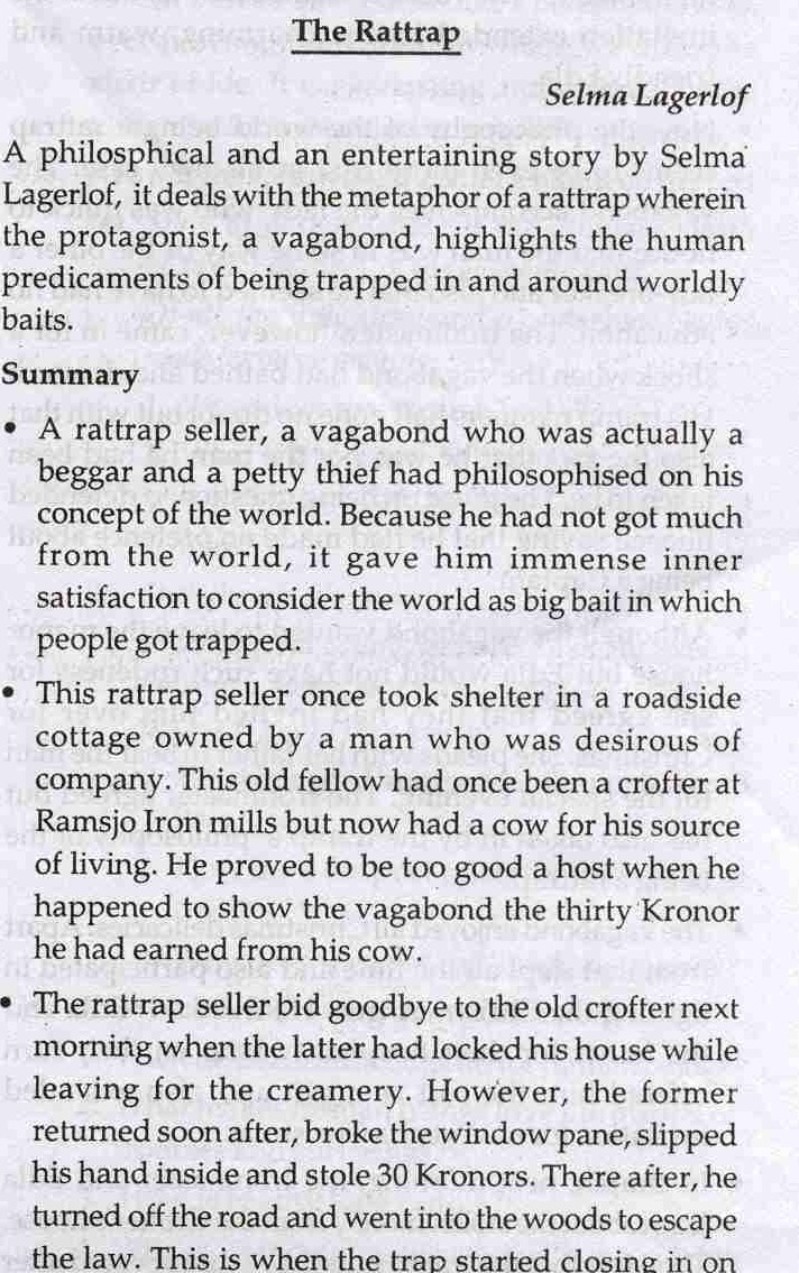
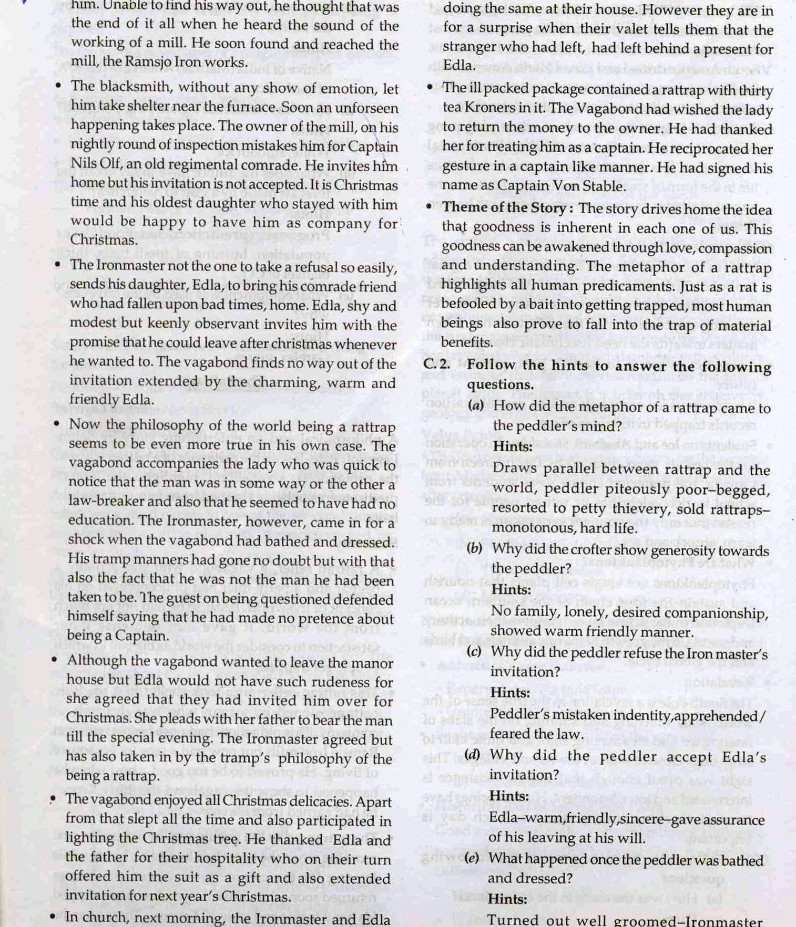
RAT TRAP
Selma Lagerlof
THE RATTRAP SELLER /PEDDLER
1. What did the Peddler sell and how did he make the things?
2. Why did the Peddler have to resort to both begging and petty thievery?
3. What kind of life did the Peddler lead and why?
4. Write the character sketch of the rattrap Peddler specifying his personality traits.
THE WHOLE WORLD IS A RATTRAP
1. How does the author employ the metaphor of 'rattrap' effectively in the story?
2. What did the Peddler think of the world and its people?
3. From where did the Peddler get the idea of the world being a rattrap?
4. Who trapped the Peddler thief and how?
A NIGHT AT THE CROFTER’S COTTAGE
1. Why was the old crofter so friendly and relaxed with the Peddler?
2. The crofter can be called a good host. Why?
3. What type of hospitality did the Peddler enjoy at the manor’s house?
4. How was the Peddler welcomed by the old crofter? Did he expect such hospitality?
5. Why did the Crofter show the thirty kronor to the Peddler?
6. What did the old crofter do with the pouch and why?
7. Give the character sketch of the crofter.
PEDDLER STEALS THREE TEN-KRONOR BANKNOTES
1. How did the Peddler betray the confidence reposed on him by the crofter? In what way did the Peddler rob the crofter?
2. How did the Peddler prove false to his host, the old crofter? Did he let himself voluntarily swept away by the bait?
3. How did the Peddler feel after robbing the crofter? What does his reaction highlight?
4. Did the Peddler respect the confidence reposed in him by the crofter?
TRAPPED INTO THE WOODS / FOREST – (The Peddler is caught in a rattrap)
1. Why did the Peddler decide to take his way through the forest?
2. How could the Peddler come out of the forest?
3. How could the hard regular thumping sound heard by the Peddler with his head on the ground, proved a fresh breather for him?
4. Why did the Peddler recall his thoughts about the world and the rattrap when he was lost in the forest?
5. What made the Peddler think that he had indeed fallen into a rattrap?
AT RAMSJO IRONWORKS
1. How did the Peddler come to the forge of the Ramsjo Ironworks?
2. Describe the activities that the Peddler noticed at the Ramsjo Ironworks.
3. Why didn't the blacksmith stop him from entering the forge?
4. What was going on at the Ramsjo ironworks when the Peddler reached there?
MEETING WITH THE IRONMASTER
1. What did the Ironmaster say to the Peddler when he saw him in the forge? Why did he invite him home?
2. Why did the Ironmaster speak kindly to the Peddler and invite him home?
3. The Ironmaster assumed that perhaps the Peddler felt embarrassed because of his miserable clothing. Why did he insist on his coming to the manor house?
4. Describe the Peddler's meeting with the Ironmaster.
5. What did the Ironmaster enquire from the valet? What answer did he get?
6. How did the Peddler react when he saw that the Ironmaster had recognized him ‘‘as’’ Nils Olof an old regimental comrade?
7. Why was it urgent on the part of the Ironmaster to need the company of Nils Olof’?
8. Describe the hospitality that the Peddler enjoyed while at the manor house of the Ironmaster.
PEDDLER DECLINE TO COME HOME
1. Why did the Peddler decline to come home with the Ironmaster?
2. Why did the rattrap Peddler say, ‘going into the manor would be like throwing himself voluntarily into the lion’s den?
3. Why did the Ironmasters’ invitation to the Peddler to spend Christmas Eve with him make him think that he was going to fall into a trap?
4. Why the Peddler did not accede to the Ironmaster’s request?
EDLA WILLMANSSON PERSUADES THE PEDDLER (accepts the invitation)
1. How did Miss Edla Willmanson persuade the Peddler to her house?
2. Why did the Peddler accept Edla’s invitation? How did he feel?
3. Why did the Ironmaster send his daughter to the forge? Did he succeed in his mission?
CHRISTMAS EVE
1. What did Edla Willmanson give the Peddler to understand after Christmas dinner?
2. How did Edla persuade the captain to stay with them for the Christmas cheer?
EDLA DOUBTS
1. What doubts did Edla entertain about the Peddler when she met him for the first time at the forge?
2. Why did Edla still entertain the Peddler even after she knew the truth about him?
3. What doubts did Edla have about the Peddler? Or what did Edla guess about the Peddler?
EDLA’ S PERSONALITY
1. Characterize Edla Willmansson.
2. How can you say that the young girl miss Edla Willmansson had a deep insight and understanding of human values?
STRANGER AGREES
1. How did the stranger agree to go to the Ironmaster’s house?
2. Compare and contrast the character of Ironmaster with that of his daughter.
IRONMASTER REALISED HIS MISTAKE
1. When did the Ironmaster realise his mistake?
2. How and when did the Ironmaster know the truth about the Peddler? How did he react after it?
3. How did the Ironmaster's daughter intercede for the vagabond when her father had asked him to leave the place at once?
THE PEDDLER DEFENDS HIMSELF
1. What did the Peddler say when the Ironmaster threatened to call the sheriff?
2. How did the Peddler defend himself against not having revealed his true identity?
3. What did the Peddler reveal about himself in his self defense?
4. What did the Peddler say in his defense when it was clear that he was not the person Ironmaster had thought he was?
SENSATIONAL NEWS AT THE CHURCH
1. What was the sensational news that the Ironmaster and his daughter heard at Church?
2. How did Ironmaster and Edla react on hearing the news at the church?
PEDDER CHANGES
1. What brought about a change in the life of the rattrap Peddler?
2. Why did the Peddler sign himself as ‘‘Captain Von Stable’’?
3. Write down Edla’s contribution in awakening the essential human goodness in Peddler.
THE PEDDLER LEAVES
1. When and how did the Peddler realise that his last moment had come?
2. What did Miss Willmansson find in the package? Why did she give a little cry of joy?
3. Why was Edla happy to see the gift left by the Peddler?
4. What did the Peddler write to Edla in his letter?
5. What was the Christmas present left by the Peddler for Miss Willmansson?
LESSON
1. Justify the title of the story 'The Rattrap".
2. What is the message conveyed by the story?
3. ‘‘The Rattrap.’’ Express the universal theme highlighted by the writer in the story.
4. Based on your reading of the story ‘The Rattrap’ what do you conclude to be the main cause of compelling a man to indulge in vices and sins?
5. The story also focuses on human loneliness and the need to bond with others. Explain.
6. How does the metaphor of rattrap serve to highlight the human predicament?
7. How does the Peddler interpret the acts of kindness and hospitality shown by the crofter, the Ironmaster and his daughter?
8. What idea suddenly struck in the mind of the rattrap Peddler? Why was he amused by the idea?
INDIGO
Louis Fischer
RAJKUMAR SHUKLA
1. Why is Rajkumar Shukla described as being ‘resolute’?
2. Who was Rajkumar Shukla?
SHUKLA WANTS GANDHIJI TO VISTI CHAMPARAN
1. Why did Rajkumar Shukla go to meet Gandhi?
2. How did Shukla succeed in persuading Gandhiji to visit Champaran?
3. What made Gandhi to surrender to the wish of Rajkumar Shukla and board a train to Patna in Bihar?
4. Why did Rajkumar Shukla want to take Gandhiji to Champaran?
5. Describe the efforts made by R.K. Shukla to persuade Gandhi to go to Champaran.
GANDHI
1. Why do you think the servants thought Gandhi to be another peasant?
2. List the places that Gandhi visited between his first meeting with Shukla and his arrival at Champaran?
3. What was the result of Gandhi’s conference with the influential people?
4. What did the servants at Rajendra Prasad's house take Gandhi to be? Why was he not allowed to draw water from the well?
5. What was the outcome of four protracted interviews that Gandhi had with the Lieutenant-Governor?
GANDHIJI’S VISIT TO BIHAR
1. Describe Gandhiji’s important journey to the Champaran district of Bihar.
2. Why did Gandhi go to Lucknow in December 1916? Who met him there and why?
3. Why was Gandhi never contented with large political or economic solutions while he was in Champaran district?
4. How did Gandhi teach us a lesson in self-reliance? Why did he oppose taking help from C. F. Andrews?
GANDHI AT CHAMPARAN
1. Why did Gandhi go to a nearby village in Champaran? Why did he come back without visiting the place?
THE INDIGO PROBLEM
1. How did Gandhi help the poor in Champaran to achieve freedom from fear? What made indigo share-cropping disappear?
2. Why did the British planters hire thugs? What did it lead to ultimately?
3. Why was the sharecropping arrangement irksome? What was its fate?
What would be the impact of synthetic indigo on the prices of natural indigo?
AT MOTIHARI
1. Why was the government baffled and what could Gandhi prove to them by the episode at Motihari?
2. Describe the trial of Gandhi in Motihari court during the Champaran movement.
3. Write down the proceedings at Motihari court.
IN MUZAFFARPUR
1. Why didn't Gandhi go straight to Champaran but stayed first at Muzaffarpur?
2. Why did Gandhi chide the lawyers of Muzaffarpur?
CALLED ON COMMISSION OF TIRHUT DIVISION
1. What was the outcome of Gandhi's meeting with (i) the secretary of the British landlords' association (ii) commissioner of Tirhut?
COMMISSION ENQUIRY
1. What were the findings and the results of the official enquiry commission?
2. Sir Edward Gait, the lieutenant governor appointed an official commission of enquiry into the indigo sharecroppers’ situation. What changes did it cause in their situation?
3. Why was the official enquiry commission appointed? What did the findings of the commission reveal? What was its impact on the British planters?
THE TRIAL
1. Why was Gandhi asked to leave the Champaran headquaters immediately?
2. Why did Gandhi give a statement pleading himself guilty?
3. Why was Gandhi allowed to remain at liberty by the magistrate?
4. How did the Mahatma help the authorities?
5. Why didn't the judge pronounce sentence for several days and allowed Gandhi to remain at liberty?
6. How did the Britishers and the other officials treat Gandhi during his investigations?
GANDHI AGREES TO THE SETTLEMENT
1. Why did Gandhi agree to a settlement of a 25 percent refund to the farmers?
2. How was the settlement for compensation reached between the English planters and the sharecroppers? Describe Gandhi's role in it.
3. The settlement of 25% refund to the farmers appeared rather small. Why did Gandhi agree to it and how did events justify his position?
GANDHI’S METHOD OF WORKING
1. Why did Gandhi say Champaran didn’t begin as an act of disobedience?
2. What was the Gandhi’s typical pattern of working?
3. How did Gandhi use satyagraha and non-violence at Champaran to achieve his goal?
4. "Civil disobedience had triumphed, the first time in modern India". Justify this statement.
5. How did the success of Champaran justify the ways and means adopted by Gandhi during the Civil Disobedience?
PEASANTS
1. How did the peasants react on hearing that Gandhi was in trouble with the authorities? How did Gandhi help the authorities?
2. Why did the indigo planters obtain new agreement from the sharecroppers to pay them compensation? Why did many sign willingly?
3. Did Gandhi help them to get an honourable settlement?
4. What did the poor peasant do to take Gandhi to Champaran?
5. Which episode changed the plight of the peasants?
6. How did the peasants Demonstration courage?
ENGLISH LANDLORDS OF CHAMPARAN
1. What was the long-term contract or agreement that English landlords had made with the sharecroppers of Champaran? How was it exploitative?
2. How did even illiterate sharecroppers see through the trick and fraud of the English landlords? Why did they want their money back?
3. How did Gandhi help the poor peasants of Champaran from exploitation from the landlord?
4. Describe the exploitation of the indigo sharecroppers by English landlords in Champaran.
5. What did the peasants pay the British landlords as rent? What did the British now want instead and why?
THE IDEA OF THE DEPARTURE OF THE BRITISH
1. Mention the facts that compelled Gandhi to decide the departure of the Britishers from India?
2. Who was Charles Freer Andrews? Why did Gandhi oppose his help in the Champaran battle for peasants?
3. How did Gandhiji make the peasants of Champaran free from the fear of Britishers?
UPLIFT / SOCIAL WORK IN CHAMPARAN
1. What were the steps taken by Gandhiji to solve the problems of social and cultural backwardness in the villages of Champaran?
2. 'Gandhi's politics were intertwined with the practical day-to-day problems of the millions'.
3. Gandhi never contented himself with large political or economic solutions. He wanted to do something to improve the cultural and social backwardness in the Champaran villages. Give a reasoned answer.
4. What was done to improve the miserable health condition?
CHAMPARAN EPISODE – A TURNING POINT
1. When and why did Gandhi declare: "The battle of Champaran is won”?
2. How did Champaran episode prove to be a turning point in Gandhiji’s life? Explain with reference to the text ‘Indigo.’
MEETING WITH LAWYERS
1. How did Gandhi persuade the lawyers to follow him into jail?
2. How did Gandhi convince the lawyers about Charles Freer Andrews?
3. How was Gandhi able to influence the lawyers?
4. What was the attitude of the average Indian in smaller localities towards advocates of home ‘rule’?
FREEDOM MOVEMENT
1. 'Self-reliance, Indian independence and help to sharecroppers were all bound together', says Louis Fischer about Gandhi. Explain giving examples from the text.
2. How did Civil disobedience triumph the first time in modern India?
3. How do we know that ordinary people too contribute to the freedom movement?
GENERAL
1. What are the qualities of a good leader?
2. ‘‘Freedom from fear is more important than legal justice for the poor.’’ Do you think that the poor of India are free from fear after independence?
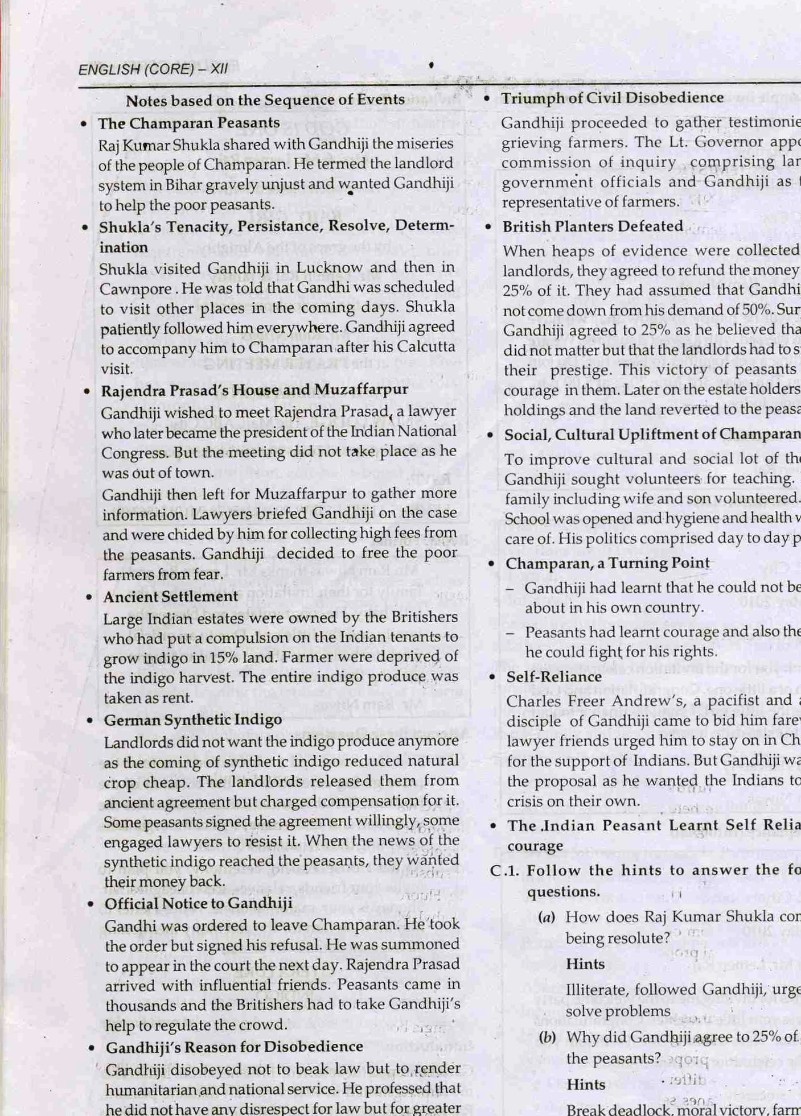
POETS AND PANCAKES
Asokamitran
THE GEMINI STUDIOS
1. How does Asokamitran point out the hectic working of the Gemini studios?
2. Why was the Gemini Studios the favourite haunt of poets/ people?
3. What was specific about the Gemini studios in India?
4. What detail do you get about Robert Clive’s stay in Madras?
PANCAKE
1. What was pancake and what was it used for?
2. Why ‘Pancake’ was brought in truck-loads in the Gemini Studios?
3. Those who subjected to make-up, what kind of miseries did they face?
MAKE-UP DEPARTMENT OF THE GEMINI STUDIOS
1. Describe the makeup department of the Gemini studios.
2. What used to be the job of the make-up gang at the Gemini studios?
3. How was a strict hierarchy maintained in the make-up department?
4. There was a great deal of national integration in the make-up department. Why does the narrator say so?
OFFICE BOY
1. What work did the ‘office boy’ do in the Gemini studios?
2. Why did the ‘office boy’ join the studio? Why was he disappointed?
3. Why did the boy in the makeup department come to the author?
4. Why was the office boy frustrated? Who did he show his anger on?
5. Compare and contrast Subbu and the 'office-boy'.
SABBU
1. Write the character sketch of Kothamangalam.
2. Subbu is described as a many sided genius. List his special abilities.
3. Why was kothamangalam Sabbu considered No.2 in the Gemini studios?
4. Sabbu was ‘tailor made for films.’ How did he use his genius in various activities in the Gemini studios?
5. Who was Subbu’s enemy? Why?
6. 'Film-making must have been and was so easy with a man like Subbu around'. Justify.
7. Describe Subbu as an actor.
8. How can you identify Subbu as a poet?
9. Write down something special about Subbu’s novel ‘Thillana Mohanambal.’
10. How did Subbu give a new definition and direction to the Gemini studios during its golden years?
BOSS
1. Who was the boss of the Gemini studios?
2. Who was Sabbu’s Principal? How did Subbu identify himself with his principal/boss?
3. Why was the boss fond of Subbu?
AUTHOR:
1. Why did the author appear to be doing nothing at the studios?
2. Why did everybody in the studio think of giving the author some work to do?
3. What was the job of the narrator?
4. How does the author describe the story department?
5. Write down Asokamitran’s ideas about prose writing?
6. Why was the author praying for the crowd shooting at all the time?
LEGAL ADVISER:
1. Why was the legal adviser referred to as the opposite by others?
2. What made the lawyer stand out from the others at the Gemini studios?
3. In what way was the lawyer ‘A man of cold logic in a crowd of dreamer’?
4. What did the lawyer do in the Story Department? What was his job?
5. How did the lawyer unwittingly bring an end to a brief and brilliant career of a young actress?
6. How was the lawyer completely out of tune with all others at the Gemini Studios?
ACTRESS:
1. How was the brilliant career of an actress brought to an end?
2. How did the career of an extra- talented actress come to end of the Gemini studio?
ARRIVAL OF MORAL RE-ARMAMENT ARMY (MRA)
1. What was moral rearmament army? What was its message?
2. Show that Gemini studio was influenced by the plays staged by M.R.A?
3. How was the Gemini Studios and other Tamil plays influenced by the plays staged by M.R.A.?
4. How did the two plays of M.R.A influence the drama community?
5. Describe the visit of the moral re-armament army at the Gemini studios and how did the Gemini family take its visit?
6. Describe Frank Buchman's Moral Re-Armament Army and its visit to the Gemini Studios.
7. Why and how was the moral re armament army welcomed at the Gemini studio?
POLITICAL VIEWS:
1. Did the people at the Gemini studios have any particular political affiliations? Why?
2. Why were all the people at the Gemini studios averse to the term ‘communism’?
3. Most of the people at the Studios had no affiliations to political thought of any kind but they were all averse to the term 'Communism'. Give a reasoned answer.
ENGLISHMAN
1. Who was the English visitor to the studios?
2. Why is the Englishman’s visit referred to as unexplained mystery? How was it solved?
3. How did the author discover who the English visitor to the studios was?
4. What caused the lack of communication between the Englishman and the people at the Gemini studios?
5. How does the author describe the incongruity of an English poet addressing the audience at Gemini studios?
6. Who was Stephen Spender? How was he connected with (i) 'Communism' (ii) 'The Encounter' and 'The God That Failed’?
7. What does ‘The god that failed’ refer to?
8. Who was the next visitor at Gemini studios in Madras after M.R.A?
TITLE:
1. The author has used gentle humour to point out human foibles. Pick out instances of this to show how this serves to make this piece interesting?
2. How there is a good note on ‘humour’ in the lesson, Poets and Pancakes?
3. Asokamitran has used humour and satire effectively in ‘Poet and pancakes.’ Discuss.
4. What was the low priced book ‘The god that failed’ about?
5. In the lesson ‘The poet and the pancakes’ the author described not only the production of films at the Gemini studios but also gives details of some other activities. Explain.
6. What does Asokamitran’s lesson ‘Poets and pancakes’ deal with?
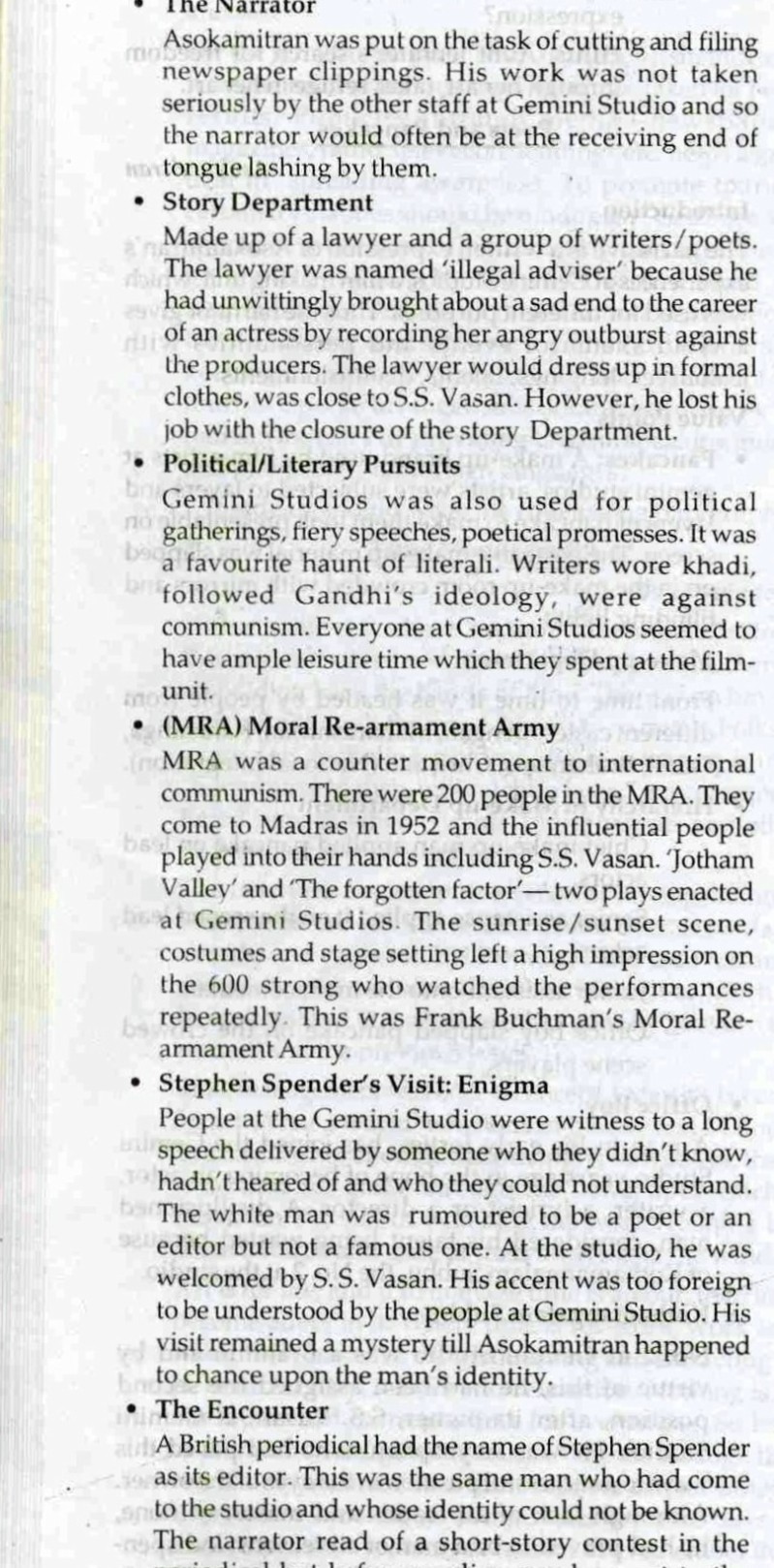
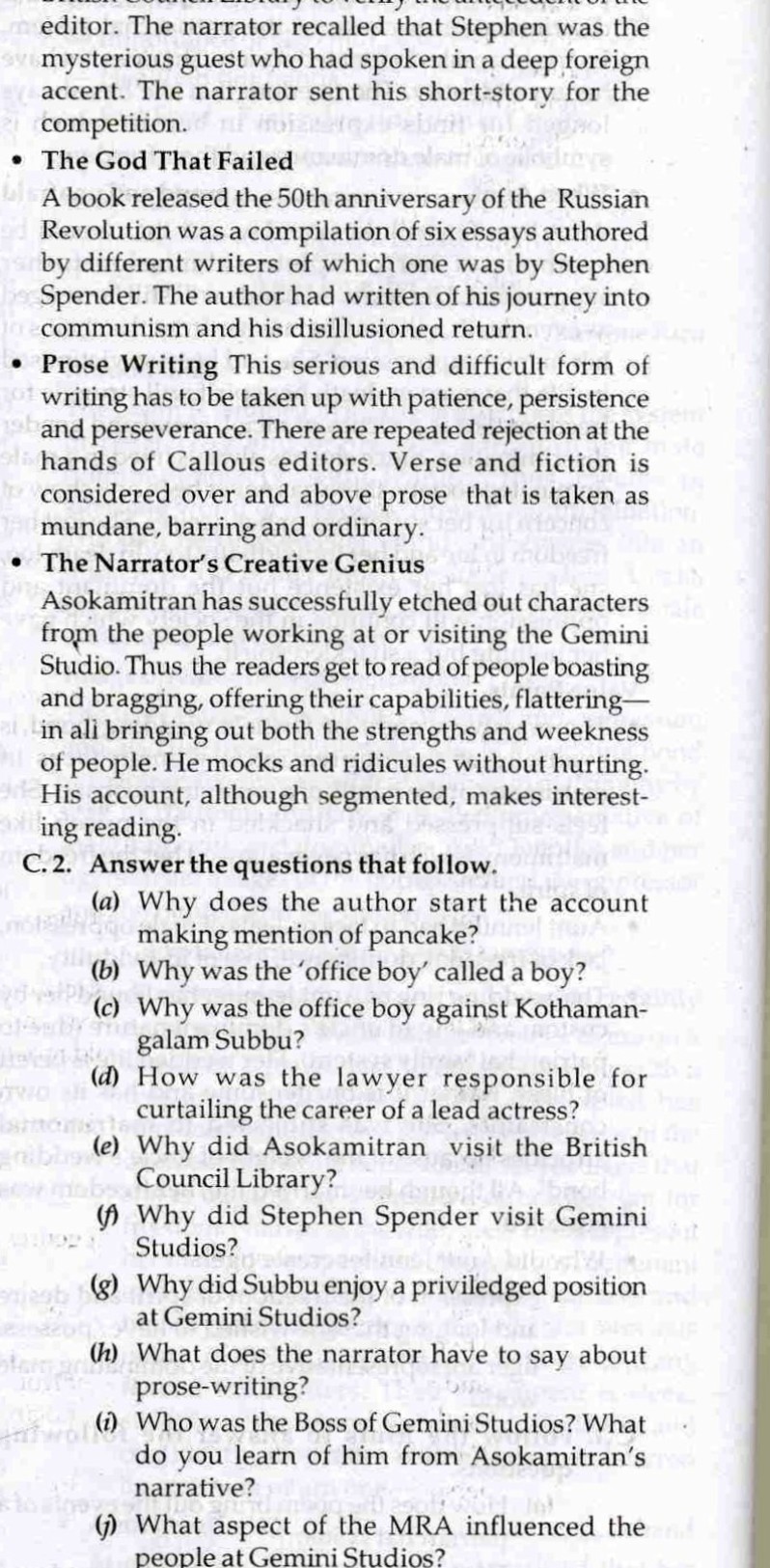
THE INTERVIEW
Christopher Silvester
Umberto Eco
JOURNALISM:
1. How have interviews become a commonplace of journalism?
2. What is the belief in some primitive cultures of being photographed?
INTERVIEW:
1. What is the position of the interviewer during the interview?
2. Explain ‘Denis Brain’s statement ‘‘Almost everything of moment reaches us through one man asking questions of another.’’
3. How do many literate people take interview?
4. Interpret: ‘‘interview is like the thumbprints on windpipe.’’
5. What has happened over the last 130 years in respect of the interview?
6. Describe opinions for and against the interview as given in the lesson.
VIEWS ON INTERVIEW:
1. What do Rudyard Kipling and his wife comment about the interview?
2. What was the contrasting view of H.G.Wells?
3. What does Davis Brian say about the position of an interviewer?
4. What are the views of Lewis Carroll about the interview?
5. Why did Rudyard Kipling refuse to be interviewed?
POSITIVE ASPECTS:
1. What are some of the positive views/features of interview?
2. In spite of the 'drawbacks' the interview is a 'supremely serviceable medium of communication'. Justify the statement.
NEGATIVE ASPECTS:
1. Write down the views of some of the people who hate being interviewed.
2. Describe some of the negative features of the interview as pointed out by famous writers and celebrities.
CELEBRATIES:
1. Who in today’s world are chief sources of information - about personalities?
2. Why do most celebrities condemn / despise being interviewed?
3. Why some celebrities despise the interview as an 'unwarranted intrusion' into their lives?
4. What is an interview and how do celebrities find favour with it?
UMBERTO ECO:
1. Who was Umberto Eco?
2. Do you think Umberto Eco likes being interviewed?
3. What picture do you form of Umberto Eco after reading the interview by Mukund Padmanabhan?
4. Point out the essential talks that were held between Umberto Eco and the Padmanabhan of the Hindu.
5. What were the remarks of a professor when Eco presented his doctoral dissertation in Italy?
6. What does Umberto Eco remark about Lodge’s observation about him?
7. How does Umberto Eco pursue his philosophical and academic interests?
ECO’S WRITING STYLE:
1. What are the salient features of Umberto Eco’s writing?
2. What was distinctive about Eco’s academic writing style?
3. Why did Umberto Eco prefer himself to be called an academician than a novelist?
4. Why did Umberto Eco start writing novels at the age of 50?
5. Why did he say that he was a professor who wrote novels on Sundays?
6. How has he developed a non-fictional style? What does he say about his novel writing?
7. What is the specialty of Eco about his book for children?
8. When and how did Eco learn the technique of writing scholarly books?
9. How does Eco’s non fictional writing different / departure from the regular scholarly work?
10. What does Eco tell about this dear writer Ronald Barthes?
TIME MANAGEMENT
1. David Lodge once remarked about Umberto Eco: "I can't understand how one man can do all the things he (Eco) does". What does Umberto Eco say to the interviewer?
2. How does Umberto Eco explain his capacity of doing so much work?
3. How does Eco find the time to write so much?
4. What are 'interstices' and how does Eco use them?
5. How does Eco explain his theory of ‘Interstices’? How does he make use of it?
6. How does Eco prove David Lodge’s point that Eco is capable of doing many things simultaneously?
7. What is the secret of Umberto Eco’s working style?
'THE NAME OF THE ROSE.'
1. Why didn't Umberto's American publisher expect not to sell more than 3000 copies of 'The Name of the Rose’? OR What did the publisher think of 'The Name of the Rose'?
2. State the reason for the huge success of the novel, 'The Name of the Rose' in spite of it being 'a very serious novel'.
3. 'The Name of the Rose' deals with medieval history. Was it responsible for the novel's success?
4. Describe the distinct style of 'The Name of the Rose'.
5. While having his interview with Mukund Padmanabhan, Umberto Eco reveals his philosophy and his novel ‘‘the name of the Rose.’’ What does he point out?
6. What do you know about Umberto Eco’s novel ‘The name of the Rose’? How it is a mystery for him?
TITLE
1. Justify the title 'The Interview'.
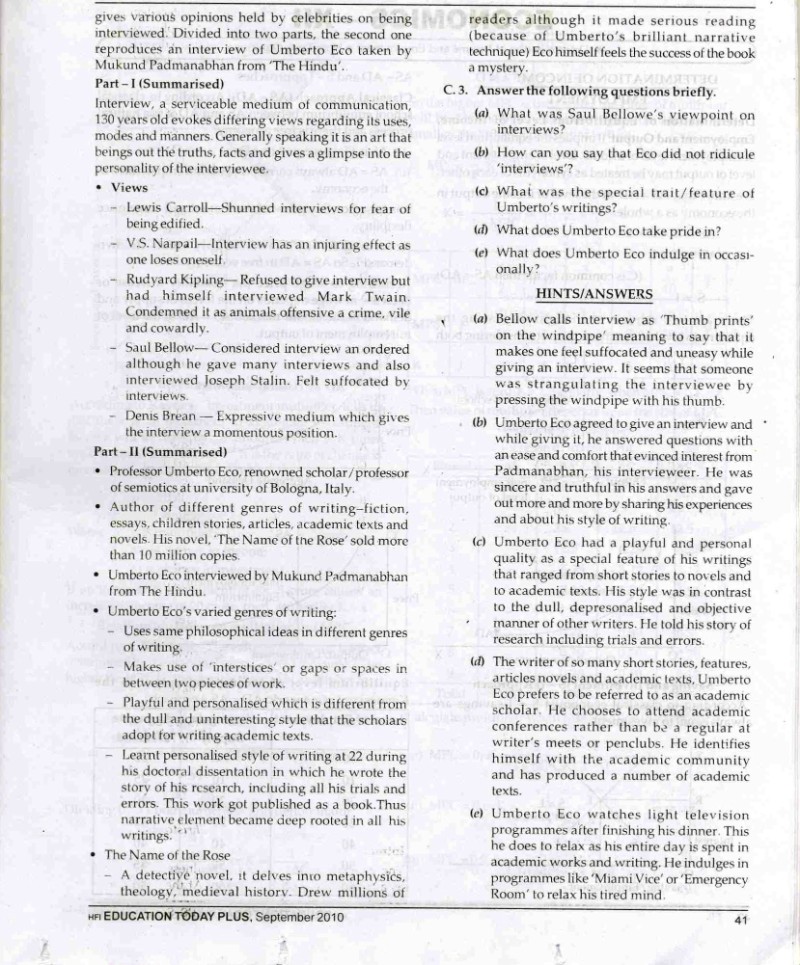
GOING PLACES
A.R. Barton
SOPHIE’S FAMILY:
1. What socio-economic background did Sophie belong to? What are the indicators of her family’s financial status?
2. When back home, why did Sophie feel a tightening in her throat?
3. What was the Weekly pilgrimage that the family carried out?
4. What were some of the reactions that Sophie would receive from her family members?
SOPHIE:
1. What were Sophie’s views about the vast world around?
2. What does Sophie want to do after she passes out of school?
3. Why did Sophie choose to walk by the canal? What did she do there?
4. At what stage Sophie uttered, ‘‘how can you believe what people?’’
5. What was going on in Sophie’s mind about people and places unknown to her?
6. Sophie would sit for hours wishing Danny would come. What made her sad and despondent in the end?
A DREAMER: -(Sophie – an imaginative girl)
1. What are some of Sophie dreams? What were her special fascinations?
2. Sophie was an incurable dreamer and escapist having no relation to the realities of life. Explain.
3. What was Sophie’s height of fantasizing as a teenager?
4. "Sophie's dreams and disappointments are all in her mind". Discuss.
5. Does Sophie have means to fulfill her dreams?
6. What were the options that Sophie was dreaming of? Why does Jansie discourage her from having such dreams?
SOPHIE NARRATES HER IMAGINARY MEETING (with Danny Casey)
1. What was the autograph riddle? Did Sophie succeed?
2. Write Sophie’s description about her first meeting with Danny Casey.
3. How does Sophie describe her imagined meeting with Danny Casey to Geoff?
4. Does Geoff believe that Sophie says about her meeting with Danny Casey?
5. Why Sophie did not want Jansie to know about her story with Danny?
6. How did Jansie react at Sophie's story of her meeting with Danny Casey?
7. What did Sophie tell Jansie about her meeting with Danny Casey?
8. Why does Jansie say: "Sophie, you really should be sensible”?
9. Why did Sophie wriggle when Geoff told her father that she had met Danny Casey?
JANSIE:
1. Write a character sketch of Jensie.
2. Jansie is Sophie's classmate and friend but doesn't entertain any 'wild dreams' like her. Why?
3. While Sophie has no touch with reality, Jansie's feet are firmly planted on the ground. Draw a contrast between the two citing examples from the story.
4. Where was it most likely that the two girls would find work after school? Why?
JOB GEOFF (first to share Sophie’s secrets)
1. Who was Geoff? How did he share Sophie's secrets though he had a temperament and thinking different from his sister?
2. What Job Geoff is engaged in? Does he entertain wild dreams like his sister?
3. Why was Sophie jealous of Geoff’s silence?
4. What did Sophie think of Geoff?
5. Why did Sophie like her brother Geoff more than any other person? From her perspective, what did he symbolize?
6. How does Sophie include her brother Geoff in her fantasy of her future?
7. Why did Sophie curse Geoff? Why did she say that "it was not a Jansie thing"?
8. What did Geoff mean by saying, ‘Casey must have strings of girls?’
9. How did Geoff reason out with Sophie?
DANNY CASEY
1. Who was Danny Casey? Why were the members of Sophie's family so crazy after him?
2. What does Sophie describe about her supposed/ imagined meeting with Danny Casey?
3. Why was Sophie fascinated by Danny Casey?
4. What arguments did Sophie put forth to prove that the Irish genius Casey was innocent?
5. Did Sophie ever/ really meet Danny Casey?
SOPHIE GOES TO MEET DANNY CASEY
1. Did Sophie meet Danny Casey personally at the canal side?
2. "Casey must have strings of girls" warns Geoff. He also says of Casey: "As if he'd ever show up". Why does Geoff say such things about Casey to Sophie?
3. ‘It was a perfect place, she had always thought so.’ Which is the place described and what made it so perfect?
4. Sophie sat down waiting under a solitary Elm tree. Why?
5. It was a Sheer imaginations and utter disappointment at the end for Sophie. How?
SOPHIE'S FATHER
1. Describe the character and temperament of Sophie’s father?
2. How does Sophie's father react when Geoff tells him about her meeting with Danny Casey?
3. Why was the visit of Sophie's father and his family to watch United 'their weekly pilgrimage'?
4. Describe Sophie's father highlighting his passion for football and his strange habits.
5. What was his attitude to Sophie? Does the father believe her story?
TITLE
1. Do you think the title by A.R. Barton ‘Going places’ appropriate?
2. In the story ‘Going places’, the author A.R. Burton has successfully taken the readers to places. Elaborate.
3. Sophie’s Dreams and disappointments – all in her mind. Explain.
Vistas
THE THIRD LEVEL
Jack Finney
GRAND CENTRAL STATION (the third level)
1. What does the Grand Central station symbolize? Or what does the third level refer to?
2. Why does Charley say that Grand Station is growing like a tree?
3. What does Charley compare the Grand Central Station to and why?
4. Give a description of the ‘third level’ - people and appearances.
CHARLEY REACHES THE THIRD LEVEL
1. Do you think that the Third Level was a medium of escape for Charley? Why?
2. Why did Charley run back from the third level?
3. Describe Charley. Do you think his being on the third level at Grand Central Station was a waking-dream wish fulfillment?
4. Why could Charley not reach the third level again?
GETS LOST WHILE HEADING FOR THE SUB-WAY
1. What happens when Charley enters the Grand Central Station?
2. How did the narrator get lost when he was heading for the sub-way?
3. Now I don’t know why this should have happened to me’. Charley wondered why he alone took a flight to the ‘third level’. Why did it happen to him?
4. What did the president of the New York Central and the New Haven and Hartford railroads swear? What did the narrator claim?
CHARLEY’S UNUSUAL EXPERIENCE
1. How did Charley know that he had bumped into the past?
2. Specify some of the unusual things that the narrator noticed at the Third Level of the Grand Central Station.
3. Bring out the contrast between the world that Charley lived and the one that he strayed into.
4. How did Charley reach the Third Level of the Grand Central Station, New York? Describe his experience there?
CHARLEY CONSULTS A PSYCHIATRIST
1. After finding the Third Level of the Grand Central Station, why did Charley consult a psychiatrist?
2. How does Sam view Charley’s concept of the Third Level? How was he entrapped into it?
3. How did the narrator’s psychiatrist friend analyze his claim of being at the third level of Grand Central Station?
4. How did the psychiatrist explain Charley’s flight to the non-existent ‘Third Level’?
5. What does Sam, a psychiatrist friend of Charley, opine about Charley and his visit to the Third level?
CHARLEY PREPARES TO GO TO GALESBURG
1. How did Charley prepare to go to Galesburg? Why couldn’t he reach there?
2. My three hundred dollars bought less than two hundred in old style bills, but I didn’t care’. Explain.
3. How did the narrator get the old-style currency? Why couldn’t he buy two tickets for Galesburg in spite of having the currency used in 1894?
4. “That ain’t money, mister,” said the clerk to the narrator. – Why did he warn the narrator?
5. What made the ticket Clerk think that Charley was trying to cheat him?
CHARLEY AND LOUISA
1. Describe the relationship that Charley and Louisa enjoyed with each other.
2. Why did Charley want to visit the city of Galesburg with his wife Louisa, after reaching the Third Level at Grand Central Station, New York?
3. Why did Louisa stop Charley from looking for the third level?
4. Why was Louisa worried?
OLD WORLD OF 1894 (Escape into the past)
1. Describe Galesburg Illinois in 1894. Why did the narrator want two tickets to Galesburg, Illinois?
2. What made Charley confirmed that he was standing in the year 1894?
3. Why do Charley and Sam both fancy about the Third Level and going to Galesburg in 1894?
STAMP COLLECTING
1. What did his stamp collecting point to?
2. Why did Charley’s grandfather, who lived in the good old days, when life was tension-free pursue the hobby of stamp-collection?
3. Philately helps keep the past alive. Explain.
4. What do you understand by a first-day cover? Who had sent that “first day cover”?
5. What strange thing was found among the oldest first day covers? How did it come there?
6. What was written in Sam’s letter to Charley?
7. When Charley was looking at the oldest “first day cover”, what type of strangeness occupied his mind?
SAM’S LETTER
1. Why was Sam attracted towards Galesburg?
2. What do you interpret / infer from Sam’s letter to Charley?
3. Sam’s letter is a fine blend of both reality and fantasy. Explain.
4. Why did Charley think that Sam had escaped to Galesburg?
5. Did Sam really go to Galesburg or was it a figment of Charley’s imagination?
THE PSYCHIATRIST FRIEND GOES TO GALESBURG.
1. Who was Sam? Why do you think he escaped to Galesburg?
2. Why had Sam decided to settle in the city of Galesburg, Illinois in his imaginary world?
3. How did Charley come to know that Sam had found the third level?
4. What is Sam’s old business and why he can’t go to it? Or “ He certainly can’t go back to his old business, not in Galesburg, Illinois, in 1894.” What does it mean?
LESSON
1. ity in “The Third Level’?
6. What did the narrator say about his escapism from the real worThe modern world in full of insecurity, fear, war, worry and stress. How/ in what ways do we overcome/ combat them.
2. Charley was a modern man who was haunted by insecurity, war and worry and who could not get over his fear even at the third level. Comment.
3. What do you think of the human tendency to constantly move between the past, present and future?
4. Do you see an intersection of time and space in the story?
5. How does Jack Finney interweave fantasy and realld?
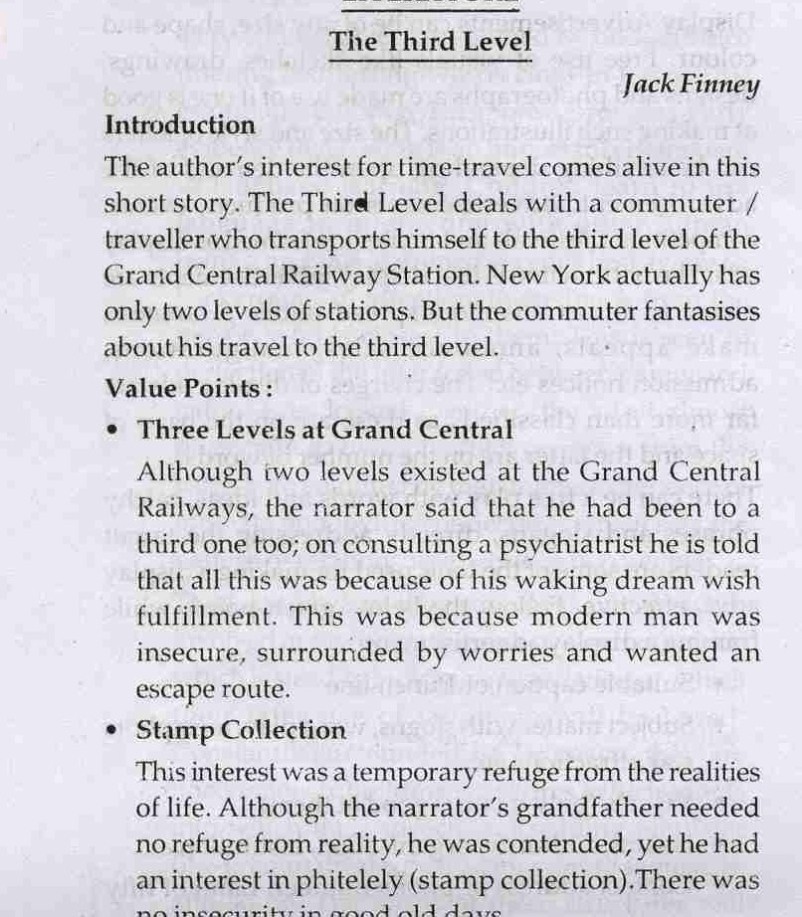
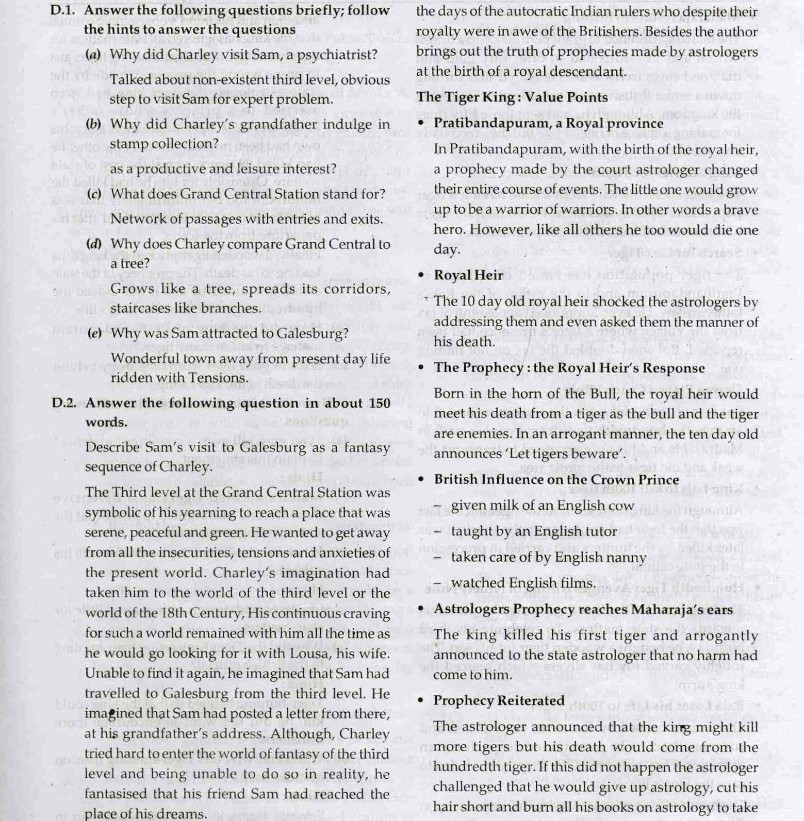
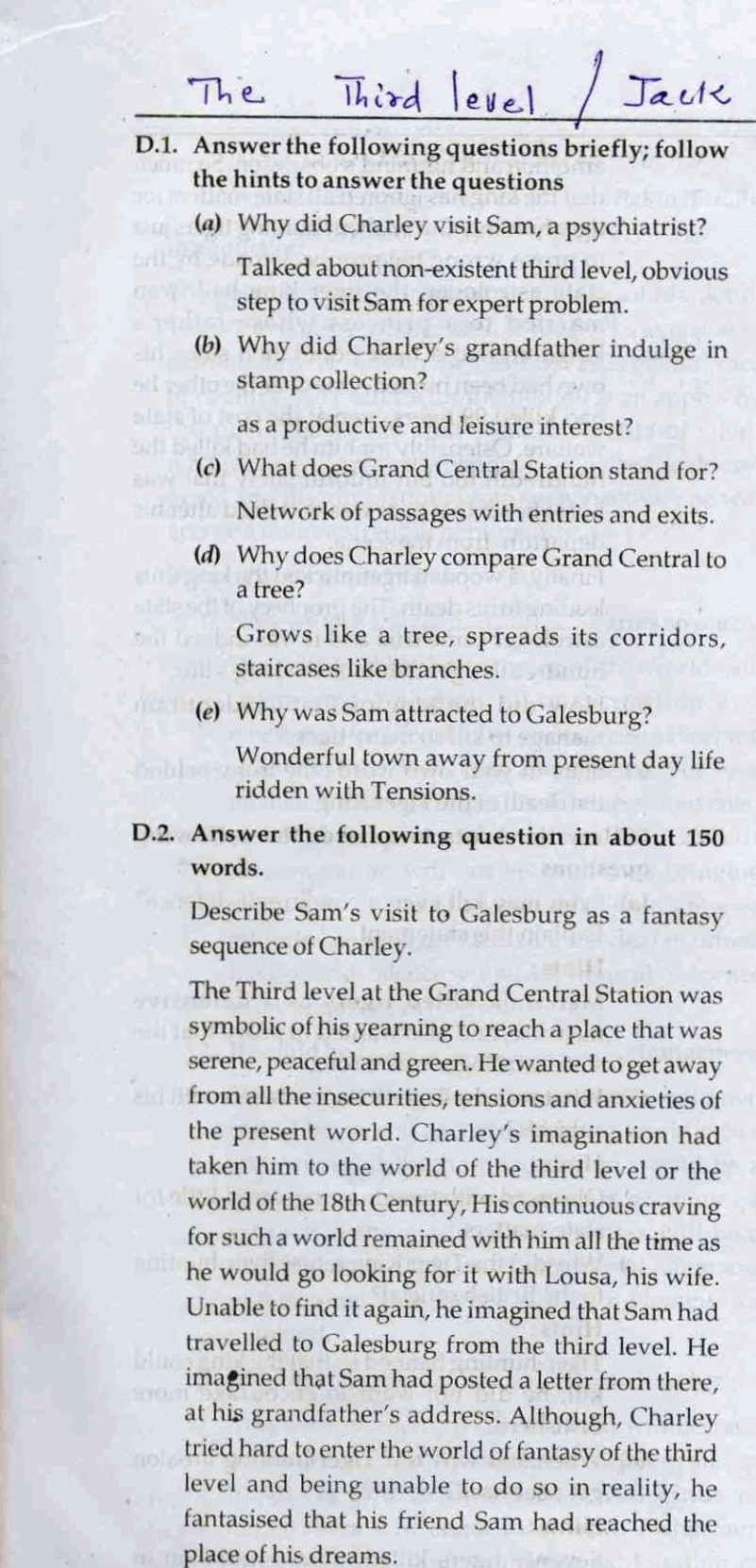
THE TIGER KING
KALI
ASTROLOGER’S PREDICTION
1. What predictions did the astrologers make at the birth of the Tiger King?
2. What does the Chief Astrologer tell to be the cause of Maharaja’s death?
3. What did the state astrologer say he would do ‘if the hundredth tiger was also killed’?
4. How did the Maharaja disprove the prediction of the astrologers?
THE TIGER KING
1. Who is the Tiger King? Why does he get that name?
2. What did the Royal Infant grow up to be?
3. In what way was the Prince Jung Jung Bahadur brought up and when did he take the reigns of his state?
4. Write the character sketch of the King of Pratibandapuram.
5. Why Maharaja of Pratibandapuram was called Sata Vyaghra Samhari?
A MIRACLE HAPPENED – (ten-day child speaks)
1. Why does the ten-day-old prince Jung Jung Bahadur utter the words “Let tiger beware”?
2. How did the royal infant astonish the astrologers?
3. What great miracle took place and why did the people stand stunned?
BANNING THE TIGER HUNTING
1. Why did the Maharaja ban tiger hunting?
2. Why was it celebration time for tigers in Pratibandapuram?
3. What steps were initiated by the Maharaja in order to ban the tiger killing in the state?
THE MAHARAJA STARTS OUT ON A TIGER HUNT
1. What did the Maharaja decide to do when he remembered the astrologer’s prediction?
2. Why did the Maharaja of Pratibandapuram take the decision of killing the tigers?
3. What dangers did the Tiger King have to face during his tiger hunting?
4. What did the Maharaja feel when he killed the first tiger? What did the State Astrologer say at that occasion?
5. “What if the hundredth tiger was also killed” asked the Maharaja. What did the State Astrologer say to the king then?
THE UNFORSEEN DANGER
1. Why was the Maharaja sunk in deep gloom?
2. How there came an unforeseen trouble during the tiger hunt of the Maharaja?
3. What was unforeseen hurdle that brought the Maharaja’s tiger hunt to a halt?
4. Why did the Maharaja’s tiger killing mission come to a sudden standstill?
5. How did the anxiety of the Maharaja reach a fever-pitch? What steps were taken to resolve it?
RISK OF LOSING THE THRONE – (throne saved)
1. What did the high-ranking British officer wish to do?
2. What proposal did the British officer’s secretary put to the Maharaja and did he agree to it? Why?
3. How did the Maharaja stand in danger of losing his kingdom/ throne?
4. How was the Maharaja able to save his kingdom?
5. Even though the Maharaja lost three lakh rupees, he did not mind. Why?
MARRYING A GIRL
1. How was the danger averted?
2. Why did the Maharaja decide to marry?
3. How was the Maharaja able to solve his hurdle of tiger extinction?
4. How did the Maharaja solve the problem of killing the remaining thirty tigers?
5. What will the Maharaja do to find the required number of tigers to kill?
DEWAN (provides the hundredth tiger)
1. Why did the Dewan decide to give his own tiger to be killed by the Maharaja?
2. How was the hundredth tiger arranged by the Dewan for the Maharaja’s hunting?
3. What was the Dewan’s tiger like? How did he take it into the forest?
LAND TAX
1. Why did the Maharaja order the Dewan to double the land tax? How did the Dewan respond to this order?
2. Why did the Dewan warn the Maharaja not to double the land tax forthwith? What was the reaction of the Maharaja?
3. What advice was put forth by the Dewan to the Maharaja on the matter of land tax?
THE HUNDREDTH TIGER IS KILLED
1. Why was it impossible to find the hundredth tiger?
2. What was the happy news, which dispelled the Maharaja’s gloom?
3. How will the Maharaja prepare himself for the hundredth tiger, which was supposed to be his fate?
4. How did the Maharaja kill the hundredth tiger? OR How did he fulfill his wish of killing the hundred tigers?
5. Why did the hunters not tell the King that the tiger was not dead? Or Why did the hunters not reveal the secret? Or Who actually killed the hundredth tiger. Why?
ELATION OF THE TIGER KING
1. Why was the Maharaja overcome with elation when he thought he had killed the hundredth tiger? However, it short-lived. How?
2. How did the tiger king celebrate his victory over killing of the 100th tiger?
3. Why does the king think of giving up tiger hunting after his hundredth victim?
4. What will now happen to the astrologer? Do you think the prophecy was indisputable disproved?
THE WOODEN TIGER
1. What gift did the Maharaja get for his son’s third birthday? Or What did the Maharaja buy as a birthday gift for his son?
2. Why did the shopkeeper charge three hundred rupees from the Maharaja while the actual price of the wooden tiger was just two annas and a quarter?
3. How did the king’s arm become seriously infected?
DEATH OF THE KING
1. How did the hundredth tiger take revenge upon the Tiger King?
2. The astrologer’s prediction about the death of the Tiger King came to be true. Explain.
3. How did the Tiger king meet his end? What is ironical about his death?
4. “Destiny has its own ways.” Does this proverb suitably apply in the case of the Tiger King?
5. The title of ‘The Tiger king’ reflected grandeur but his death was an anti-climax. Justify.
THE LESSON
1. Point out the humour, satire and irony in the story ‘The Tiger King’.
2. What is the author’s indirect comment on subjecting innocent animals to the willfulness of human beings?
3. Was there any justification in killing of so many tigers by the Maharaja? What is the ecological implication of the lesson “The Tiger King”?
4. Do you find any moral lesson in the warning given by the astrologer against killing the hundredth tiger?
5. Comment briefly on the relations between the king and his subjects citing instances from the story ‘The Tiger King’.
A JOURNEY TO THE END OF THE EARTH
Tishani Doshi
VISIT TO ANTARCTICA
1. How did the author reach Antarctica? What hurdles did she have to cross?
2. Describe author’s experiences during the journey to the Antarctica, “A Journey to The end of the world”.
3. What was the purpose of the visit to Antarctica?
4. What was the first emotion of the narrator on facing Antarctica?
5. What can we see or visualise on the sub-continent of Antarctica?
6. How does one lose all earthly sense of perspective and time in Antarctica?
7. Why does Tishani Doshi write that she felt as if she was walking into a giant ping-pong ball?
8. Is the title ‘A Journey to the End of the Earth’ justified?
GONDWANA (Southern supercontinent)
1. What is Gondwana? What happened to it?
2. Describe Gondwana and how did the globe acquire the present shape.
3. When did India and other countries form the part of Antarctica?
4. What is the Drake Passage and how was it found?
5. Why is Antarctica frigid and desolate at the bottom of the world?
6. How do geological phenomena help us to know about the history of humankind? How is Antarctica a part of that human history?
7. What do you learn about the history of the earth by reading “Journey to the End of the Earth?”
8. In your opinion, what could be the reason for the disintegration of Gondwana?
ANTARCTICA - A USEFUL STUDY
1. Why is Antarctica the place to go to understand the earth’s past, present and future?
2. How can a visit to Antarctica be an enlightening experience?
3. Why is Antarctica the perfect place to study changes in environment that can have big repercussions? As described in the lesson “Journey to the End of the Earth”.
4. “The world’s geological history is trapped in Antarctica.” How is the study of this region useful to us?
GLOBAL WARMING
1. What is global warming and how it is caused?
2. What are the reasons for increasing the global temperature?
3. What is the most hotly debated topic in our time? What questions does it raise and what is its importance?
4. Describe global warming with its impact on the environment. Suggest ways to save our planet earth.
5. How does the global warming affect Antarctica?
6. How is our survival in danger?
7. What would happen if Antarctica becomes the warm place that it once used to be?
PHYTOPLANKTON
1. What do you know about Phytoplankton?
2. Write down the importance of phytoplankton’s in the eco-system.
3. “Take care of the small things and the big things will take care of themselves.” What is the relevance of his statement in the context of the Antarctic environment?
4. In what way can the further depletion of the ozone layer disrupt the entire food chain of the South Sea?
STUDENTS ON ICE
1. What is the aim of ‘Students on Ice’ Programme?
2. What are Geoff Green’s reasons for including high school ‘students on Ice’ Expedition?
3. Why do you think Tishani Doshi considered her programme ‘Students on Ice’ a success?
4. How can you say that man is his own great enemy? Comment with respect to Tishani Doshi’s article.
WALKING ON THE OCEAN
1. Describe the Author’s experience of walking on the ocean in the Antarctic Circle?
THE ENEMY Pearl Buck
DR. SADAO
1. Who was Dr. Sadao Hoki and where did he live?
2. Write the character sketch of Dr. Sadao Hoki with special reference to his qualities of patriotism and humanity.
3. Why was Dr. Sadao kept in Japan and not sent abroad with the Japanese troops?
4. Dr. Sadao felt compelled as a doctor to save a dying enemy. Did he do right?
5. Will Dr. Sadao be arrested on the charge of harbouring an enemy?
6. Describe the mental state of Dr. Sadao during the three nights when he was waiting for the private assassins of the General
7. Why did Dr. Sadao say that the general was in the palm of his hand?
8. At the end, why was Dr. Sadao a relieved man?
9. Why did Dr. Sadao not want to tell Hana about the assassins?
10. What did Sadao’s father expect from him?
11. What was the chief concern of Dr. Sadao’s father?
ROLE OF HANA
1. Why did Hana have to wash the wounded man herself?
2. Who was Hana? How did she support her husband in the whole episode?
3. How did Hana help Sadao in operating on the wounded prisoner of war?
4. Why Hana reacted when the man was being operated?
5. Why did Hana say: “Why are we different from other Japanese”?
6. How did Hana behave on seeing the messenger in official uniform? Why did he come?
7. What made Hana to sympathise with the American soldier in spite of open defiance from the servants?
SADAO & HANA
1. Why did Sadao and Hana not marry heedlessly in America?
2. How and where were Sadao and Hana married?
3. Who was Hana and where did Sadao meet her?
4. Give the unifying character traits of Sadao and Hana.
WHAT DID THEY SEE
1. How did the doctor and his wife establish the identity of the ‘misty figure’ that had been washed ashore in front of their house?
2. What did Sadao and his wife glance through the mist?
3. What did Dr. Sadao and his wife see when they stood out looking at the sea?
4. How did Dr. Sadao and his wife know that the person was an American soldier?
REACTION / CONFLICT
1. What did Dr. Sadao and his wife think of doing with the wounded soldier at first?
2. What was the first reaction of Dr. Sadao and his wife Hana on seeing the wounded man?
3. What ensued when Dr. Sadao and his wife Hana found the soldier of enemy forces outside their house?
4. What was the initial reaction of Dr. Sadao on seeing the American wounded man?
5. How did Hana react on seeing the enemy soldier?
6. “The kindest thing would be to put him back into the sea”. Who says it and why?
7. What makes Dr. Sadao comment, “this man …. There is no reason under heaven, why he should live”?
8. What conflict did Dr. Sadao and his wife Hana face before the doctor operated on the wounded American soldier?
DECISION TO HARBOUR AN ENEMY
1. What happened on the seventh day after the wounded American was brought into the house by the Hokis’s?
2. What did Dr. Sadao and his wife do with the man?
3. Dr. Sadao was compelled by his duty as a doctor to help the enemy soldier. What made Hana, his wife, sympathetic to him in the face of open defiance from the domestic staff?
4. What did Hana think when she saw the scars on the American?
5. What hardships did the Hoki’s face on account of the enemy Soldier?
AMERICAN SOLDIER
1. In what condition was the American soldier, when he was brought to the coast by the sea waves?
2. What did Dr. Sadao and his wife do with the prisoner of war after bringing him inside their house?
3. Why did the wounded man start bleeding as soon as Sadao touched the wounds with his fingers?
4. How did Dr. Sadao stop the bleeding of the injured man on the beach?
5. What makes Dr. Sadao comment, ‘This man must have extraordinary vitality’?
6. In what way was Dr. Sadao able to save the American’s life?
7. The boy muttered, “What are you going to do with me?”. What does this show about soldier’s apprehensions about his future?
8. How would you explain the reluctance of the soldier to leave the doctor’s house even when he knew, that he could not stay there without risk to the doctor and himself?
9. “If all the Japanese were like you, there wouldn’t have been a war” said Tom. Justify his statement.
SADAO HELPS THE AMERICAN TO ESCAPE
1. How did Dr. Sadao plan to send the American off his house?
2. How did Dr. Sadao Hoki get rid of the American soldier? What precautions did he want the man to take?
3. What instructions did Dr. Sadao give to the American before he left for the sea?
4. What did Dr. Sadao do to help Tom to escape to freedom? Would you justify his action?
5. Why did Dr. Sadao help in the escape of the American soldier? Was it an act of treachery or charity?
6. Keeping an enemy had become a trouble for Dr. Sadao and his wife. In what way was Dr. Sadao able to save himself from the trouble?
7. What made Dr. Sadao sure that the wounded American soldier had escaped safely in darkness?
GENERAL
1. Why was Sadao called in the General’s palace?
2. How did the General react when Sadao informed him about the prisoner of war?
3. What happened when Dr. Sadao told the General about the American in his house?
4. What suggestion did the General give to Sadao to get rid of the American?
5. What secret plan did the General have for the American sailor staying under the care of Dr. Sadao?
6. Even after knowing the fact, why was the General protective of Sadao? Or
7. Was the General really concerned about Dr. Sadao?
8. What explains the attitude of the General in the matter of the enemy soldiers? Or
9. How do you justify the behaviour of the old General? (Was it human consideration, lack of national loyalty, dereliction of duty or simply self- absorption?)
10. What light does the lesson throw about the General?
11. Why does the General not want to be treated by a doctor trained in Germany?
12. Why was Sadao not able to talk to the General about the assassins for quite some time?
13. Show how the General proved himself to be vulnerable. Or
14. Why did the General want Sadao to excuse him?
15. Do you think the General needs to be condemned or excused?
SERVANTS
1. What was the reaction of the servants when they were told about the wounded American?
2. Why do the domestic servants of the Sadao’s react strongly to the American’s presence in the house?
3. What was the final step taken by the servants of Sadao’s household? Or
4. Why did the servants leave Dr. Sadao’s house? How did Hana react to it?
5. Why were the domestic servants reluctant to help Dr. Sadao and Hana? Specify their reactions.
6. How did the gardener react when Dr. Sadao told him about the wounded American soldier?
7. Why did Yumi defy the orders of Hana? OR
8. Hana told Yumi to wash the soldier. How did Yumi react?
9. What did Hana tell Sadao about their servants’ views regarding the American?
10. How did the servants try to convince their master, directly or indirectly to send the enemy soldier out of his house?
11. How did the servants of Sadao’s household try to influence his decision of keeping the enemy soldier in the house?
ANSWER BASED ON THE LESSON
1. Justify the title of the story “The Enemy”.
2. If you were to give a TITLE for the story, what name would you give? Explain.
3. If you were Sadao, what would you have done to the American soldier?
4. There are moments in life when we have to make hard choice. What criteria would your choice depend on?
5. While hatred against an enemy is justifiable especially during wartime, what makes a human being rise above narrow prejudices?
6. Do you think the doctor’s final solution to the problem was the best possible one in the circumstances?
7. What light does this story throw on the relationship, which is beyond nationalism and selfishness?
Additional Notes for the lesson- The Enemy
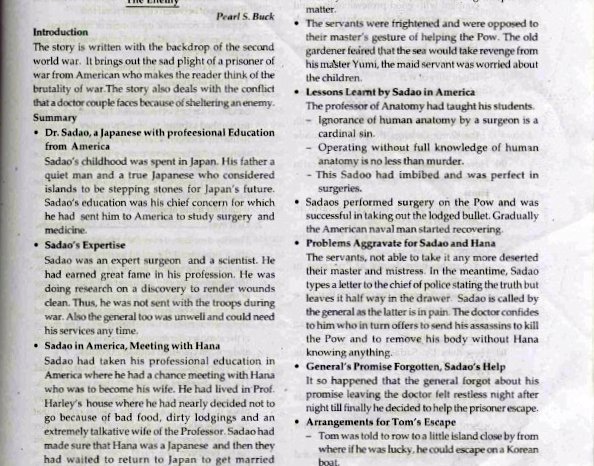
SHOULD WIZARD HIT MOMMY
JOHN UPDIKE
A CUSTOM OF STORYTELLING BY JACK
1. What was the custom or a necessary ritual for Jack?
2. Why was it necessary for Jack to tell stories in the evenings and on Saturday afternoons?
3. What type of stories did Jack usually tell his daughter?
4. “Each new story was a slight variation of a basic one”. What used to be the common features of Jack’s stories?
5. Describe Jack’s style of story-telling.
6. How does Jack narrate the story ‘Should Wizard Hit Mommy?’
7. How did Jack enact the part of the wizard?
8. How does Jack try to make his story lively and real?
JO BEING INQUISTITIVE / A NEW PHASE
1. Who is Jo? How does she respond to her father’s story telling?
2. What do the questions raised by Jo tell about her?
3. How can you say that Jo possesses an inquisitive nature while listening to the stories?
4. This was a new phase, just this last month, a reality phase. How did Jo behave in this ‘reality phase’? Or what is the new phase?
5. Narrate instances to prove that Jo had grown? Or
6. What difference do you notice in Jo from the age of 2 to 4?
STORY OF ROGER SKUNK
1. Describe Roger Skunk.
2. What was Roger Skunk’s problem? How did he get it solved?
3. Describe the troubles that Roger Skunk had to face and what did he do?
4. How and why did all other animals tease Roger Skunk?
5. Why did the woodland creatures avoid Roger Skunk?
6. Narrate the story told by Jack to his daughter about a Skunk
7. What made Jo unhappy over Roger Skunk’s story?
8. What made Jo feel that the story was over?
ROGER SKUNK MEETS THE WIZARD
1. Where did the Wizard live and how did he look like?
2. Where did Roger Skunk go for his immediate help?
3. How was Roger Skunk able to pay the requisite fee of the Wizard?
4. How did Roger Skunk find three more pennies?
5. How did he start to smell like roses?
6. Why did Roger Skunk go in search of the Wizard? What did he say to the Wizard?
7. What happened when Roger Skunk met the Wizard?
8. What did the Wizard do when Roger begged him for help?
9. How did the Wizard help Roger Skunk?
ANIMALS WELCOME ROGER
1. How did the woodland creatures react to the Skunk’s new smell?
2. What happened after Roger Skunk smelled very bad again?
3. How do the woodland creatures ultimately accept Skunk?
MOMMY RESENTMENT
1. Why did Roger Skunk’s mother not like her son smelling like roses?
2. How did the Skunk’s mother react to his new smell?
3. Why was Roger Skunk’s mommy angry on finding him smell like roses? What did she do?
4. Why did the ‘mommy’ go to the Wizard and with what result?
SKUNK’S MOTHER HITS THE WIZARD
1. Why did skunk’s mother hit the wizard?
2. Do you think that the wizard deserved the beating? Was he right in changing the smell?
3. How did the skunk’s mother get his old smell back? Was she insensitive towards her son?
4. How did the mommy justify for retaining the original smell?
5. What is the role-played by Roger Skunk’s mommy in the story. “Should Wizard Hit Mommy?”
6. Why did Roger Skunk not react to his mother’s demand?
JO’S REACTION - JO IS NOT CONVINCED
1. How was Jo affected by Jack’s story telling?
2. Why did Jo want the Wizard to hit the mommy?
3. What change did Jo want in the story?
4. Why did Jo want Roger Skunk’s mommy to be punished?
JO WANTS THE STORY CHANGED
1. What do you think was Jo’s problem?
2. What is Jo’s perspective and how does it differ from Jack’s?
3. How did Jo react when her father refused to change the ending of the story?
4. Do you think Jo was right in her demands?
5. How does Jo want the story to end and why?
6. Why wasn’t Jo happy with the ending of the story? How did Jo want the story to end up?
7. What is the difference between the original ending and the ending of the story Jo insists on?
8. Why did Jo not approve of Skunk’s mother scolding him for his new smell?
JACK’S CONFLICT:
1. What makes Jack feel caught in an ugly middle position?
2. Why was Jack worried about his wife Clare?
3. Was Jack right in not changing the end or in hurting his little girl?
4. Why does Jack insist that it was the Wizard that was hit and not mother?
MORAL ISSUES
1. What is the moral issue that the story raises?
2. Elaborate what difference do you find in the thinking of both Jo and Jack on moral issues?
3. The story ‘Should Wizard Hit Mommy?’ presents two different perspectives on life.
4. What makes you ascertain that Roger suffered “racial segregation?”
GENERAL
1. An adult’s perspective is different from that of a child. Answer with reference to the story ‘Should Wizard hit Mommy?’
2. How would you explain the rational world of an adult versus the dream world of a child?
3. ‘Should Wizard Hit Mommy’. What is your stance regarding the two endings to the story?
ON THE FACE OF IT
SUSAN HILL
DERRY
1. Who is Derry and what is his problem?
2. How did Derry get his face burnt? How did it affect him?
3. Draw a pen portrait of Derry.
Mr. LAMB
1. Who is Mr. Lamb? Give the character sketch of Mr. Lamb.
2. Why does Mr Lamb have a tin leg?
3. What kind of life did Mr. Lamb lead?
4. What is Mr. Lamb’s daily routine?
5. What did children call Mr. Lamb? Did it hurt him? OR
6. Why do kids call Mr. Lamb ‘Lamey – Lamb’? How does he feel about it?
DERRY ENTERS LAMB’S GARDEN
1. How does Derry get into Lamb’s garden?
2. Why did Derry come into Mr Lamb’s garden? Why was he startled?
3. How does Derry come into contact with Mr. Lamb?
DERRY MEETS MR. LAMB (in his garden)
1. How does Mr. Lamb react on seeing Derry in his garden? Or
2. What was the reaction on Mr Lamb when he saw Derry entering his garden after climbing over the garden wall?
3. Why does Derry want to go back home as soon as he comes face to face with Mr. Lamb?
4. Why is Derry drawn towards Mr. Lamb?
5. Why doesn’t Derry stay to help Mr. Lamb to get crab apples?
DERRY SUFFERS FROM A COMPLEX (indulges in self-pity)
1. Why does Derry feel Mr. Lamb might lose all his friends because of him?
2. “What kind of world will it be if all the physically disabled start living together to avoid people starring at them?” Who said these words? Explain the context.
3. Why Derry not like being with people? What terrible complex does he suffer from?
4. Why Derry say, he does not care if no one kisses him?
5. Derry is a victim of his own complex. He develops a negative attitude towards life and people. Do you find some change in him in the end?
6. Why does Derry say that acid has eaten him up?
7. Why does Derry tell Mr. Lamb that he is afraid of seeing himself in the mirror?
DERRY AVOIDS PEOPLE
1. What do the people talk about Derry?
2. According to Derry, what do people think and say about him?
3. Why does Derry say: “I’m not afraid... People are afraid of me?”
4. “At least there would be nobody to stare at you because you were not like them.” What does Derry mean by this?
5. How do people try to console Derry repeatedly?
6. What conversation did the two women at the bus stop have? How did Derry feel about it?
7. Why does Mr. Lamb tell Derry to avoid the harsh look of the people?
CONVERSATION
1. Explain, “It is the thinking and something inside us provides to get prominence”.
2. “What have you changed the subject for?” says Derry to Mr Lamb. What does Derry want Mr Lamb to do? Or
3. Why do you think Mr. Lamb changes the topic whenever Derry talks about his ugliness?
4. Why does Mr. Lamb narrate the story of a man who locked himself in a room because he was afraid?
5. What was the fate of the man who locked himself up in his room? Why does Mr Lamb give this example?
6. “I’m not fond of curtains. Shutting things out.” says Mr Lamb. How do these words reveal Mr. Lamb’s personality?
7. What is Mr. Lamb’s answer to Derry about having friends?
8. What advice does Mr. Lamb impart to Derry?
CONSOLING / ENCOURAGES DERRY
1. How does Mr. Lamb try to explain that looks are not important, the important thing is how a man thinks?
2. How did Mr. Lamb try to remove baseless fears of Derry?
3. “You will get on the way you want, like all the rest”. How does Mr. Lamb encourage Derry?
4. Why does Mr Lamb say to Derry that “People are never just … nothing. Never”?
5. Write down the discussion between Mr. Lamb and Derry. How is Derry greatly influenced by Mr. Lamb?
CHANGE / TRANSFORMATION
1. How did Mr. Lamb’s meeting with Derry become a turning point in Derry’s life?
2. Why a little conversation with Mr. Lamb has changed Derry’s attitude towards life and world?
3. How does Mr. Lamb’s conversation transform Derry?
4. Has Derry overcome the complex regarding his burnt face? How?
LAMB COPING WITH LONELINESS
1. Does Mr. Lamb display signs of loneliness and disappointment? What are the ways in which Mr. Lamb tries to overcome these feelings?
2. What does Mr. Lamb mean when he says there is same life growing everywhere?
3. Why does Mr. Lamb keep his windows without curtains and his gates open?
4. Generally, persons suffering from a physical impairment feel a sense of alienation and withdraw themselves from the world. However, Mr. Lamb was an exception. Justify the statement by giving examples from the text.
5. What significance would you attach to Mr. Lamb’s silence at the end of the play?
6. Mr. Lamb pretended that he had many friends. Why? What does his frustration on Derry’s question about his friends show?
7. Why does Derry suspect that Mr. Lamb has no friends?
DERRY GOES HOME (mother)
1. Why did Derry’s mother warn him not to go to see Mr. Lamb?
2. How does Derry convince his mother about Mr. Lamb? Or
3. What reasons did Derry give to his mother to return to Mr. Lamb?
4. “Once you got home, you’d never let yourself come back” says Mr. Lamb to Derry. Is he right in his assessment?
DEATH OF MR. LAMB
1. How does Mr. Lamb meet his end?
2. Why was Mr. Lamb’s death a great shock for Derry, although they knew each other for a short period?
3. Why does Derry go back to Mr. Lamb?
4. While leaving Mr. Lamb, Derry says I’m going but I’ll come back you see, you wait”. Does Derry go to see Mr. Lamb?
COMPARE BETWEEN DERRY & Mr. LAMB
1. Compare and contrast both Derry and Mr. Lamb. ( At least four points)
2. Both Derry and Mr. Lamb suffer physical disabilities but their attitude towards life and people is very different. Highlight their contrasting traits.
3. What type of affinity do you notice in Mr. Lamb and Derry?
4. “I’m interested in anybody. Anything. There is nothing that God made that doesn’t interest me.” Do these words truly reflect Mr Lamb’s character?
LESSON
1. Justify the title: “On the face of it”.
2. What different name would you give to the story? Illustrate your reasons with examples.
3. The actual pain or inconvenience caused by a physical impairment is often much less, than the sense of alienation felt by the person with disabilities. Explain.
4. Describe the message that the play ‘On the Face of It’ conveys to the readers.
5. Do you think Derry’s attitude towards life would have been different had he been lame instead of having a burnt face?
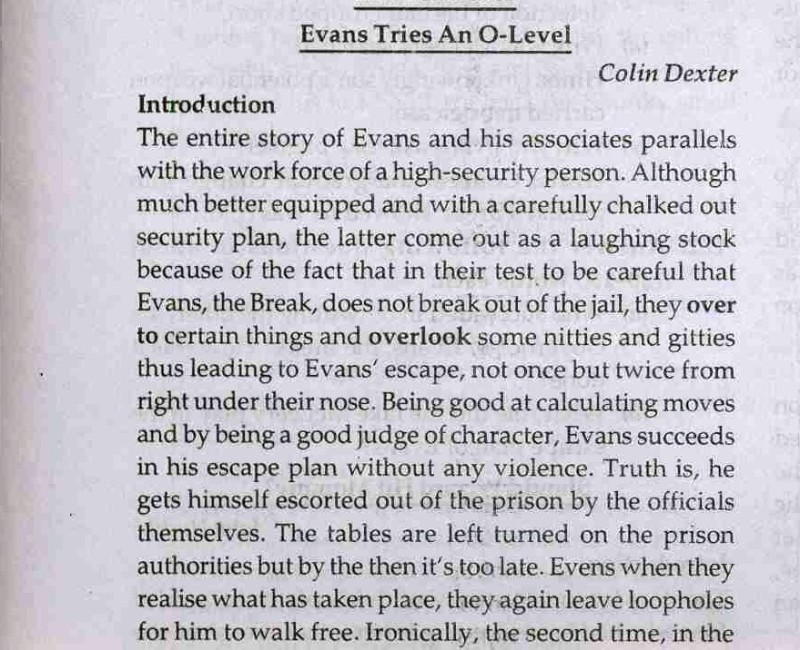
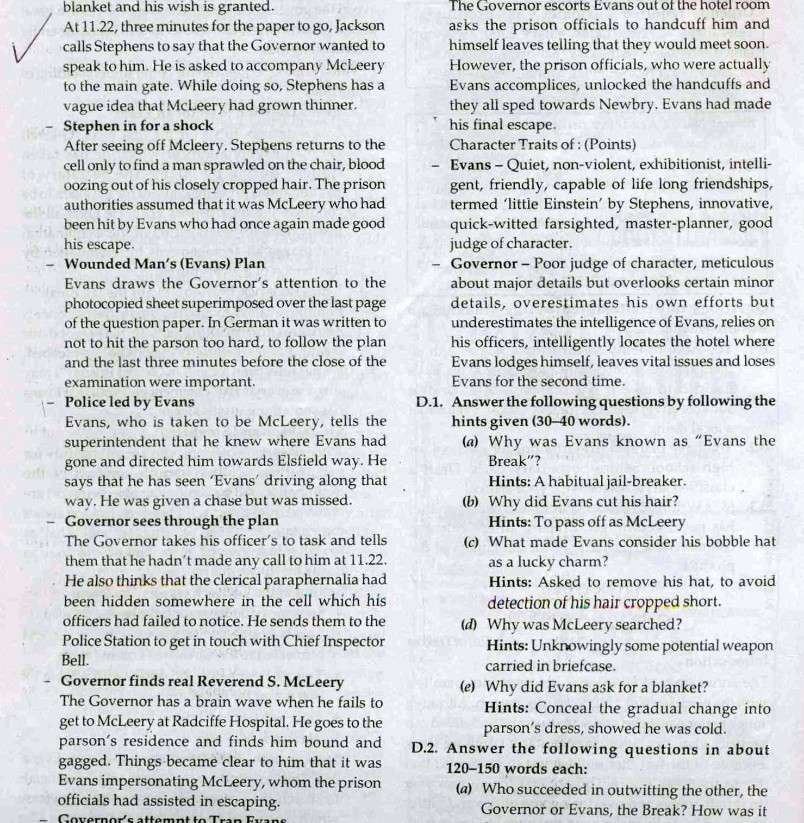
EVAN TRIES A O LEVEL
EVANS: Colin Dexter
1. What kind of a person was Evans?
2. Write the character sketch of James Roderick Evans.
3. How can you say that Evans was a man of high wits?
4. Why did the prison officers call Evans – “Evans the Break”?
EVANS WANTS TO TAKE O-LEVEL EXAMINATION
1. Who was Evans and why was his desire for education?
2. Was Evans really interested in getting some sort of academic qualification? Give a reasoned answer.
3. How do you account for the fact that Evans selected German only, for his O level examination?
EXAMINATIONS:
1. How was Evans helped in preparing for the examination?
2. The examination was scheduled to begin at 9.15 a.m. but it started at 9.25 a.m. Why was there delay in starting the examination?
3. Why did people doubt Evans’ sincerity of taking the ‘O’ Level examination?
4. Who were the two visitors Evans received in the morning on the day of his examination?
PRECAUTIONS
1. What were the arrangements/ precautions taken for the smooth conduct of the examination?
2. How was it ensured that Evans didn’t have any weapon in his cell?
3. Why some of the objectionable items were removed from Evans’ cell?
4. How did the Governor think that Evans was safe in his cell?
5. Why was it impossible for Evans to escape from the prison?
6. How was it decided to examine Evans and what arrangements were made in this regard?
PLAN
1. How does the correction slip help the escape of Evans? OR
2. What was the correction slip? Why did Evans say later that the correction slip killed two little birds with a single stone?
3. What important clues were hidden in the German question paper?
4. How did Evans manage to get blood in the cell?
5. What made Evans clip his hair short?
6. Why did Evans not take off his hat when Jackson had ordered him to do so?
7. Why was the call regarding a correction in the question paper actually made?
8. What was the real purpose of the photocopied sheet cleverly superimposed over the last page of the question paper?
9. Was it really careless on the part of Evans to have left the question paper in the cell? Explain.
FIRST ESCAPE
1. Where did Evans plan to stay after his escape from prison? What was the surprise that availed him when he entered his bedroom?
2. Will the injured McLeery be able to help the prison officers trace Evans?
3. When Stephens comes back to the cell he jumps to a conclusion and the whole machinery blindly goes by his assumption without even checking the identity of the injured “McLeery”. What was the result?
4. How did Evans manage his first escape?
5. What are the various loopholes you find in the story, which according to you had helped Evans in escaping from prison?
6. How did Evans and his friends carry out the escape of Evans very successfully and meticulously?
7. Write down the various points that helped Evans’ escape from the cell.
8. The Governor and his staff did their best not to provide Evans a means of escape but the wily Evans proved to be more than a match for them. He had the last laugh. Justify it with a reasoned answer.
9. What lapses on the part of the police and prison authorities helped Evans to escape from the prison.
10. How the wounded man did dodged Carter?
11. How did Evans hoodwink all the officials and the Governor? OR How did Evans and his men dupe the prison officials?
GOVERNOR
1. Why was the Governor himself taking keen interest in the security arrangements for Evans’ examination?
2. Why did the Governor doubt the phone call from the Examination Board for correction in the paper? What did he do?
3. What clues did the Governor get from photocopied sheet?
4. What made Governor aware that someone from the examination board was involved in the escape of Evans?
5. What information did the Governor get from the hospital about McLeery?
6. Why the Governor was angry with the prison officers after Evans had escaped?
7. How did the Governor know that Golden Lion was referred to by Zum Golden Lowen?
8. What was the usual request that the Governor make to the Secretary of the Examinations Board?
9. What information did the Governor give to the Secretary of Examinations Board about Evans?
10. At 11.22 a.m. the Governor wanted to speak to Stephens. What was the message that was conveyed to Stephens? Was the call fake?
11. What clues could the Governor get from the photocopied sheet?
12. Who was the most unexpected man in the world that waited for Evans in his bedroom at the Golden Lion?
13. Who was Carter? What did the Governor want him to do and why?
14. How did the Governor surprise Evans in the bedroom of the Golden Lion? Describe the clues on the basis of which the Governor could arrest Evans. How did Evans have the last laugh?
15. What could the Governor have done to securely bring back Evans to prison when he caught him at Golden Lion?
16. Governor was “just another good-for-a-giggle”. Explain.
JACKSON
1. What type of relationship do Evans and the police officer Jackson possess?
2. What sort of relationship do you comprehend existed between Jackson and Evans from the author’s observation that they were ‘warm enemies’?
3. How does Evans expose Jackson’s ignorance?
4. Why did Jackson ask Stephens to take Evans’s razor and nail scissors out of the cell after he finished shaving?
5. “Beneath all the bluster and the bullshit, a tiny core of compassion was buried somewhere in Jackson”. Justify the statement.
6. Why do you think Jackson asks Evans to remove the ‘pin-ups’ from the cell?
STEPHEN
1. Why is Stephens compared to a woman who would get up twenty times to check the locked front door?
2. What did Stephens see, when he peeped through the hole of the cell of Evans, after leaving McLeery at the main gate of the prison. Or Why did Stephens cry when he opened the peep-hole of Evans’s cell?
3. Narrate the incident that happened after Stephens had seen McLeery off the jail premises.
4. Why was Stephens a little surprised to see a grey blanket draped round Evan’s shoulders?
McLERRY
1. How did McLeery want to help police?
2. Who was Reverend Stuart McLeery ? Did he really come to invigilate?
3. Where was McLerry – in the hospital or elsewhere?
4. Jackson found a puzzling thing in McLeery’s suitcase. How did McLeery explain it?
5. What were the necessary instructions that McLerry gave to Evans before the examination started?
6. What two strange things could be noticed when McLeery was standing at the prison gate with Stephens?
7. What did McLeery do when he raised himself from the chair?
8. Why did the Governor instruct Jackson to search McLeery?
9. What explanation does McLeery give for the semi-inflated ring he carried?
10. What idea do you form about McLeery while he was being searched outside the examination hall?
ARRESTED
1. Why Do the governor and his staff finally heave a sigh of relief?
2. Will the clues left behind on the question paper put Evans back in prison again?
3. How did the Governor and the staff reach the Golden Lion to arrest Evans?
4. What were the clues left behind on the question paper? How did they help in arresting Evans?
SECOND ESCAPE
1. Who do you think has outwitted the other - Evans or the Governor?
2. In what way did Evans and his friends get a good success in their plan?
3. How did Evans having the last laugh?
4. What mistakes were committed by the prison officials that helped Evans and his friends to get success in their plan?
5. What was the final act of foolishness that led to the escape of Evans and proved that the Governor was “just another good-for-a-giggle”? Or How did Evans outwit the Governor and his staff?
6. Who do you think is the man impersonated as the driver, who eventually takes Evans to freedom?
GENERAL
1. Do you agree that between crime and punishment, it is mainly a battle of wits?
2. After reading the whole story, what do you think about the Governor and his men?
What makes you guess that the prison authorities have soft corner for Evans and the same becomes the cause of es
MEMORIES OF CHILDHOOD
ZITKALA-SA
1. Who was ‘Zitkala-Sa’? Where was she born?
2. Why was the girl tied to a chair in ‘Memories of Childhood’?
3. What warning was issued to Zitkala Sa by Judewin?
4. What makes you agree that the seeds of rebellion against injustice are sowed early in life?
5. Write down Zitkala Sa’s experience on her first day in the Land of Apples. Why did she feel embarrassed?
6. How did Zitkala Sa resist and fight against the injustice done to her?
7. How did the narrator find her new place?
THE DINING ROOM
1. Why did Zilkala Sa feel uncomfortable in the dining room? OR
2. How did Zitkala Sa feel on reaching the dining hall for the first time?
3. What does Zitkala Sa mean by “Eating by Formula”? Explain the formula.
4. How did ‘Eating by Formula’ become a hard trail for Zitkala Sa in school?
5. How did the girls and the boys enter the dining room? Who did Zitkala Sa watch for among the boys?
6. Describe Zitkala Sa’s experience in the dining room.
7. Why did Zitkala-Sa behave oddly in the dining hall?
8. Why did the author begin to cry in the dining hall?
INDIAN GIRLS (in shingled hair)
1. How were the Indian girls dressed and how did Zitkala Sa compare her dress with other girls?
2. What did she notice about the Indian girls in the school?
HER RESISTANCE
1. What did Zitkala Sa do when she came to know that they were going to shingle her hair out? How was she overpowered
2. How did she hide herself? Did she succeed?
3. What happened after Zitkala Sa was tied to the chair?
4. Why did the author not want her long hair to be cut short?
5. Why was Zitkala-Sa terrified when Judewin told her that her hair would be cut short?
6. What efforts did Zitkala Sa make to save her hair from being cut?
SHINGLING THE LONG HAIR
1. How was she forced to part with her long and heavy hair?
2. What idea do you form about the author’s friend Judewin from her comment about the hair cutting “We have to submit because they are strong”?
3. The author’s long hair was shingled like a coward’s. Do you think the author was a coward?
4. It is better to have tried and failed than never to have tried at all. How would you relate this observation to the author of the episode “The Cutting of My Long Hair”?
ZITKALA-SA’S HUMILIATION
1. How did Zitkala – Sa feel after her long hair had been cut?
2. What did the mother of Zitkala Sa’s tribe teach their children about their hair?
3. Now I was only one as many little animals driven by a herder.” Why did Zitkala-Sa feel to?
4. Describe how the narrator in “The Cutting of My long Hair” resist and fights against the attempt of shingling her long and heavy hair. How is she ultimately made to lose her distinct cultural identity?
......................................
BAMA
1. Who is Bama?
2. Relate the specific cause that engaged ‘Bama’ fight against it.
WALKING HOME FROM SCHOOL
1. What did Bama watch while going back from school to her house?
2. Mention any two reasons because of which it could take thirty minutes to an hour for Bama to reach home.
3. Write down the funny scene that Bama noticed and enjoyed on her way home from school.
4. Why did it take Bama nearly one hour to cover a distance needing just ten minutes’ walk?
5. What idea do you form about the bazaar as described by the little girl?
SIGHT OF THE STRANGE MAN (scene of a landlord)
1. What made the little girl want to double up with laughter at the sight of the strange man?
2. Why wasn’t the narrator’s elder brother amused when she told him the story in all its comic detail?
3. What was being held by the elder of Bama’s street with its strings only?
NARRATES THE INCIDENT ( To Brother Annan)
1. Describe the incident that Bama narrated to her brother Annan.
2. Who was Annan? How did he justify the strange behaviour of the elder?
3. What episode of discrimination did Annan narrate to Bama and why?
4. Why did Annan say about his community to the narrator?
BAMA LEARNS ABOUT UNTOUCHABILITY
1. How did Bama feel when Annan told her about untouchability?
2. How did Bama come to know that she was an untouchable? Write her reactions.
3. When did the narrator experience untouchability?
DISCRIMINATION (The incident makes her angry)
1. Why did Bama feel deeply sad and infuriated?
2. Why did the narrator feel terribly sad and provoked?
3. Why was Bama first amused at the scene of the old man carrying a food packet by its string without touching it? Why was she filled with anger, dismay and revolt later on?
HER BROTHER’S ADVICE (education gives dignity and respect)
1. Explain Annan’s words: “In order to gain dignity and honour in the society, work hard”.
2. What advice did Annan give to Bama to get honour and dignity for her people?
3. How did Annan advise his sister Bama regarding untouchability and what was its effect on her?
4. What advice did Annan pass on to ‘Bama’ for better results? How did it change her course of life?
5. How was the narrator inspired by the words of her elder brother (Annan)?
WE TOO ARE HUMAN BEINGS
1. What lesson do you learn from the episode, ‘We too are Human Beings’?
2. Had Bama not been guided properly by her elder brother regarding untouchability, she would have grown up into a complex-torn woman. Do you agree?
3. Justify that Bama has a keen sense of observation and is capable of giving the minutest of details.
4. Describe how the narrator attains honour and dignity inspite of her humble birth.
BOTH Bama & Zitkala Sa
1. Bama’s experience is that of a victim of the caste-system. What kind of discrimination does Zitkala-Sa’s experience depict? What are their responses to their respective situations?
2. What oppression and discrimination did Zitkala Sa and Bama experience during their childhood?
3. What are common features present in both the episodes?
4. Write down the reactions of Zitkala Sa and Bama against the discrimination made by the upper caste/class people for the low caste/class people.
CULTURE
1. The two accounts that you read about are based on two distinct cultures. What is the commonality of theme found in both of them?
2. Both the units of ‘Memories of Childhood’ present autobiographical episodes from the lives of two women from marginalised communities’. Describe the main issues raised as well as the common features highlighted in them.
POEMS
'MY MOTHER AT SIXTY-SIX'
Kamla Das
THE POET:
1. Where was the narrator going and why?
2. What did the poet realise?
3. Which and How did the poetess put away the thoughts?
4. What does the parting words of the poet and her smile signify?
5. What did the poet see one morning while driving from her father’s home?
6. Why did the poet look outside her car?
7. What does the poet notice after the security check? What does the poet do?
DRIVING WITH MOTHER SITTING BESIDE:
1. How did her mother’s face look like?
2. Who looked wan and pale and why?
3. Why has the mother been compared to the late winter’s moon?
4. How has the poet portrayed her mother as when she was besides her?
5. What kind of images has the poet used to signify her ageing decay?
WHILE TRAVELLING: (Looks at the world outside)
1. Who looked at young trees?
2. What do the children and the trees signify?
3. Why does Kamala Das describe the young trees as sprinting?
4. Why has the poet brought in the image of the merry children spilling out of their homes?
5. Describe the contrast of the scene inside the car with the activities going on outside.
6. What does the poet see happening outside?
7. Why does the poet 'put that thought away' and looks outside?
8. How does the poetess describe the outside world? What does it signify?
FEARS: (Familiar childhood ache returns)
1. What has been the poet’ childhood fear?
2. What kind of pain and ache that the poet feels?
3. Why the poet does feels her old familiar ache?
4. What are the poetess’ fears about her mother?
THE POEM:
1. What type of contrasts one can realise in the poem ‘‘my mother at sixty six’’?
2. Write the central theme of the poem ‘My mother at sixty six’.
3. What does the poet Kamala Das convey through her poem ‘My mother at sixty six’?
'MY MOTHER AT SIXTY-SIX'
Kamla Das
THE POET:
1. Where was the narrator going and why?
2. What did the poet realise?
3. Which and How did the poetess put away the thoughts?
4. What does the parting words of the poet and her smile signify?
5. What did the poet see one morning while driving from her father’s home?
6. Why did the poet look outside her car?
7. What does the poet notice after the security check? What does the poet do?
DRIVING WITH MOTHER SITTING BESIDE:
1. How did her mother’s face look like?
2. Who looked wan and pale and why?
3. Why has the mother been compared to the late winter’s moon?
4. How has the poet portrayed her mother as when she was besides her?
5. What kind of images has the poet used to signify her ageing decay?
WHILE TRAVELLING: (Looks at the world outside)
1. Who looked at young trees?
2. What do the children and the trees signify?
3. Why does Kamala Das describe the young trees as sprinting?
4. Why has the poet brought in the image of the merry children spilling out of their homes?
5. Describe the contrast of the scene inside the car with the activities going on outside.
6. What does the poet see happening outside?
7. Why does the poet 'put that thought away' and looks outside?
8. How does the poetess describe the outside world? What does it signify?
FEARS: (Familiar childhood ache returns)
1. What has been the poet’ childhood fear?
2. What kind of pain and ache that the poet feels?
3. Why the poet does feels her old familiar ache?
4. What are the poetess’ fears about her mother?
THE POEM:
1. What type of contrasts one can realise in the poem ‘‘my mother at sixty six’’?
2. Write the central theme of the poem ‘My mother at sixty six’.
3. What does the poet Kamala Das convey through her poem ‘My mother at sixty six’?
An ELEMENTARY SCHOOL CLASSROOM IN A SLUM.
Stephen Spender.
THE SLUMS
1. How does Stephen Spender depict the life of the children of ‘An elementary school classroom’ in a slum? or
2. How is the future of the children of an elementary school in a slum depicted by poet Stephen spender?
3. Describe the slums where these children stink and suffer.
4. Why does Stephen spender call the slum children of Tyrol as unsung fighters? What is his appeal for them?
5. How do the faces and hair of the children of this slum school look like?
SCHOOL CHILDREN of a slum
1. Where do these children live and why?
2. What is the condition of these children?
3. Who are ‘these’ children? What is their world like?
4. What kind of future does the poet foresee for them?
5. How are these children sealed?
6. Why are the slum children tempted to steal the things?
THE BOY
1. Who is the unlucky heir and what is he reciting?
2. What does he have in his eyes?
3. What is the unnoted boy doing at the back of the classroom?
4. What do you understand by 'The paper-seeming boy, with rat's eyes'?
THE GIRL
1. Why has the girl bowed her head?
2. Why is the head of the tall girl weighed-down?
CLASSROOM CONDITION
1. What is the condition of the classroom walls?
2. Why has the poet used ‘‘sour cream’’ expression to describe classroom walls?
3. The walls of the classroom are decorated with the pictures of Shakespeare, ‘building with domes’, ‘world maps’ and ‘beautiful valleys’. How do these contrast with the world of these children?
LIFE AT THE VALLEY
1. What is the speciality of the Tyrolese valley?
2. How does the poet present a contrasting picture of Tyrol slum and its beautiful valley?
THE MAP (Foggy slums – blots on their maps)
1. What does the map on the wall signify?
2. How can the map become their windows to real world?
3. What is the impact of the world map; the dome and the Shakespeare’s bust have on the children of the slum?
4. Why does the poet Stephen Spender call the map a bad example?
5. Why does the poet say: 'so blot their maps with slums as big as doom’?
POVERTY SITUATION (The world of the rich not their world)
1. According to the poet, what do the children wear?
2. Who have been appealed to help the lot of slum children?
3. How does Spender interpret the poverty stricken yet onward struggling men in the poem?
4. The slum children are crushed under poverty. What types of dreams do they have?
5. How do they live in their 'holes'?
6. What have shut upon their lives like catacombs?
7. What will happen if the children come out of the bonds that bind them?
8. According to the poet who does make the history?
9. Spender's poem describes the miserable and pathetic lives of children living in slums. Give three examples of their misery.
WISH FOR A CHANGE (Need for immediate mediation)
1. In what way does the poet request the people to help the slum children?
2. What does the poet wish/want for the children of the slums? How can their lives change?
3. What should governors, teachers, inspectors and other important and powerful persons do to improve the lot of children living in slums?
4. Have poverty, miseries and disease killed all dreams and aspirations of these children?
5. What are the dreams and hopes of the slum children?
MESSAGE THROUGH THE POEM (Freedom from bondage)
1. What special message does Stephen Spender want to convey through this poem?
2. What are the main ideas in this poem?
3. How Does Spender protest against social injustice and class inequalities in this poem?
4. Describe the images of distress, pain and disease in the poem.
SHAKESPEARE
1. Why does Spender call Shakespeare ‘wicked’ and the map a ‘bad example’?
2. Where are donations and Shakespeare's head placed?
WINDOWS THEIR WORLD
1. Explain: 'Awarding the world its world'.
2. The poet says: 'And yet, for these children, these windows, not this map their world'. What is the real world for them and which is not their world?
EXPLAIN:
1. Explain: ‘Run azure on gold sands’.
2. Explain: ‘Fog to endless night.’
3. Explain the metaphor used in the poem-‘‘History is theirs whose language is the sun’’.
4. What are the two things mentioned to show a civilized race?
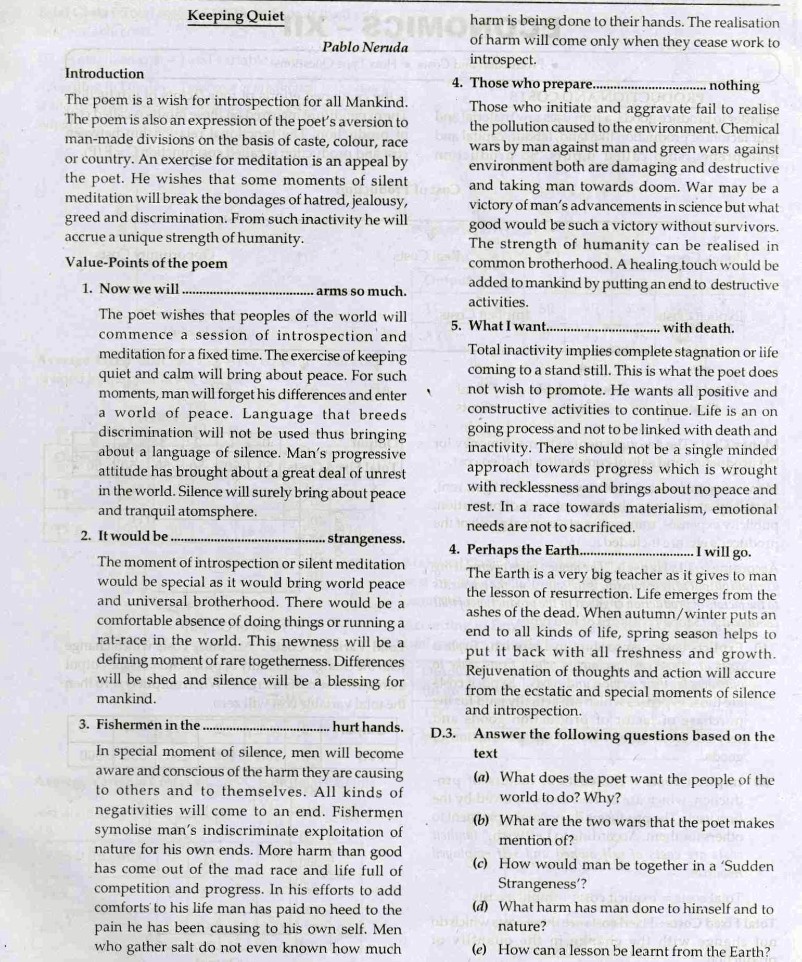
KEEPING QUIET - Pablo Neruda
KEEPING QUIET FOR A SECOND
1. Why does Pablo Neruda asks all the human beings to keep quiet / still?
2. What should we not do for a second?
3. When can a huge silence do us good?
4. How might a huge silence interrupt the sadness of men?
5. Why shouldn't we speak in any language and not move our arms so much?
6. What will happen if there is neither rush nor the running of the engine?
SILENCE NOT TOTAL INACTIVITY AND DEATH
1. Do you think the poet advocates total inactivity and death?
2. Why does the poet say that stillness should not be confused with total inactivity?
NO TRUCK WITH DEATH
1. Why does Neruda say: ‘I want no truck with death'?
2. How shall we be threatening ourselves with death?
3. When everything seems dead, what remains alive?
AN EXOTIC MOMENT
1. What does the poet call ‘an exotic moment’ and why?
2. What kind of moment it will be? Or what all of us will feel at that moment?
3. How all of us would feel at that time?
SINGLE MINDED
1. What will happen if we go on thinking single-minded?
2. ‘‘We should not be so single minded.’’ Why does the poet say so?
NO WARS OF ANY KIND / STOPPING OF WARS
1. What does Pablo Neruda say about the wars?
2. What are the different wars that man is engaged with? What is its outcome?
3. What advice does the poet give to the warmongers? Or what should the warmongers do?
4. What kind of victory will it be?
ADVICE TO FISHERMAN AND SALT GATHERERS
1. What does he do in the cold sea?
2. How would the whales not be harmed?
3. How are the hands of the man hurt?
4. What do the hurt hands imply?
5. What advice does the poet give to the fisherman and to the man gathering salt?
LESSON FROM EARTH
1. According to the poet Pablo Neruda what is that human beings can learn from nature?
2. What symbol from nature does the poet involve to say that there can be life under apparent stillness? How does the poet prove it?
3. What should we not do on earth for a second? Why?
4. Explain: ‘on the face of the earth’.
COUNTING UPTO TWELVE
1. What will counting upto twelve and keeping still help us achieve?
2. What does the poet want /ask us while he counts upto twelve?
SADNESS
1. What is the ‘‘sadness’’ that the poet refers to in the poem?
2. Why do men become sad?
3. In what way can huge silence dispel sadness?
POET AND TITLE
1. What does the poet want us to prepare for?
2. With whom does the poet not want to deal with?
3. What does the poet not want himself to be?
4. What does the poet Pablo Neruda aims us to achieve through this poem ‘keeping quiet’?
5. What specific ideas does the poet present before us in the poem ‘keeping quiet’?
6. Justify the title OR Write down the central theme in the poem ‘‘keeping quiet’’?
OUR LIFE
1. What is the life about?
2. How can we understand ourselves?
3. What were we not focusing on?
4. How would we all be together?
Additional Information
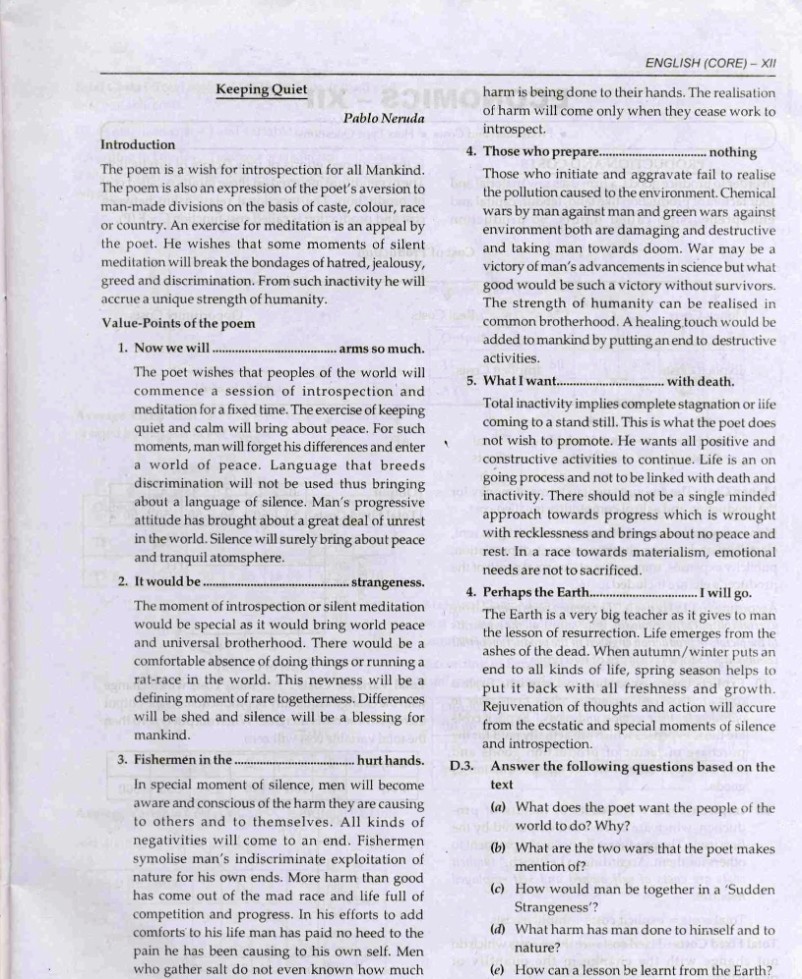
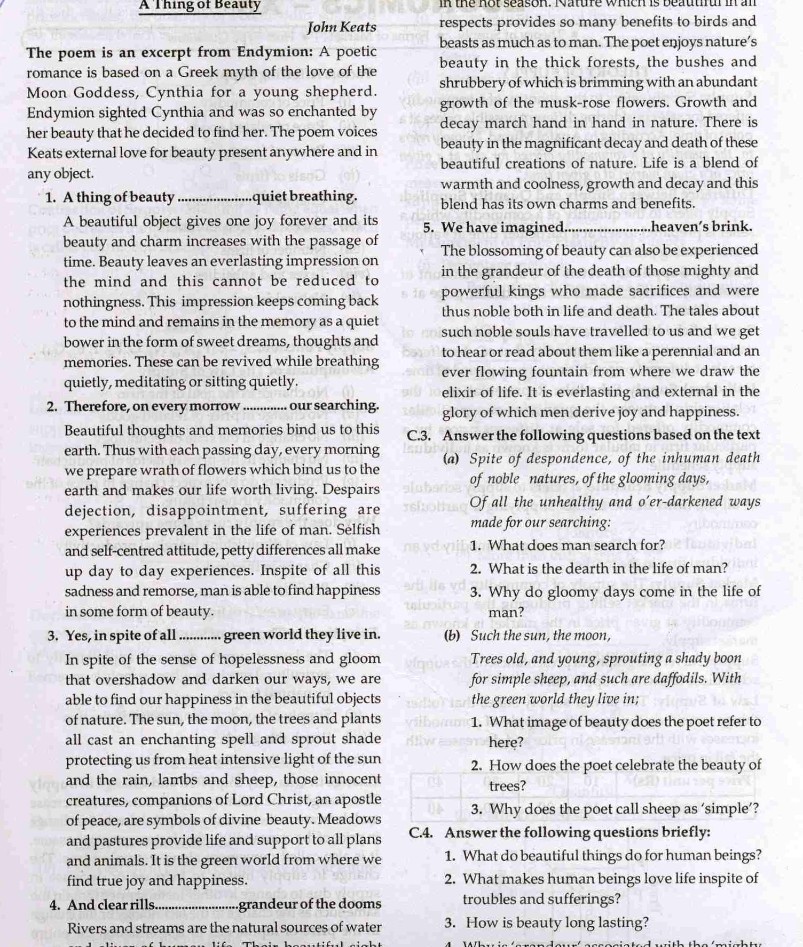
A THING OF BEAUTY
John Keats
A THING OF BEAUTY IS A JOY FOREVER
1. What is being said by John Keats to be a joy forever?
2. How according to John Keats ‘A thing of beauty is a joy forever’?
3. Mention any two sources of joy which a thing of beauty provides to us?
4. How can we say that a thing of beauty is a joy for us?
BEAUTIFUL THING (sources of happiness)
1. What is peculiar about a beautiful thing?
2. Why does a beautiful thing never pass into nothingness?
3. Do we experience thing of beauty only for a short moments or do they make a lasting impression on us?
4. List the things of beauty mentioned in the poem.
5. What pleasures does a beautiful thing give us? Are beautiful things worth treasuring?
6. What can a beautiful thing do for a human being?
7. What image does the poet use to describe the beautiful bounty of the earth?
8. What is lovelier than all lovely tales that we have heard or read?
THINGS THAT CAUSE SUFFERING / PAIN / SADNESS
1. What are the things that cause us pain and suffering?
2. What makes human beings love life in spite of troubles and sufferings?
3. What are the evil things that one possesses?
BEAUTY MOVES AWAY THE PALL OF SADNESS
1. In what way does beauty removes the pall of despondence from our spirits?
2. What is it that moves away the pall from our dark spirits? In what forms does it do so?
GRANDEUR AND MIGHTY DEAD
1. Why does Keats associate 'grandeur' with 'the mighty dead'?
2. Explain: ‘Such too is the grandeur of the dooms’ as associate with for the mighty dead?
FLOWER
1. How do the daffodils and the clear streams make their attractive cooling cover against the hot season?
2. Why are we weaving a flowery band?
3. Name the flowers described in the poem.
4. What does the blooming Musk-rose do according to the poet?
NATURE
1. Name the things of nature that are constant sources of beauty.
2. What are the natural ecosystems named here and what do they do?
3. Who do germinate a shady boon and for whom?
4. How do we bind us to the earth every morning?
5. What is the source of the 'endless fountain' and what is its effect?
6. What is the immortal drink? Where does it come from to us?
7. What makes the mid-forest brake rich?
BOWER
1. What does the poet mean by ‘a bower quiet for us’?
2. How does a thing of beauty keep a bower quiet for us?
POET AND TITLE
1. What is the message that John Keats wants to give through 'A thing of Beauty’?
2. Write the sum and substance of the poem ‘A thing of beauty’. (Central theme)
3. What is the Greek legend on which the poem ‘A thing of beauty is based?
ROADSIDE STAND - Robert Frost
1. Where was the stand situated and how was it made?
2. Where and why was the roadside stand set up?
3. What do the squeal of brakes and the sound of a stopping car mean for the people who are running the roadside stand?
4. Name some of the things that the roadside stand offered for sale.
5. What is in the news about the roadside stand people?
HOPE FOR SOME CITY MONEY
1. What was the plea of the folk who had put up the roadside stand?
2. What do the rural people running the roadside stand need?
3. Why do the people who are running the roadside stand 'ask for some city money’?
CHILDISH LONGING IN VAIN
1. How do the hopes of the rural people become childish longing in vain?
2. What was the real aim of those who are running the stand?
3. Who wanted to feel the money in hand?
4. How does Robert Frost represent the pathetical state of the people who run ‘A roadside stand’?
COMPLAINT OF THE RURAL PEOPLE
1. How pathetic is the state of roadside stand?
2. What does the voice of the country people seem to say?
3. What was the aim of the poor villagers of making a roadside stand?
4. Who hoped to be helped and by whom?
PLIGHT OF POOR RURAL PEOPLE (Exploitation)
1. Why won't these poor people have to think for themselves anymore?
2. How does the road passing through the village appear?
3. Where were the people to be resettled? What would be their state there?
4. How will the innocent rural people be soothed 'out of their wits’?
5. What will be a great relief to the poet? How can the problems of the rural poor be solved?
SOCIAL / GOVERNMENT AGENCIES (Callous attitude)
1. Did the government and other social service agencies actually want to help the people?
2. Who will soothe the rural poor out of their wits?
3. What is the party in power doing for the rural poor?
4. According to Robert Frost all the social agencies derive their calculated benefits in the name of helping the poor. Comment.
5. What was the promise made and who made it?
6. What does the poet says about the greedy ‘good doers’ and the beneficent beasts of prey?
7. What is the helping attitude, according to the poet Robert Frost of the government, city folk and the other social agencies with the poor people in reality?
8. How do they harm the poor rural people?
ATTITUDE OF CITY PEOPLE:
1. What is the special quality of the city people?
2. Who are these ‘Beasts of prey’?
3. What was never found in the city people?
4. The city folk that drove through the countryside hardly paid any heed to the roadside stand or the people who ran it. If at all they did, it was to complain. What was their complaint about?
5. Describe the value of 'money' and 'cash' for 'the flower of cities'.
6. Why was a person turned 'out of sorts'?
7. How the city people were mean?
8. Which things irritated those passers?
9. How will the city people destroy poor villagers sleeping at night?
POET – ROBERT FROST
1. Why does the poet sometimes feel a 'childish longing in vain' and how?
2. 'The hurt to the scenery wouldn't be my complaint' says the poet. What was his real complain?
3. What will be the poet’s complaint to the polished city traffic passing through the countryside?
4. How will the poet feel a great relief?
5. What is the real worry of the poet?
6. According to the poet where does the beauty rest?
7. In what way does the poet mock the city folk?
8. To what does Robert Frost draw the readers’ attention through his poem ‘A roadside stand’?
TRAFFIC PASSED WITHOUT STOPPING THERE
1. 'Of all the thousand selfish cars' some stop there but not for buying something. Why do they stop there at all?
2. What do you understand by the polished traffic?
3. What is the poets call to the polished traffic passing ahead?
4. How did the traffic pass?
5. How did a stopping car react for the landscape?
6. Why the passing cars are called ‘selfish cars’?
7. Why did the first car stop there?
8. What did any other car that stopped, asked about?
9. What did one car rider want to buy from the villagers?
10. Did 'the polished traffic' stop at the roadside stand and if at all they stopped, what were their reactions?
SAD SITUATION:
1. Why does sadness lurk near the window there?
2. Who can at one stroke put these people out of their pain?
3. How will poet Robert Frost come out of the insufferable pain of plight of the poor rural people?
4. Who are destroying whose sleep at night and how?
5. Why has the requisite lift of spirit never been found?
6. What is the open prayer from the open window?
OTHERS
1. Give the summary of the poem ‘A roadside stand’.
2. The economic well being of a country depends on a balanced development of the villages and the cities. Explain.
Aunt Jennifer's Tigers
Adrienne Rich
AUNT JENNIFER’S TIGERS PRANCE
1. Where are Aunt Jennifer's tigers and how does she create them?
2. How does the poet describe Aunt Jennifer’s tigers?
3. What are Aunt Jennifer’s tigers doing?
4. How do the prancing tigers look like?
5. Why do the tigers not fear the men beneath the trees?
6. Why the tigers are called ‘Aunt Jennifer’s tigers’?
7. Aunt Jennifer's tigers are totally different from her own character. Highlight the contrast.
8. What will happen to her tigers after her death?
9. How do 'denizens' and 'chivalric' add to our understanding of the tigers' attitudes?
10. What difficulty does Aunt Jennifer face while making her tigers and why?
AUNT JENNIFER
1. What are Aunt Jennifer’s fingers doing?
2. What happens to aunt Jennifer’s hand?
3. Why were Aunt Jennifer’s fingers fluttering through the wool’? Why is she finding the needle so hard to pull?
4. Why did Aunt Jennifer create animals that were so different from her own character?
5. What are “they” still ringed with?
6. How will Aunt Jennifer's hands look when she is dead?
RINGED WITH ORDEALS
1. What are the ‘ordeals’ aunt Jennifer is surrounded by?
2. Of what or whom is Aunt Jennifer terrified?
3. Will she be still ringed with ordeals when she is dead?
4. What was lying heavy upon her?
UNCLE’S WEDDING BAND
1. What effect did uncle’s wedding band have on Aunt Jennifer?
2. What kind of person do you think uncle is?
3. What is suggested by the image ‘the massive weight of uncle’s wedding band?’
4. What is the weight that lies heavy on her hand and how is it associate with her husband?
POEM
1. Write the sum and substance of the poem ‘Aunt Jennifer’s tigers’.
2. What do you understand by ‘chivalric certainty’?
3. What is a world of green?
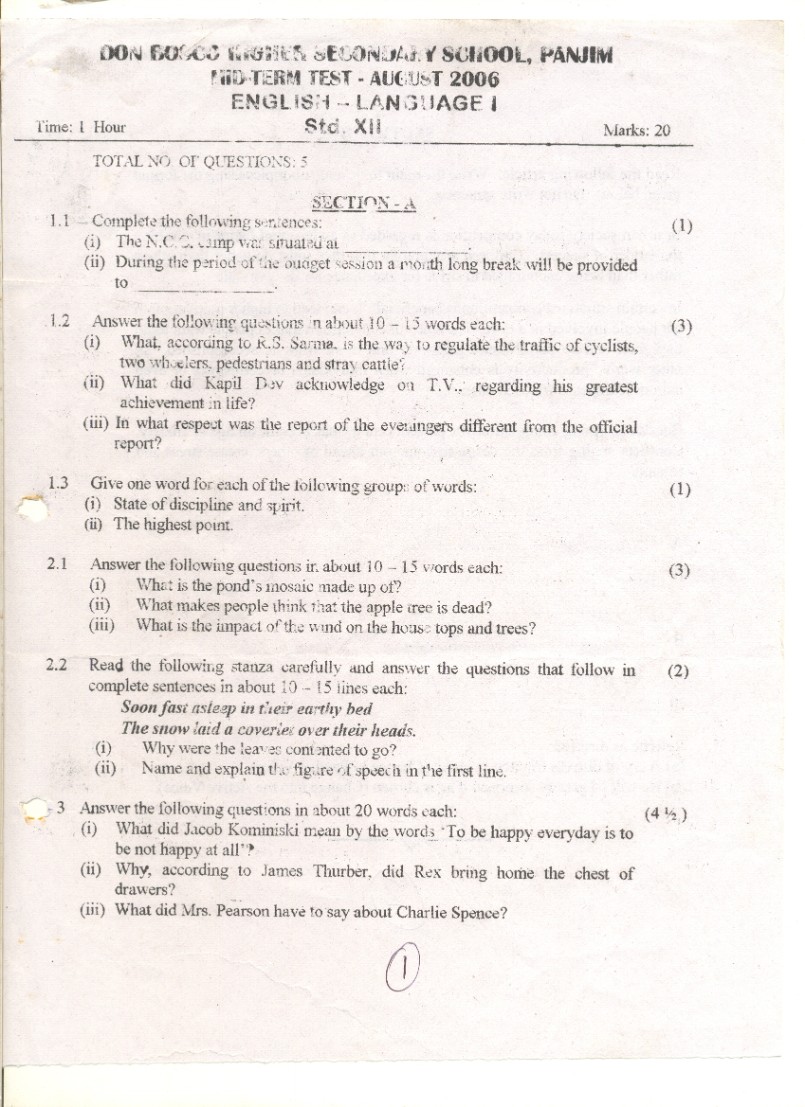
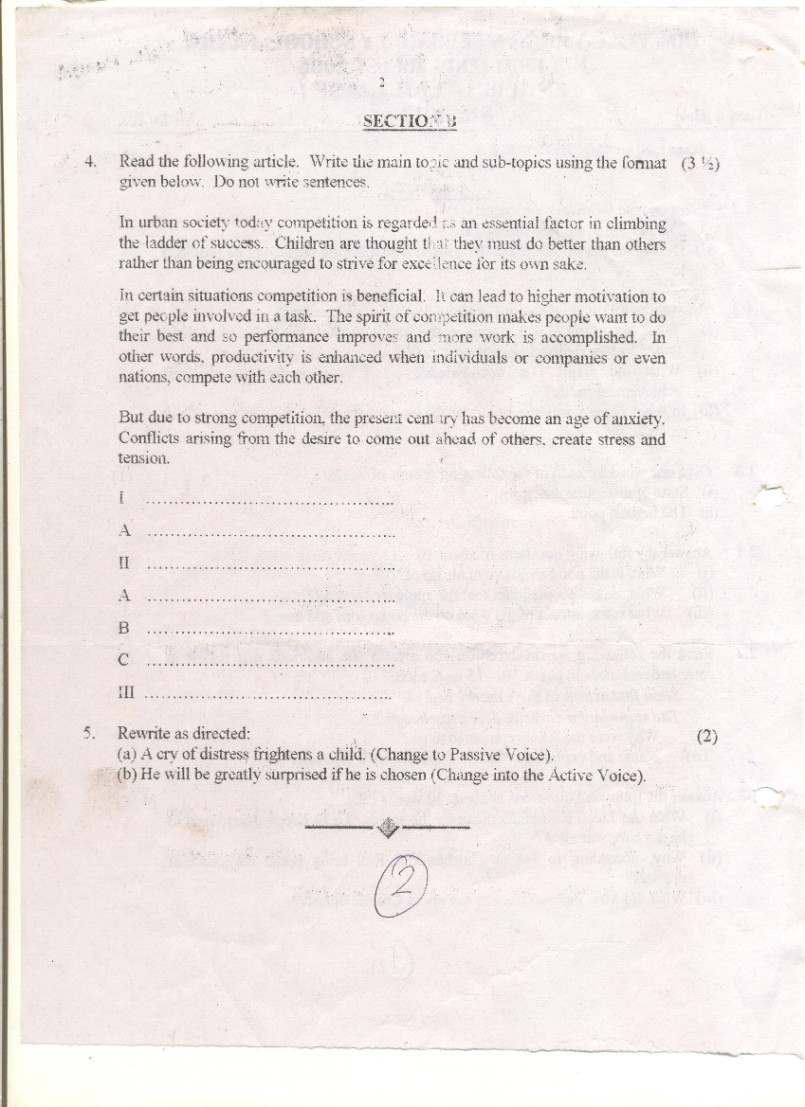
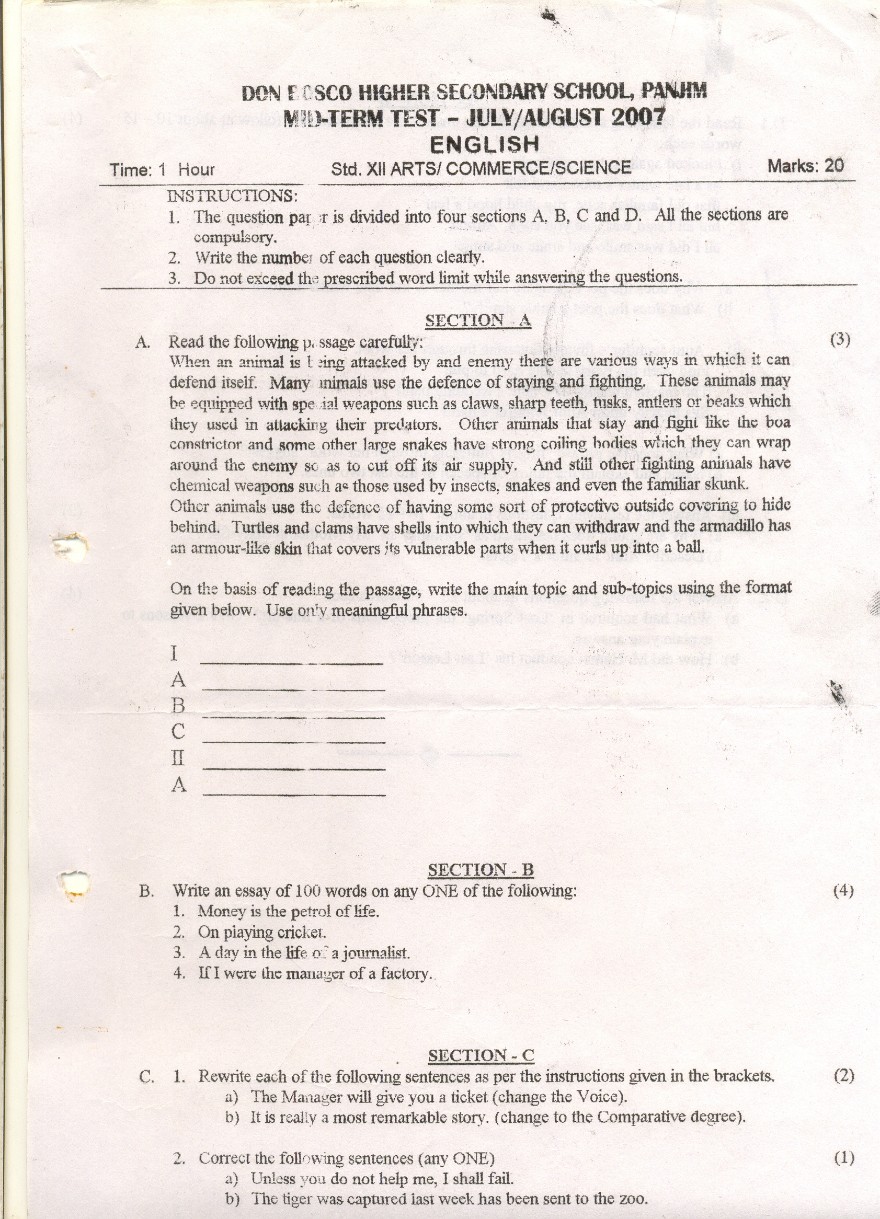
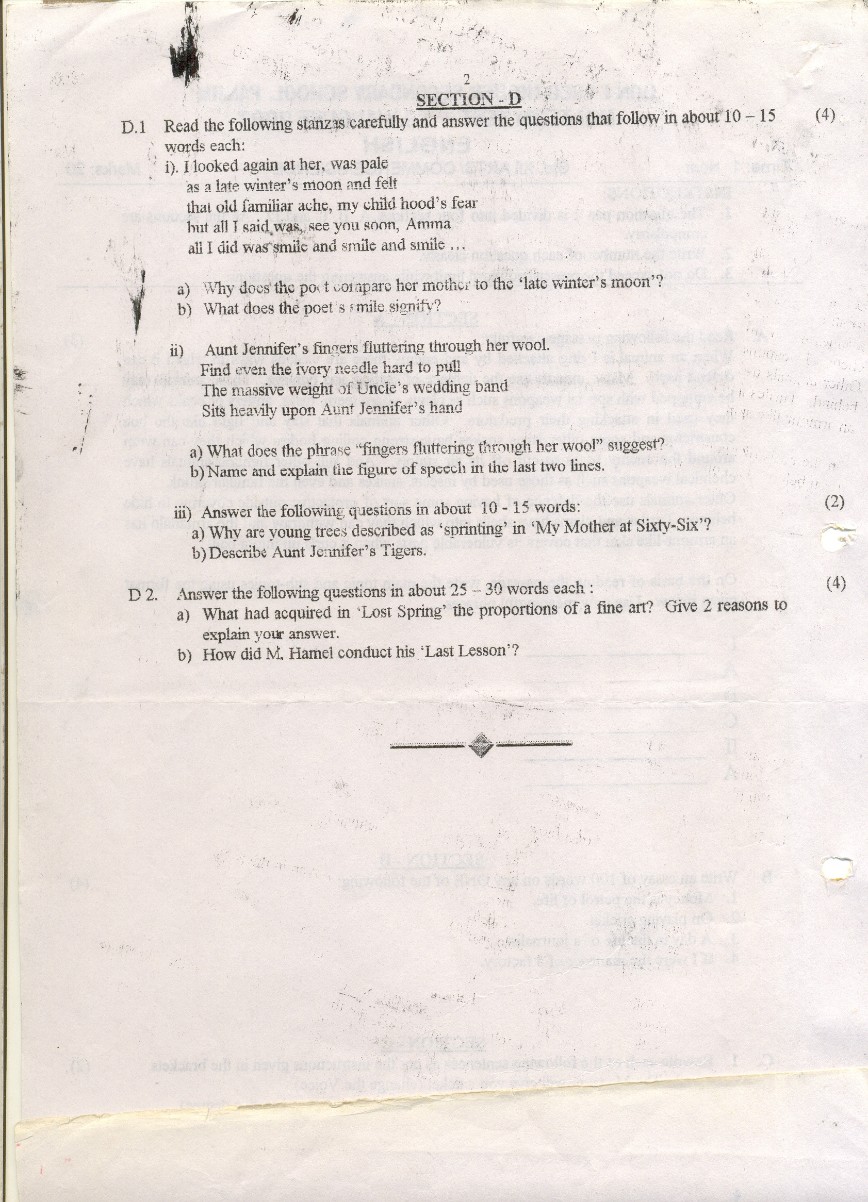
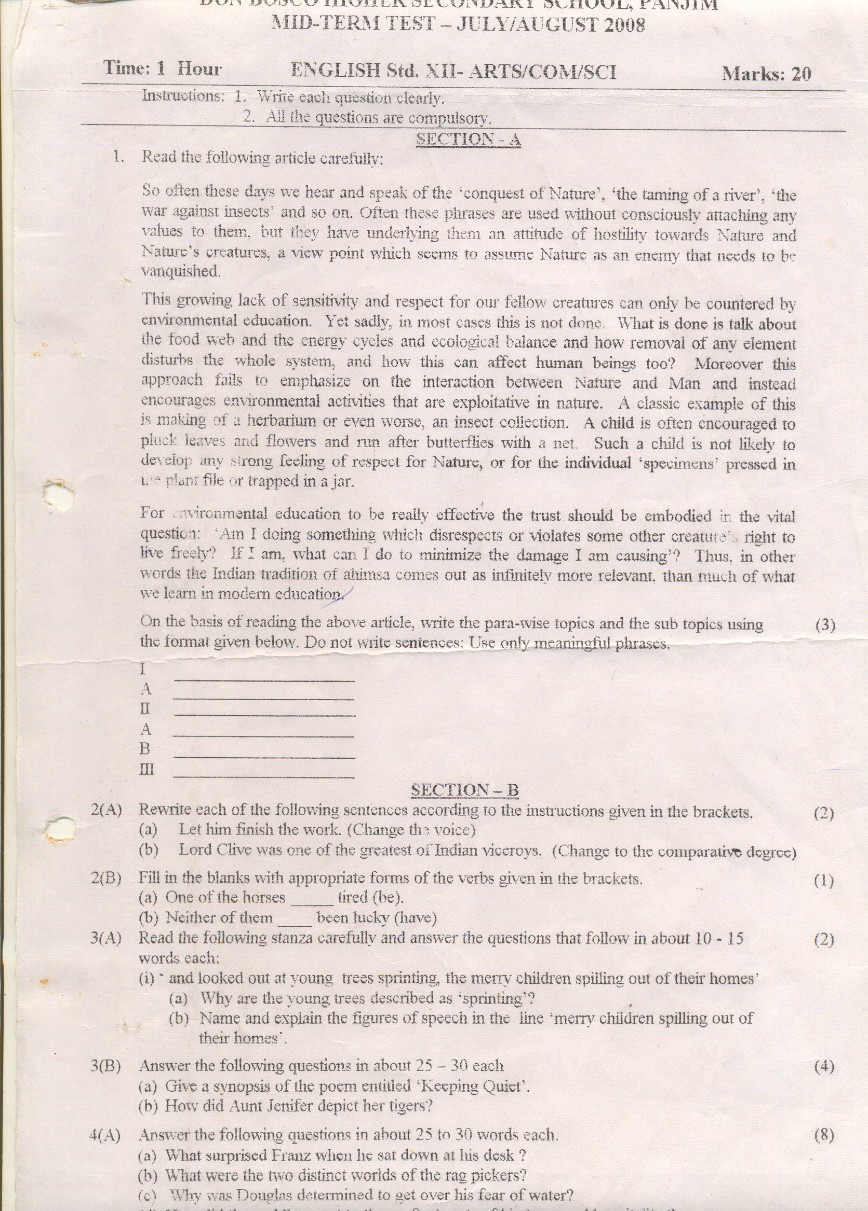
mid term test 2009
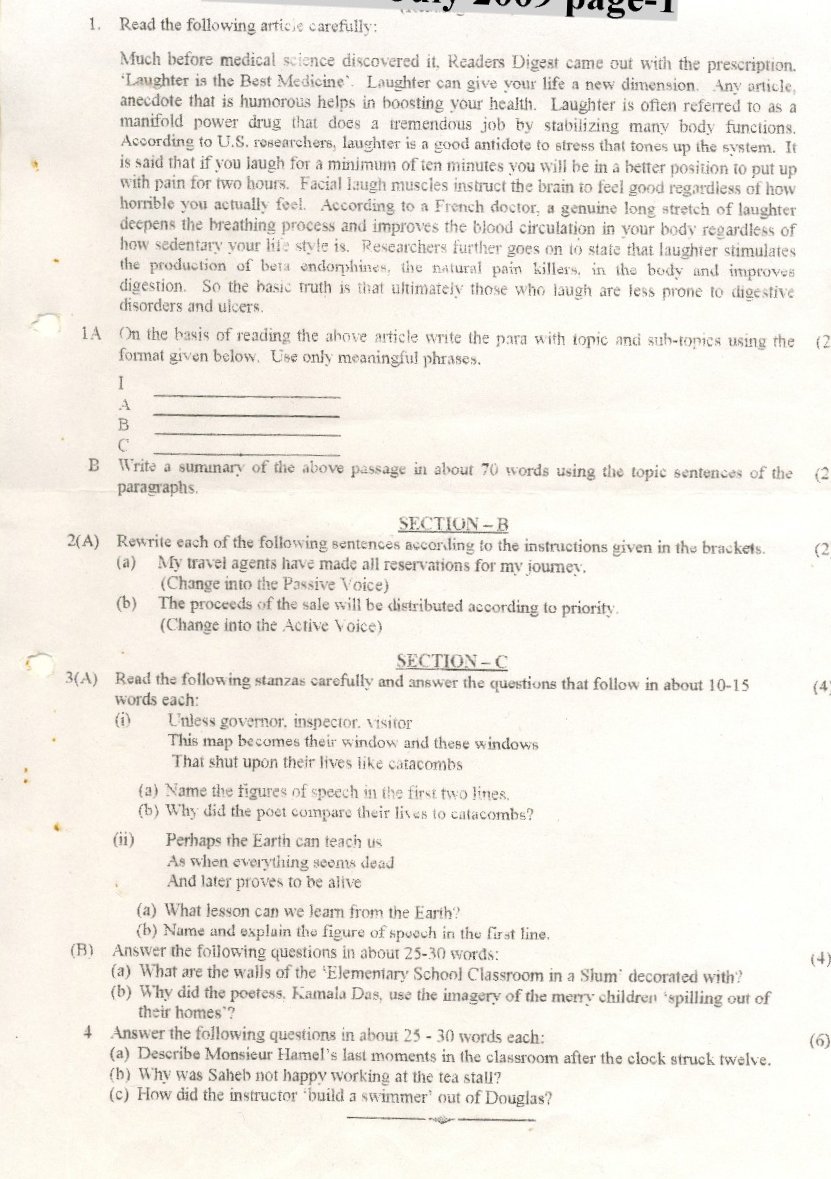
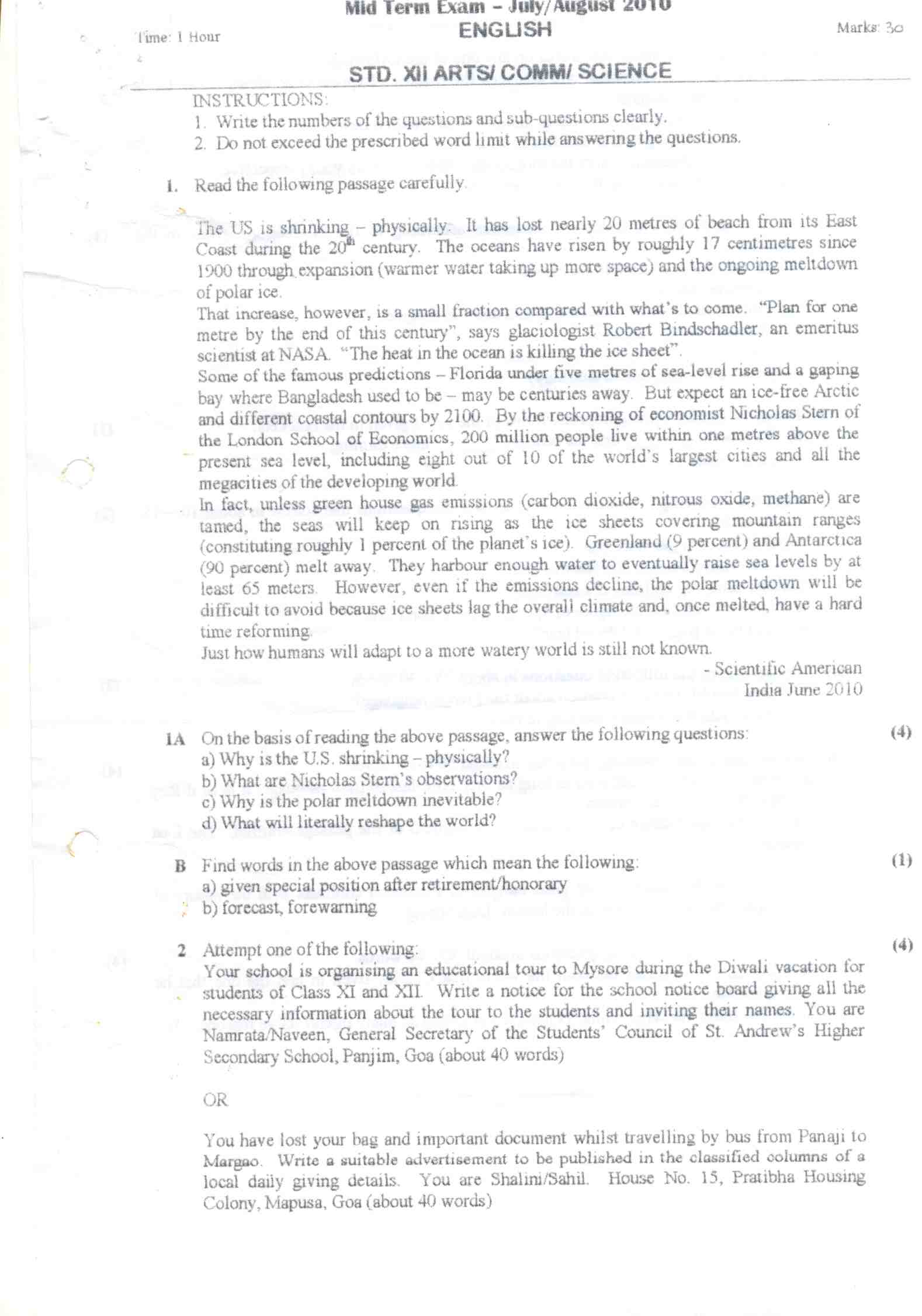
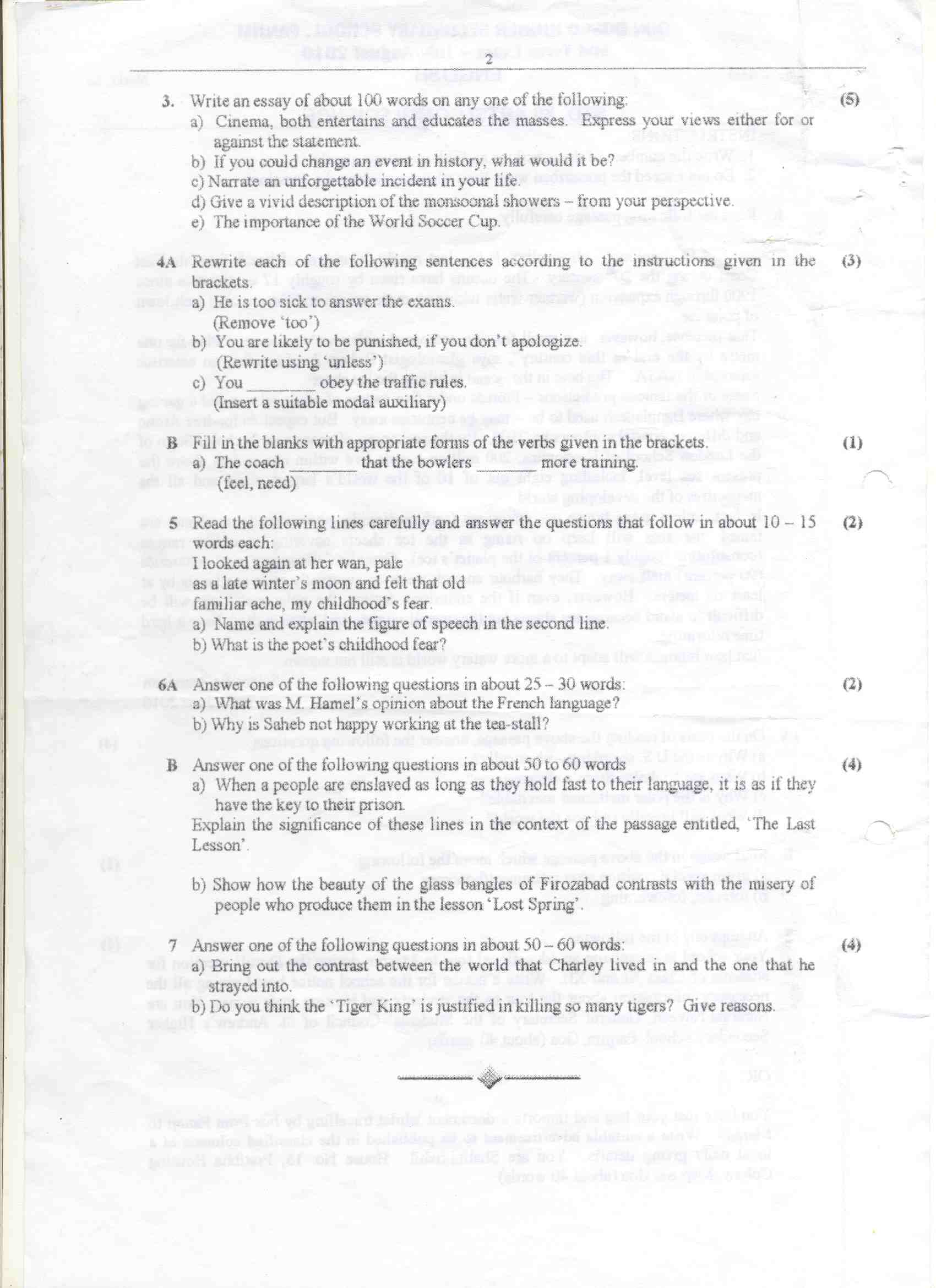
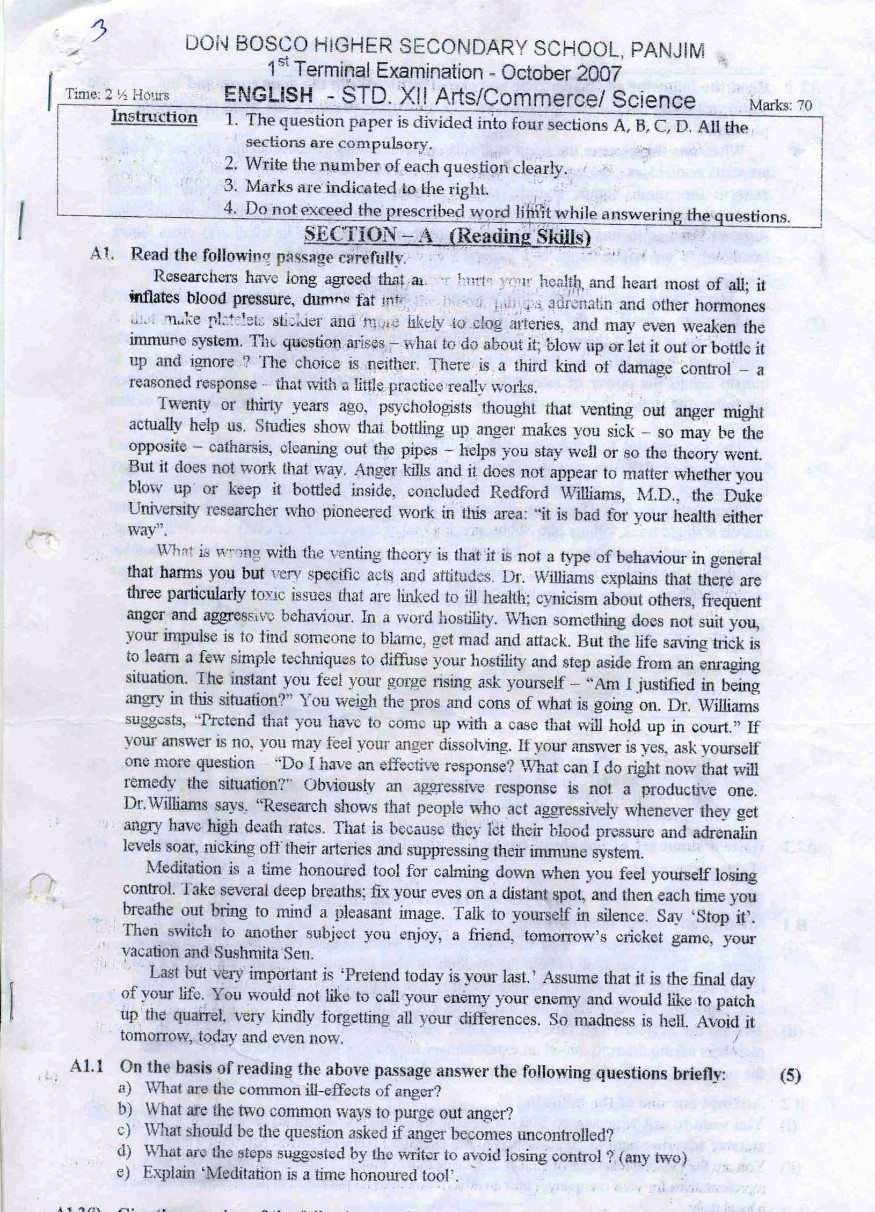
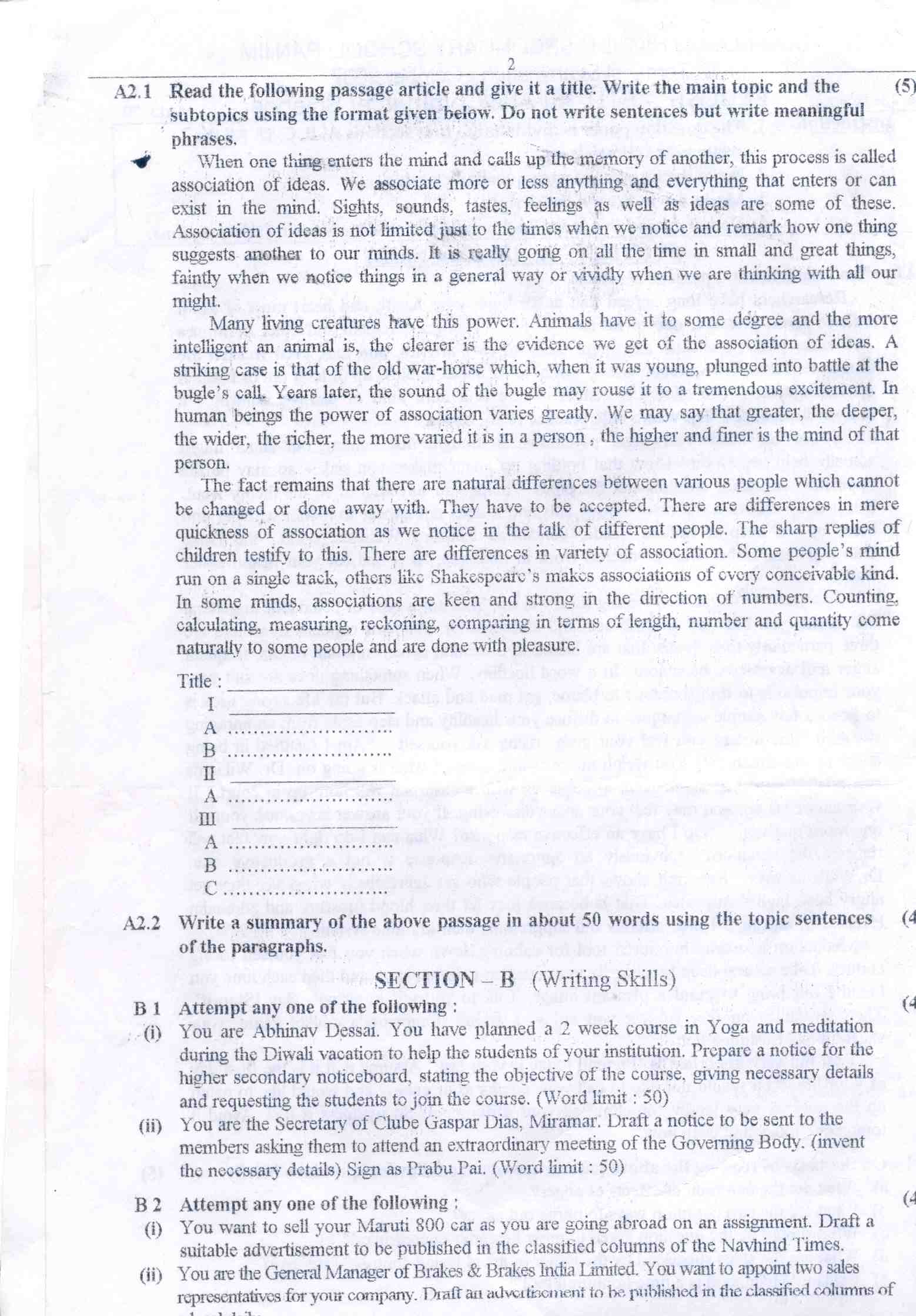
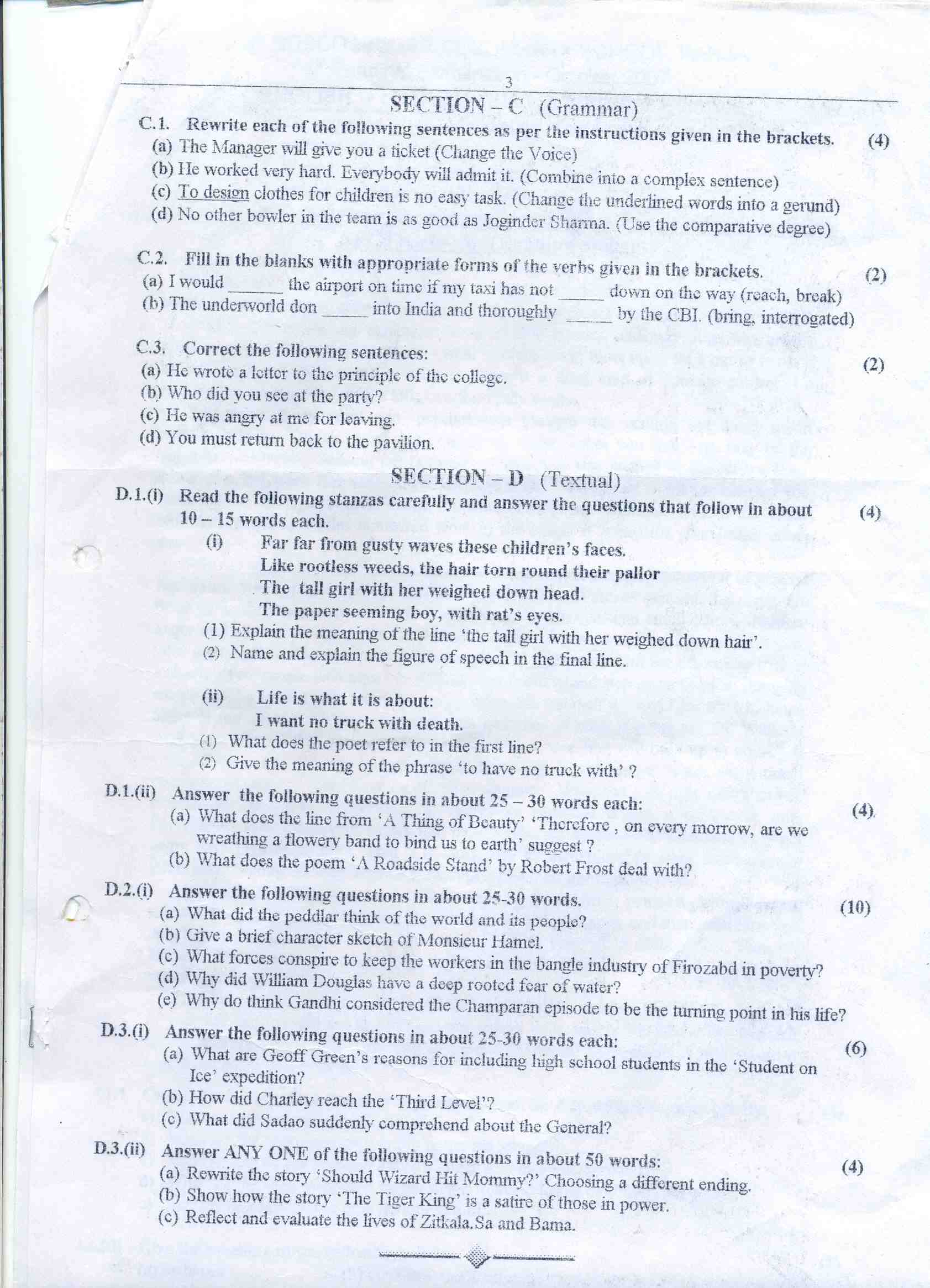
Terminal 2008
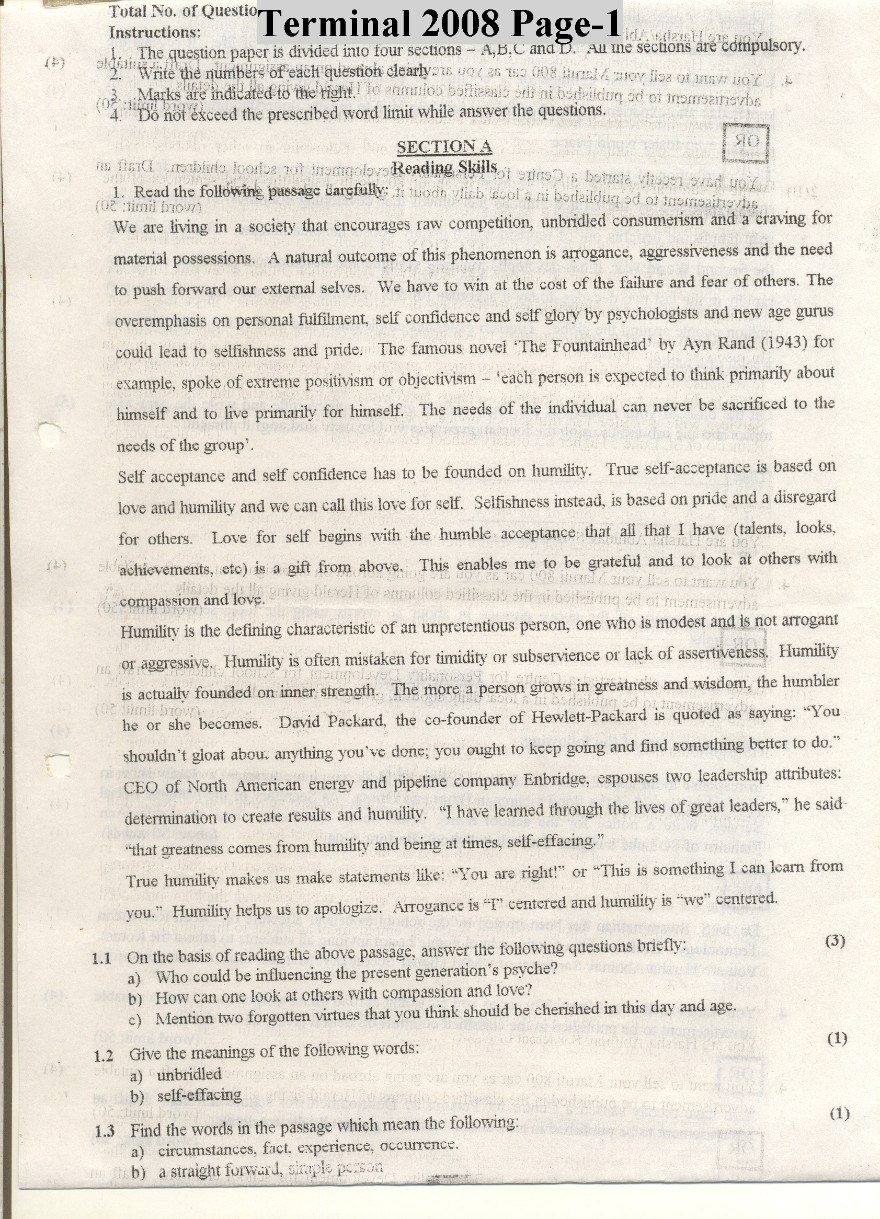
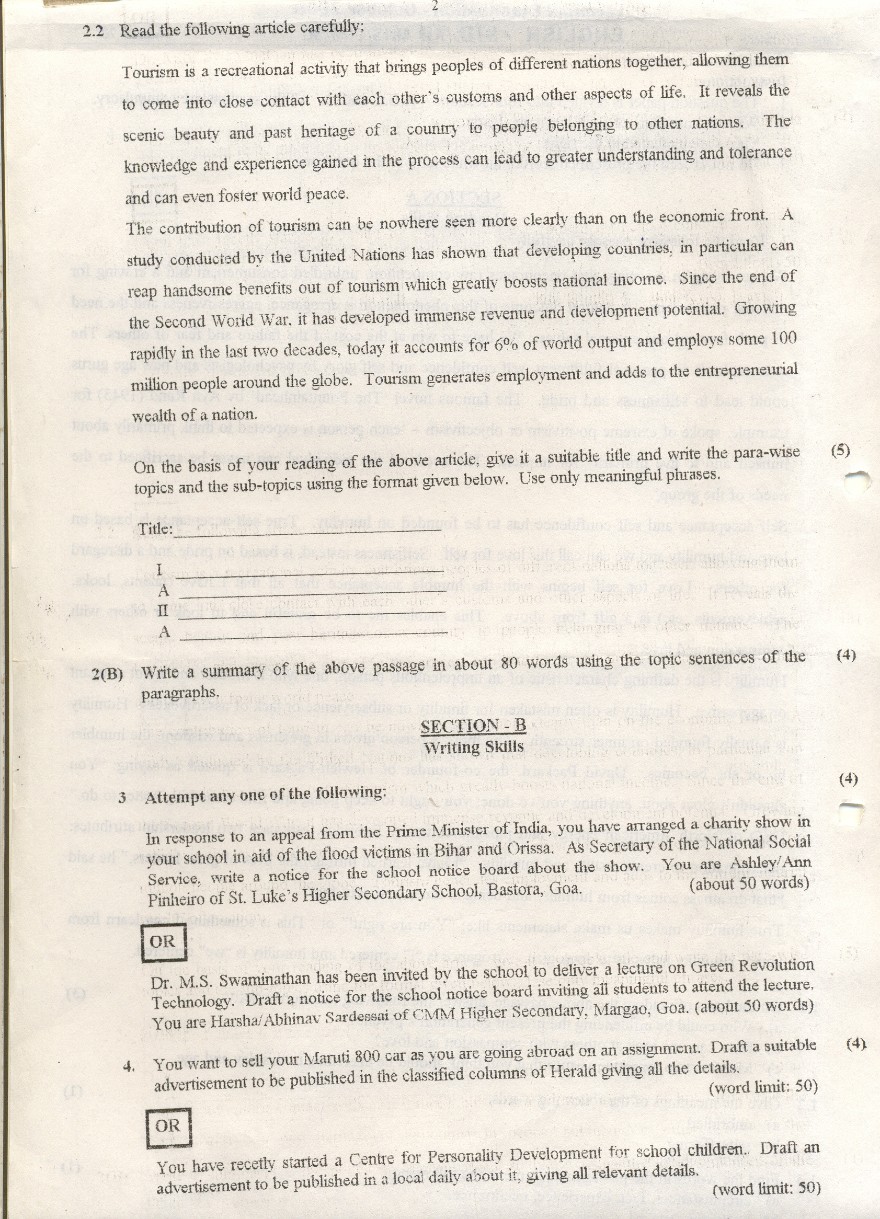
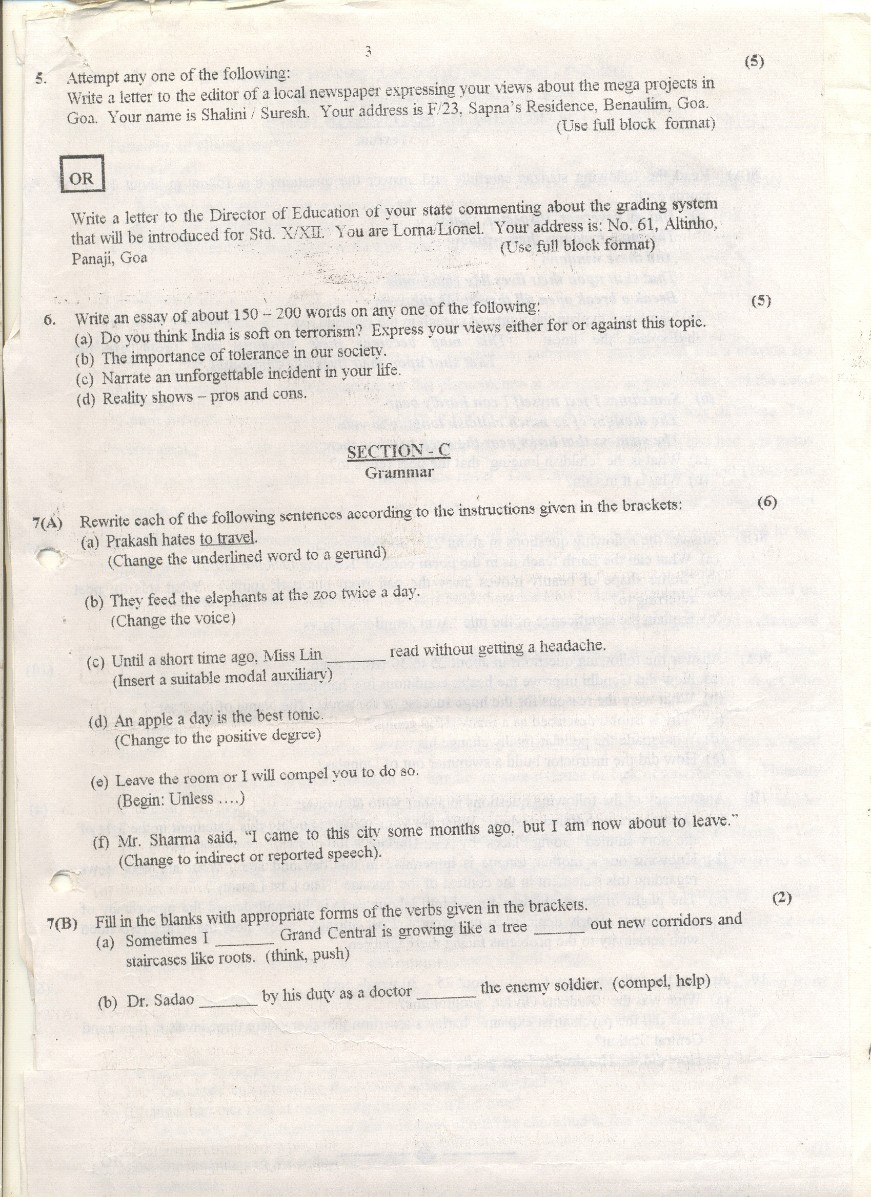
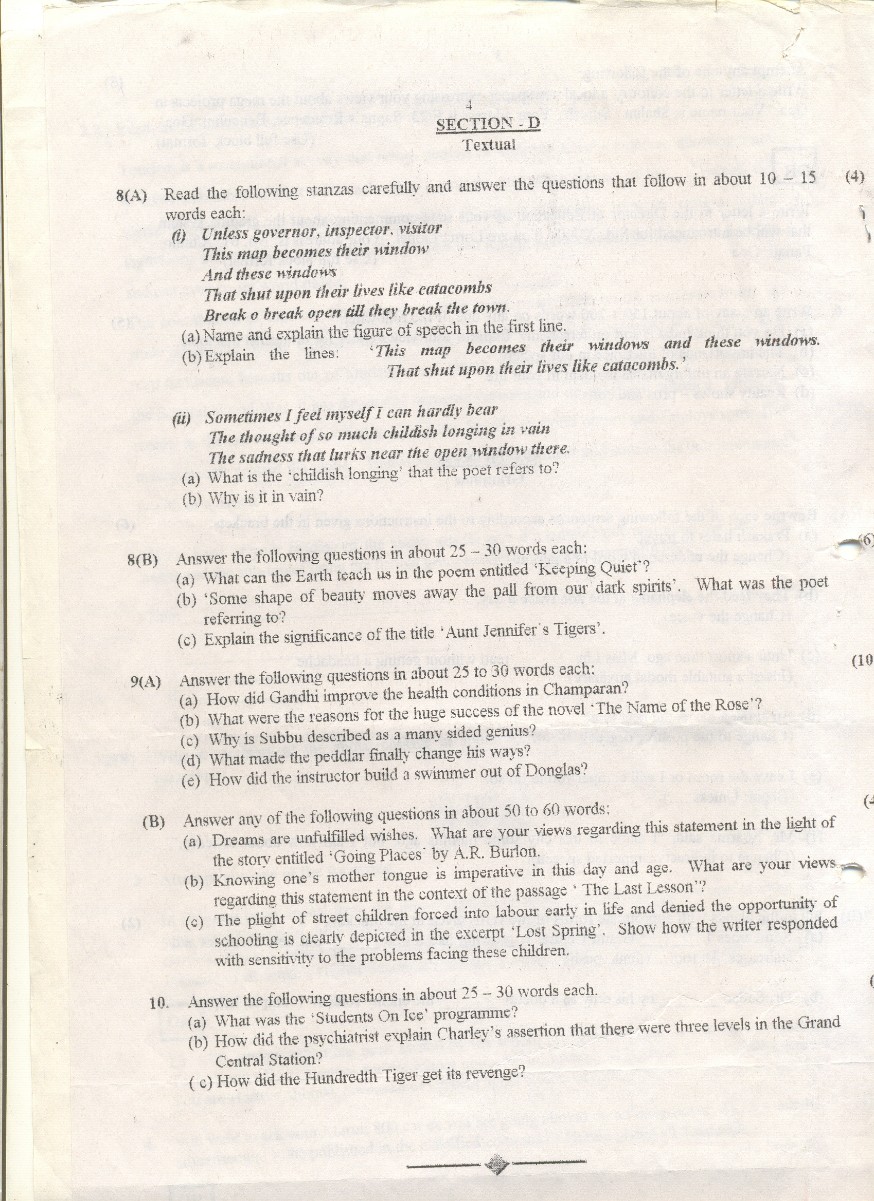
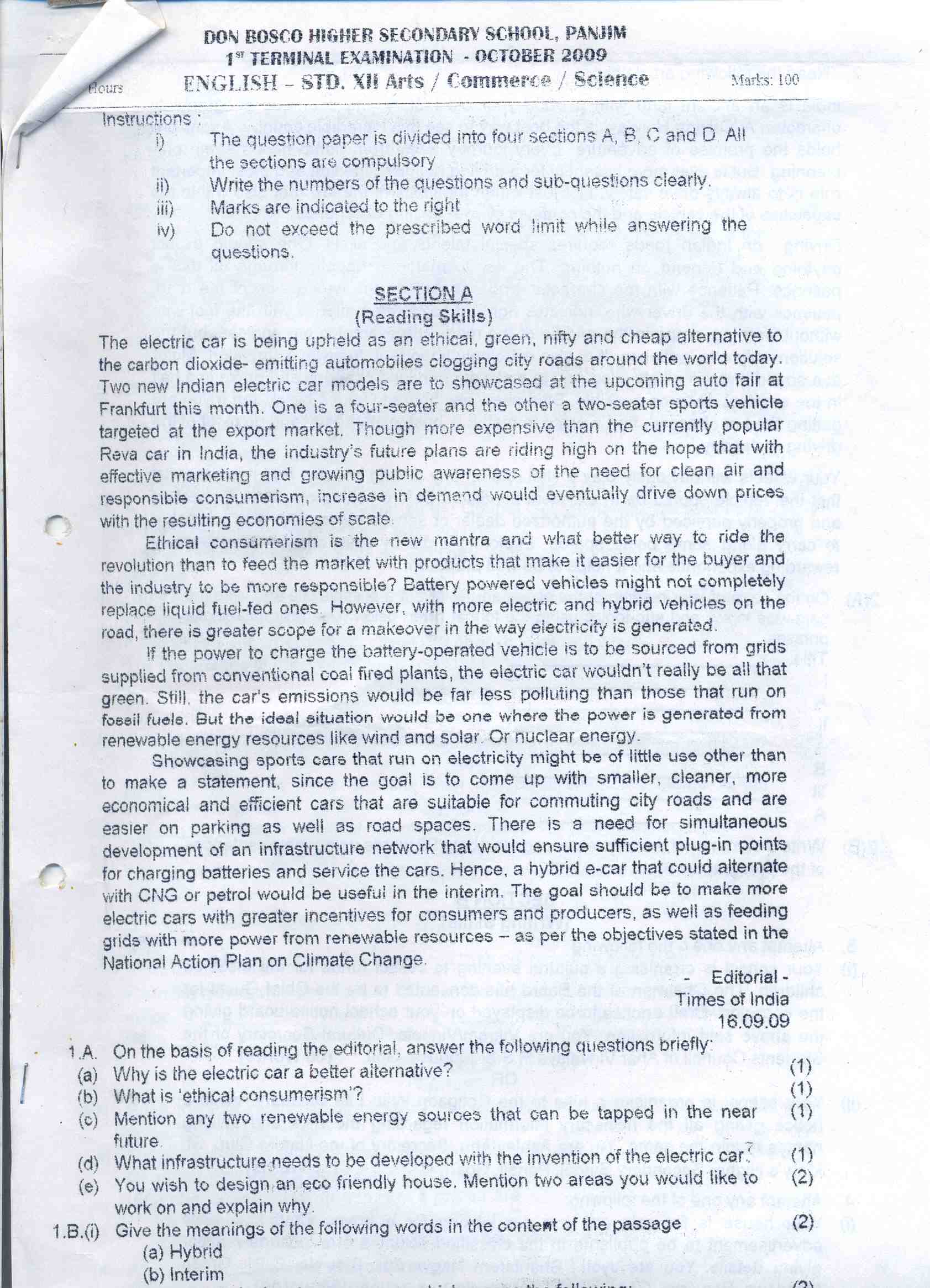
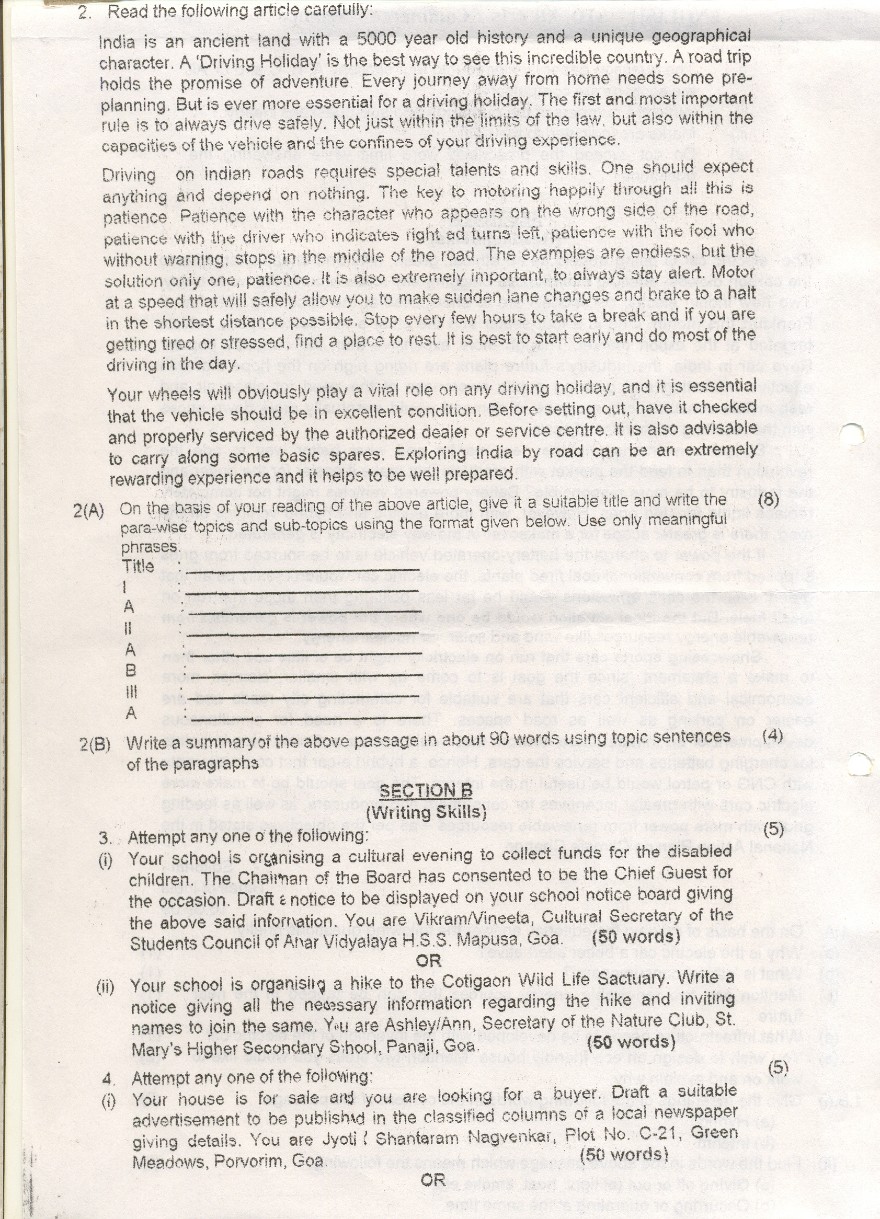
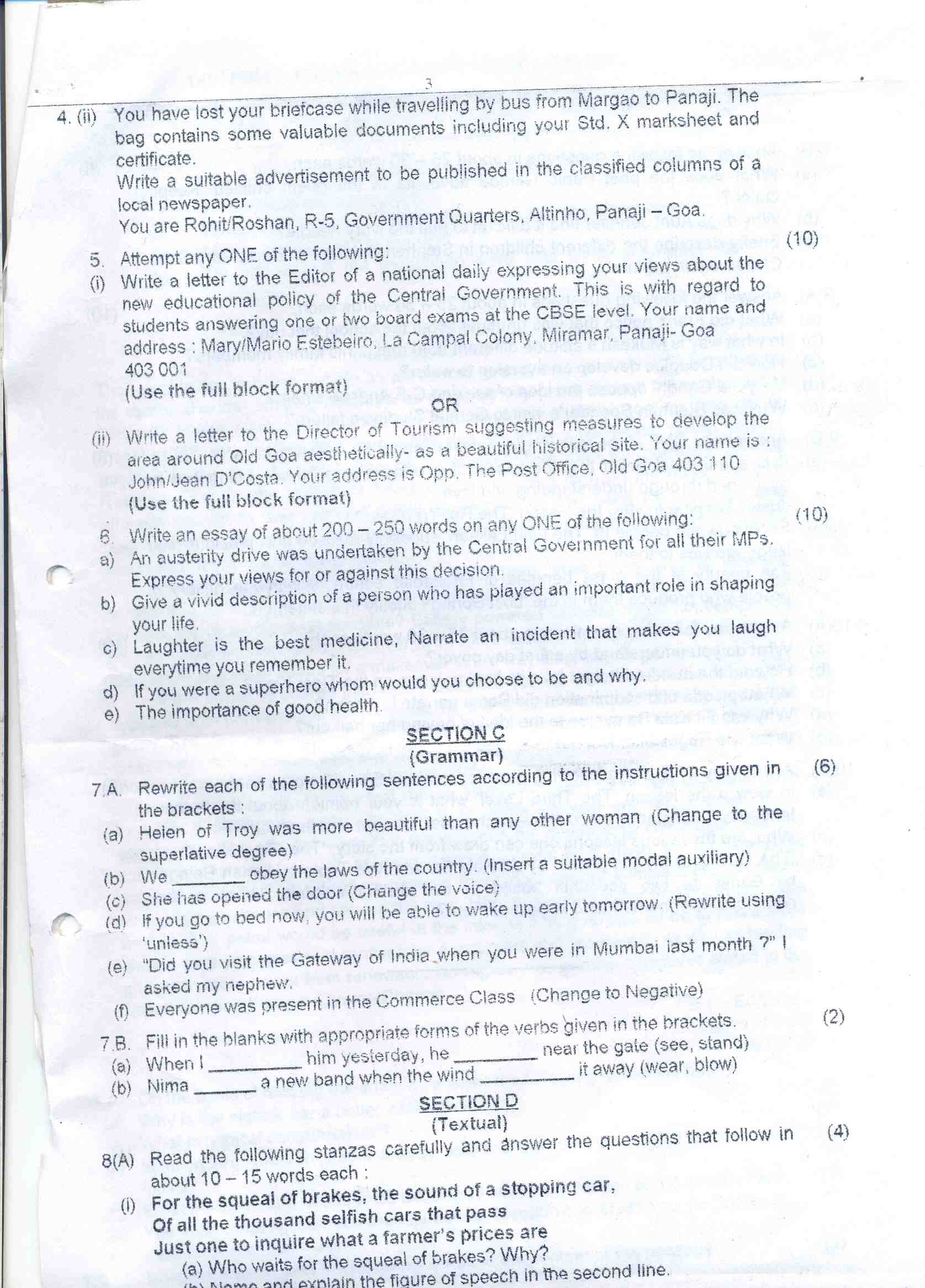
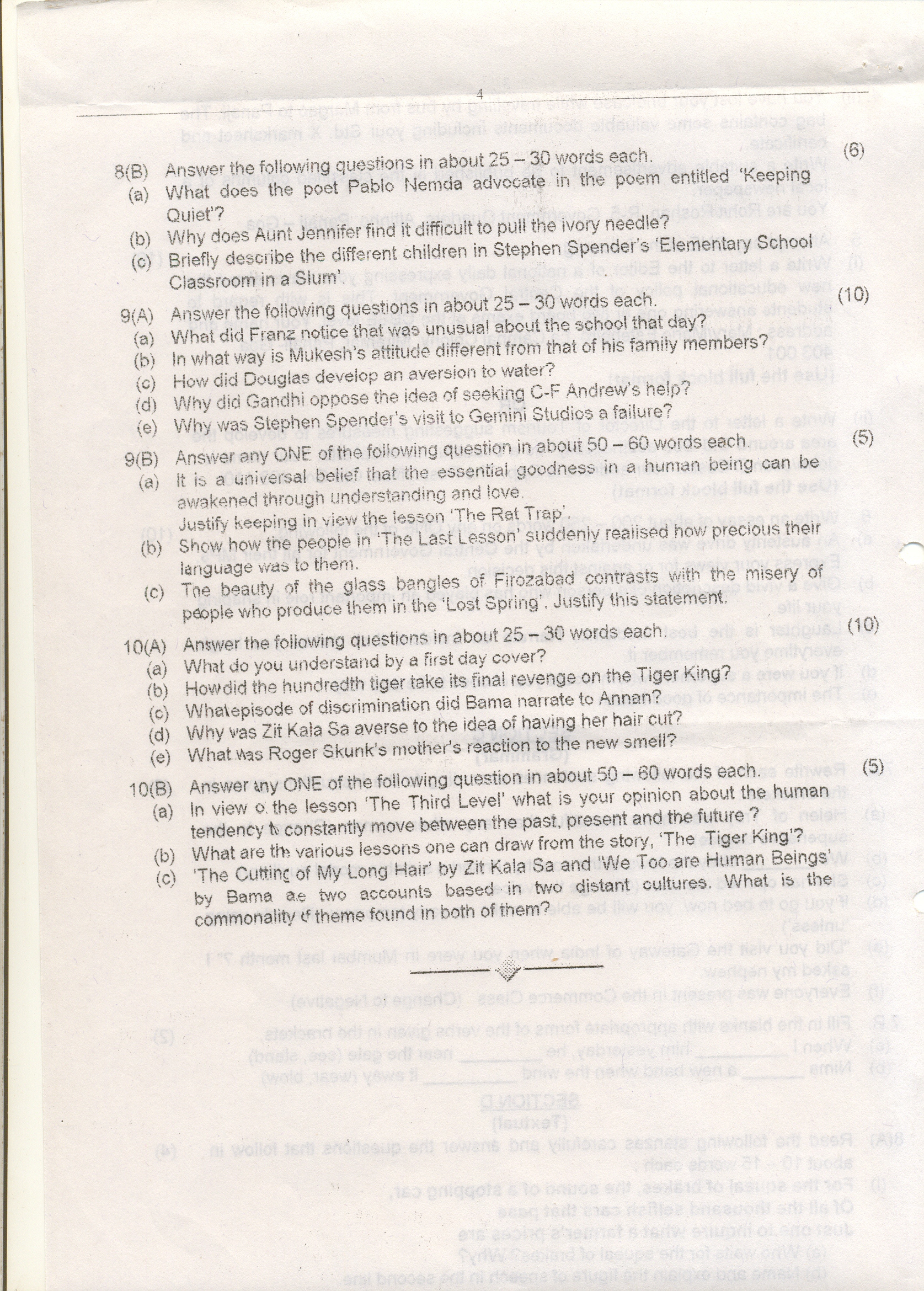
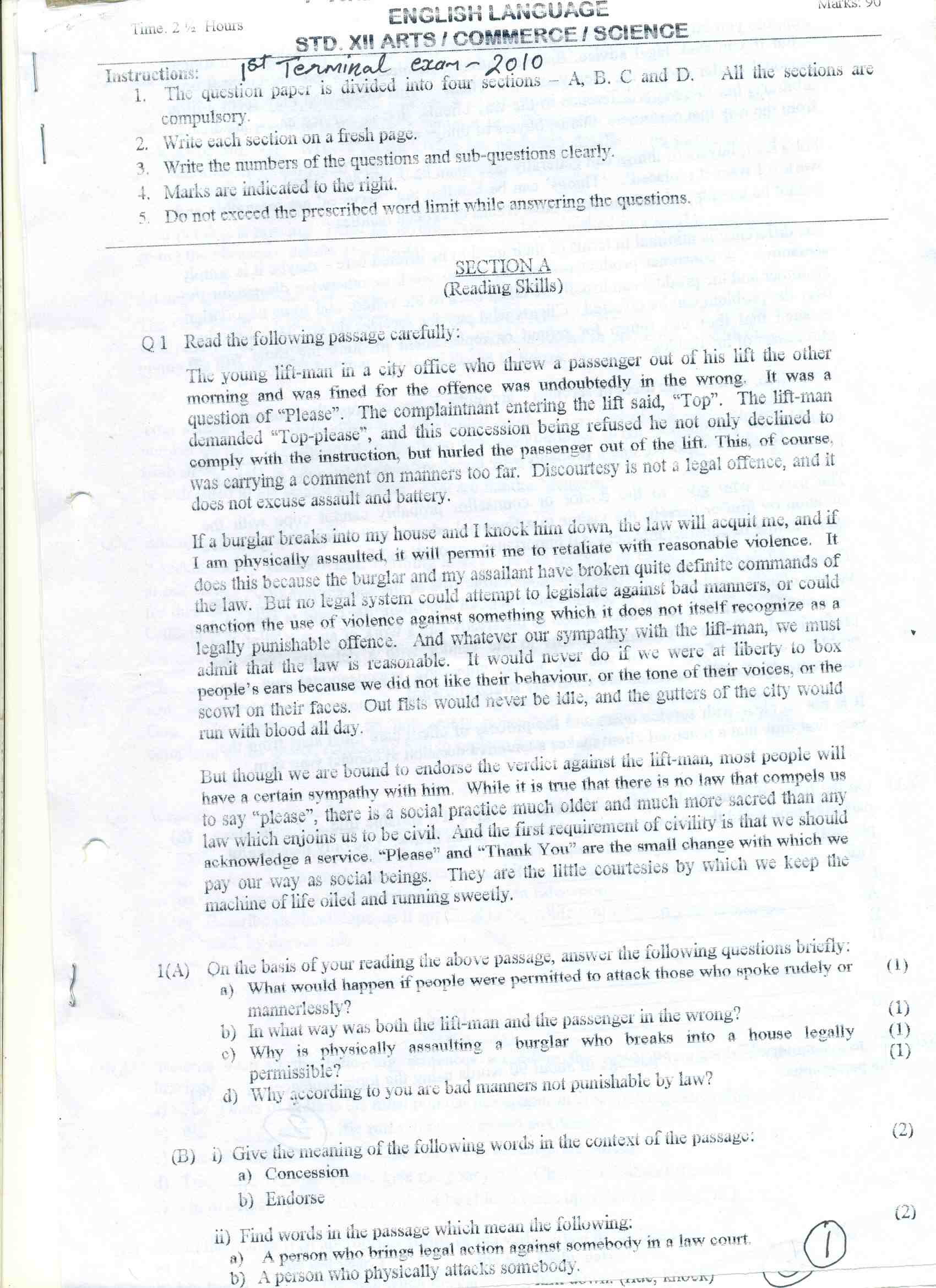
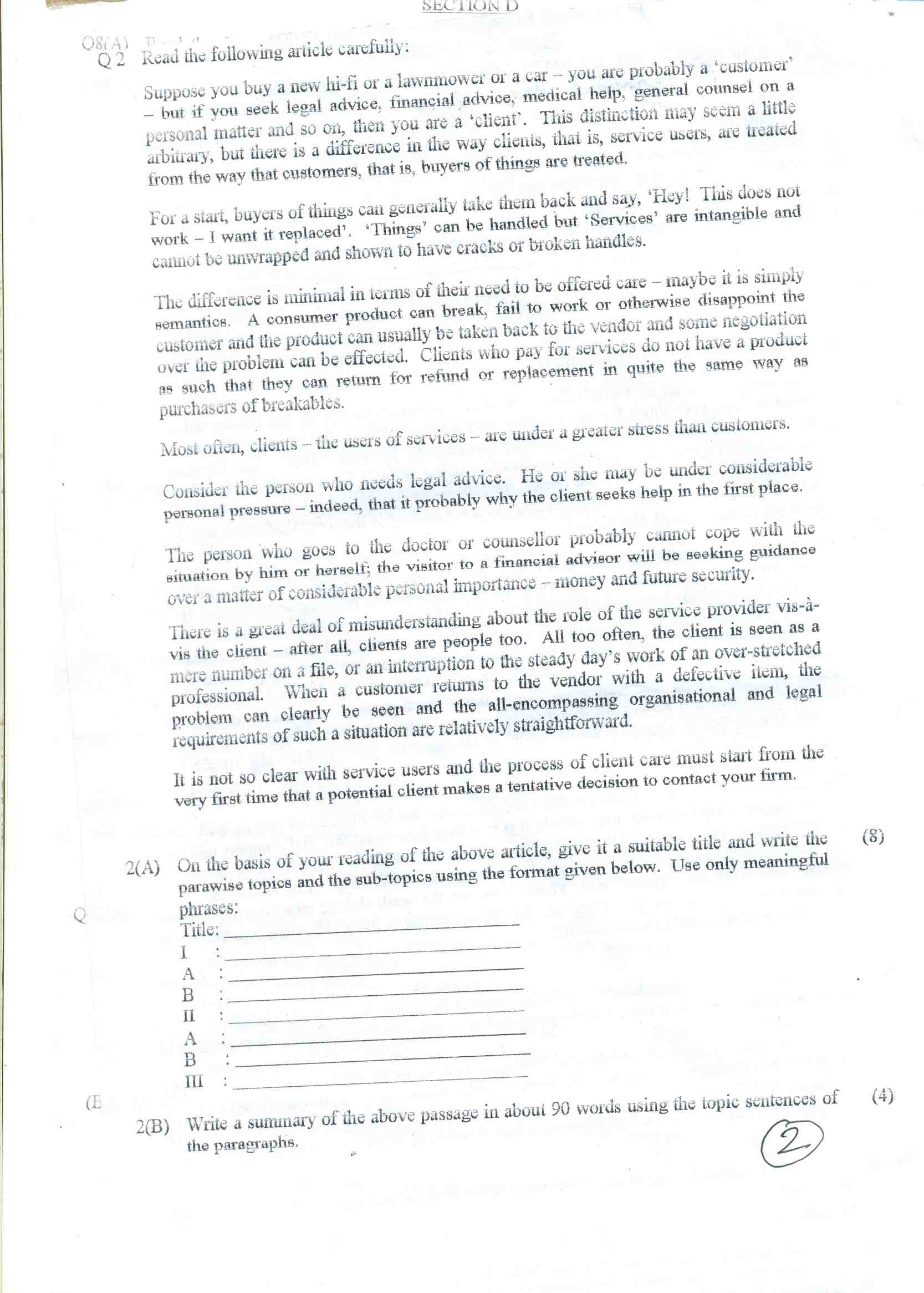
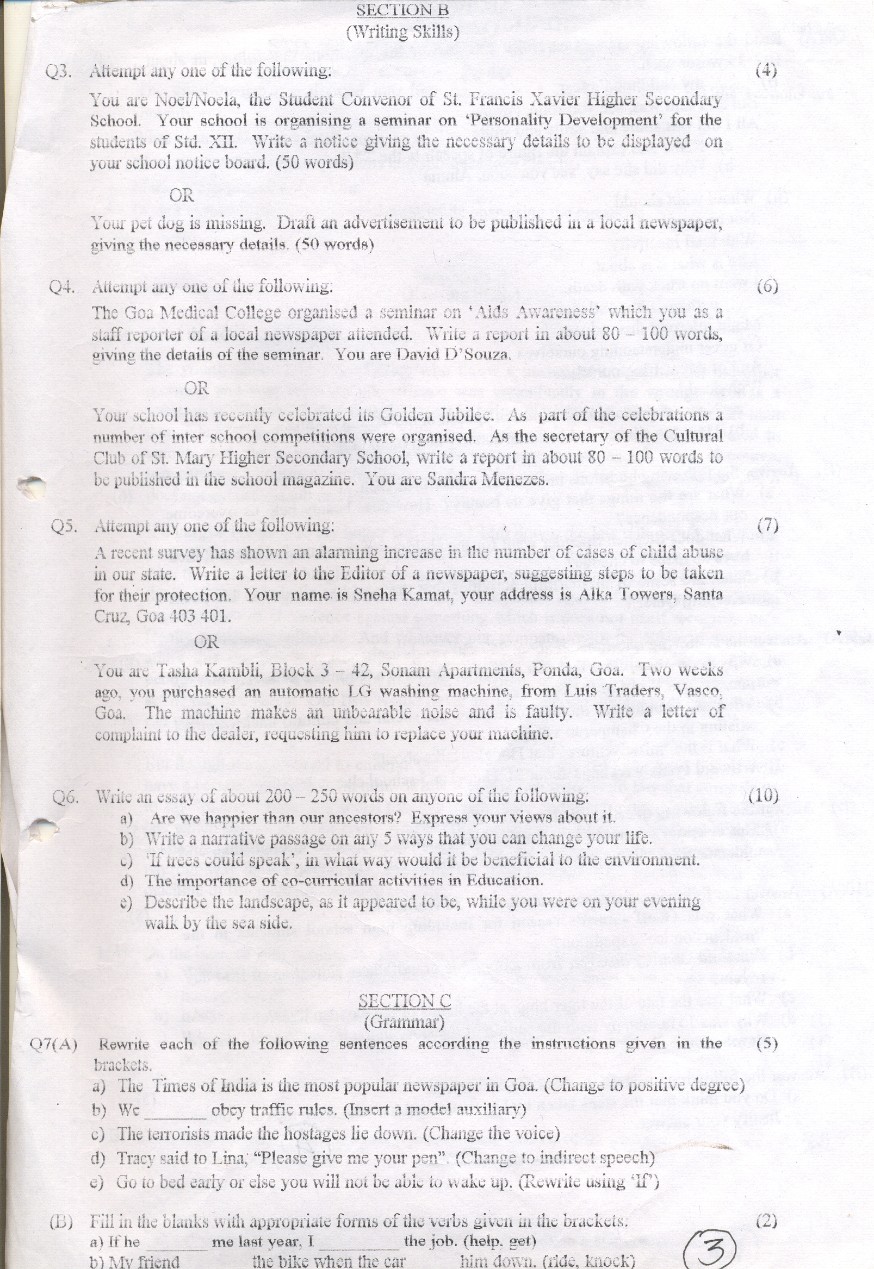
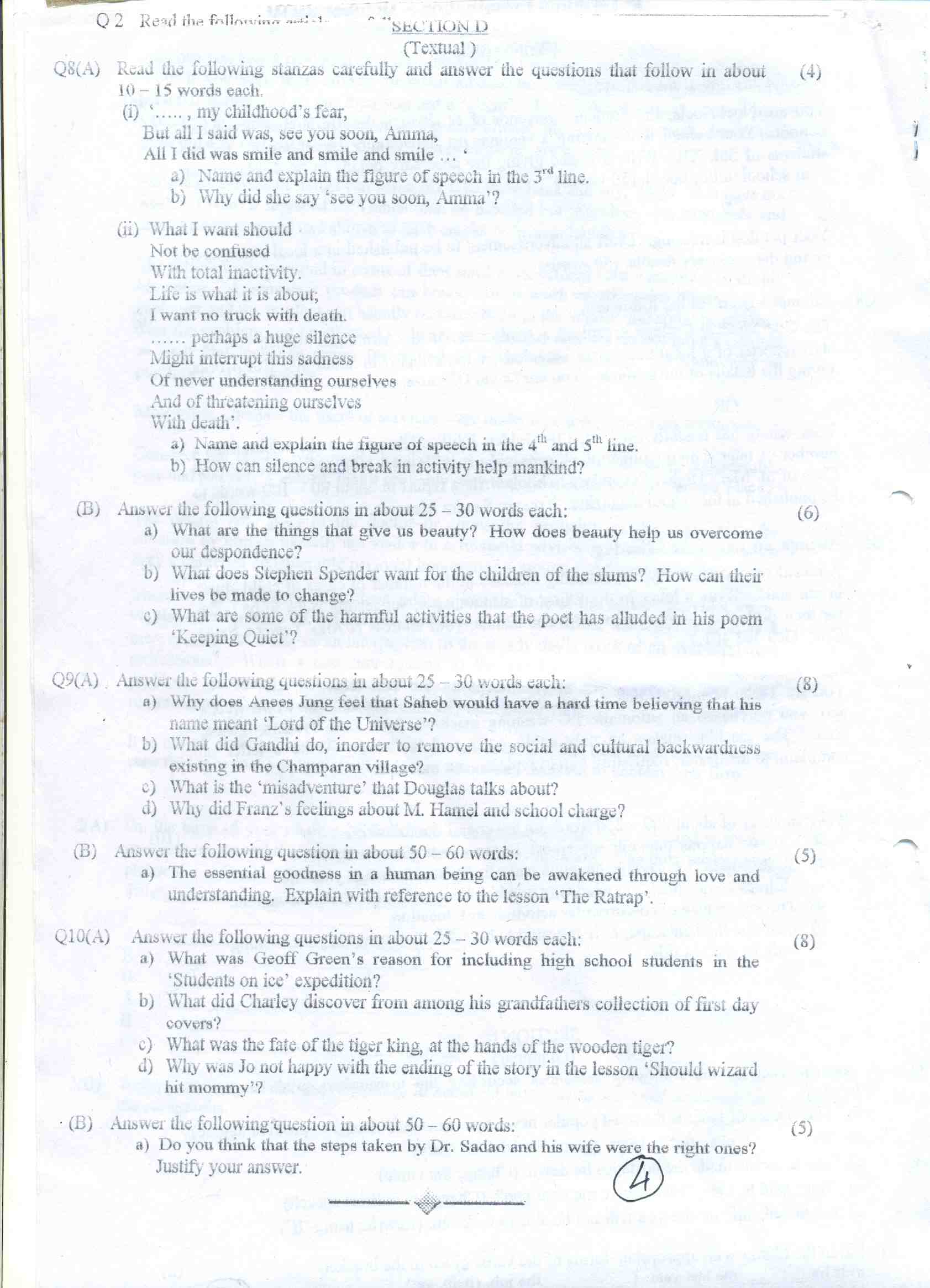
1st Terminal examination oct 2011
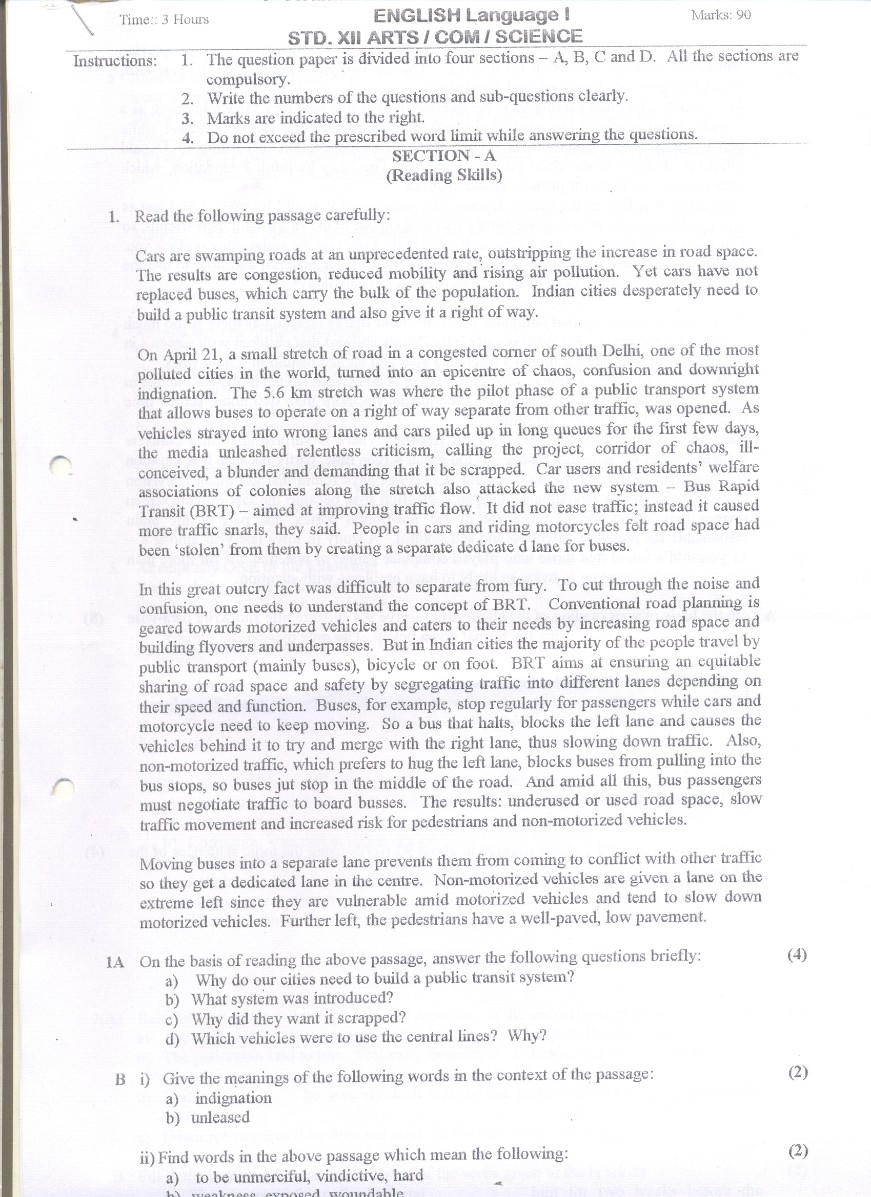
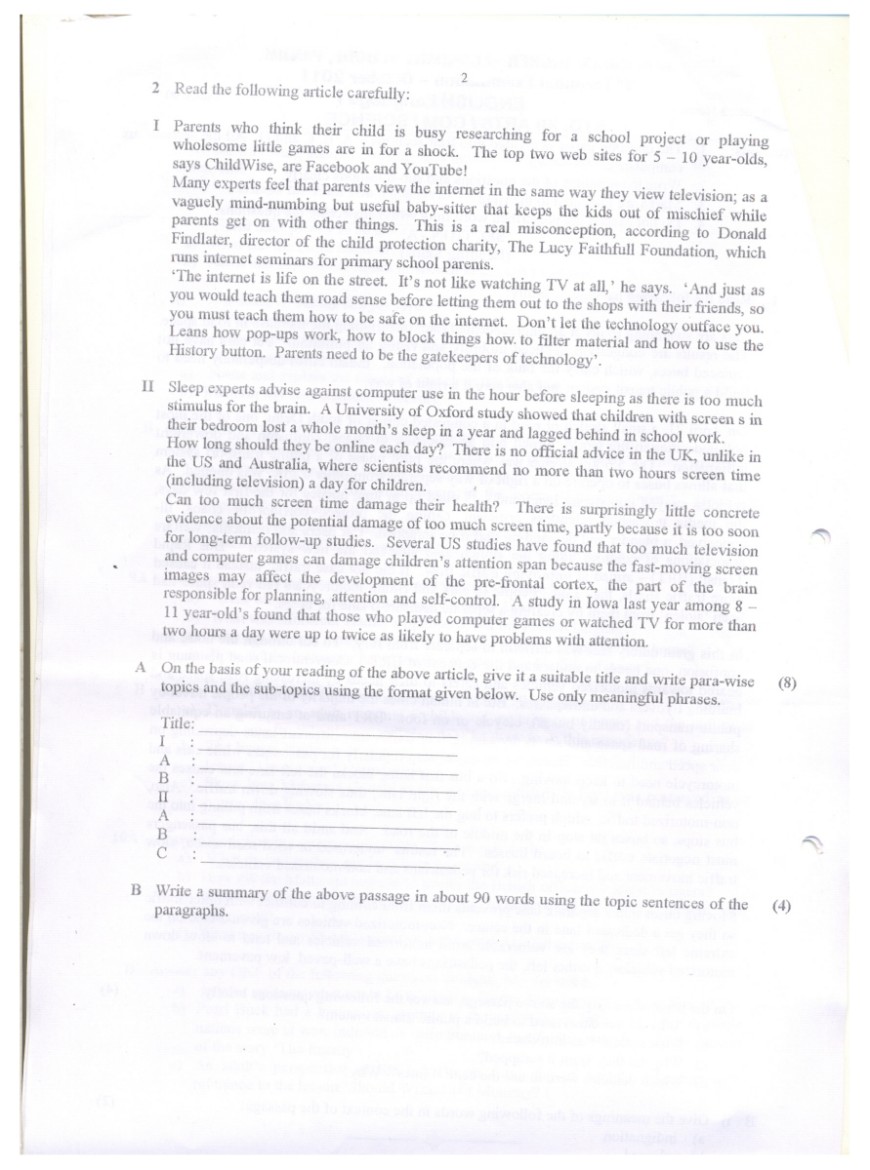
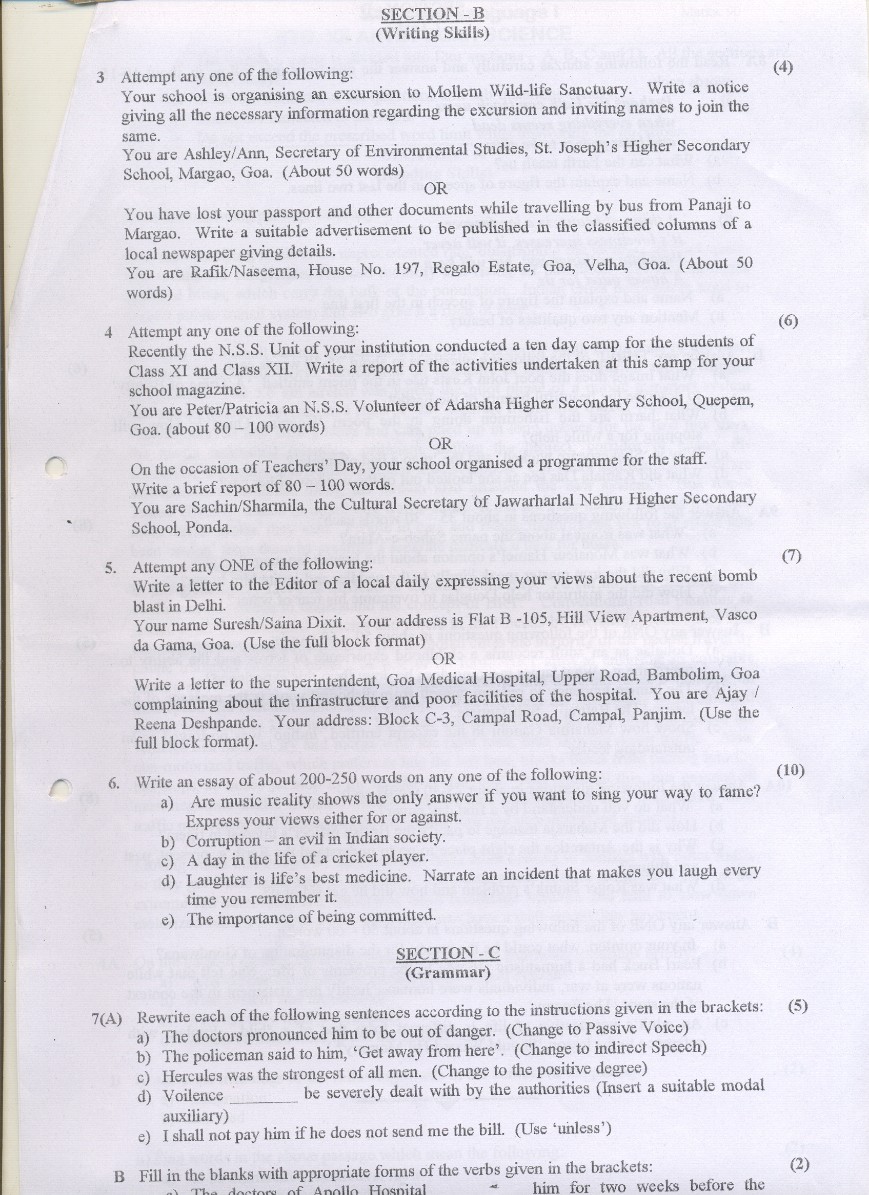
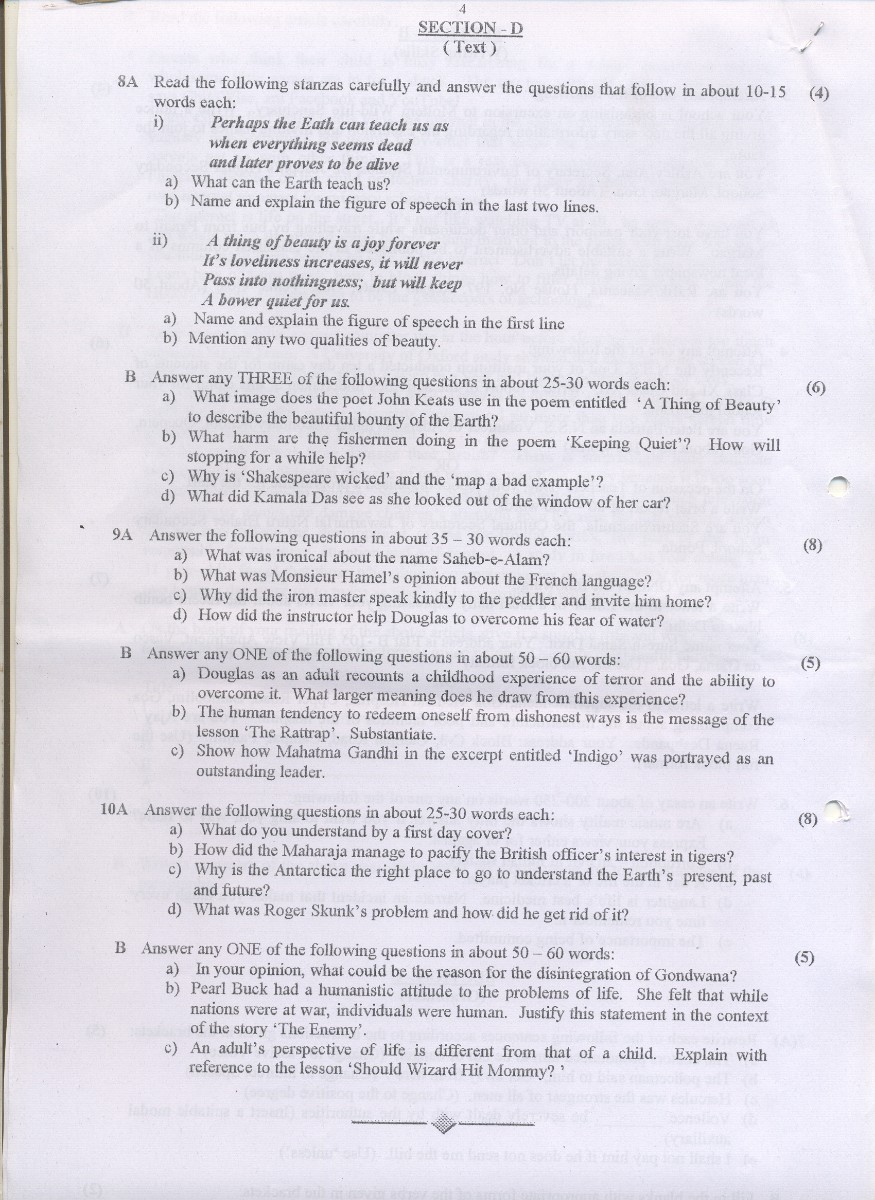
2nd Terminal exam January 2012
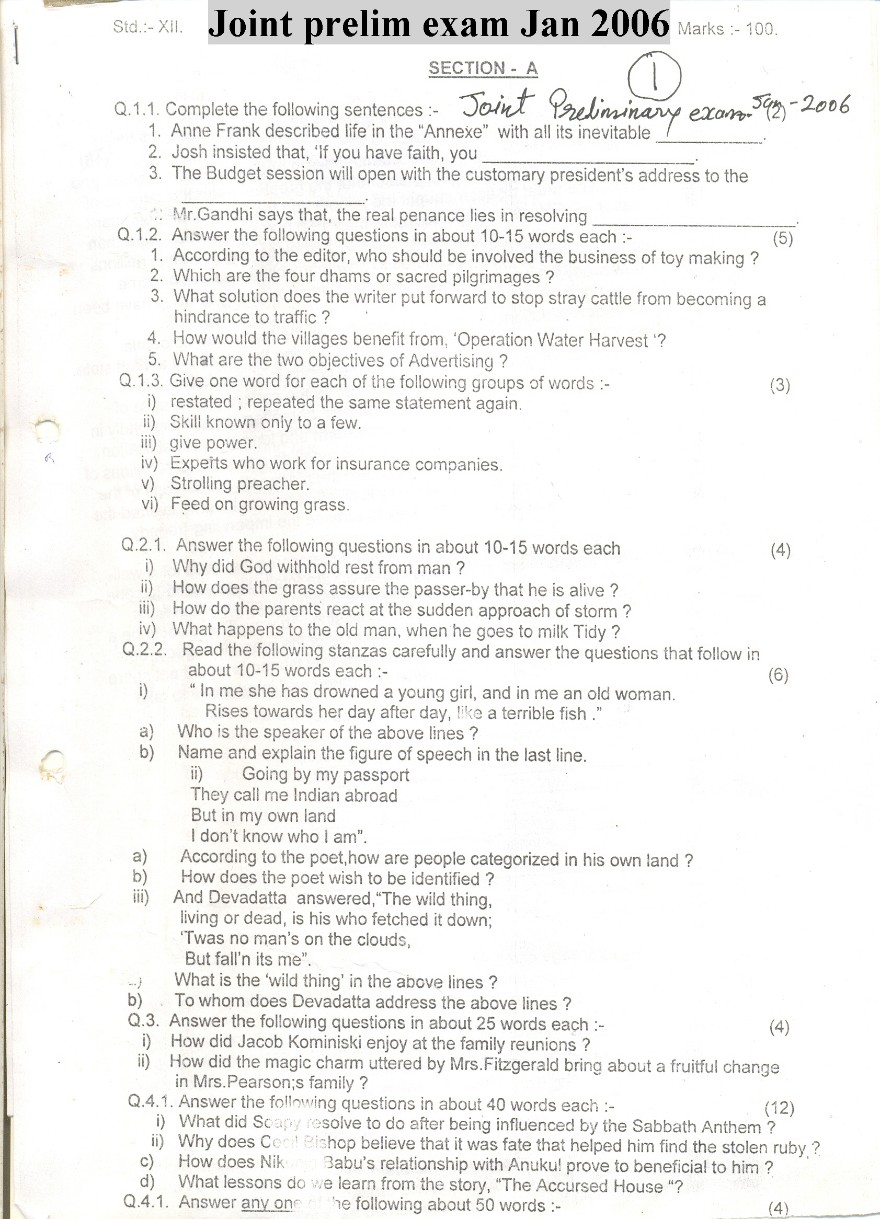
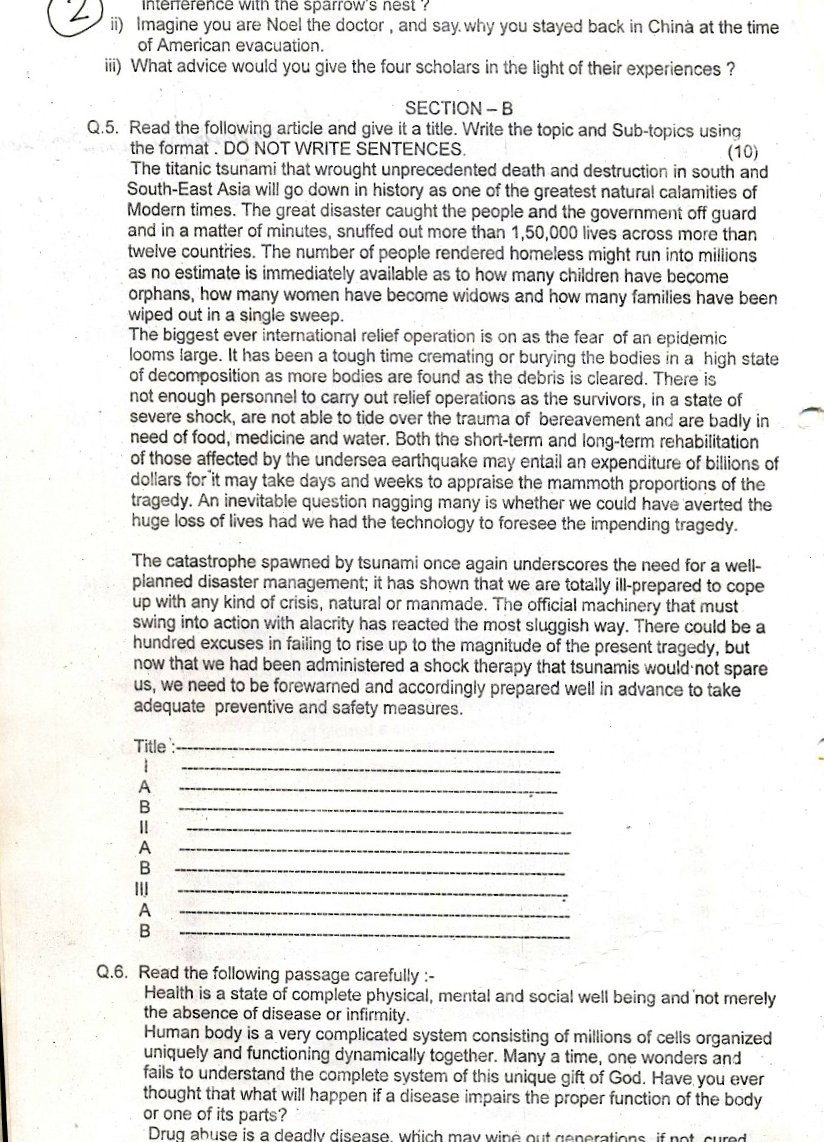
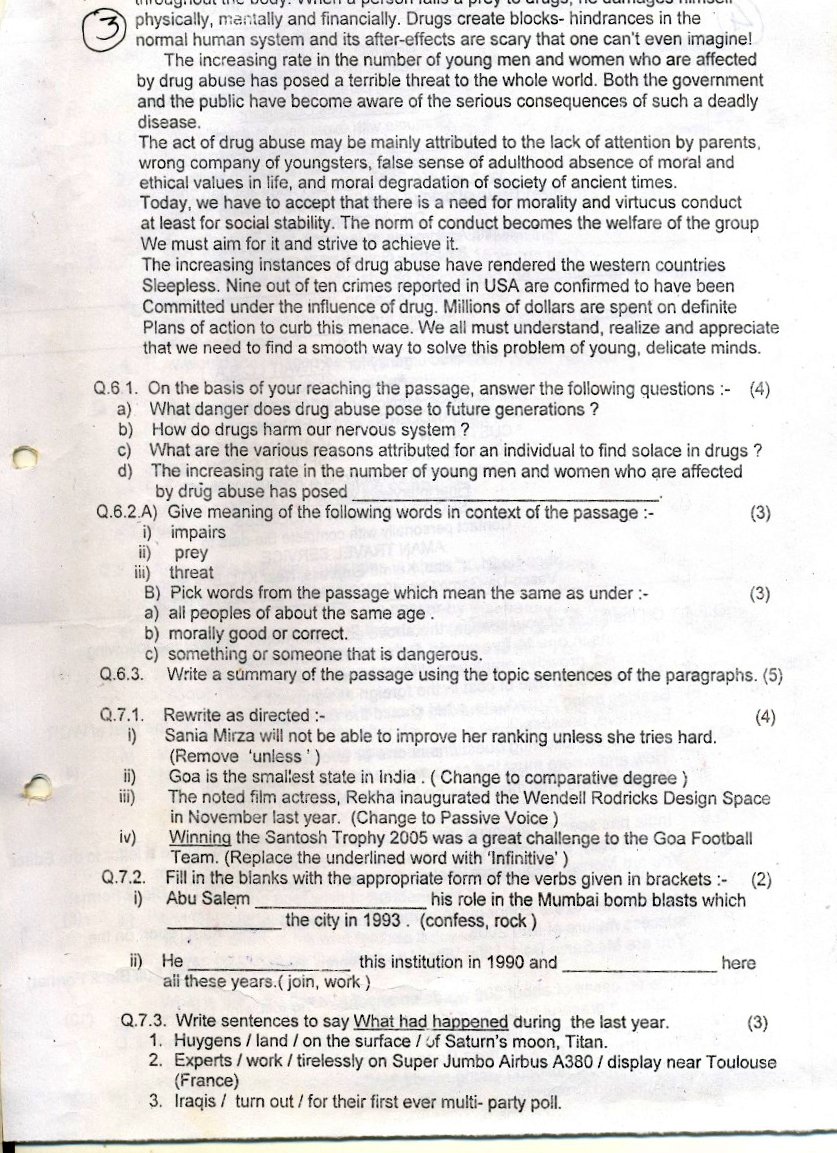
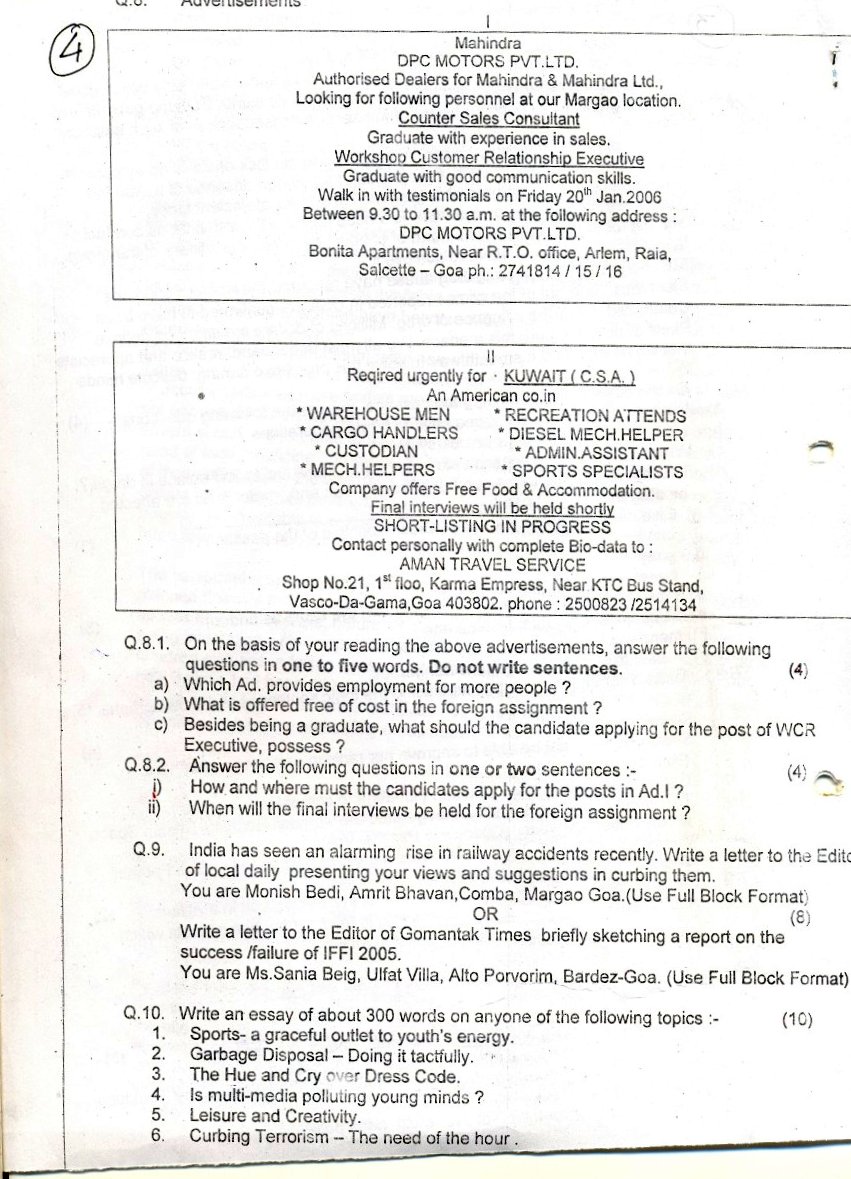
Prelim 2008 page-1
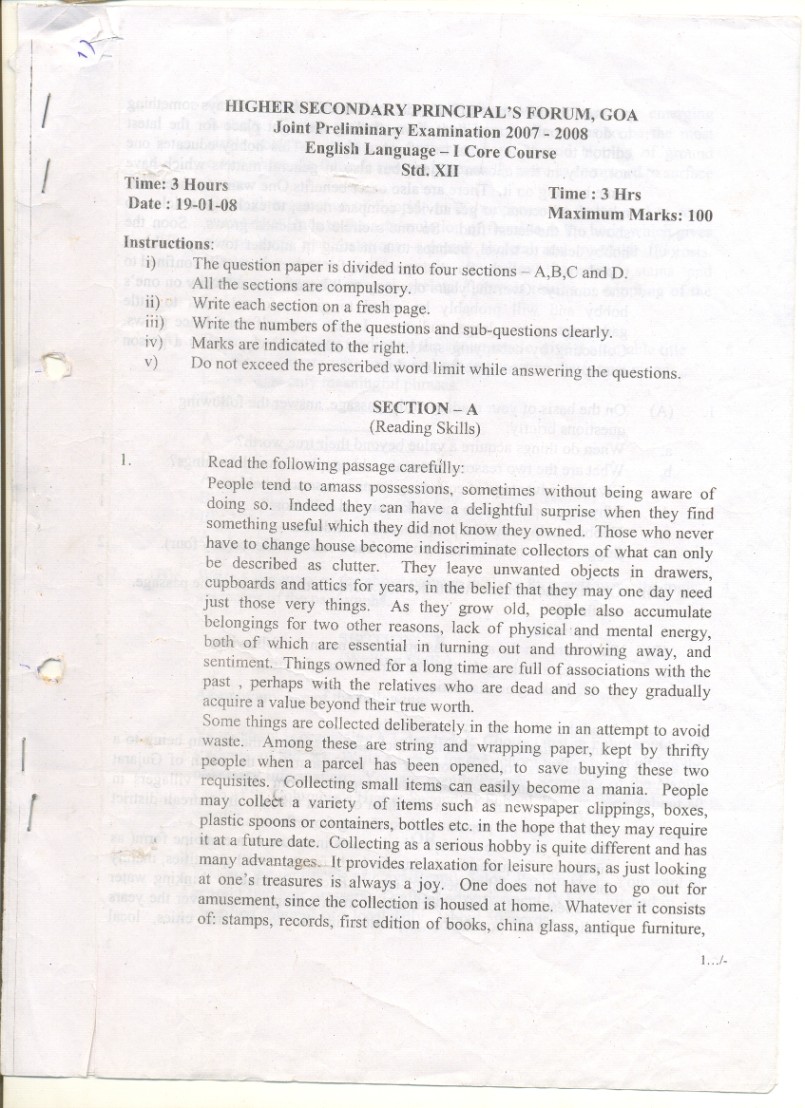
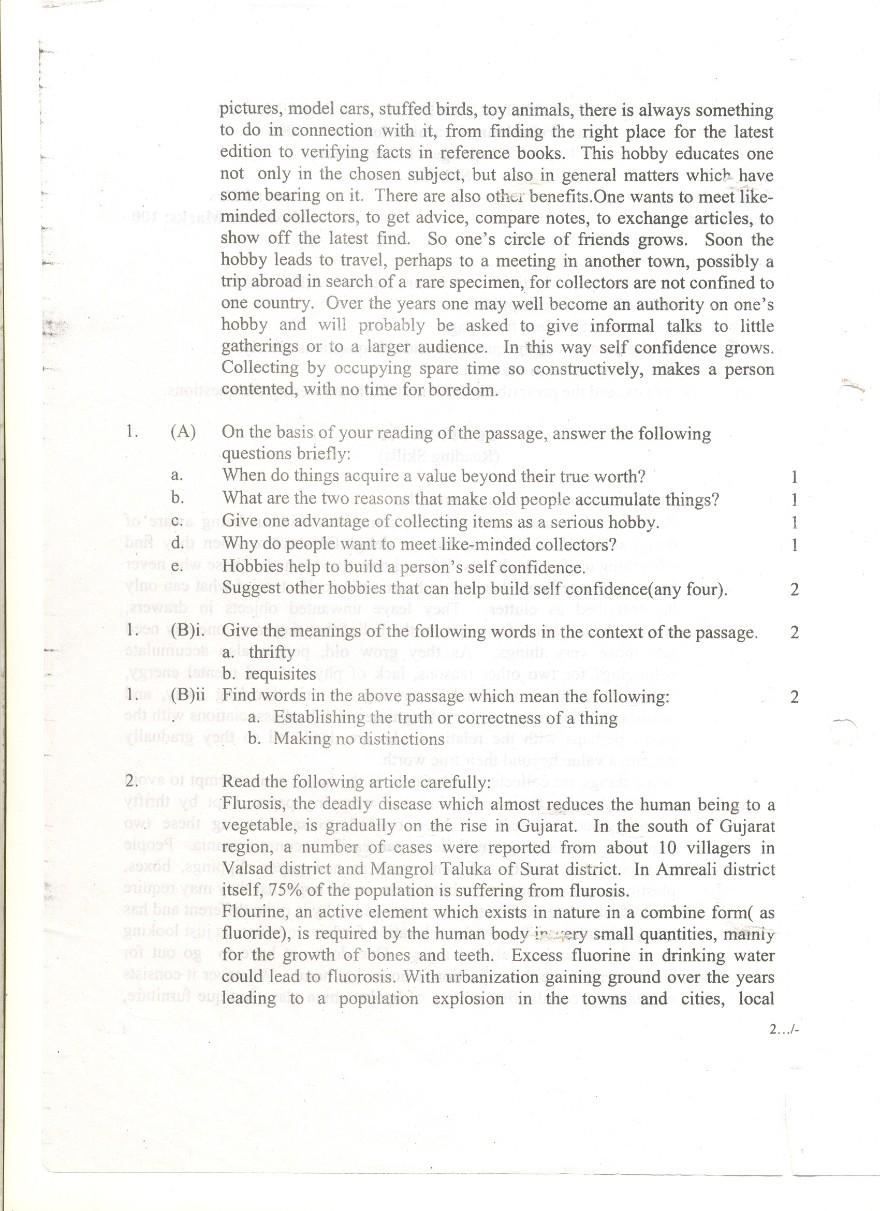
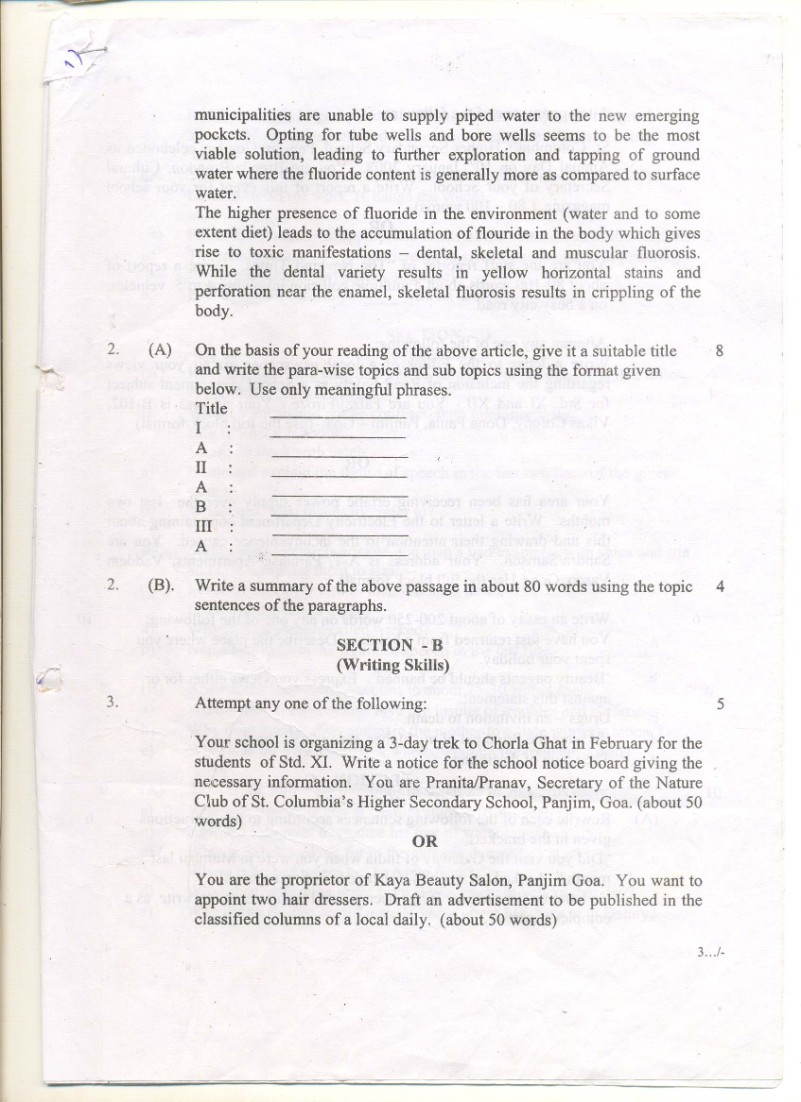
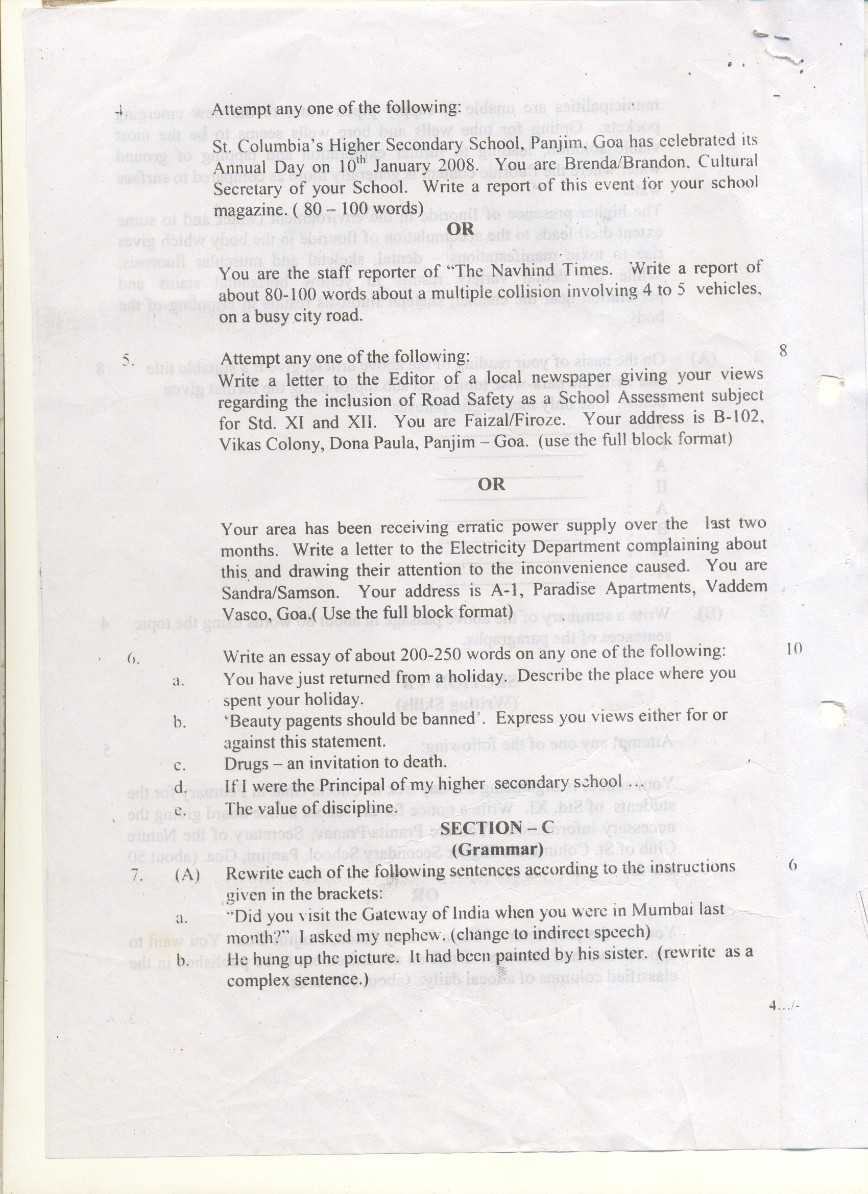
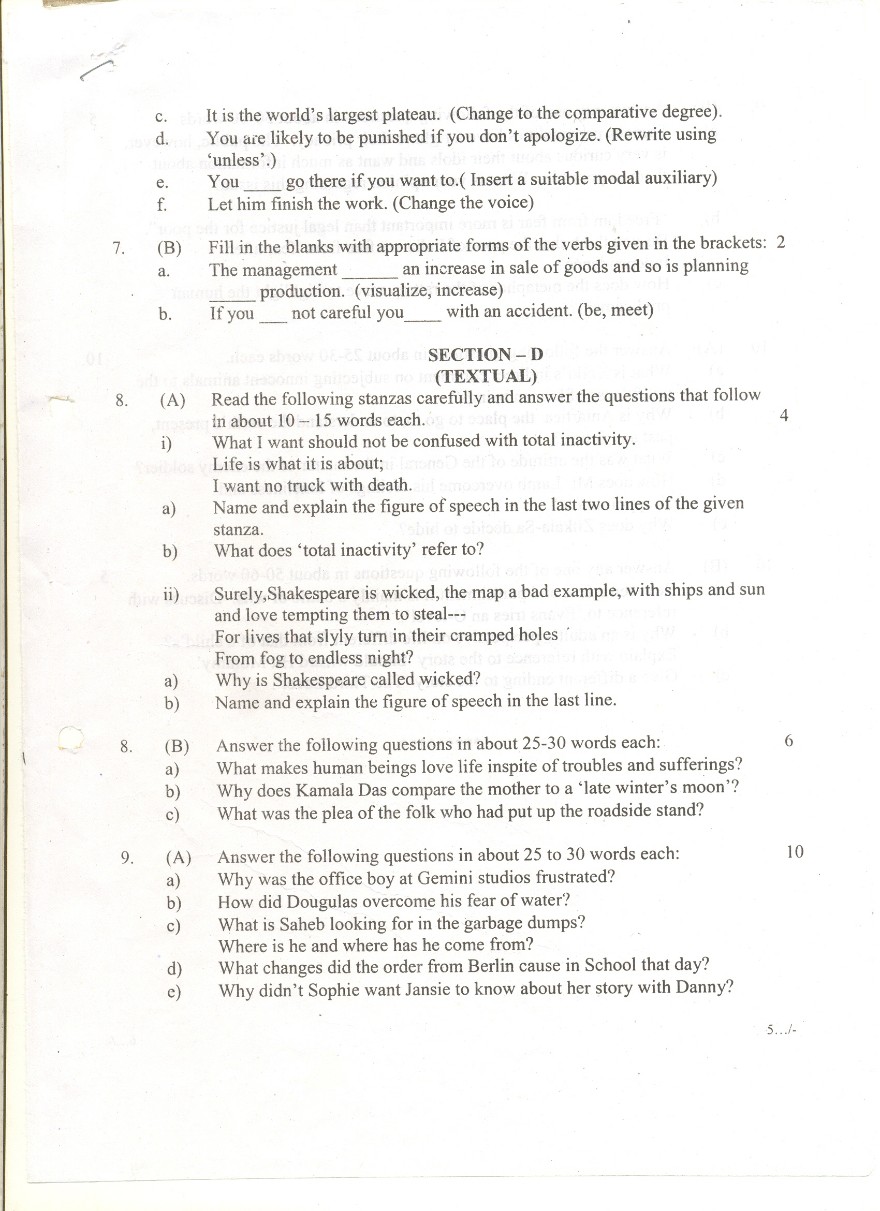
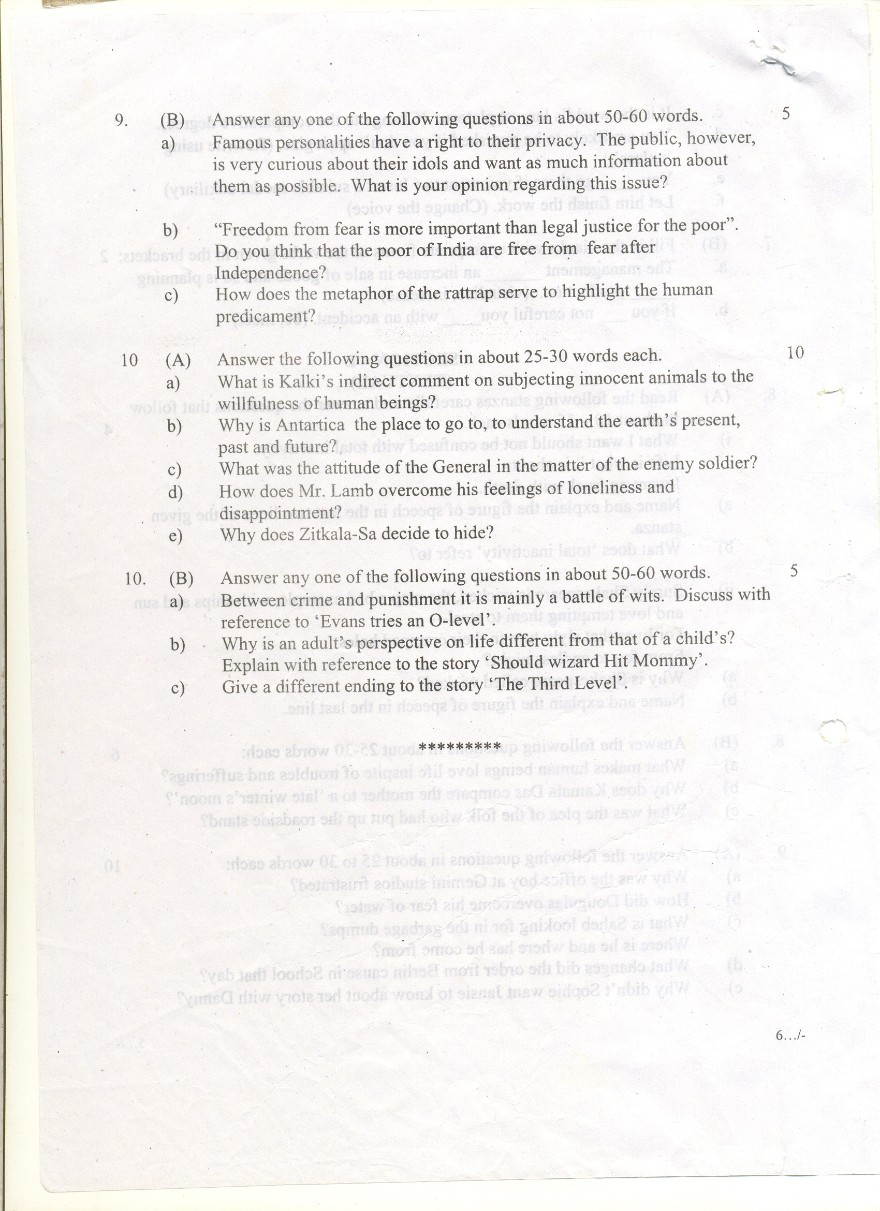
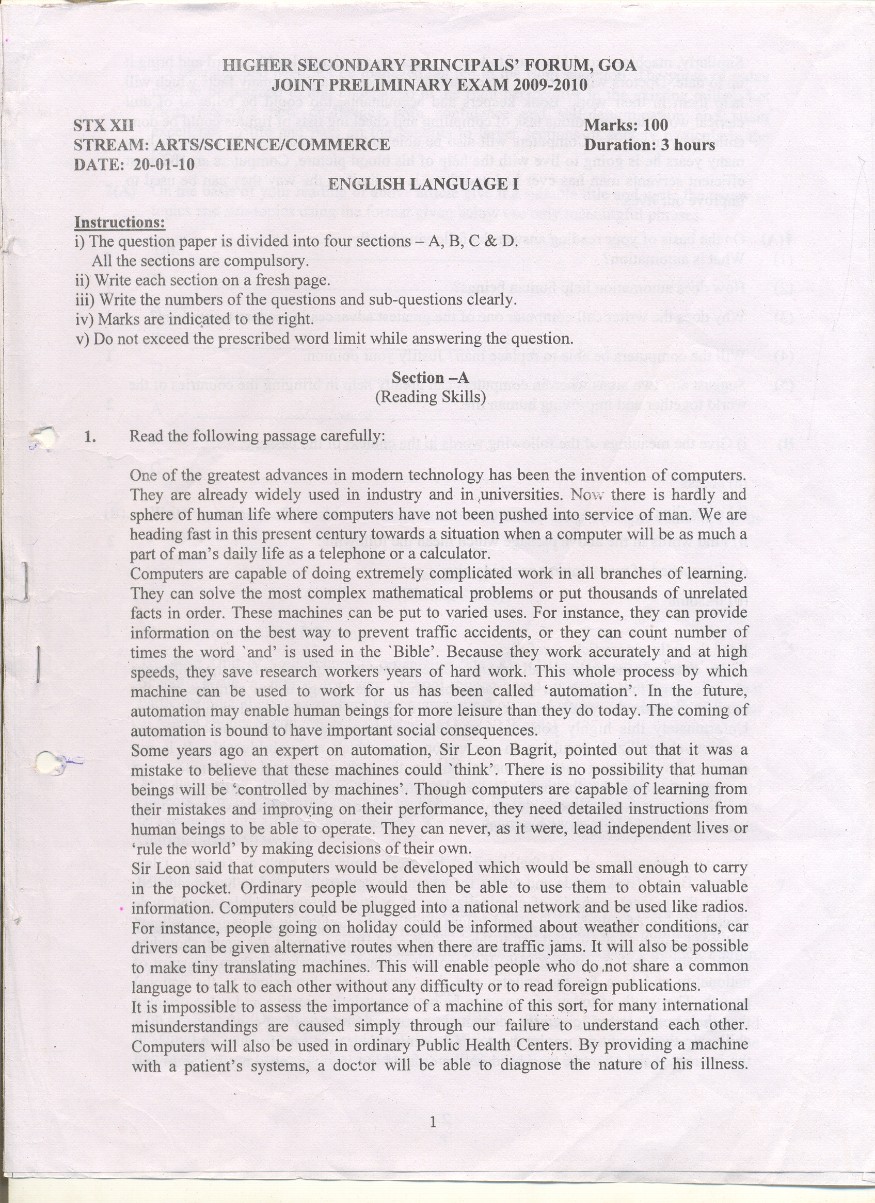
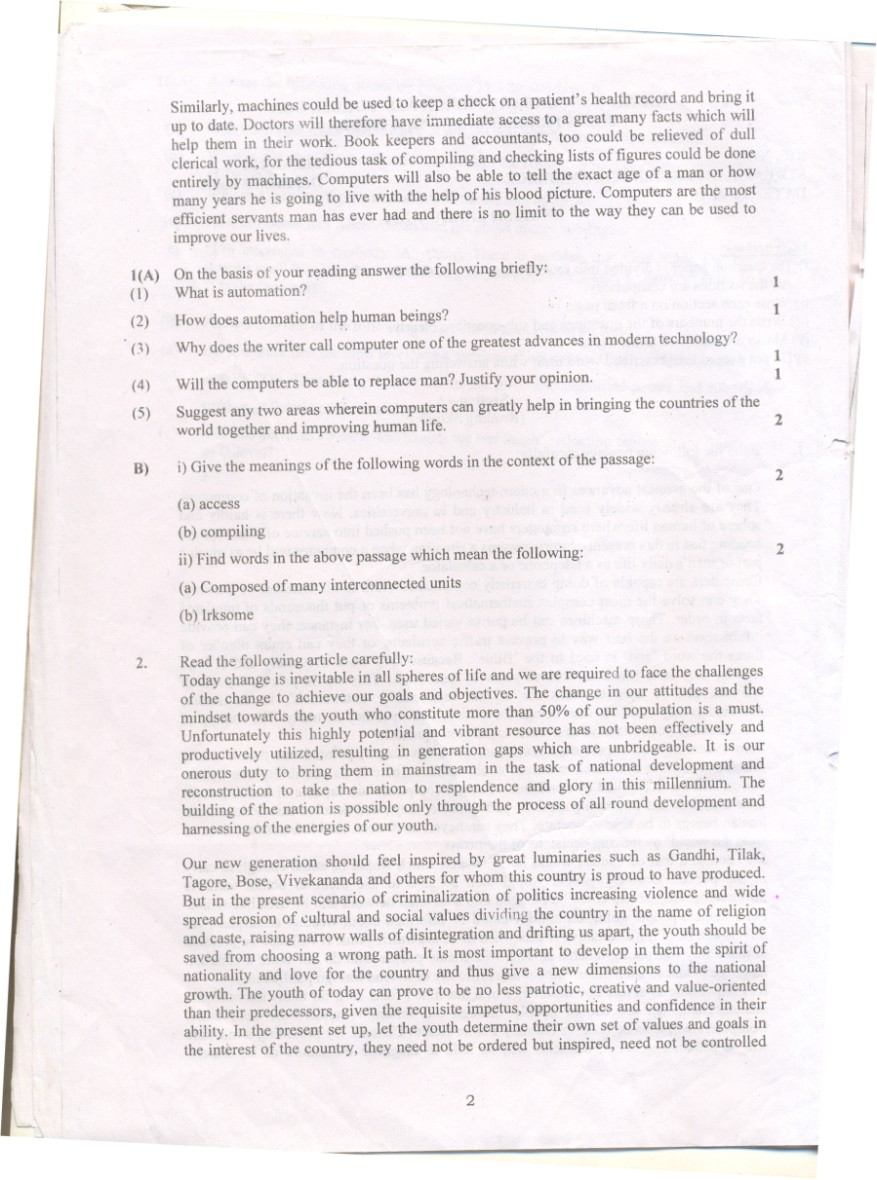
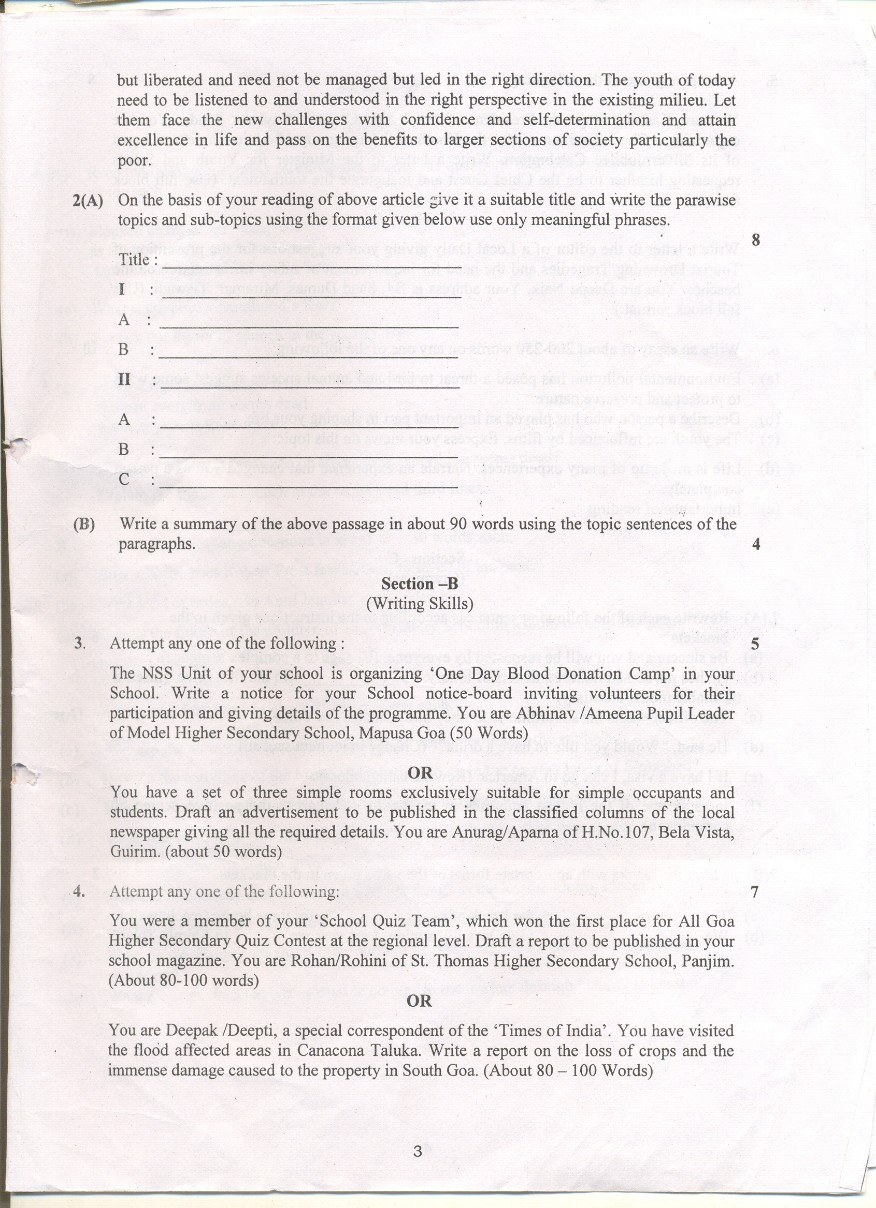
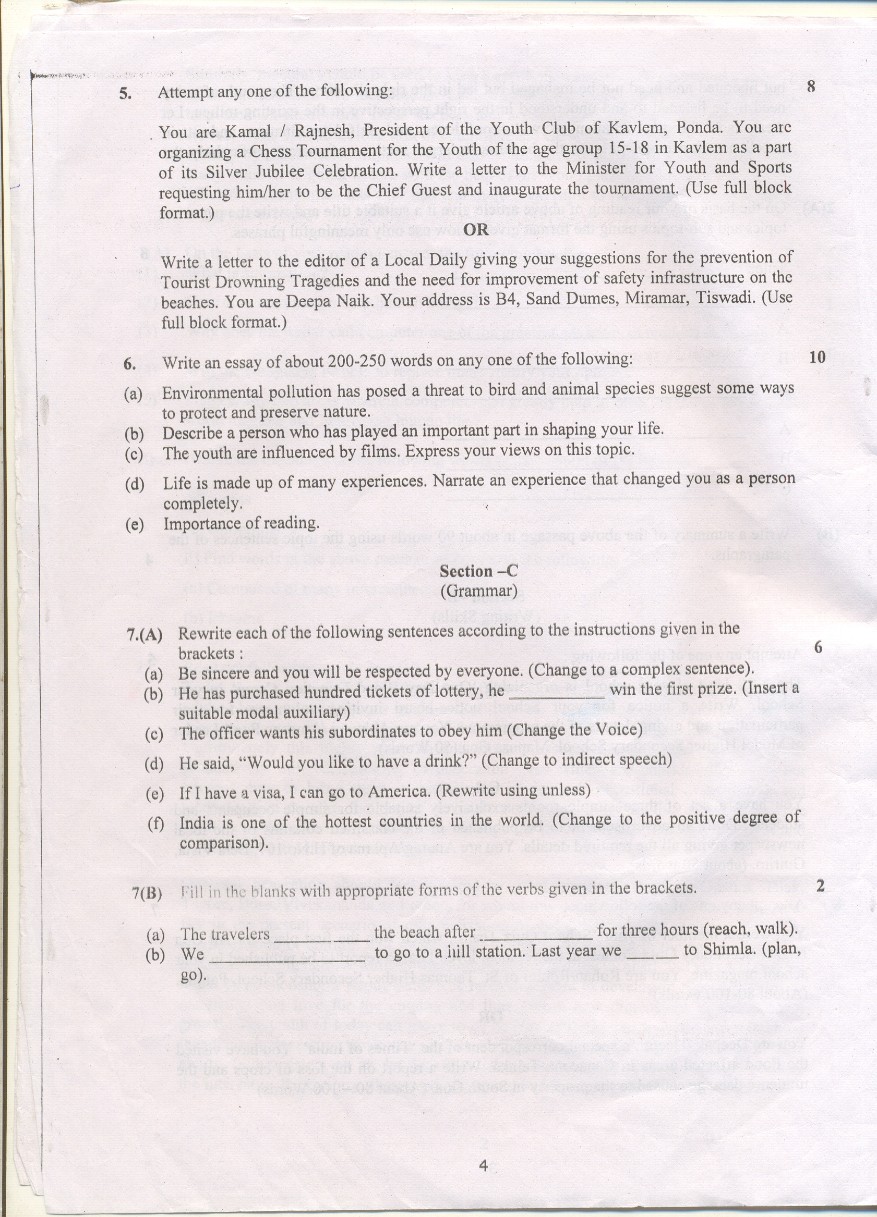
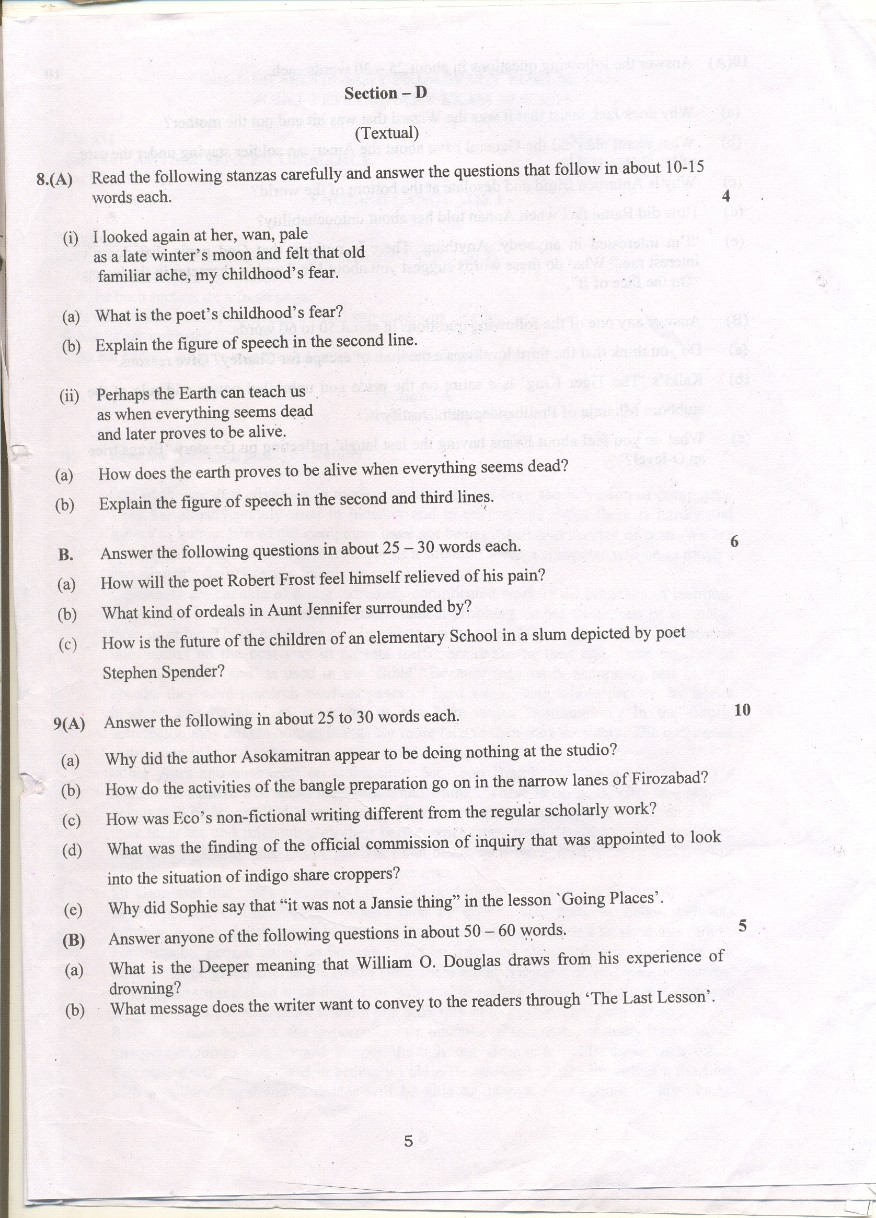
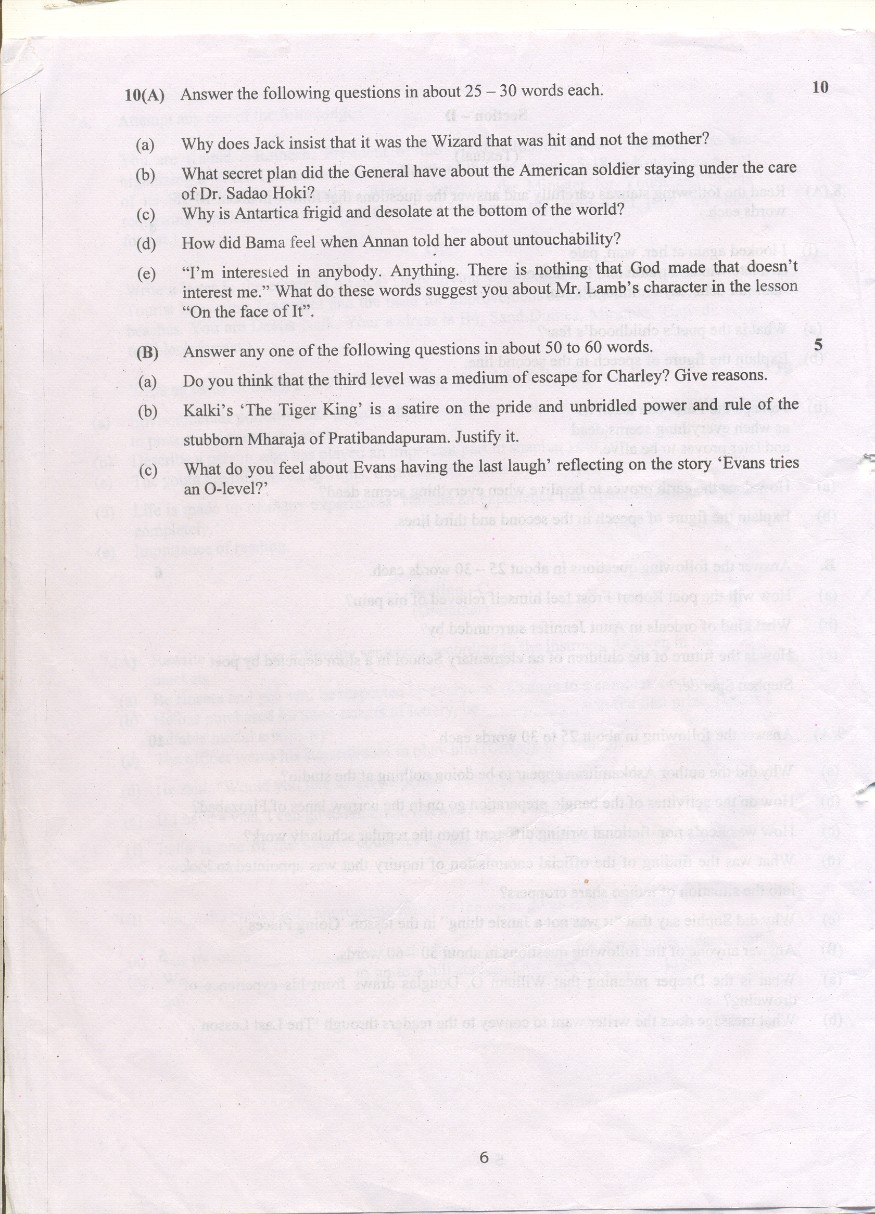
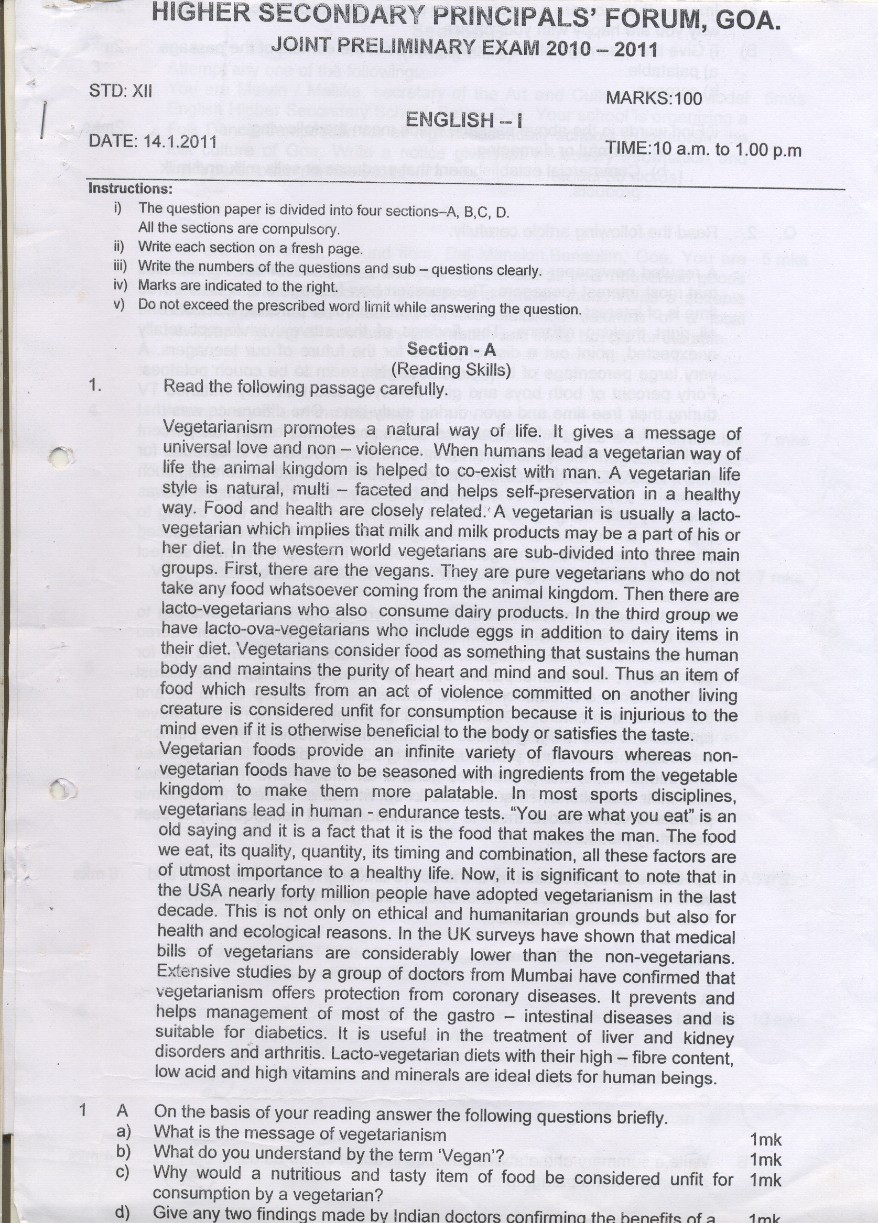
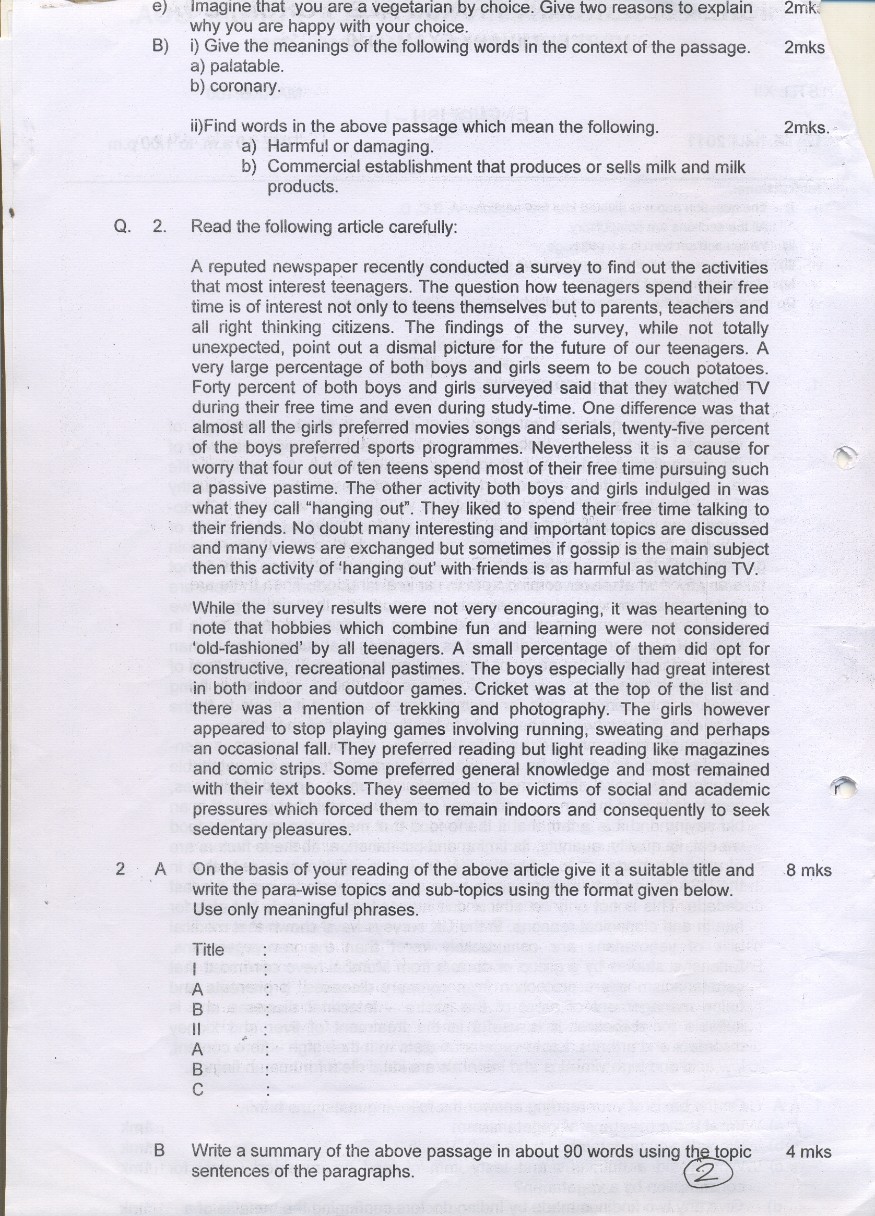
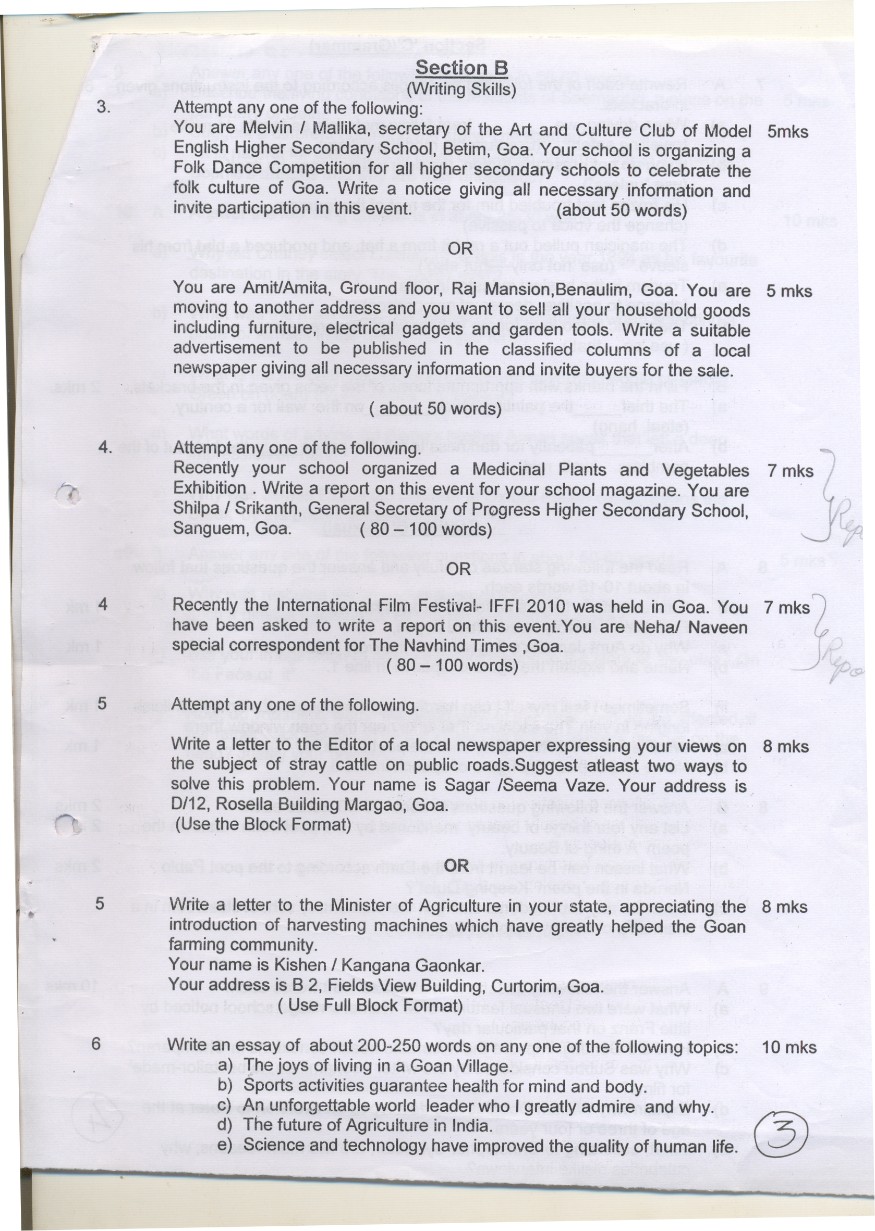
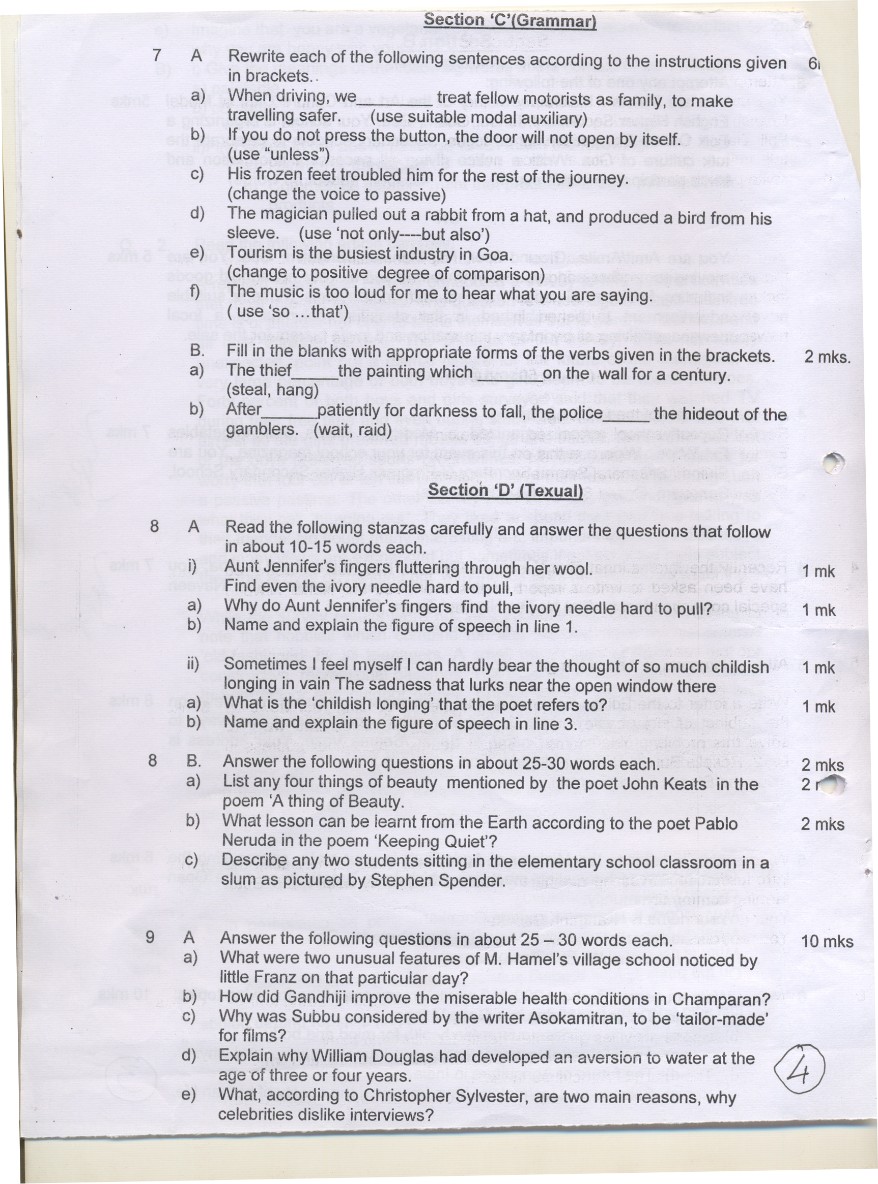
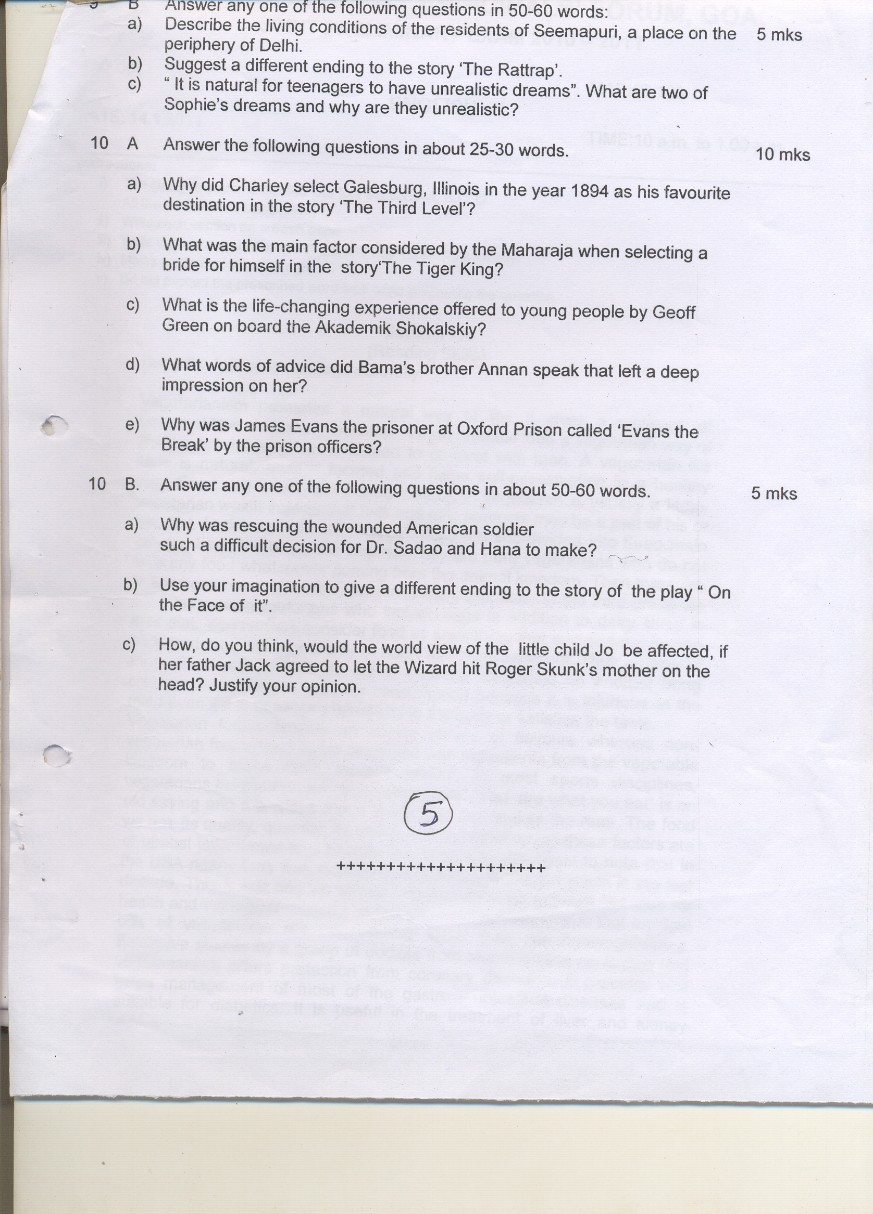
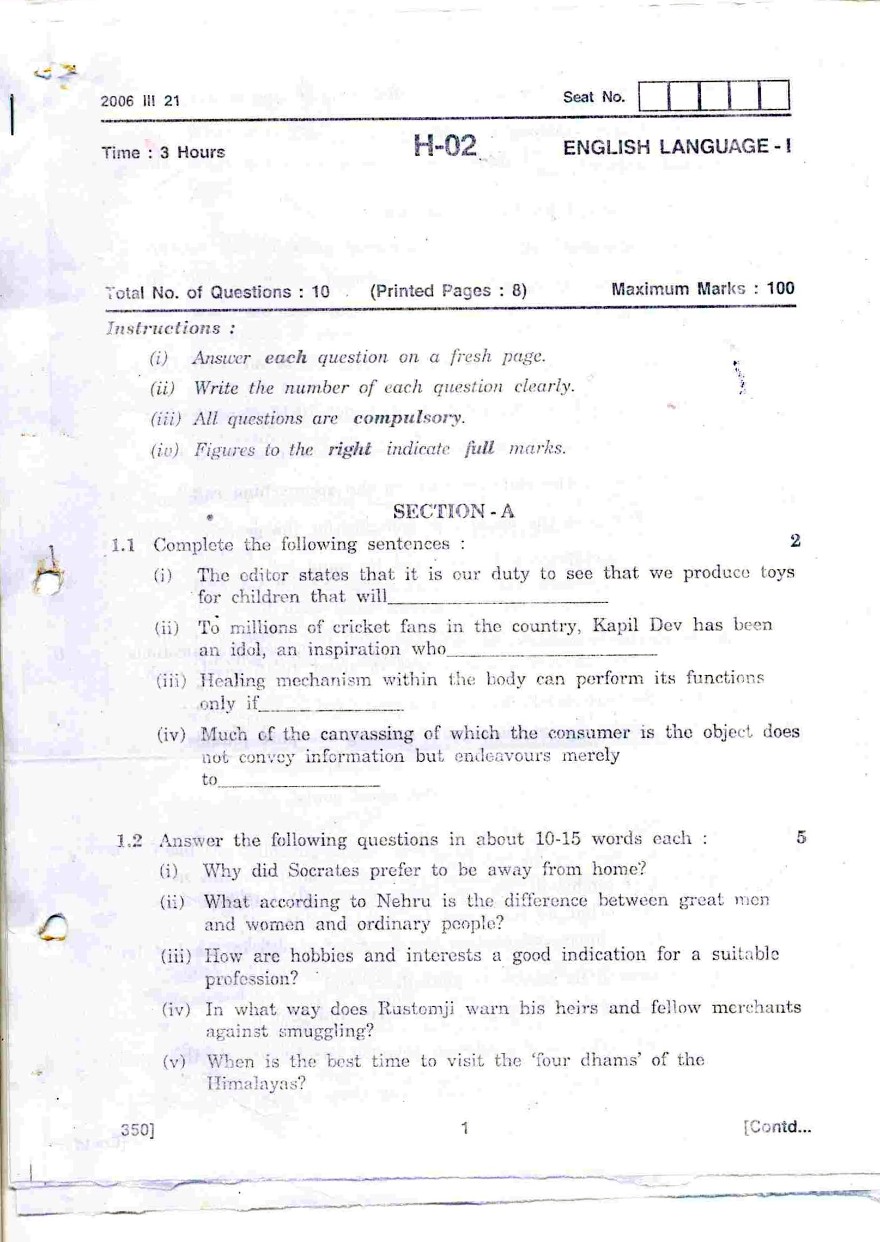
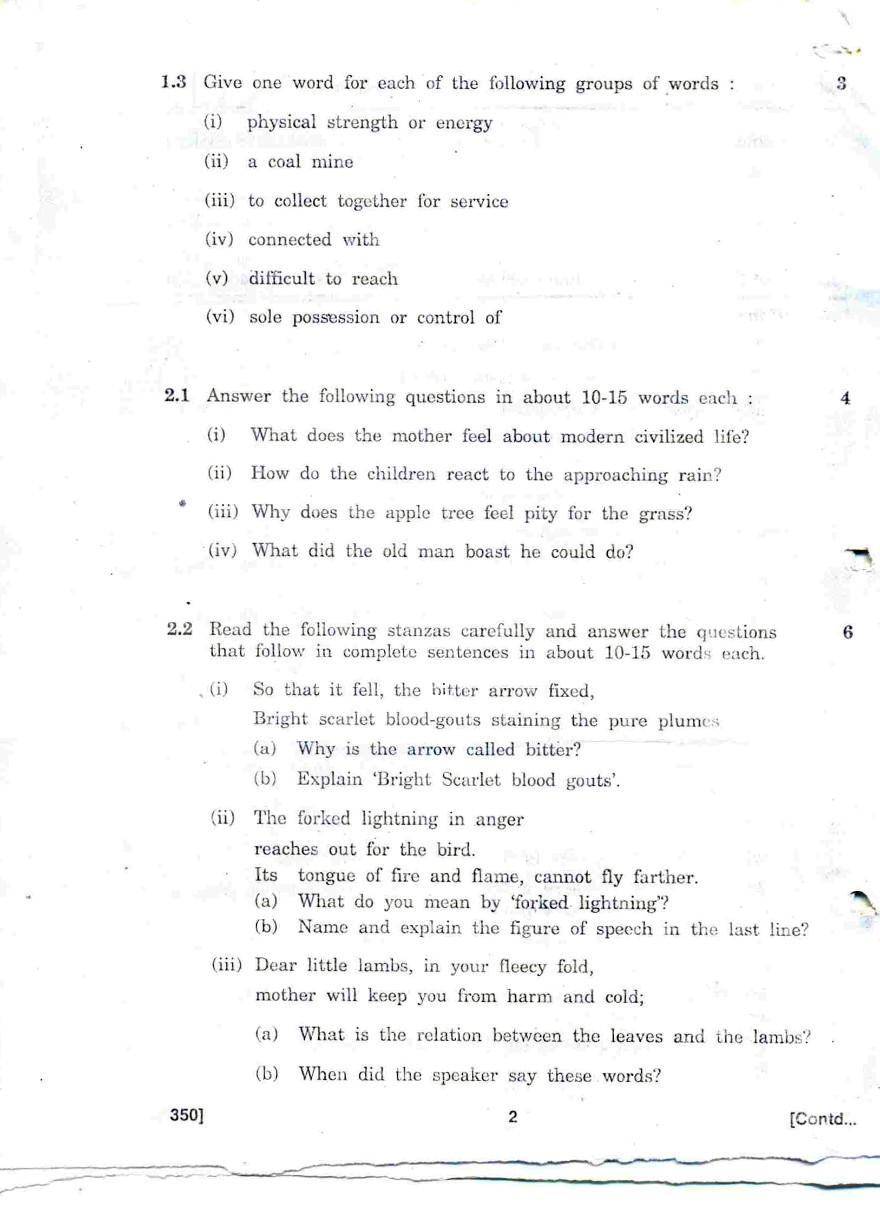
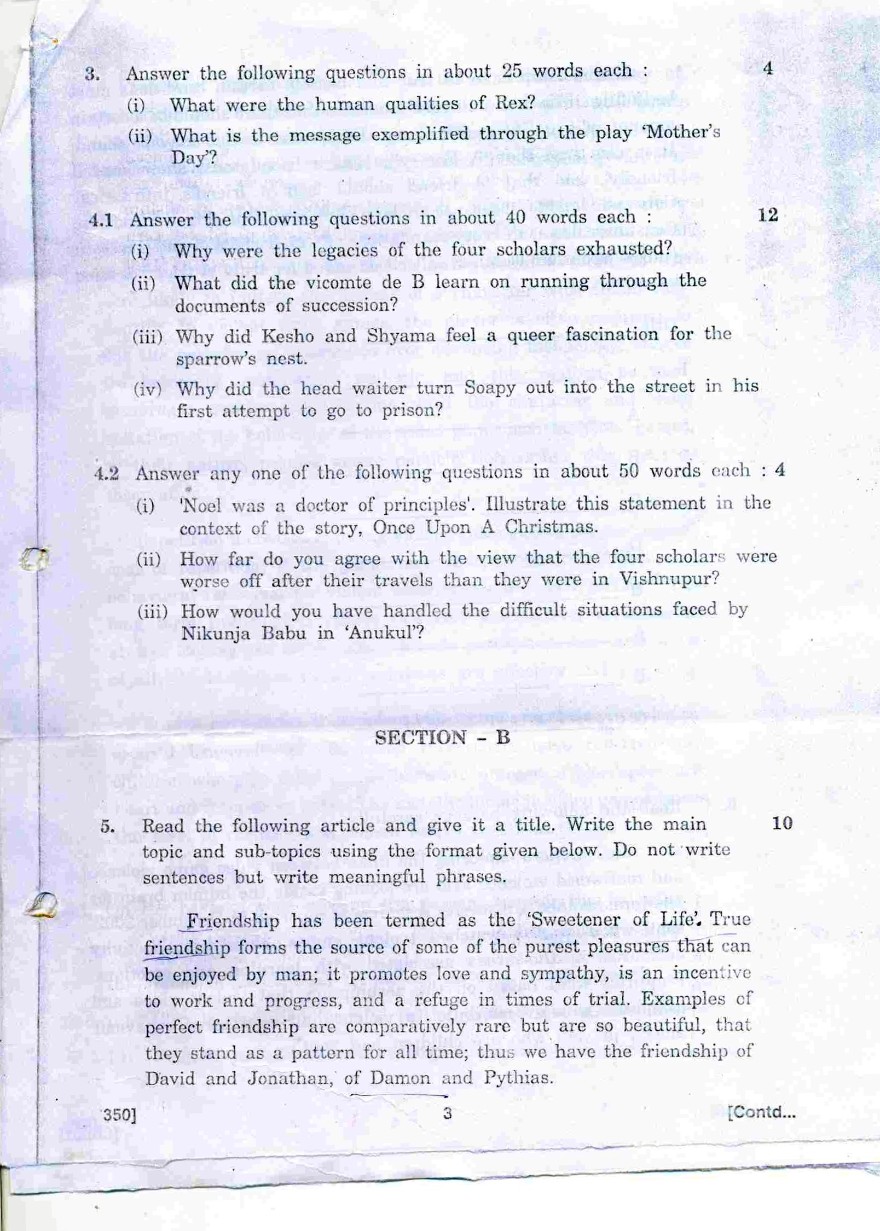
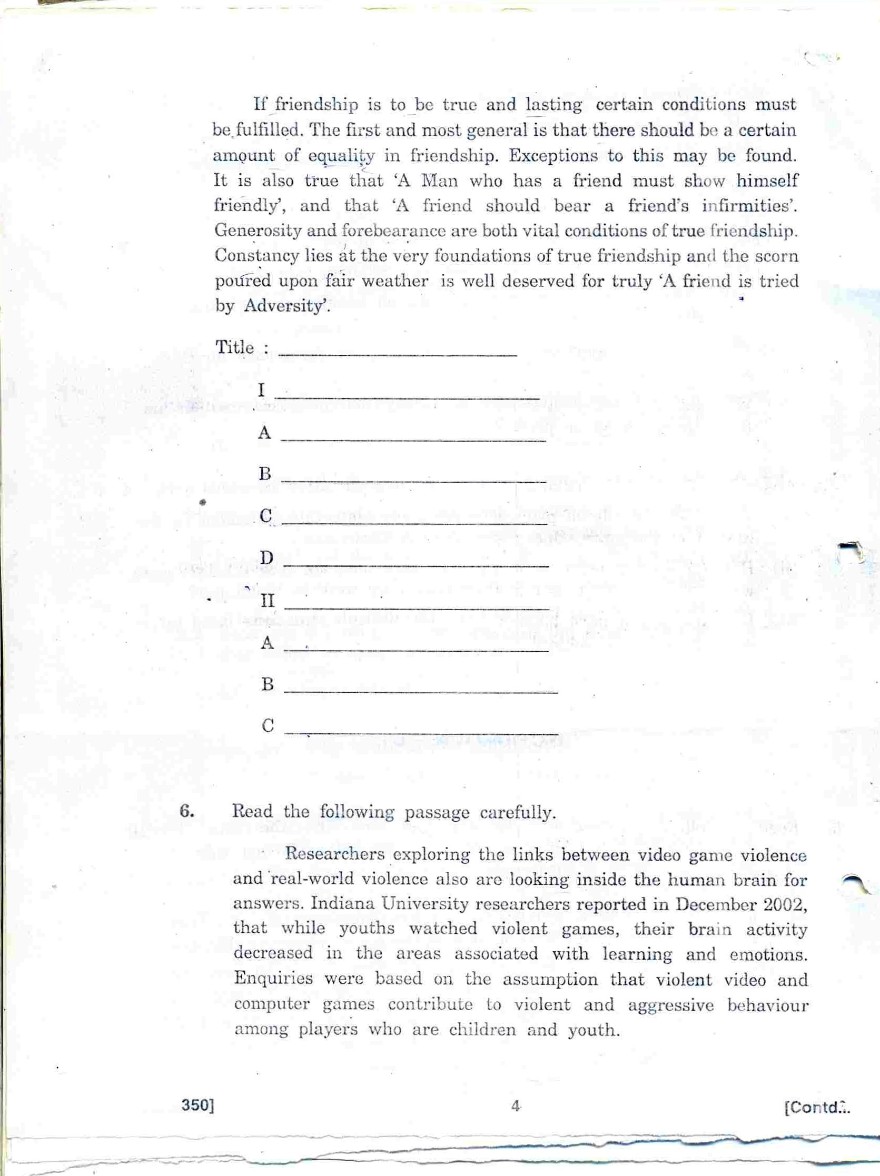
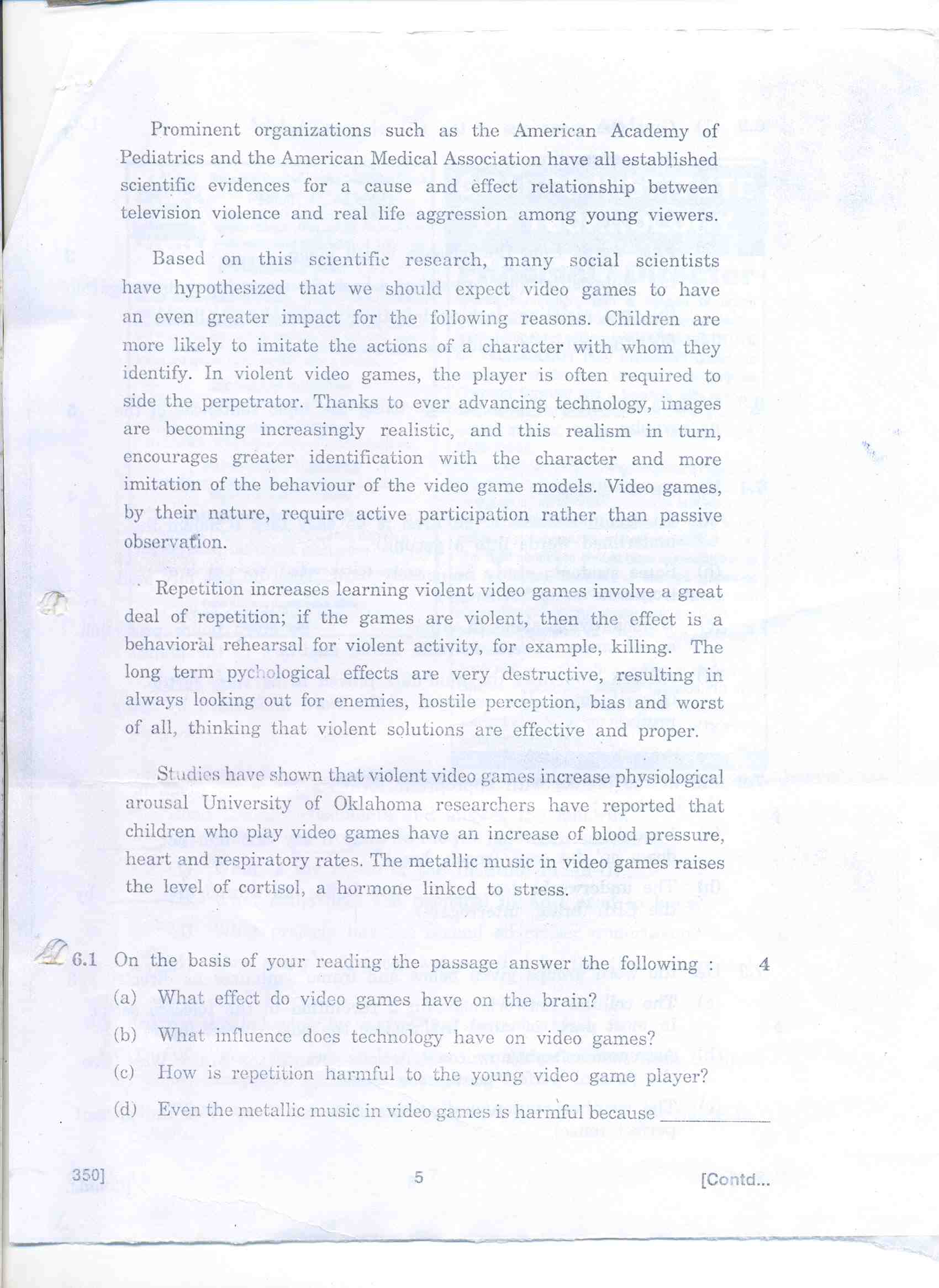
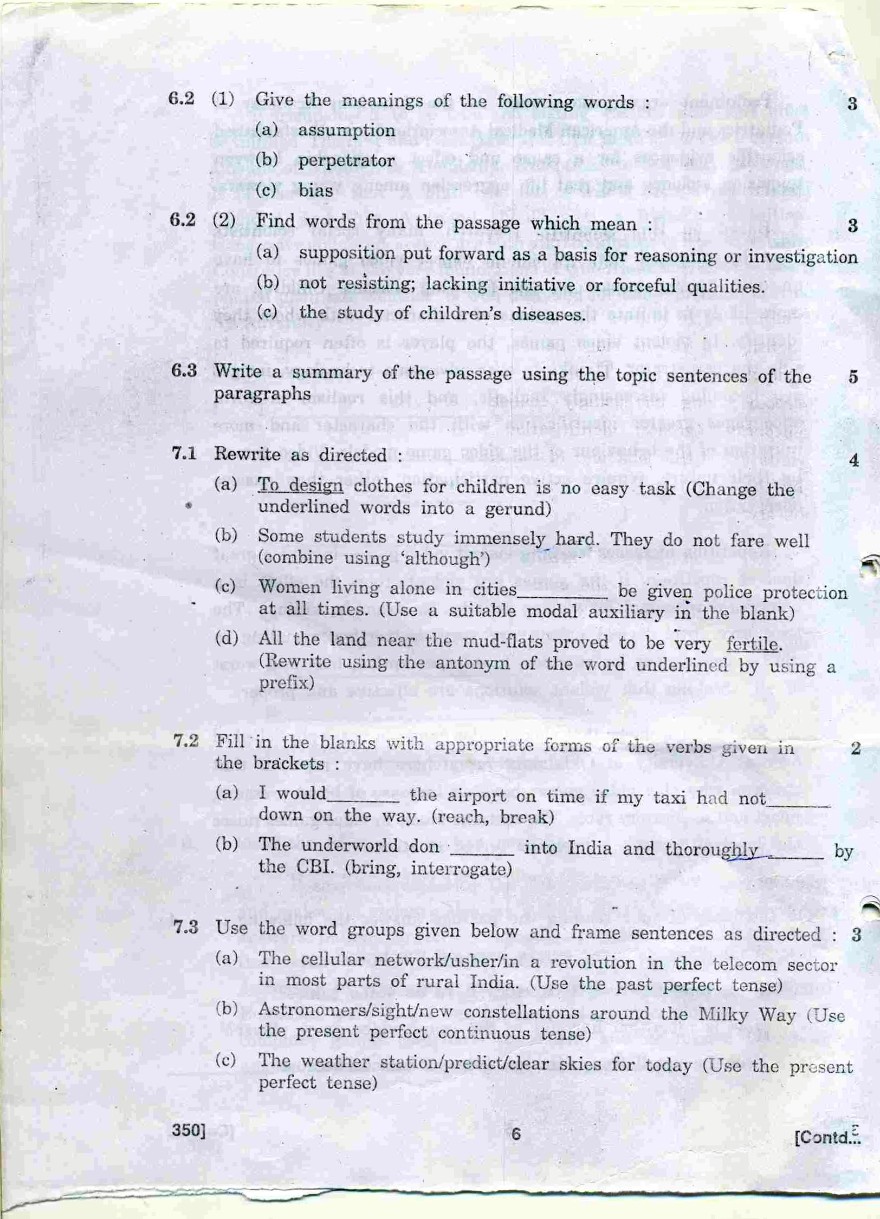
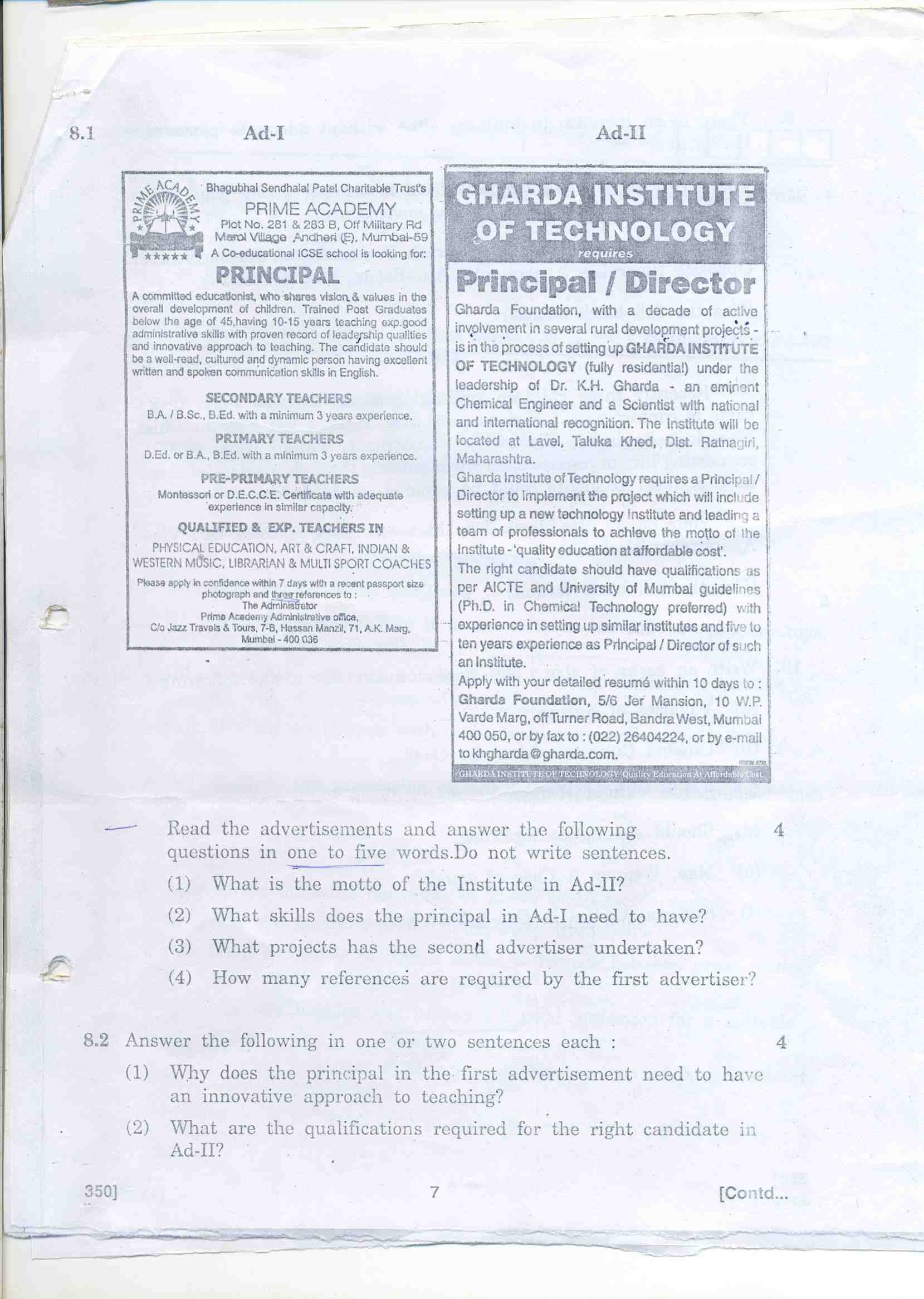
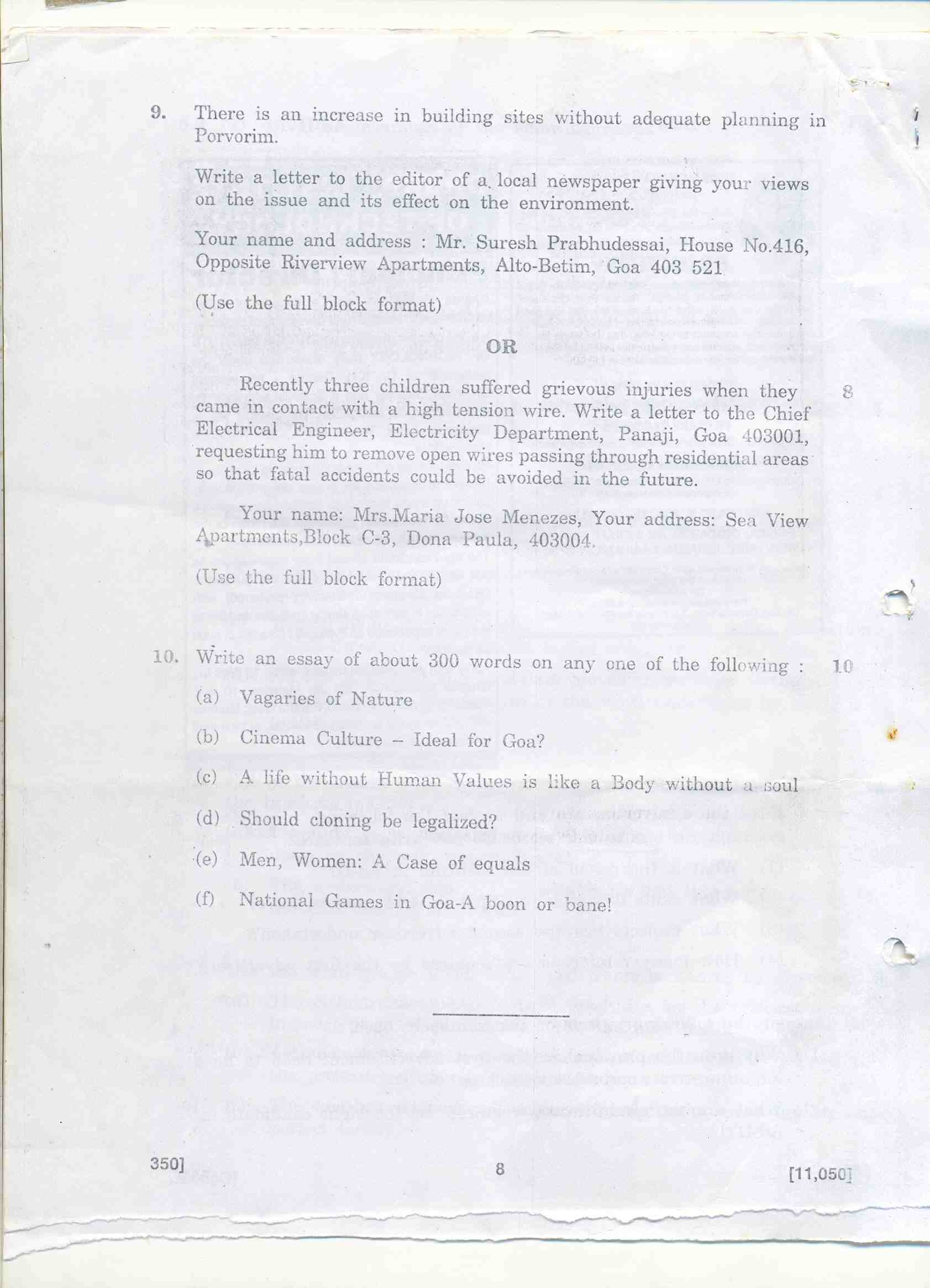
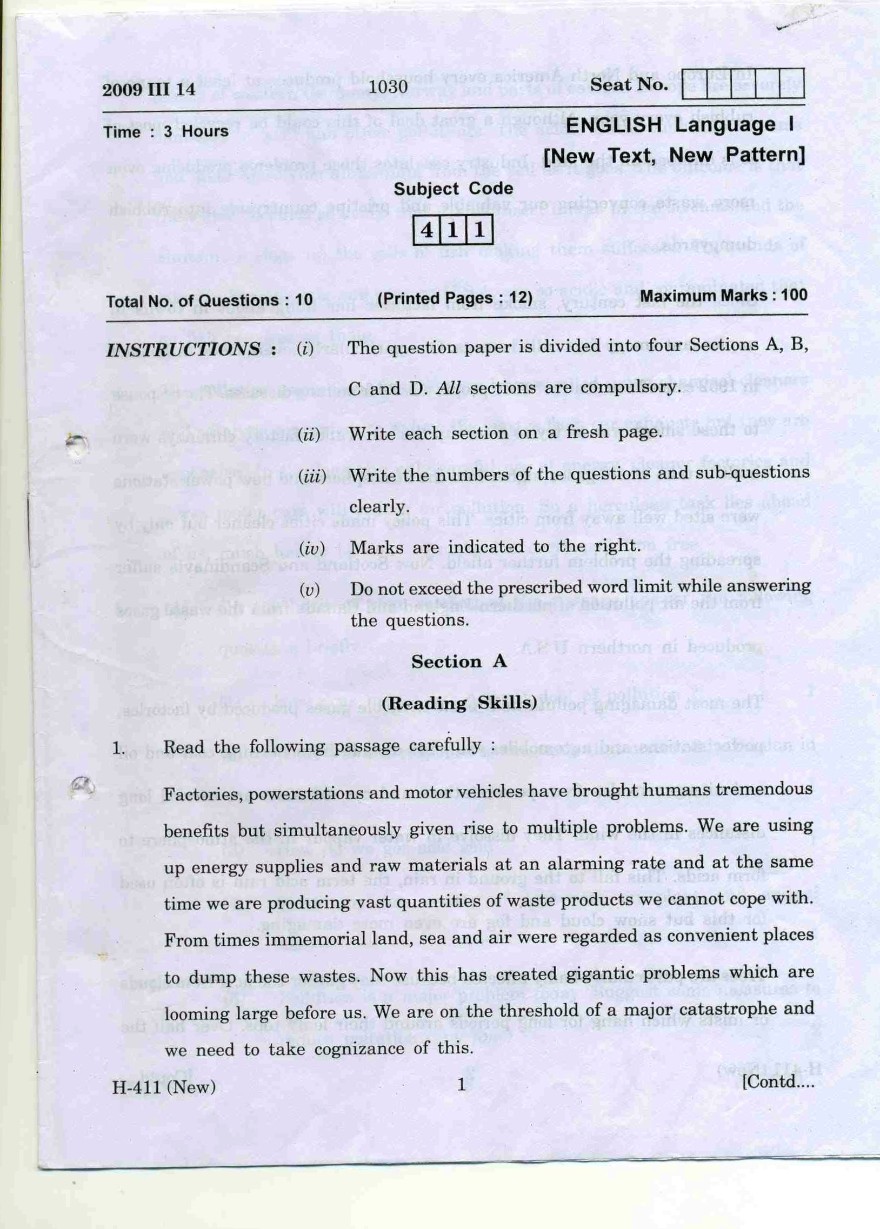
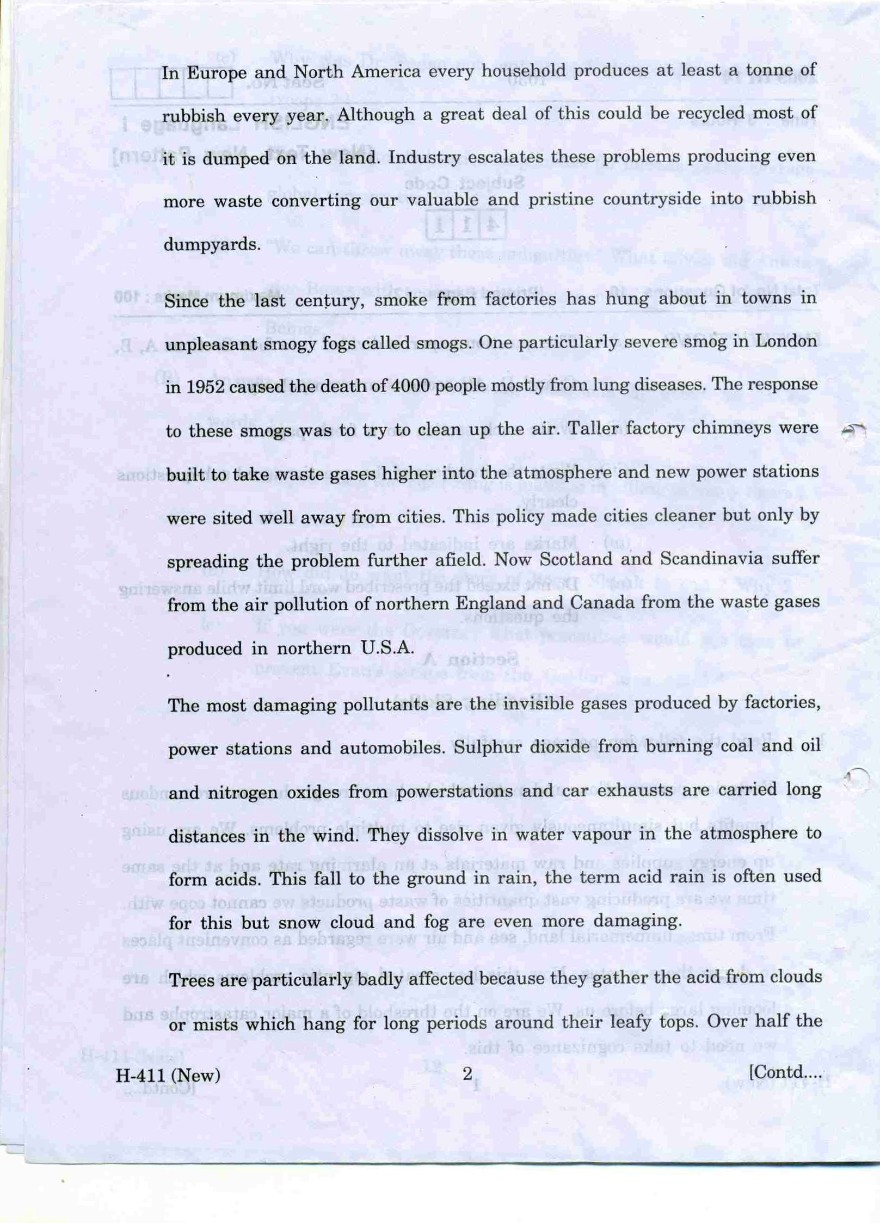
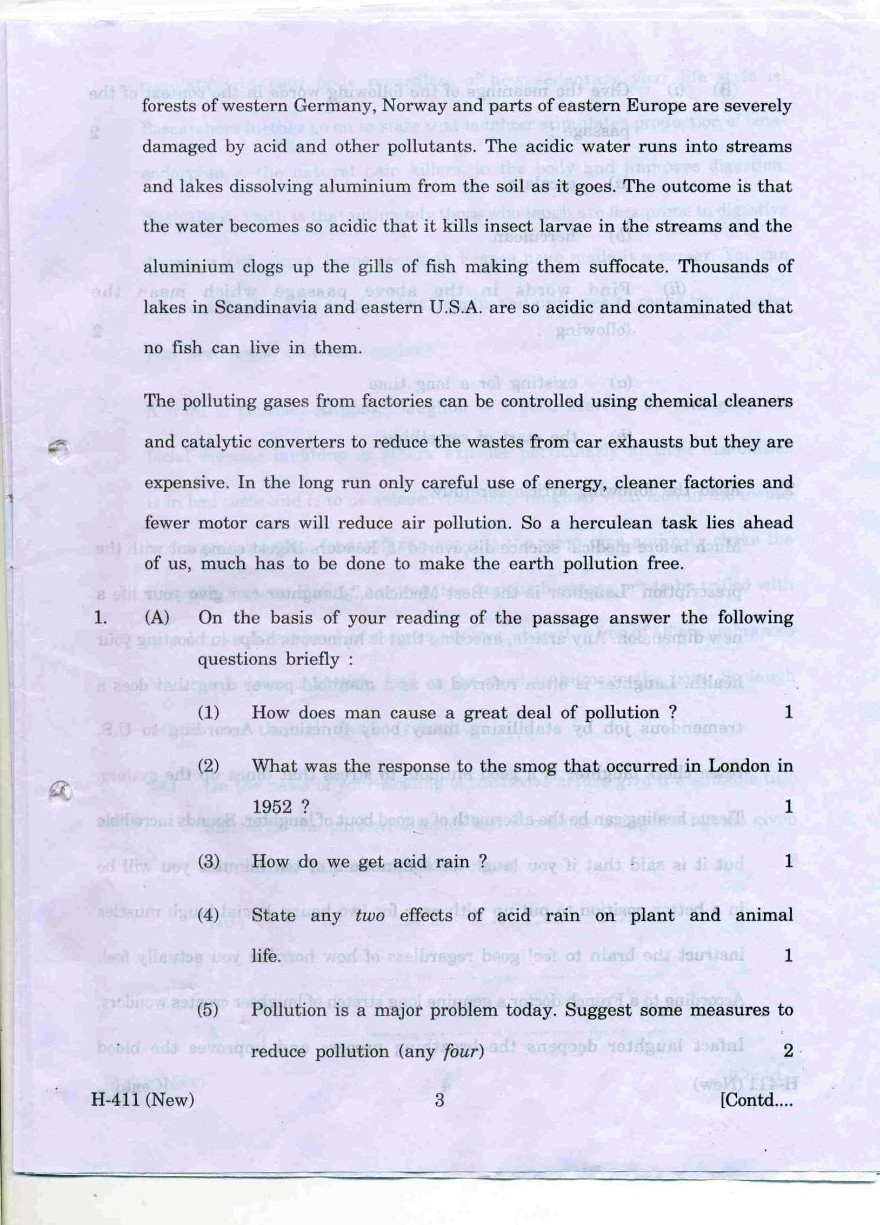
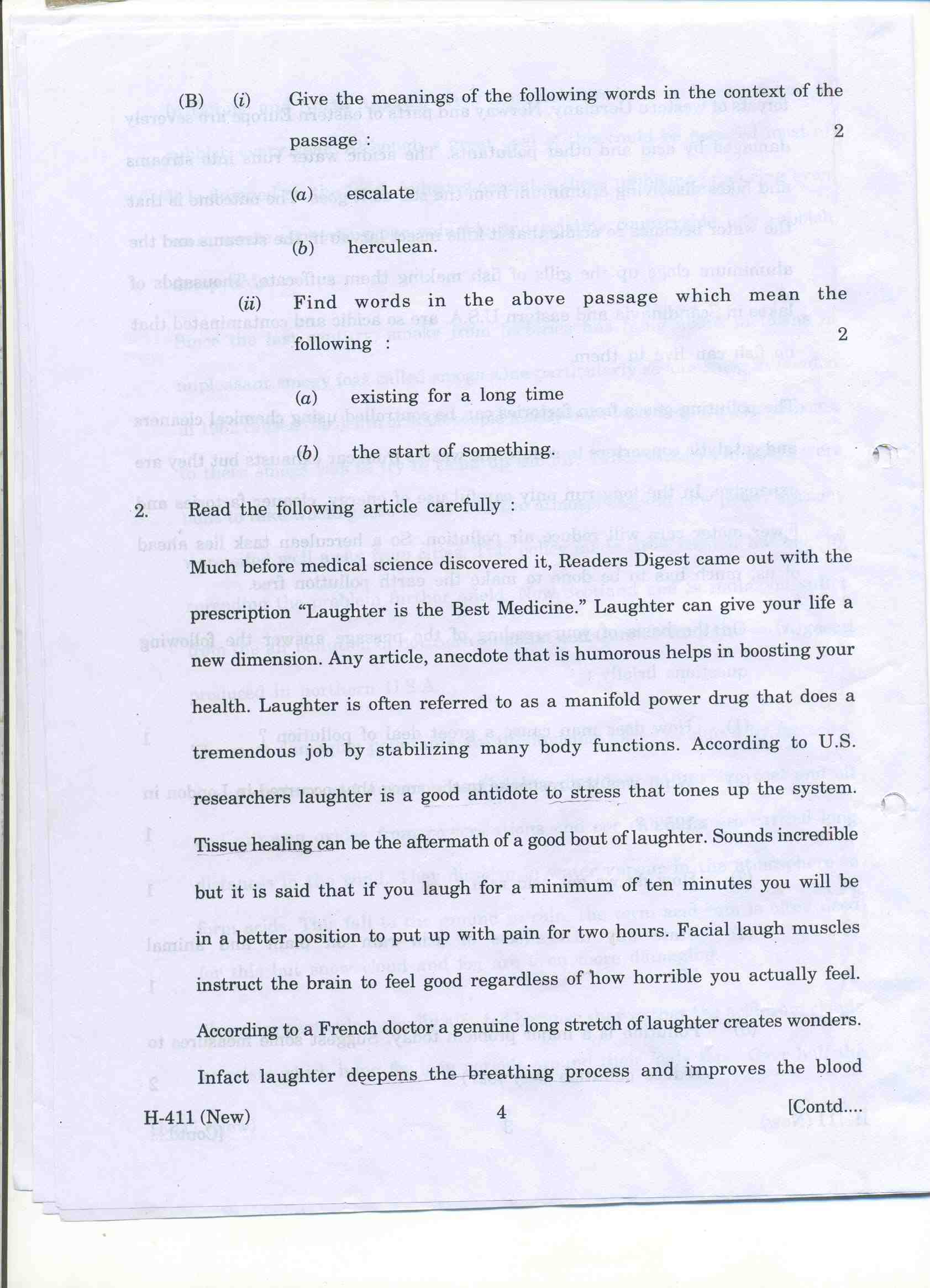
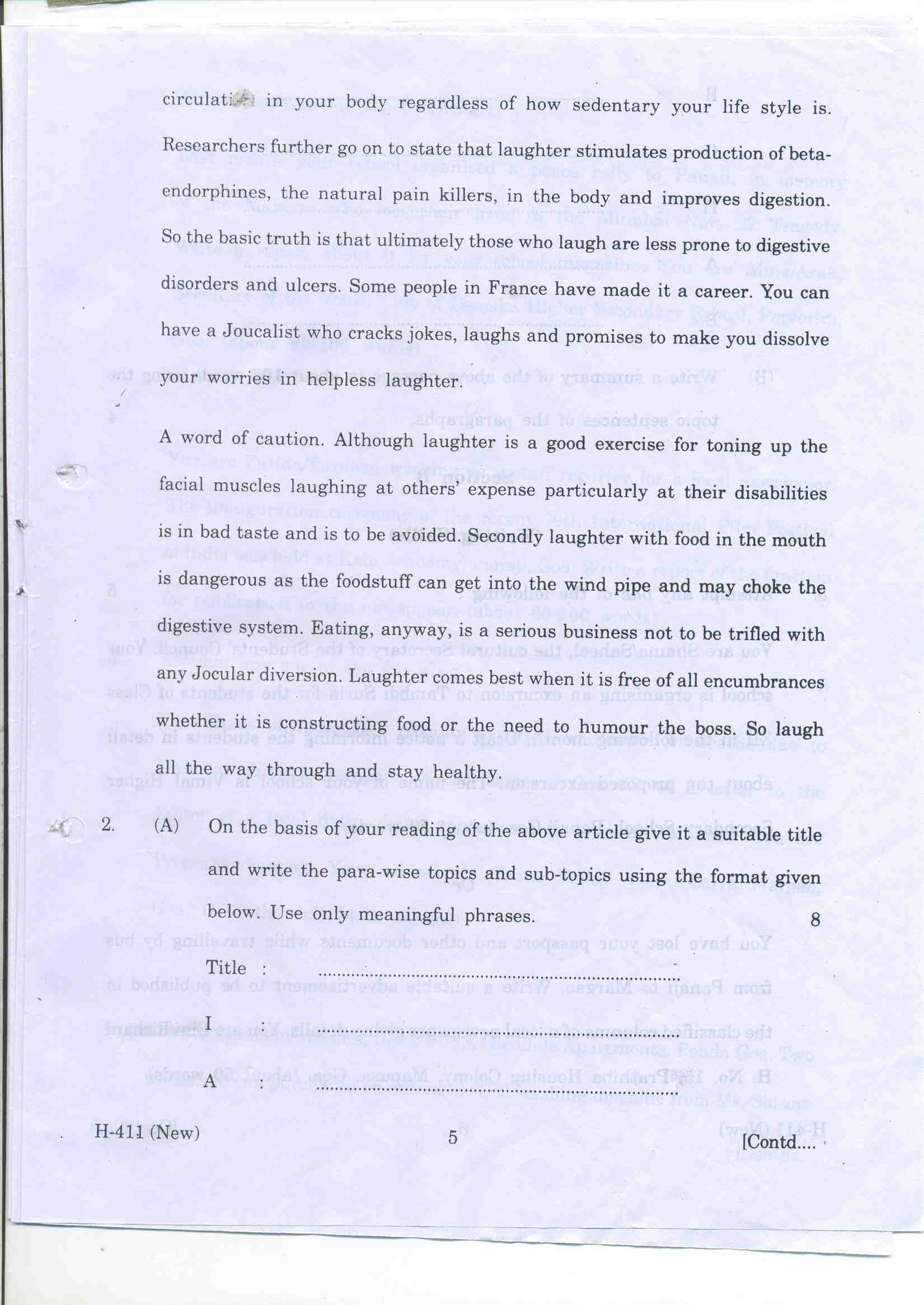
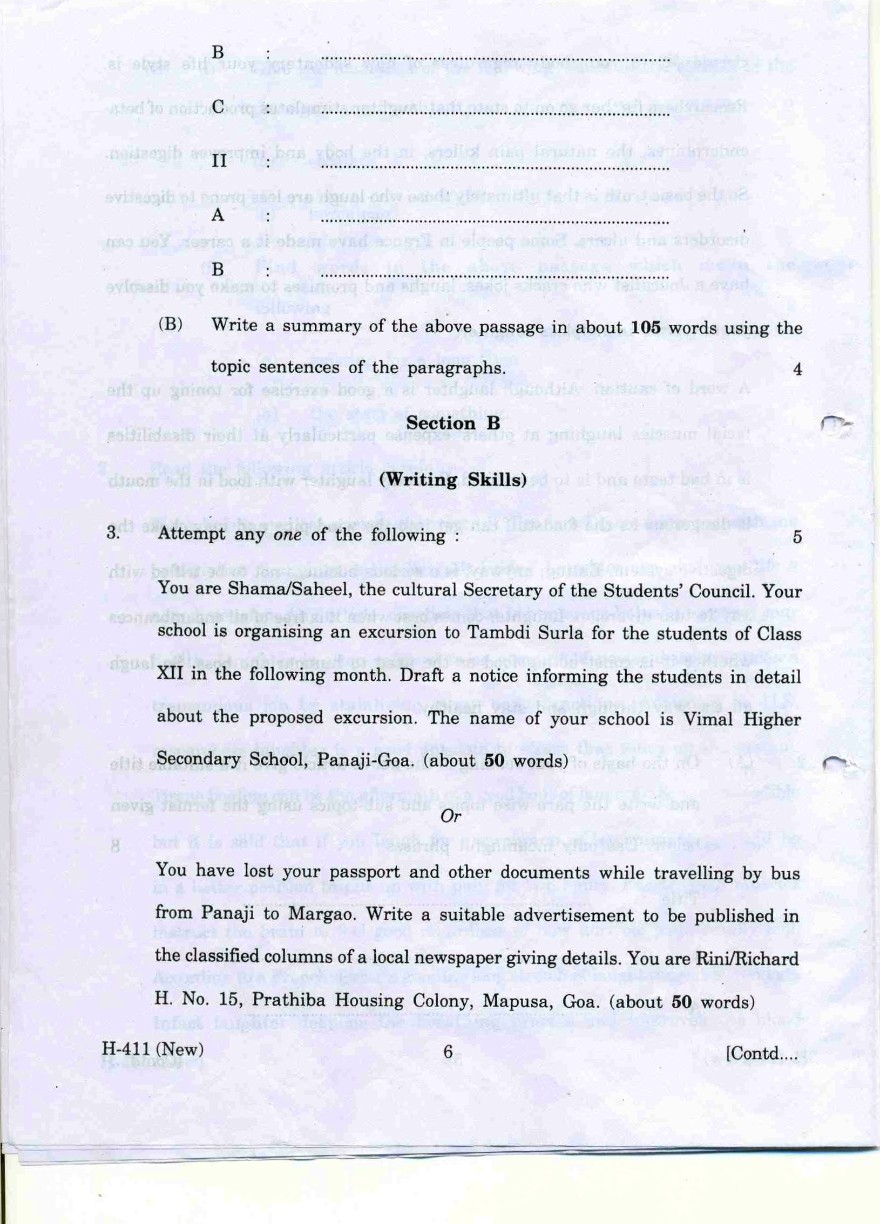
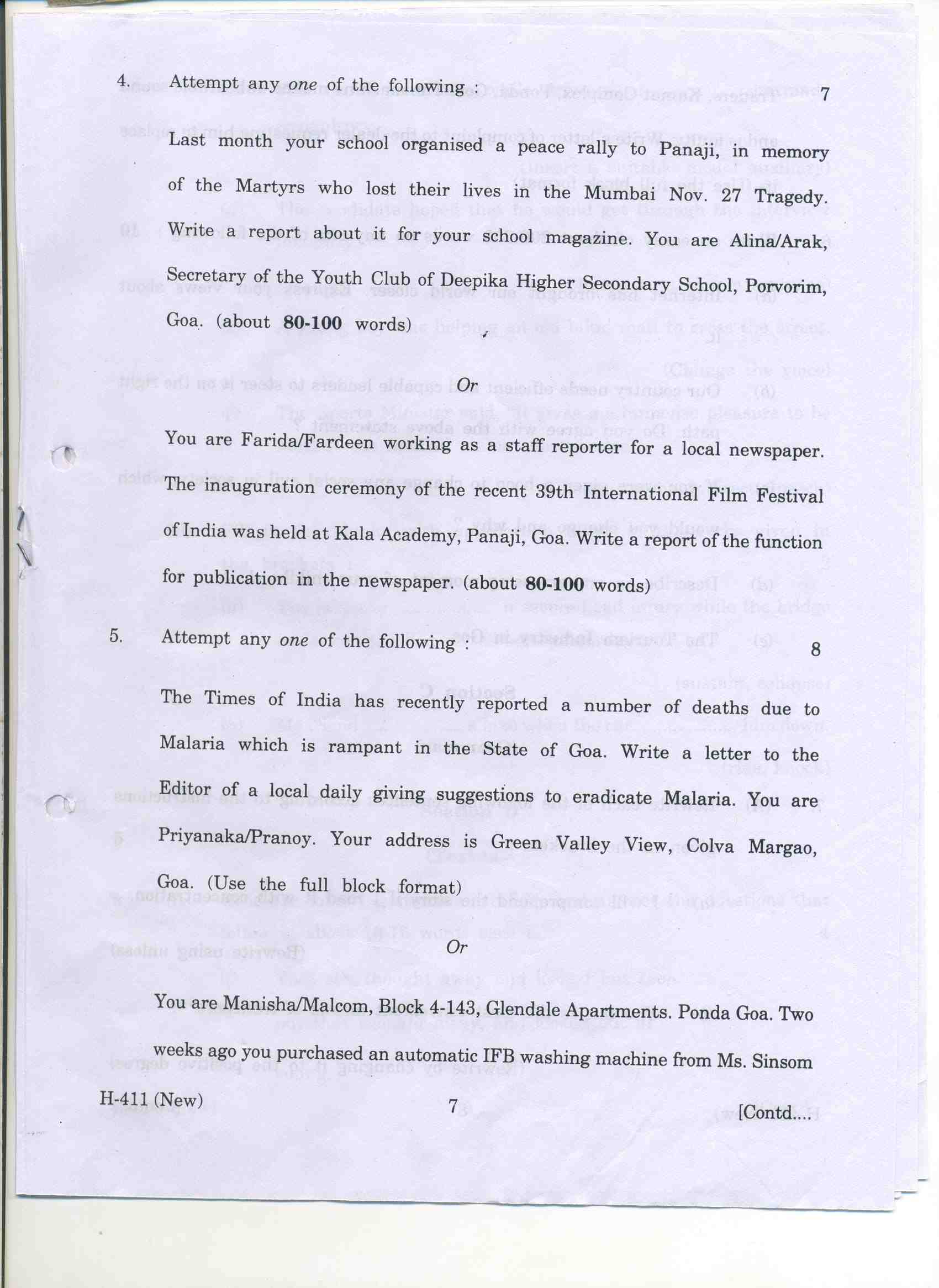
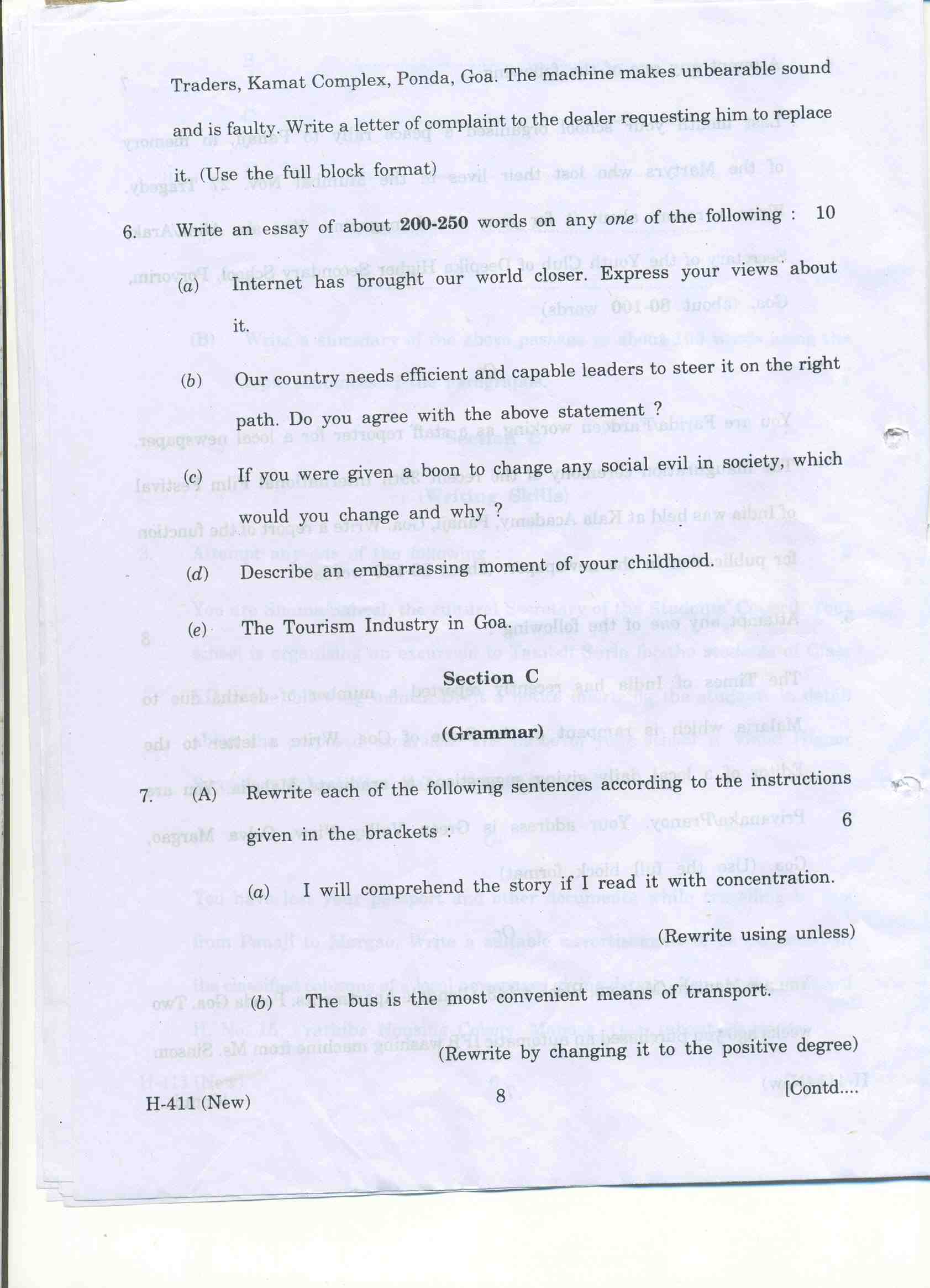
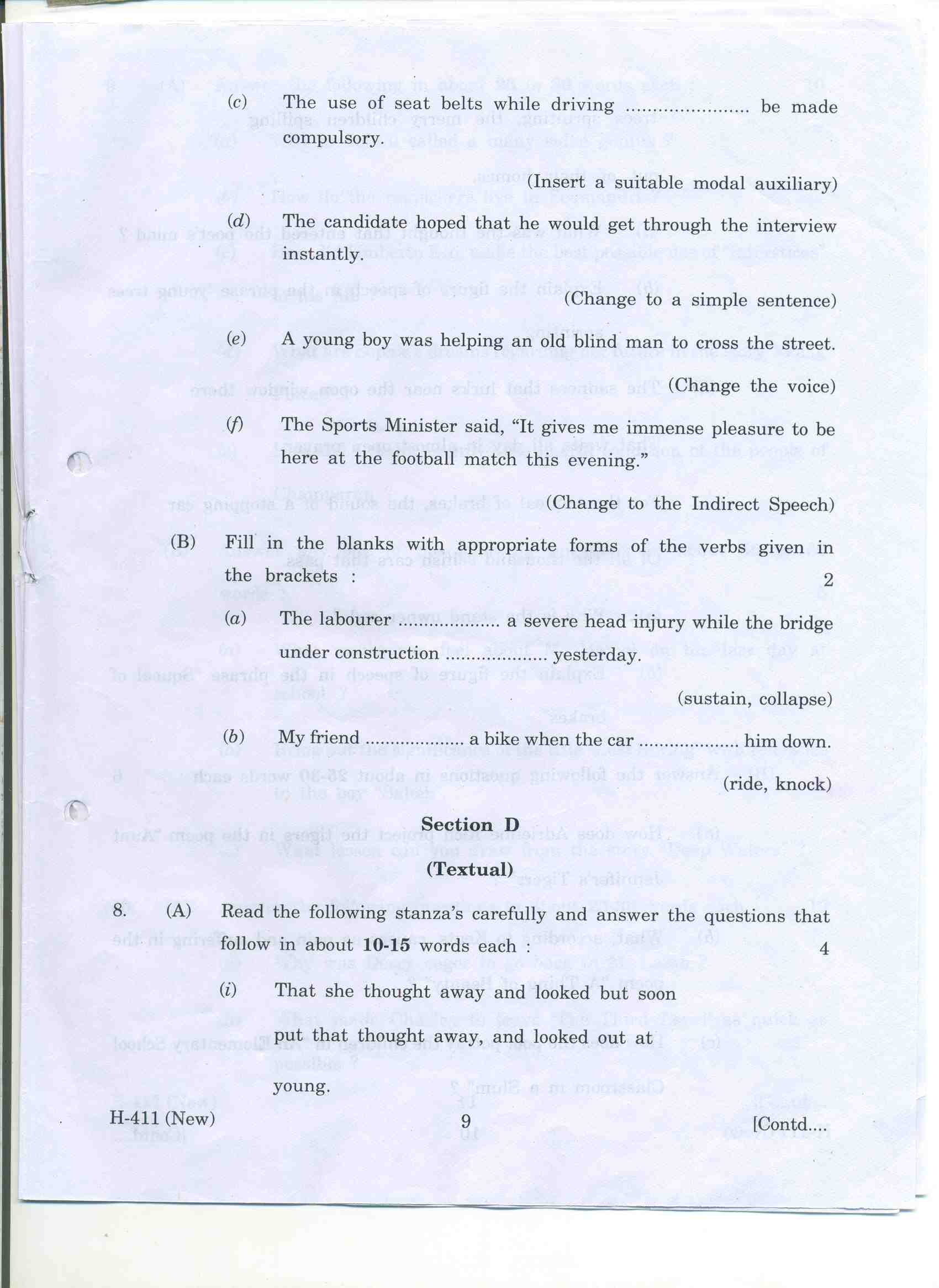
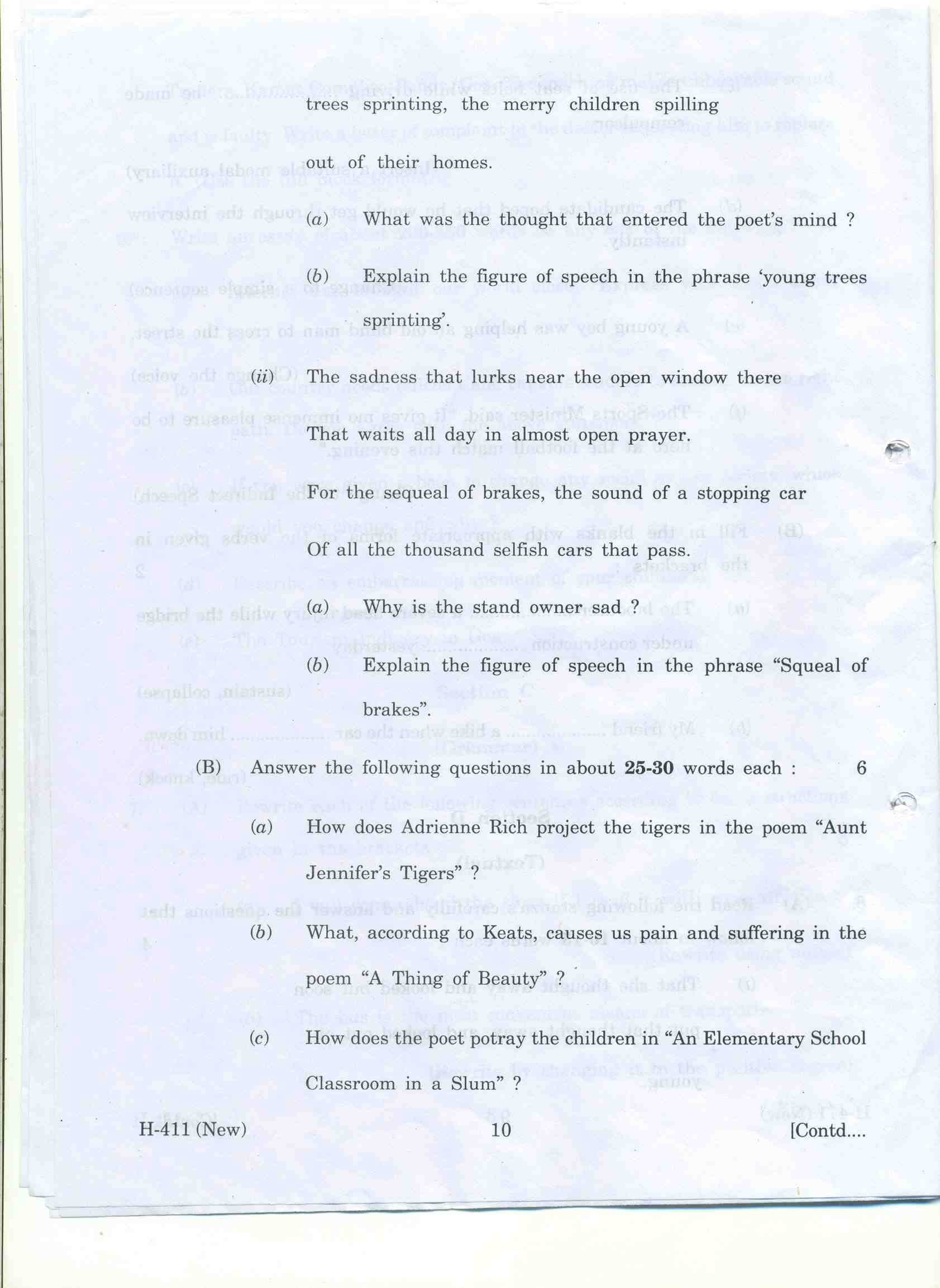
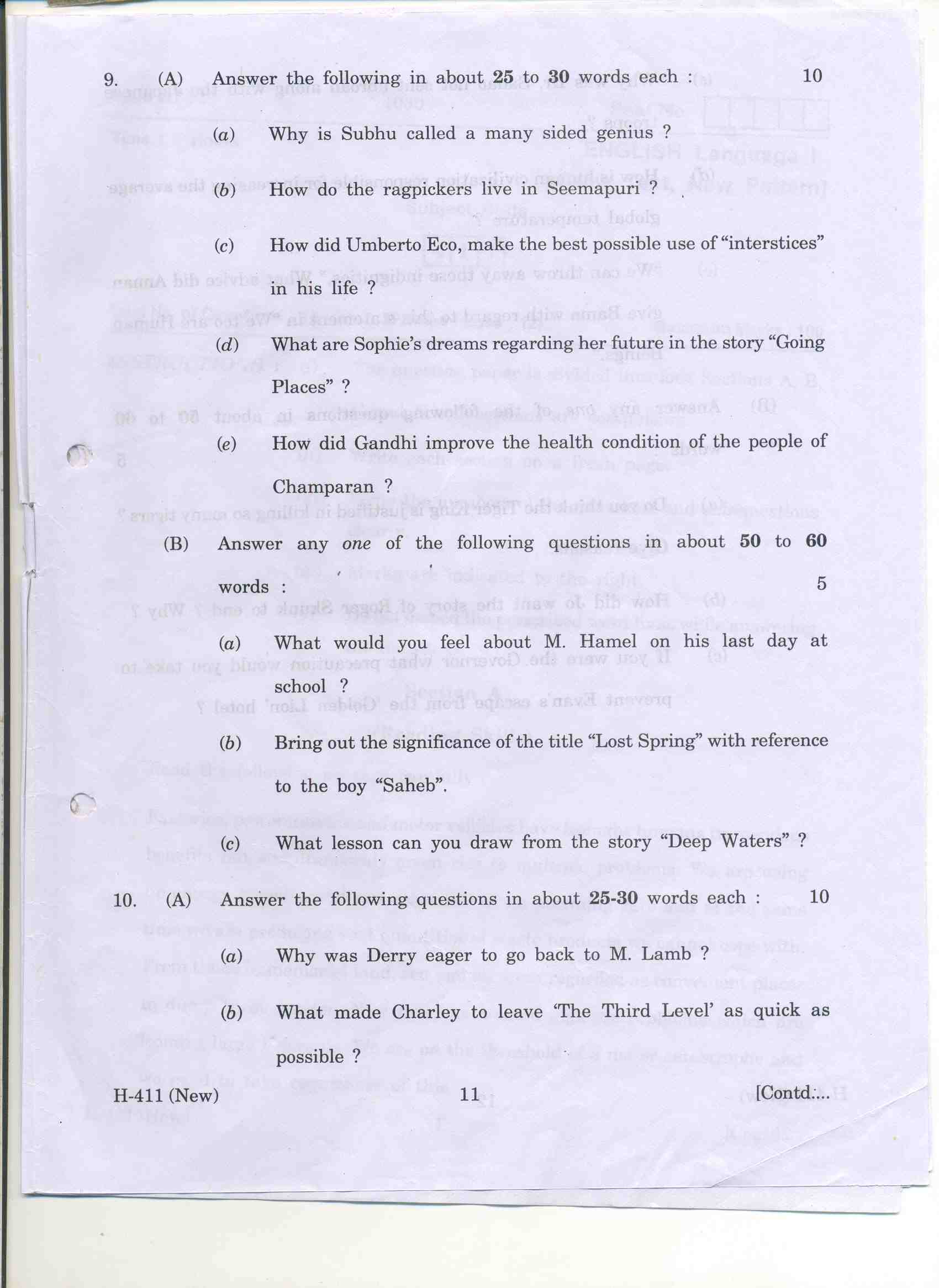
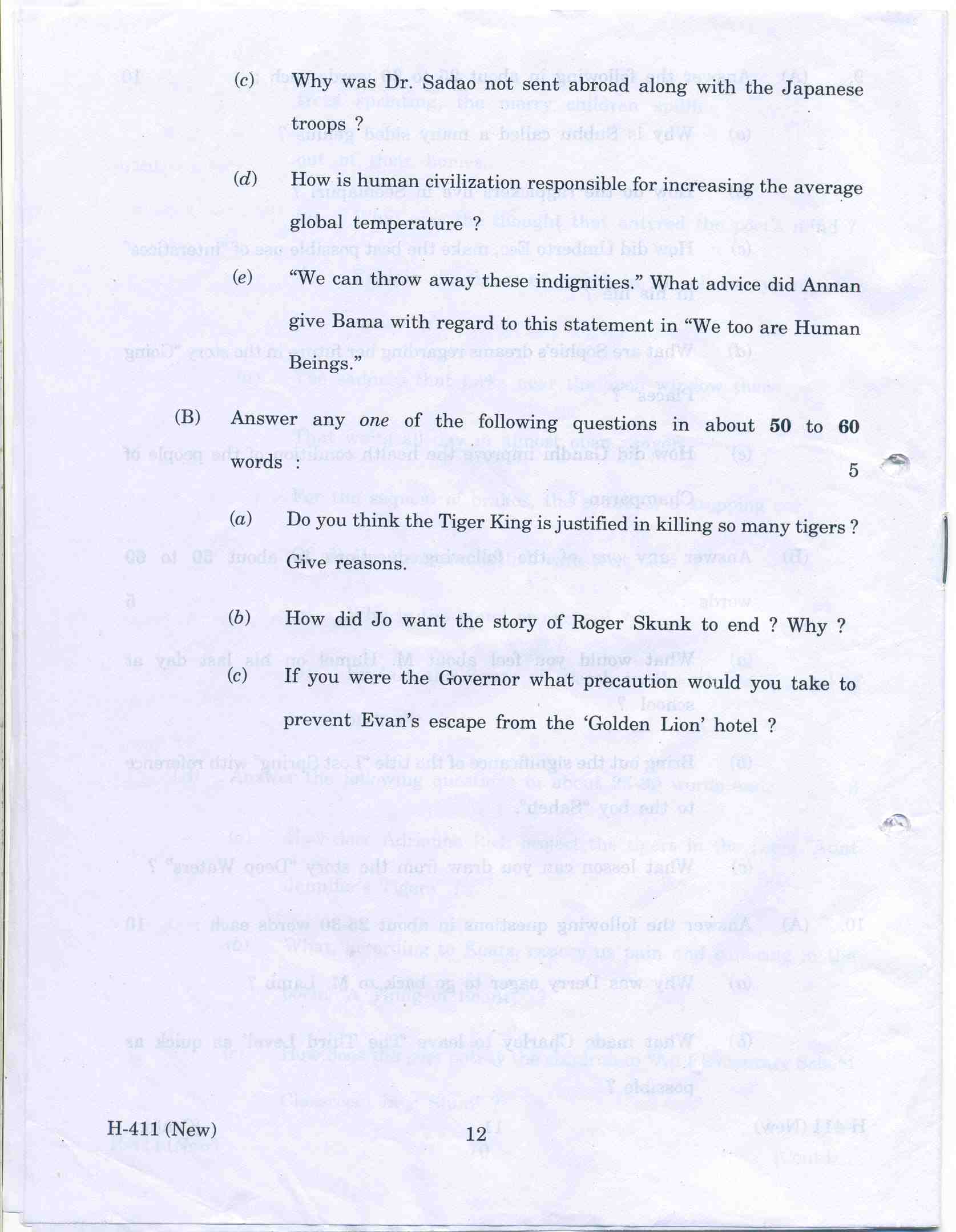
Final 2010
